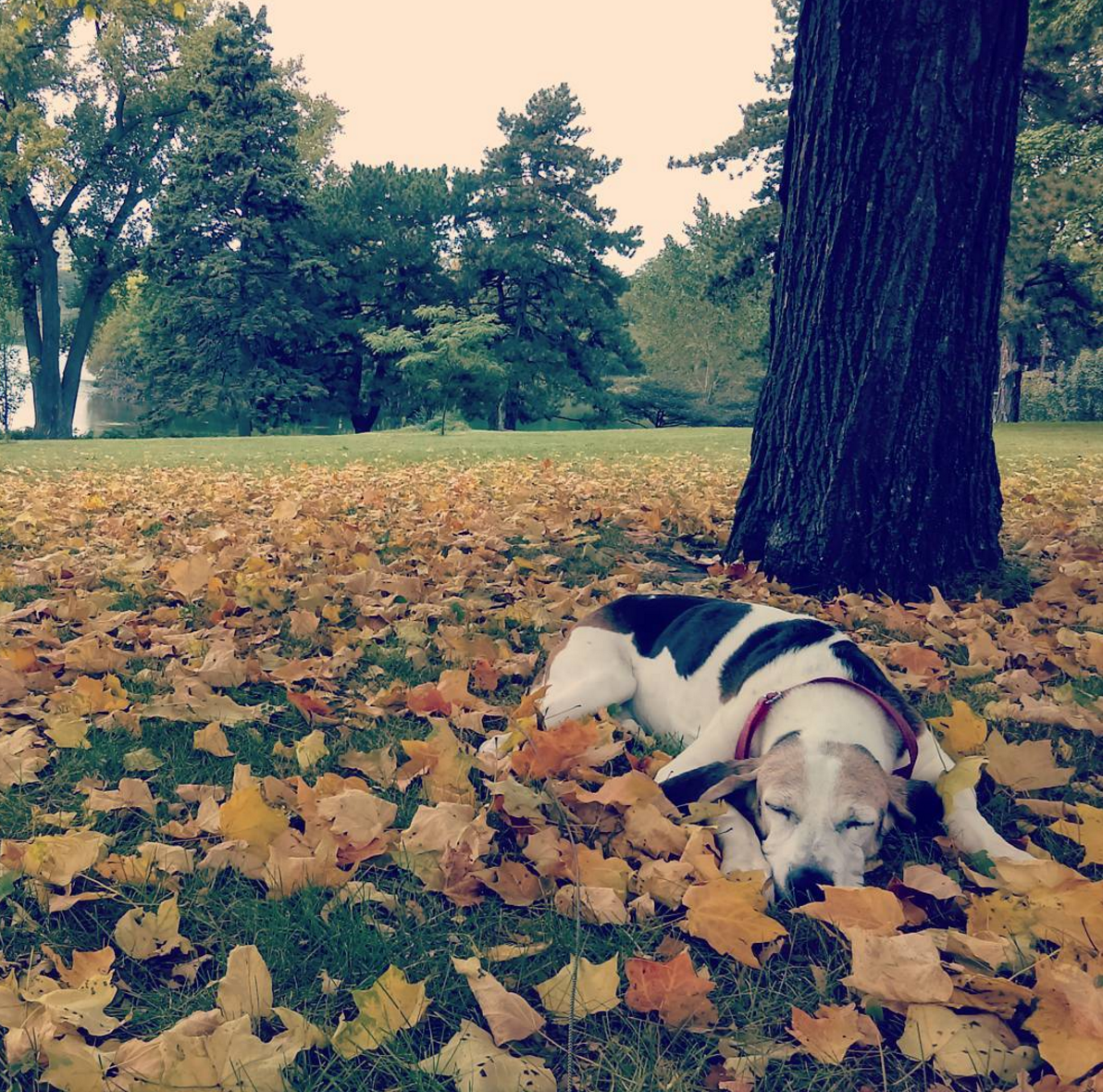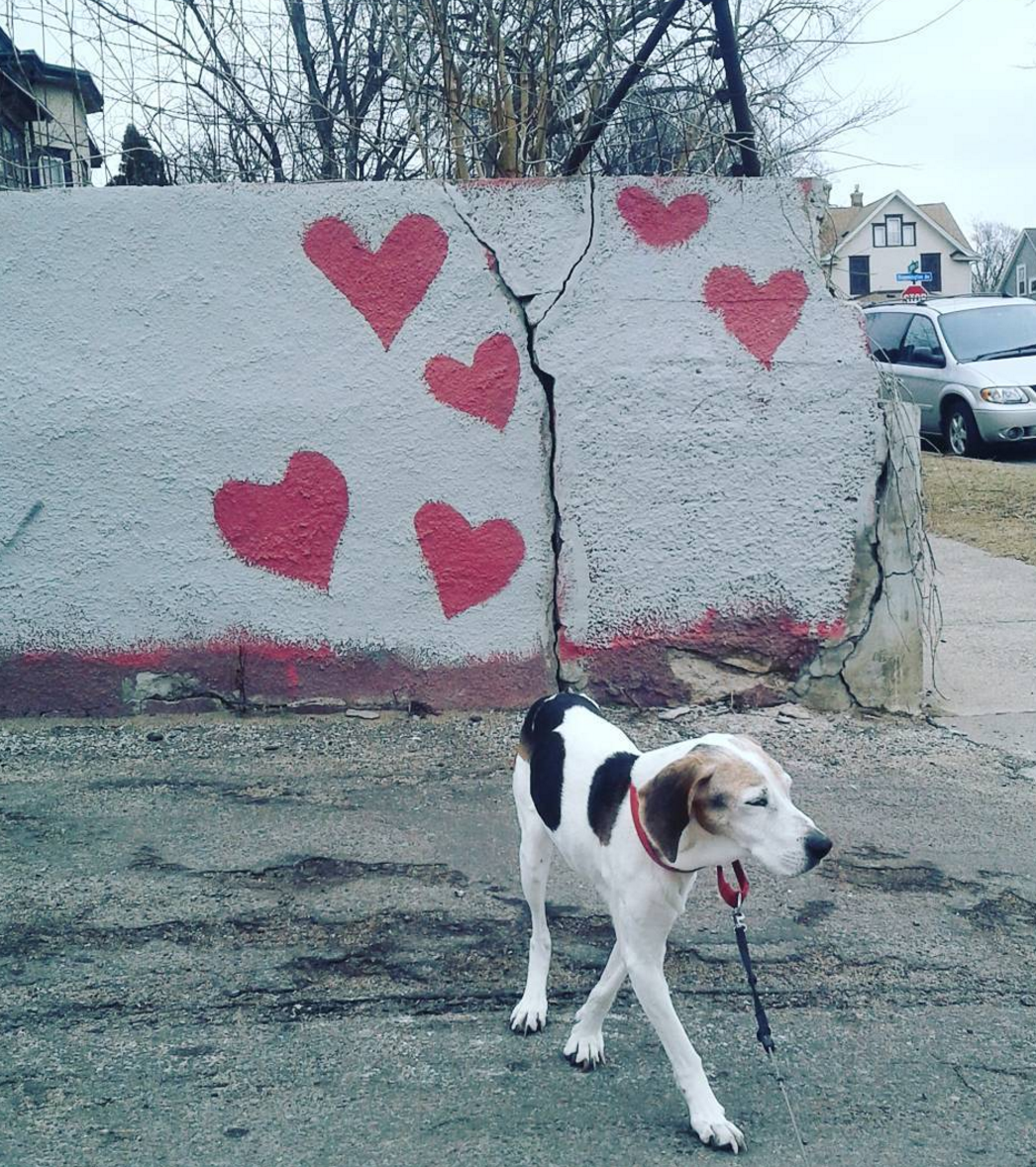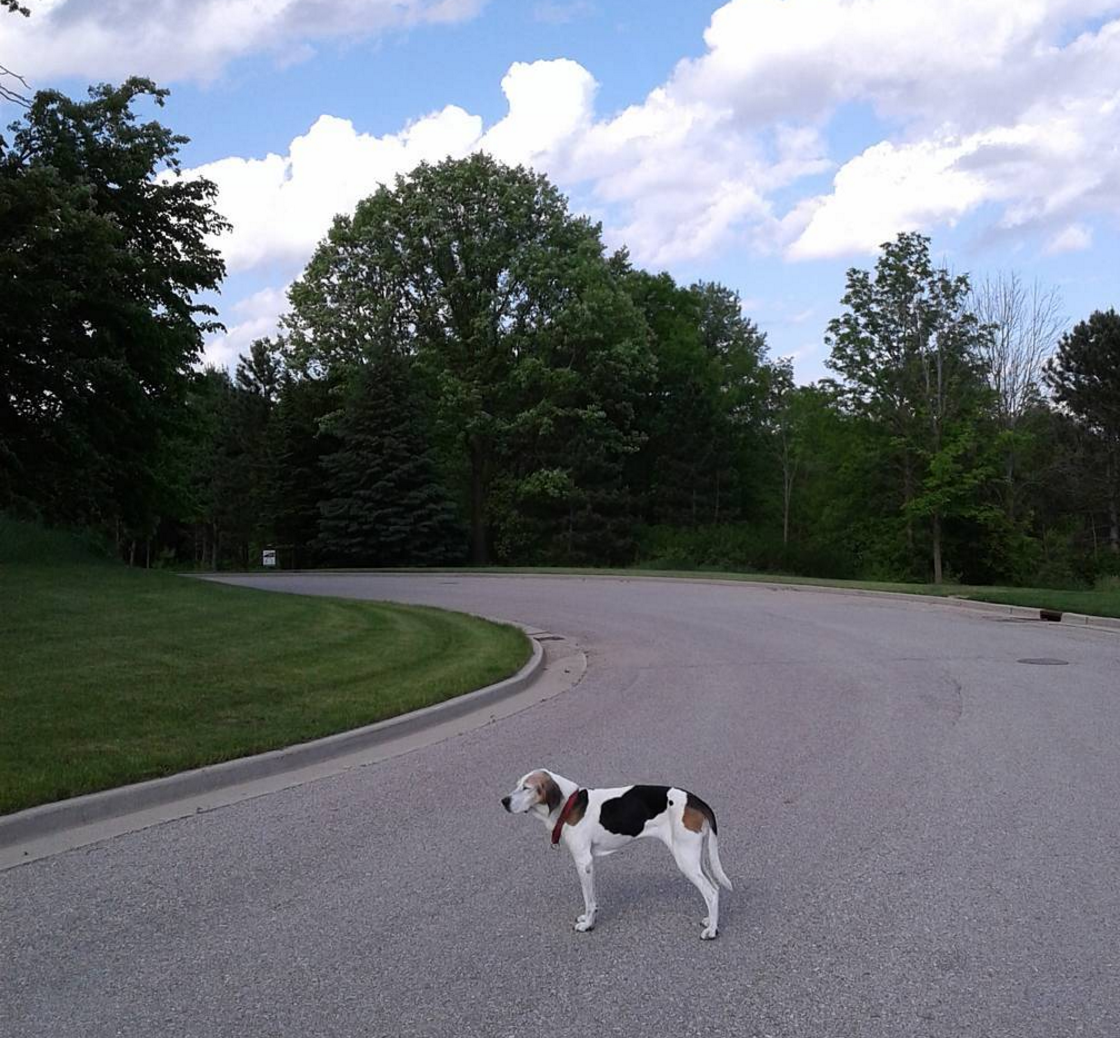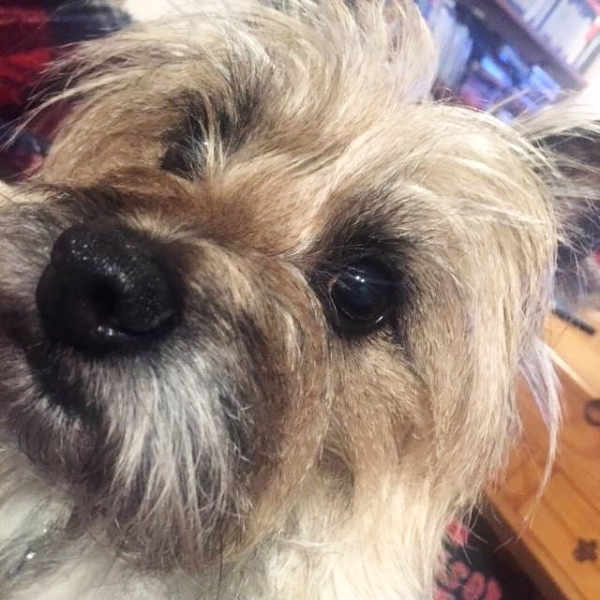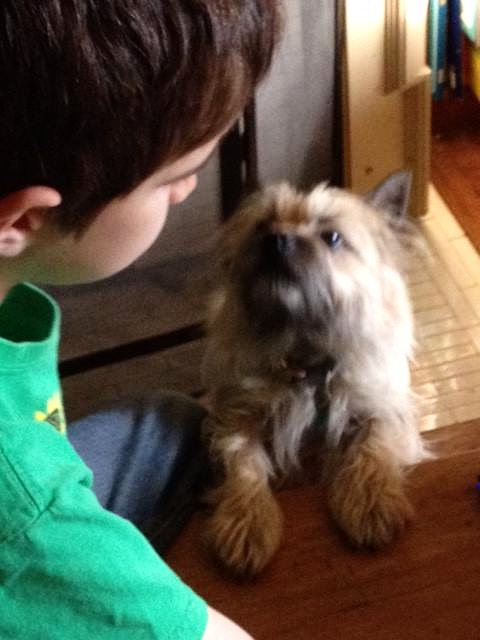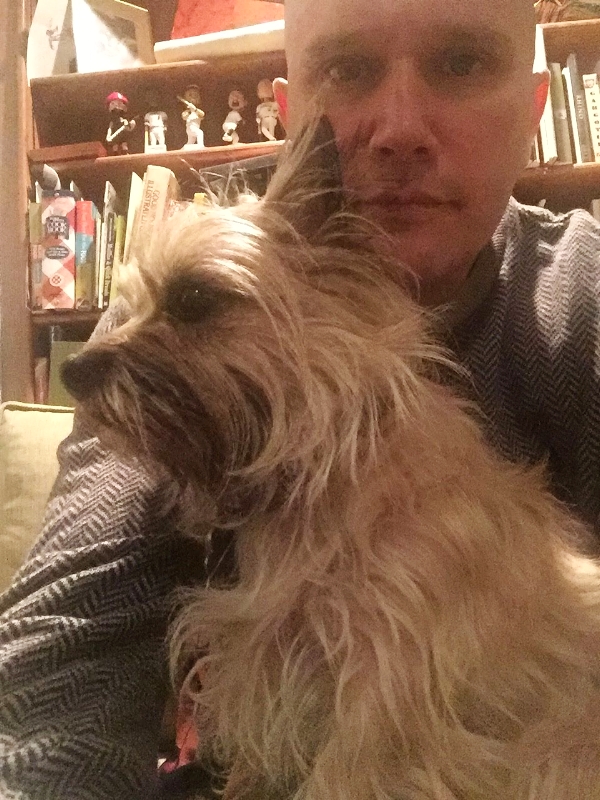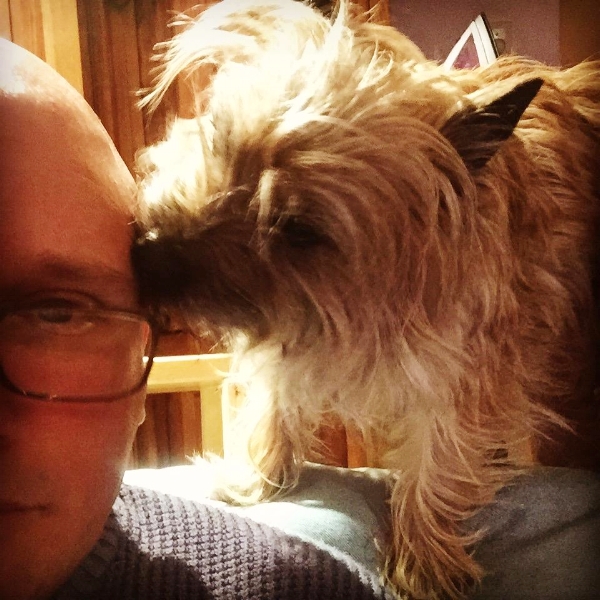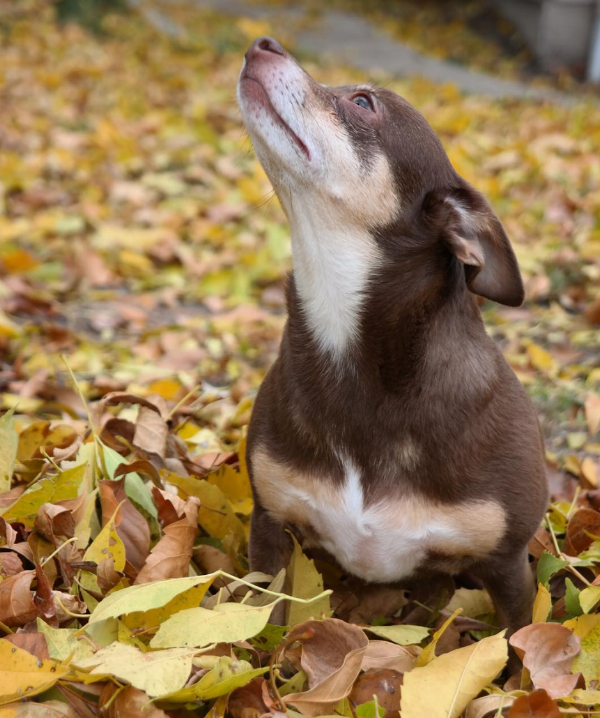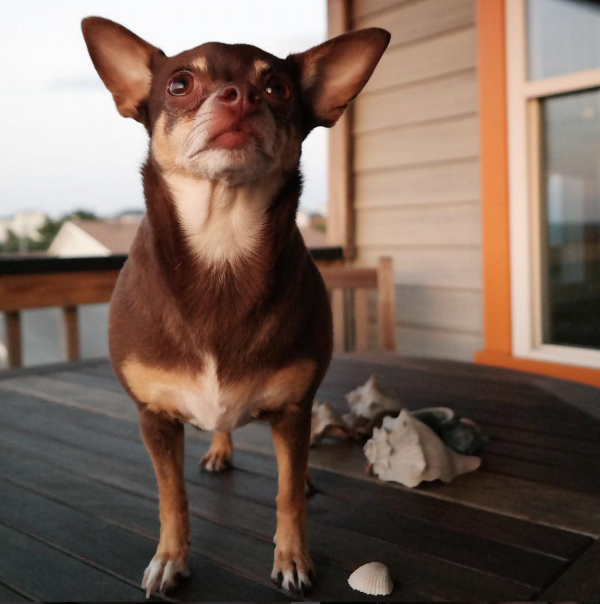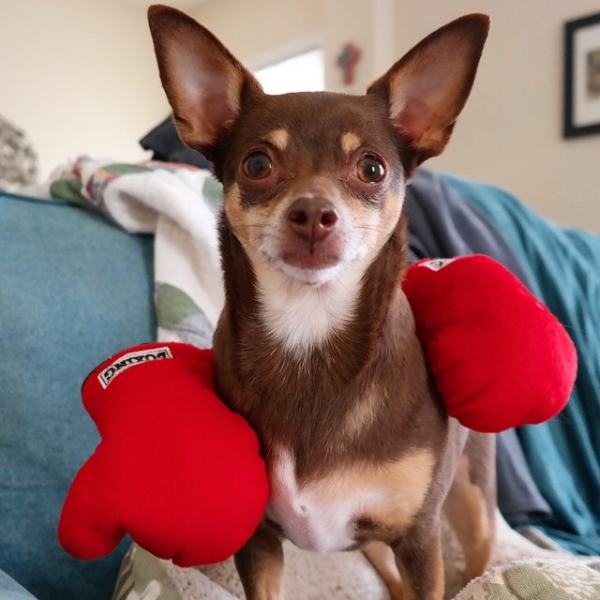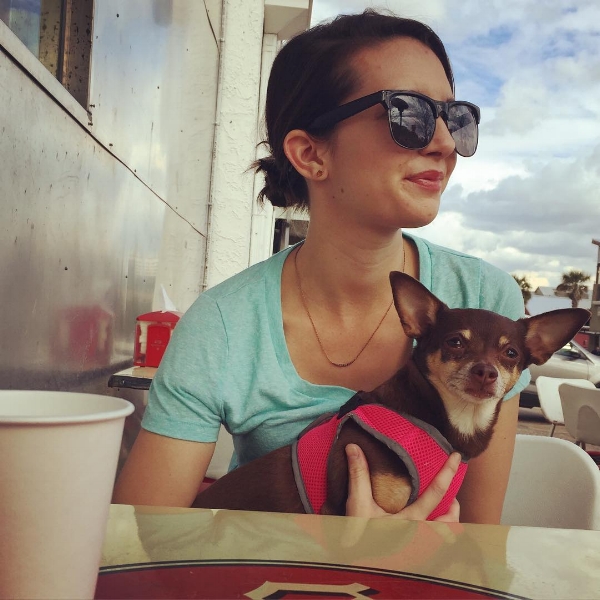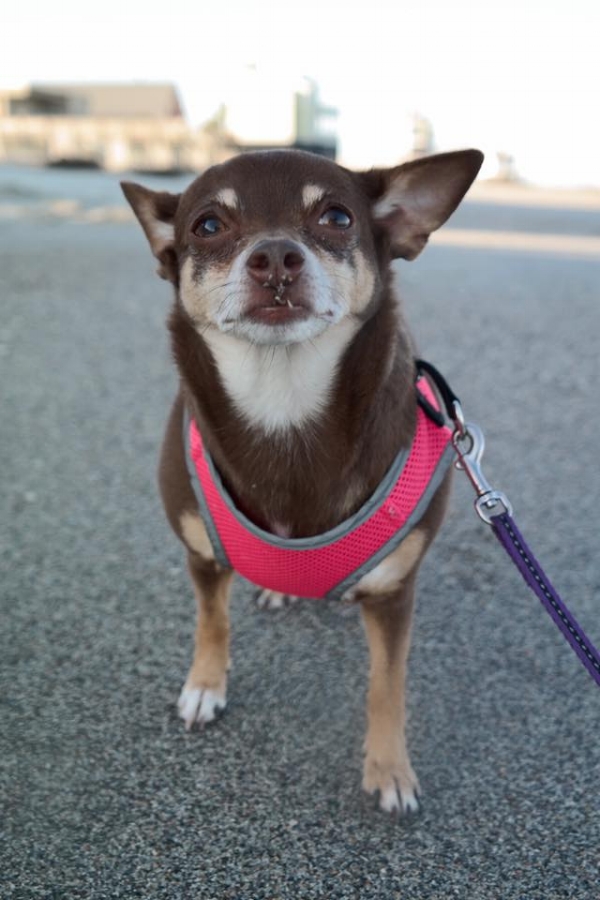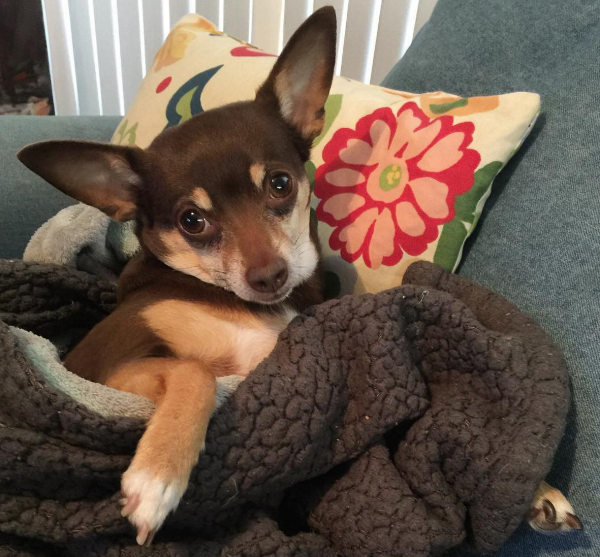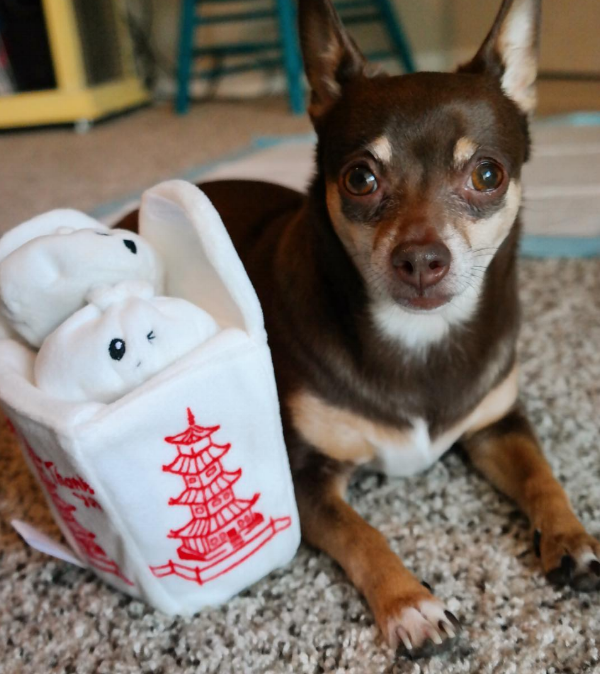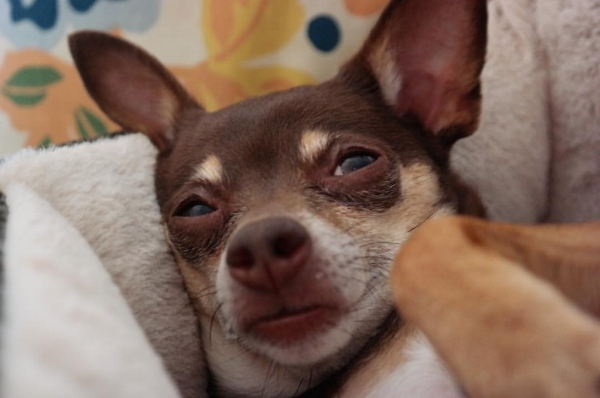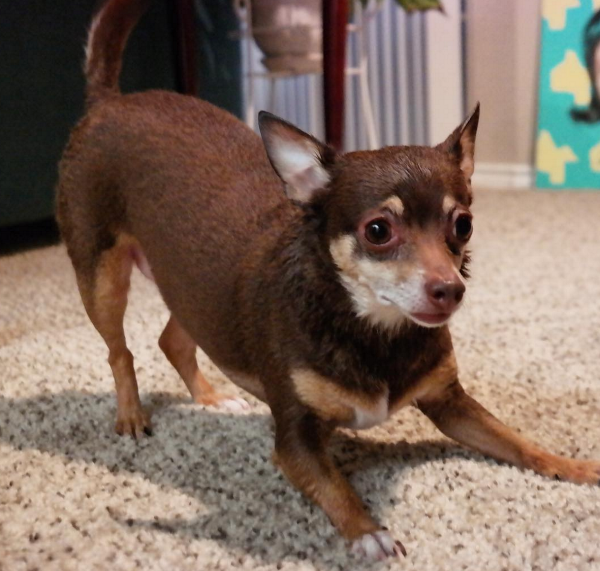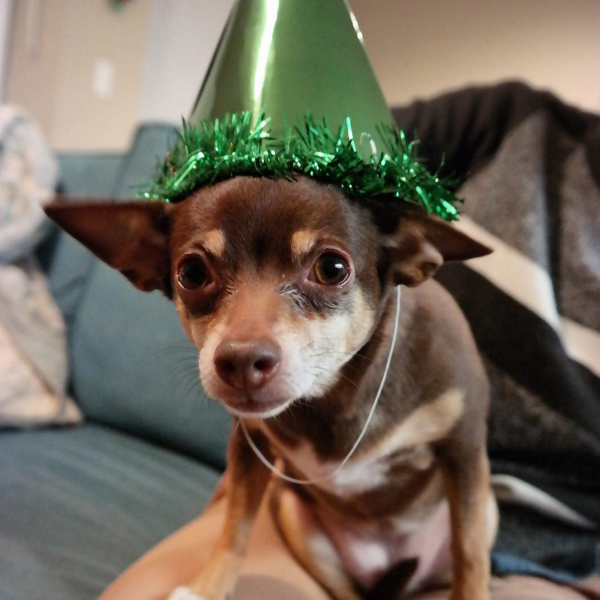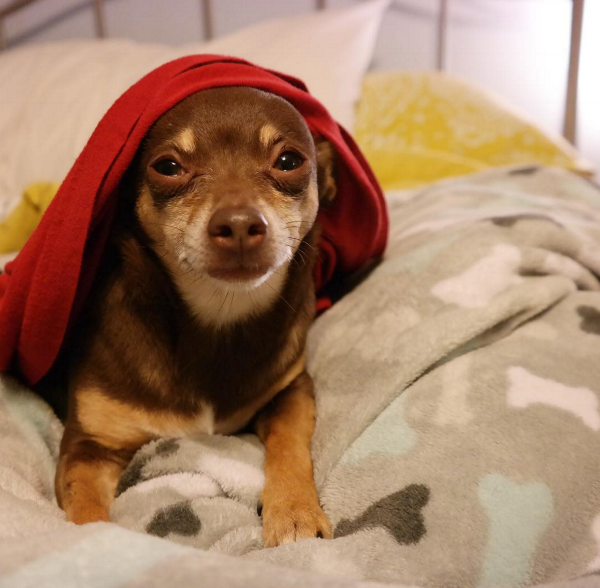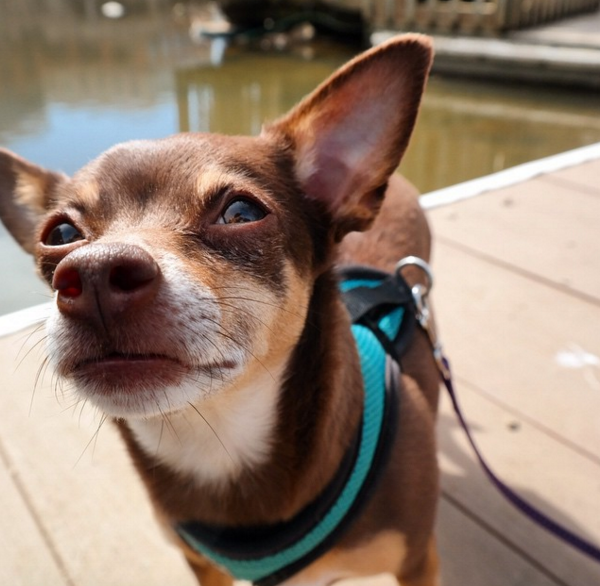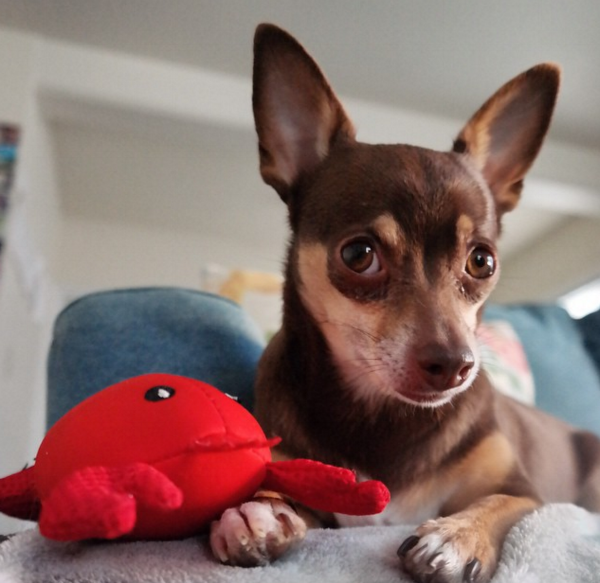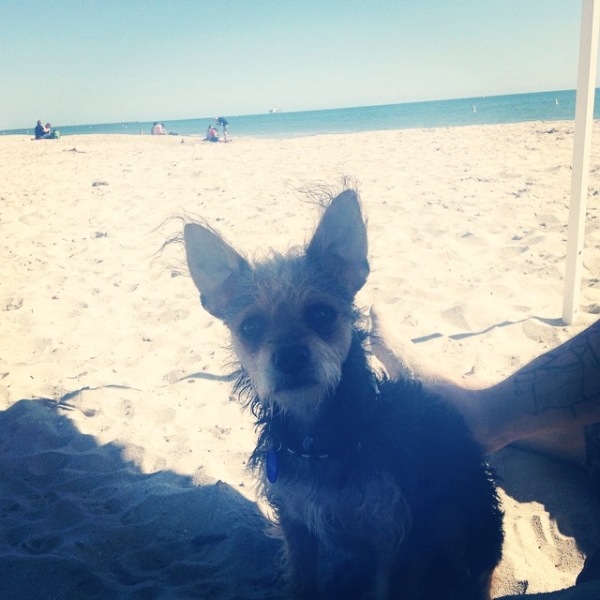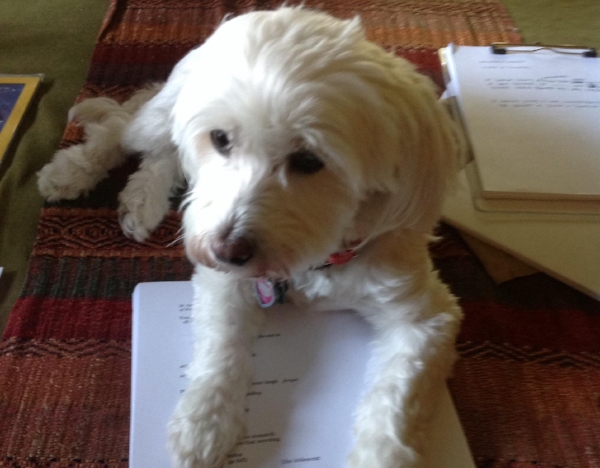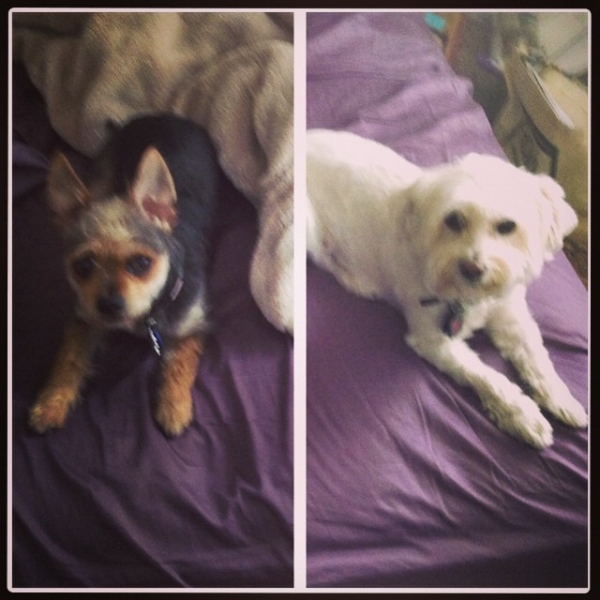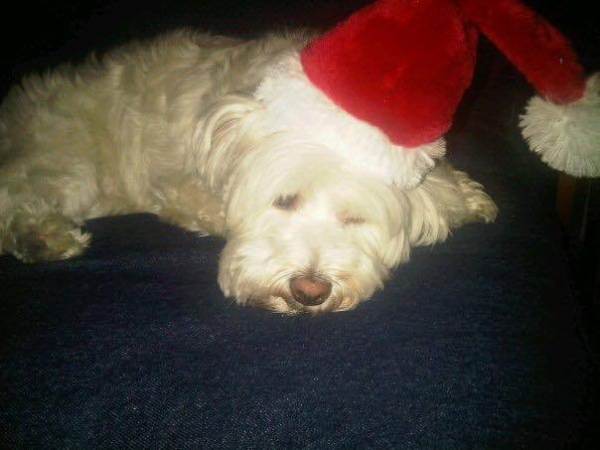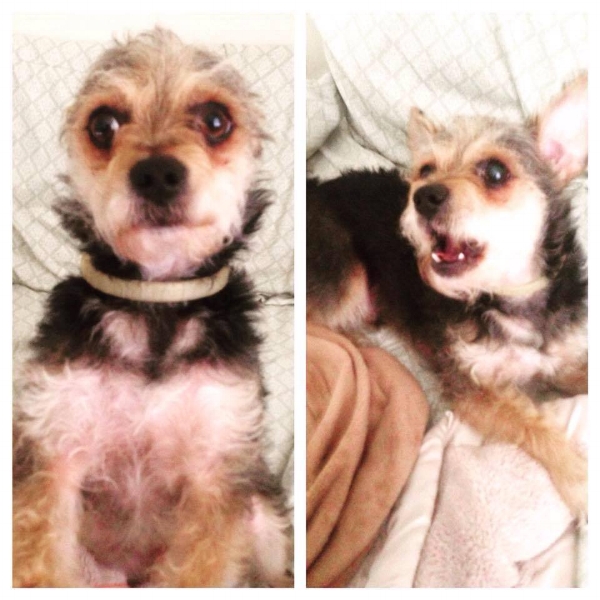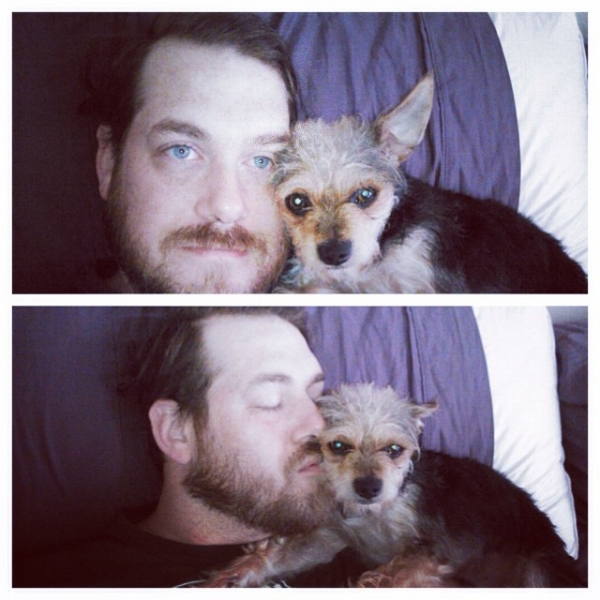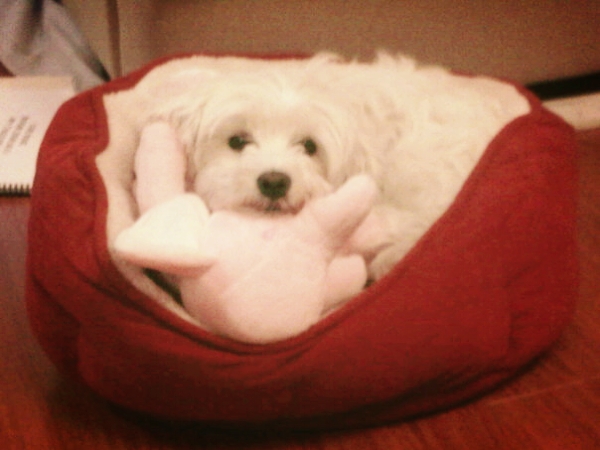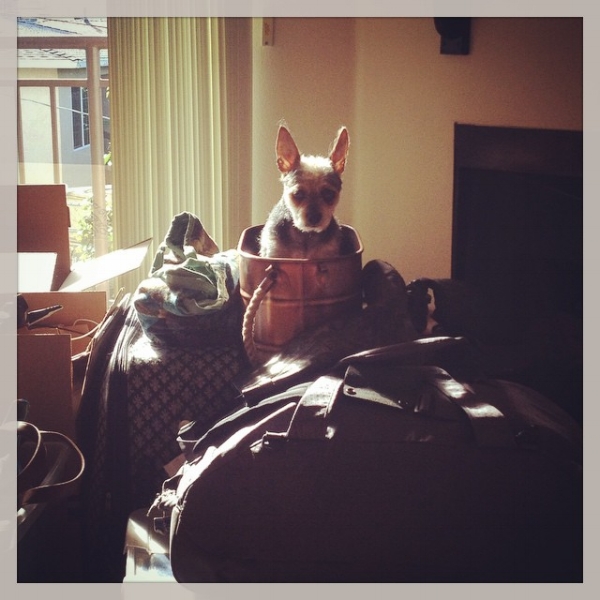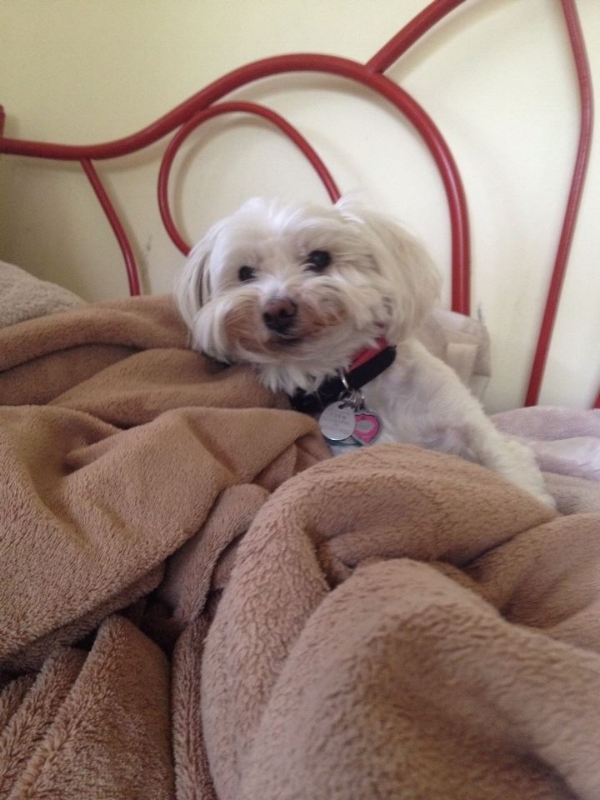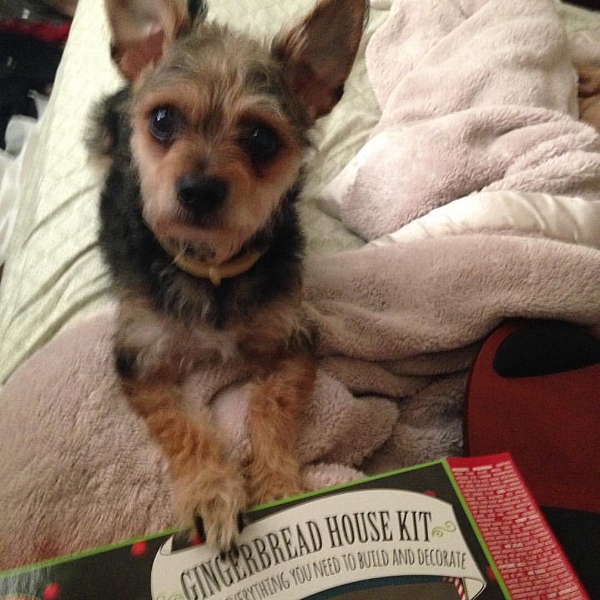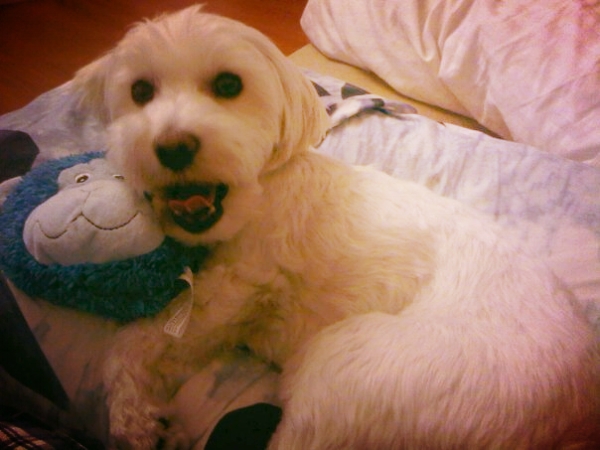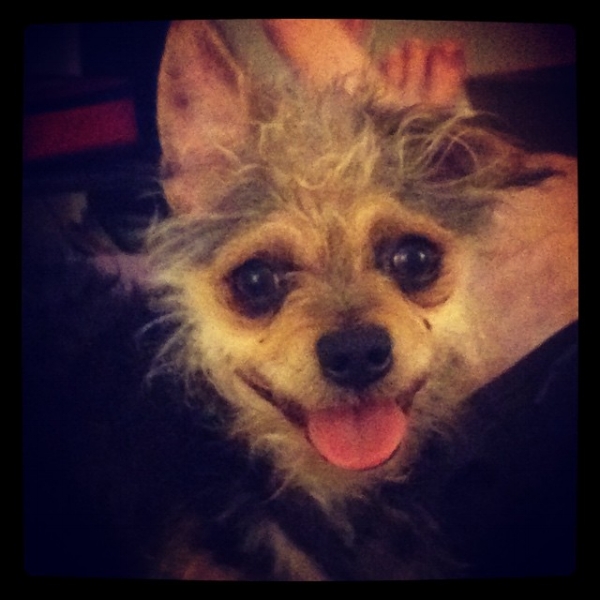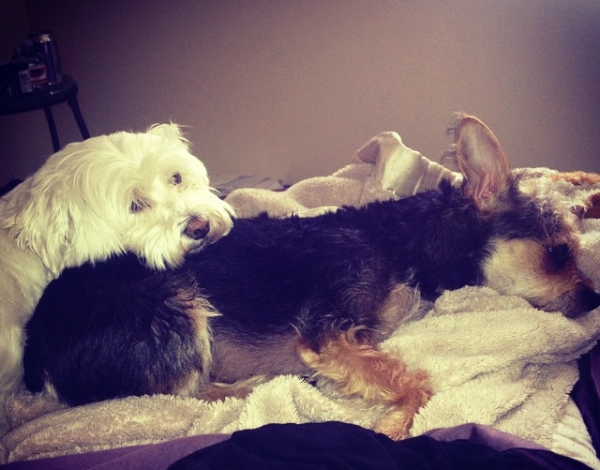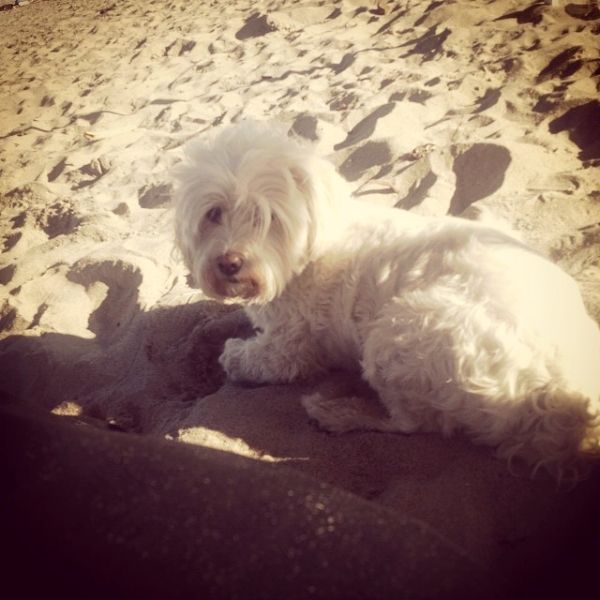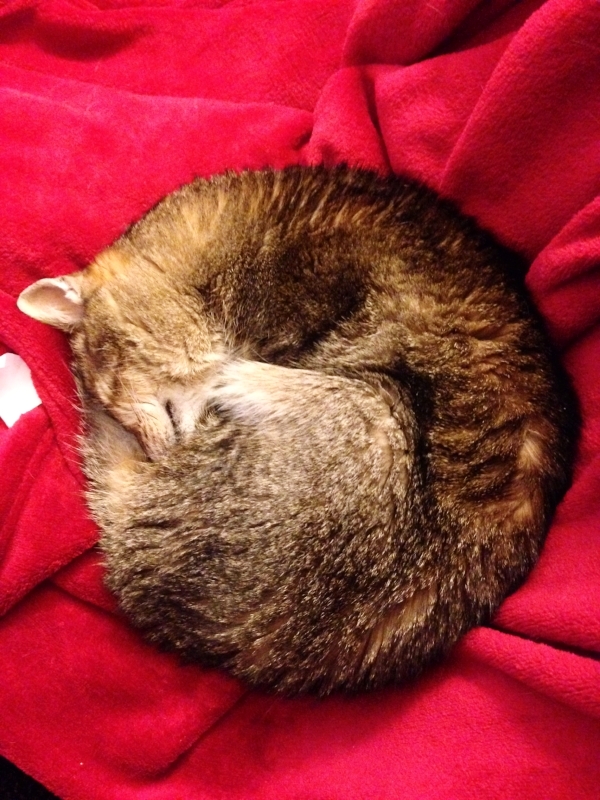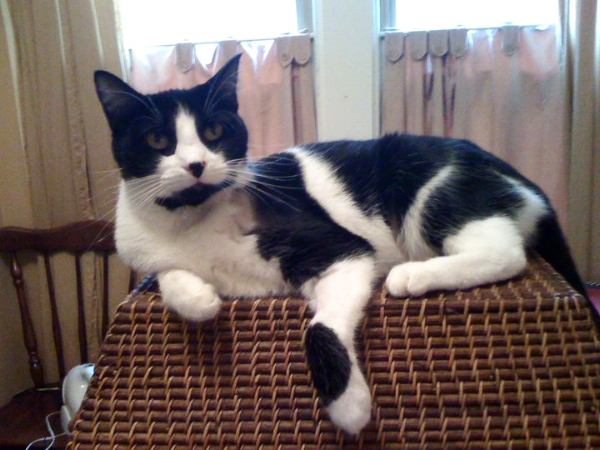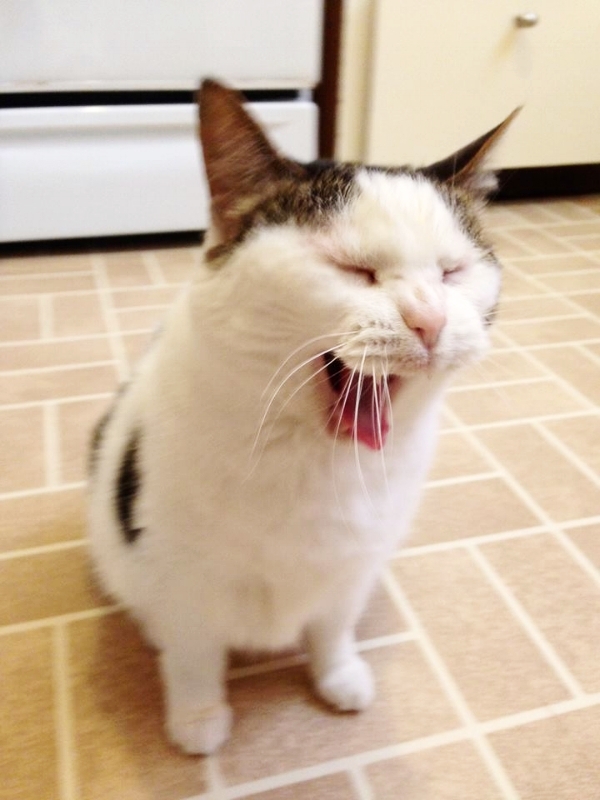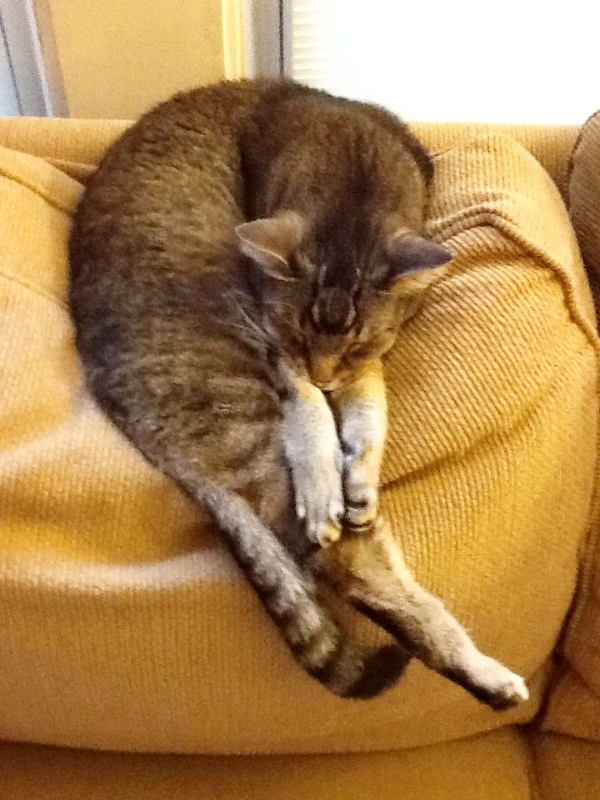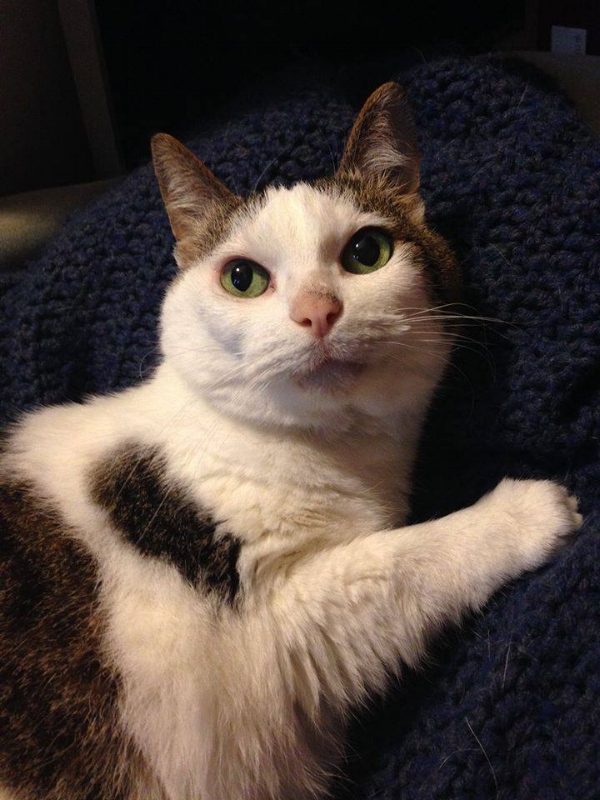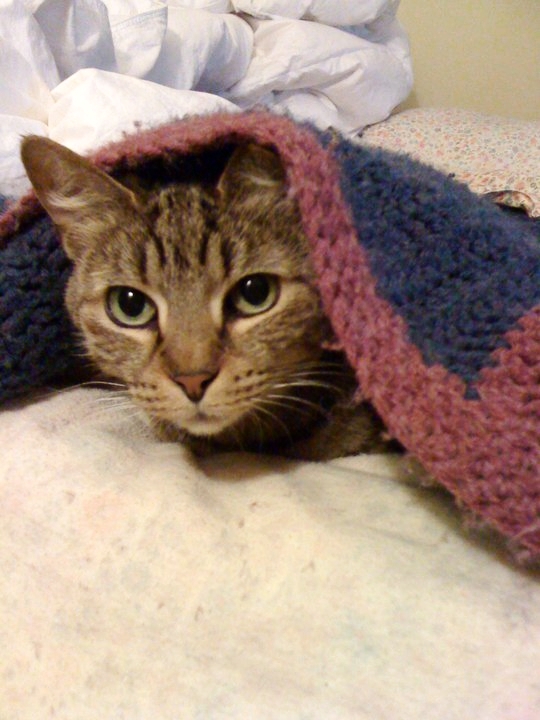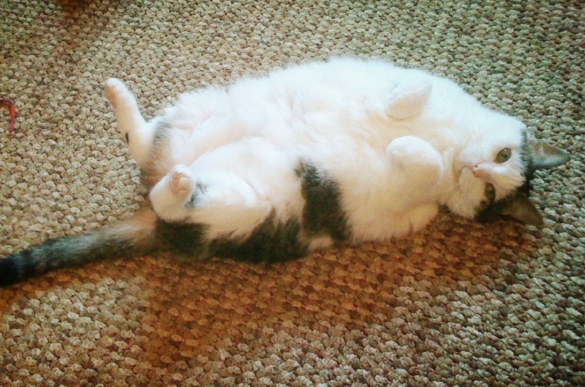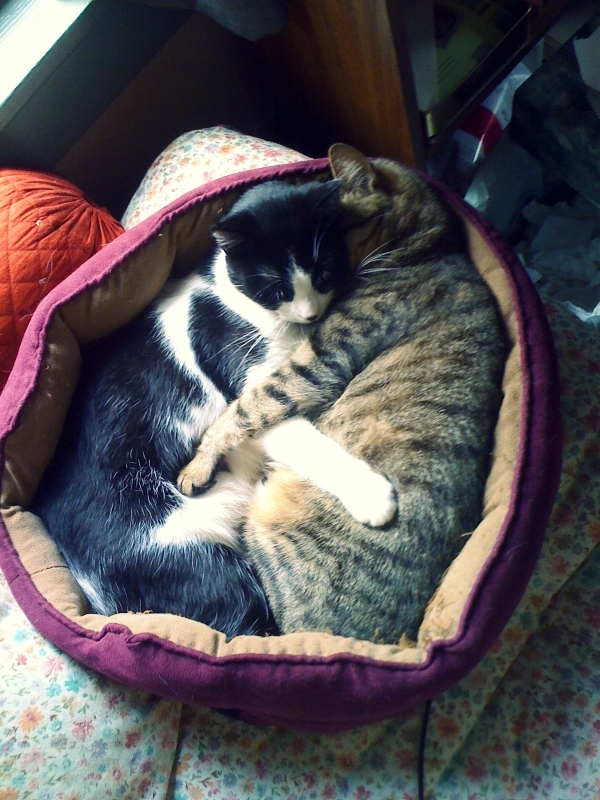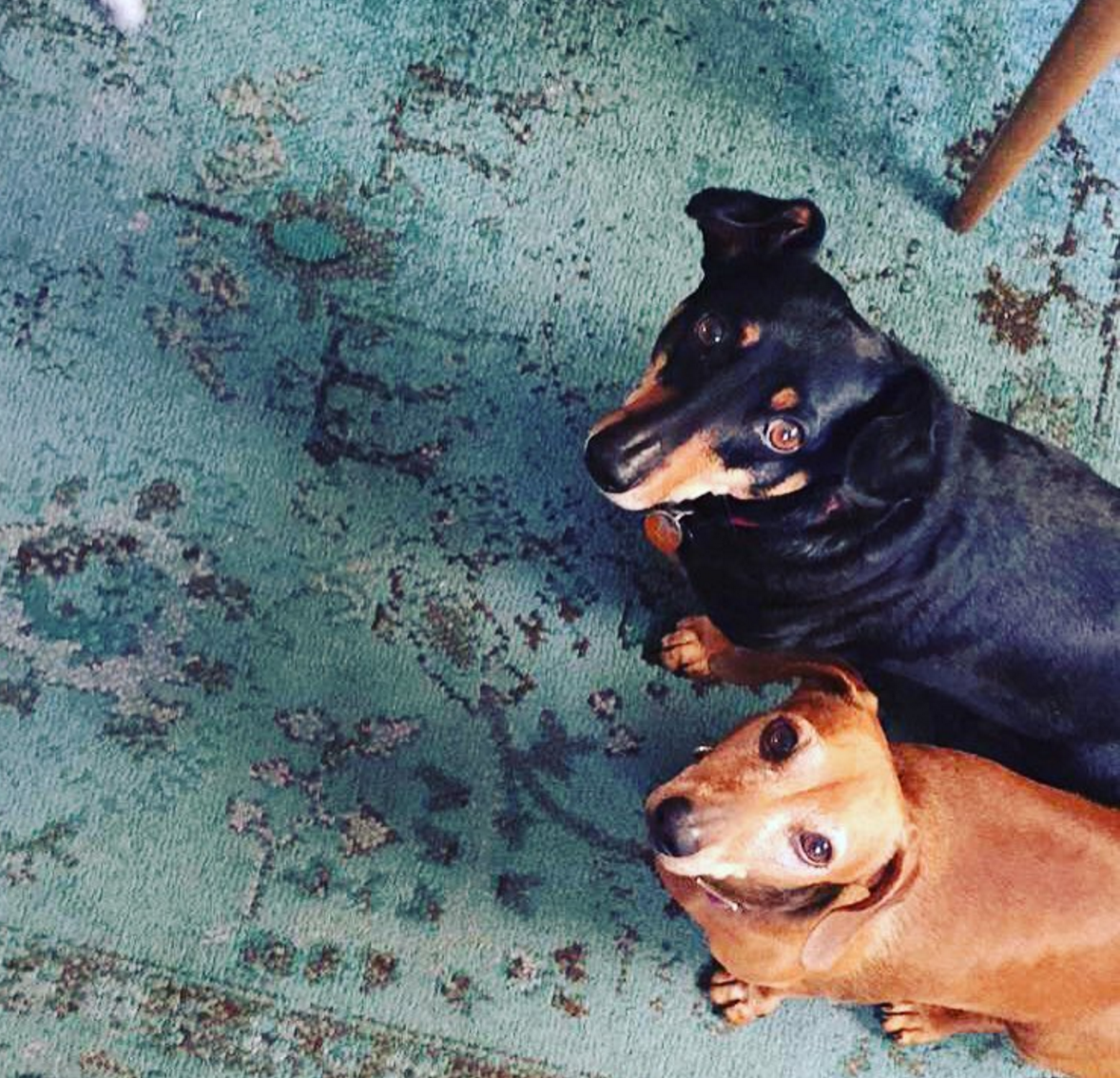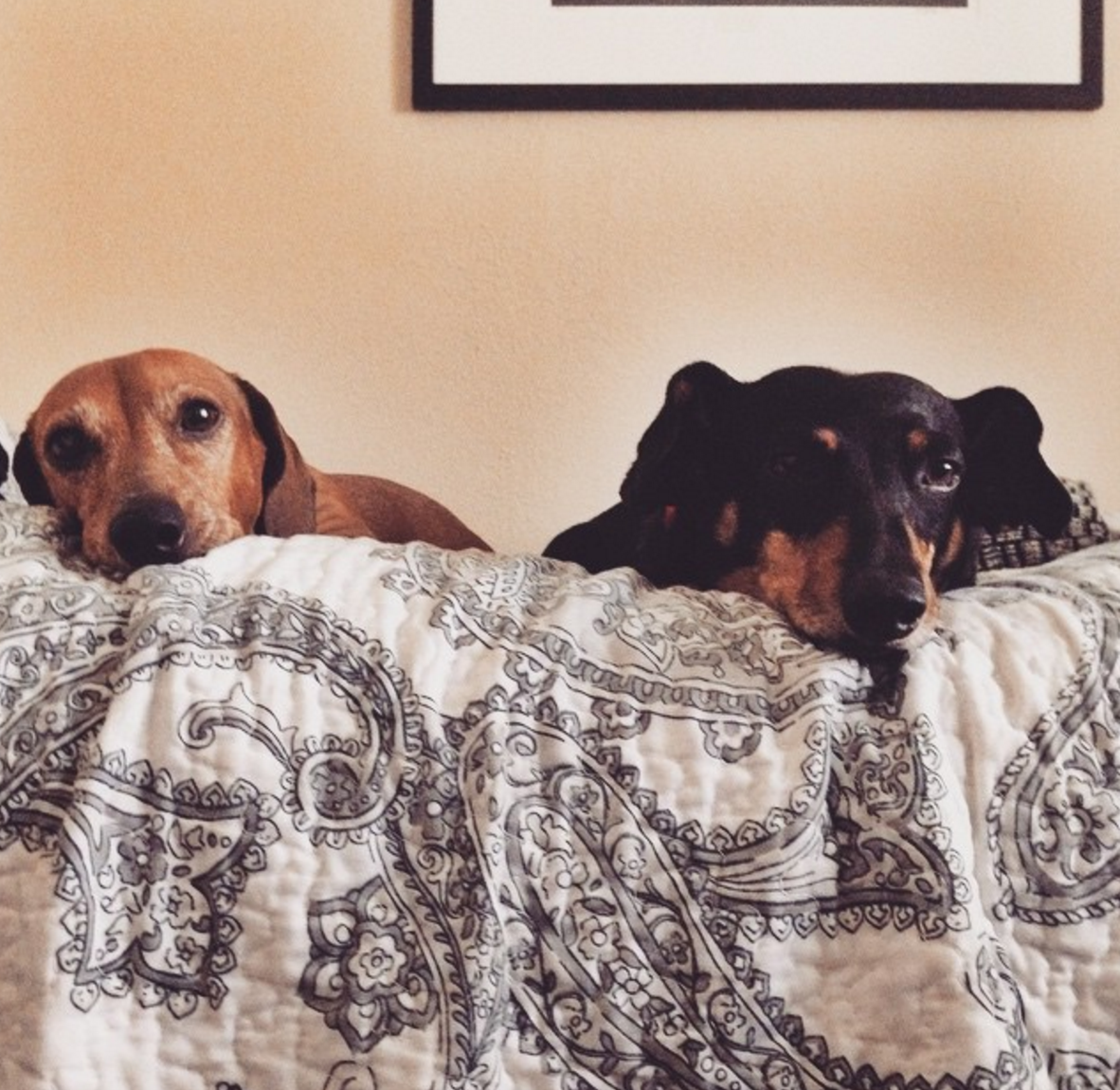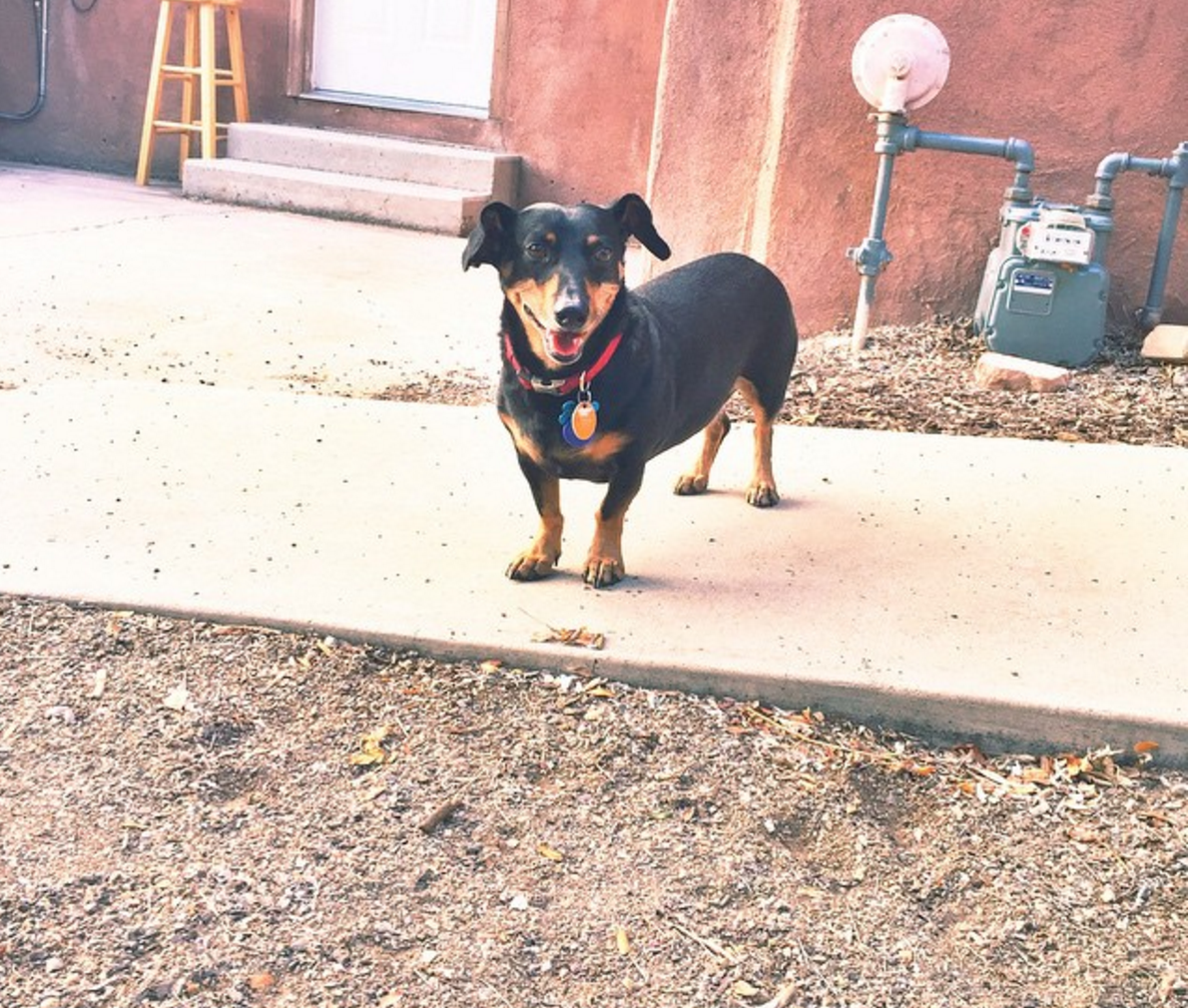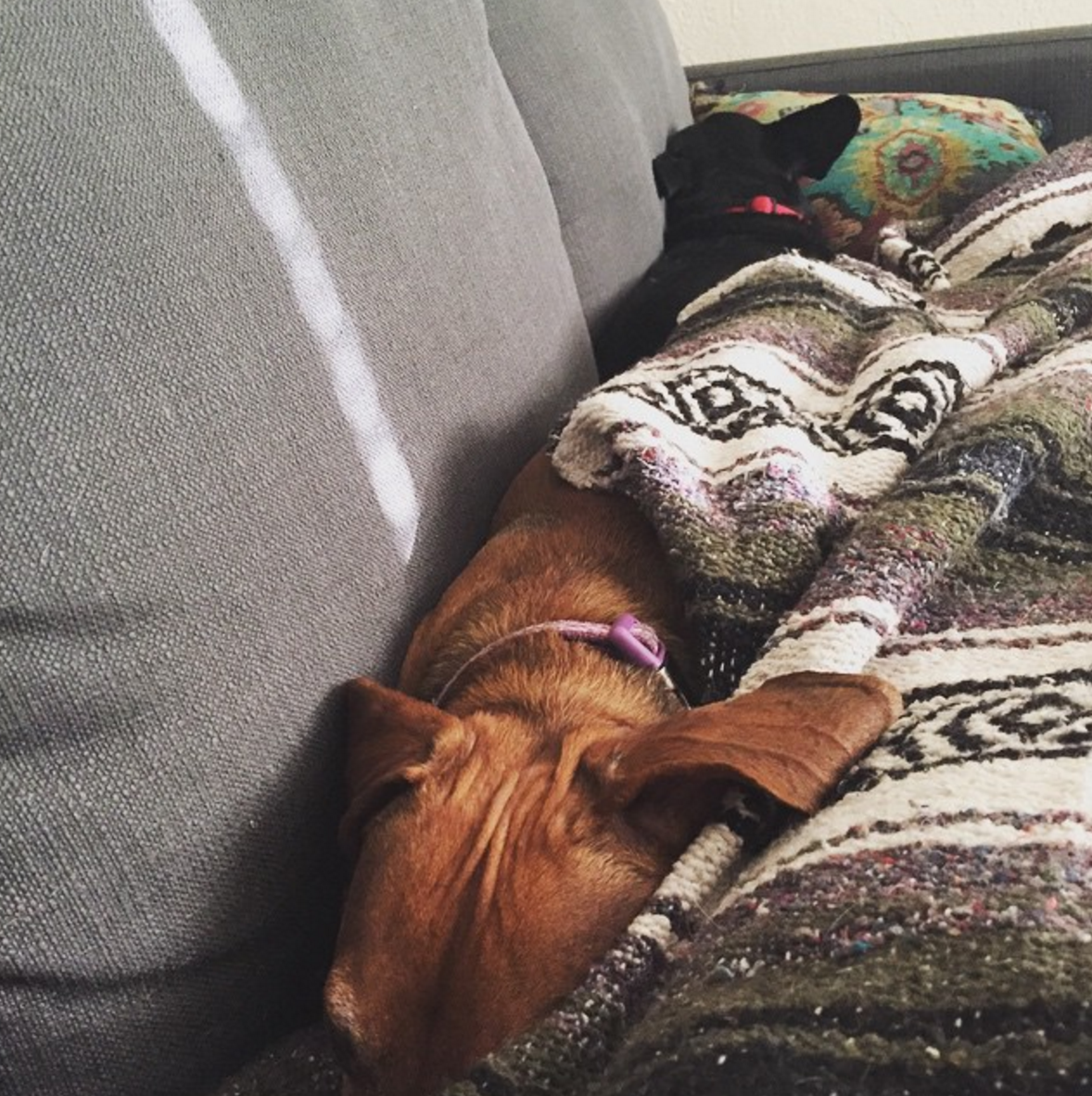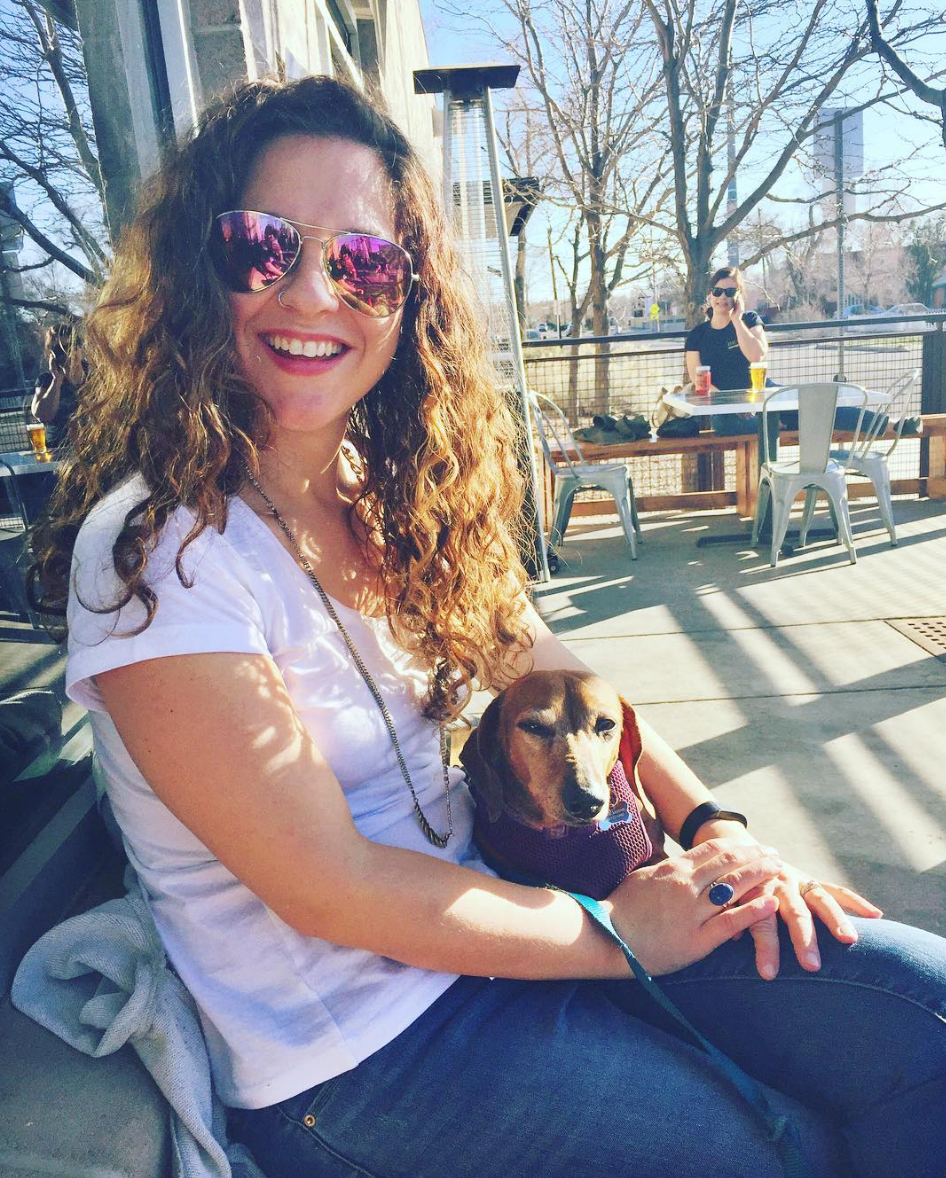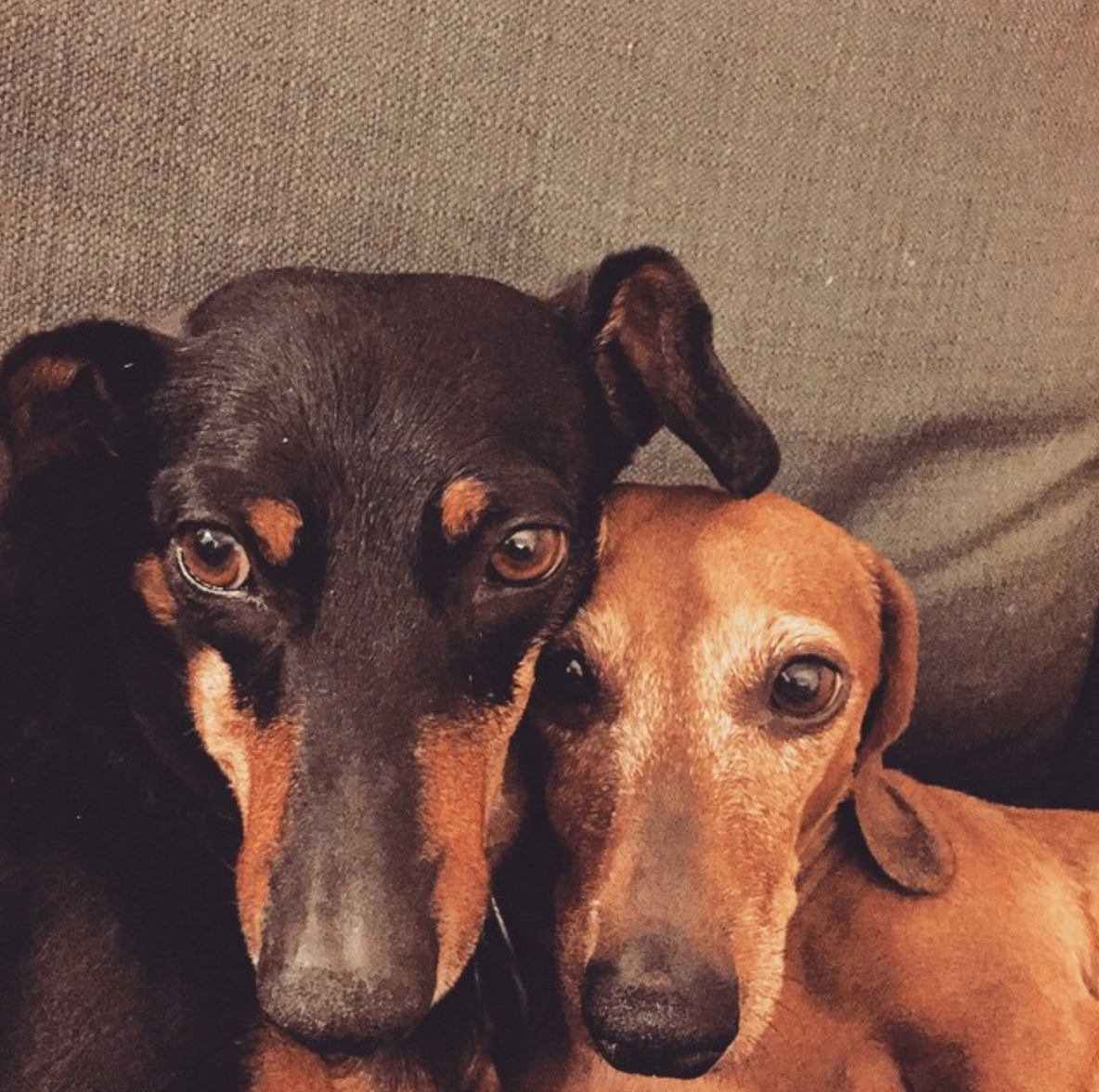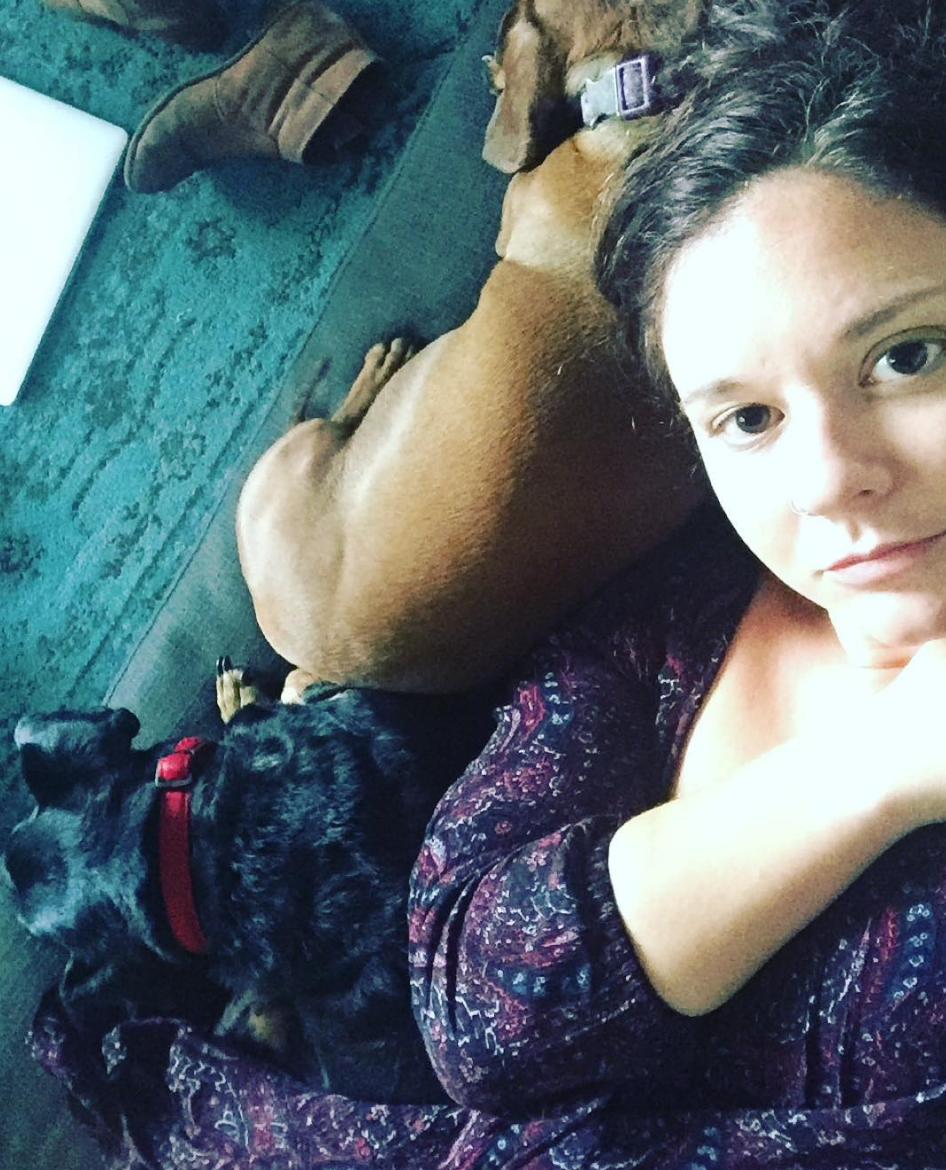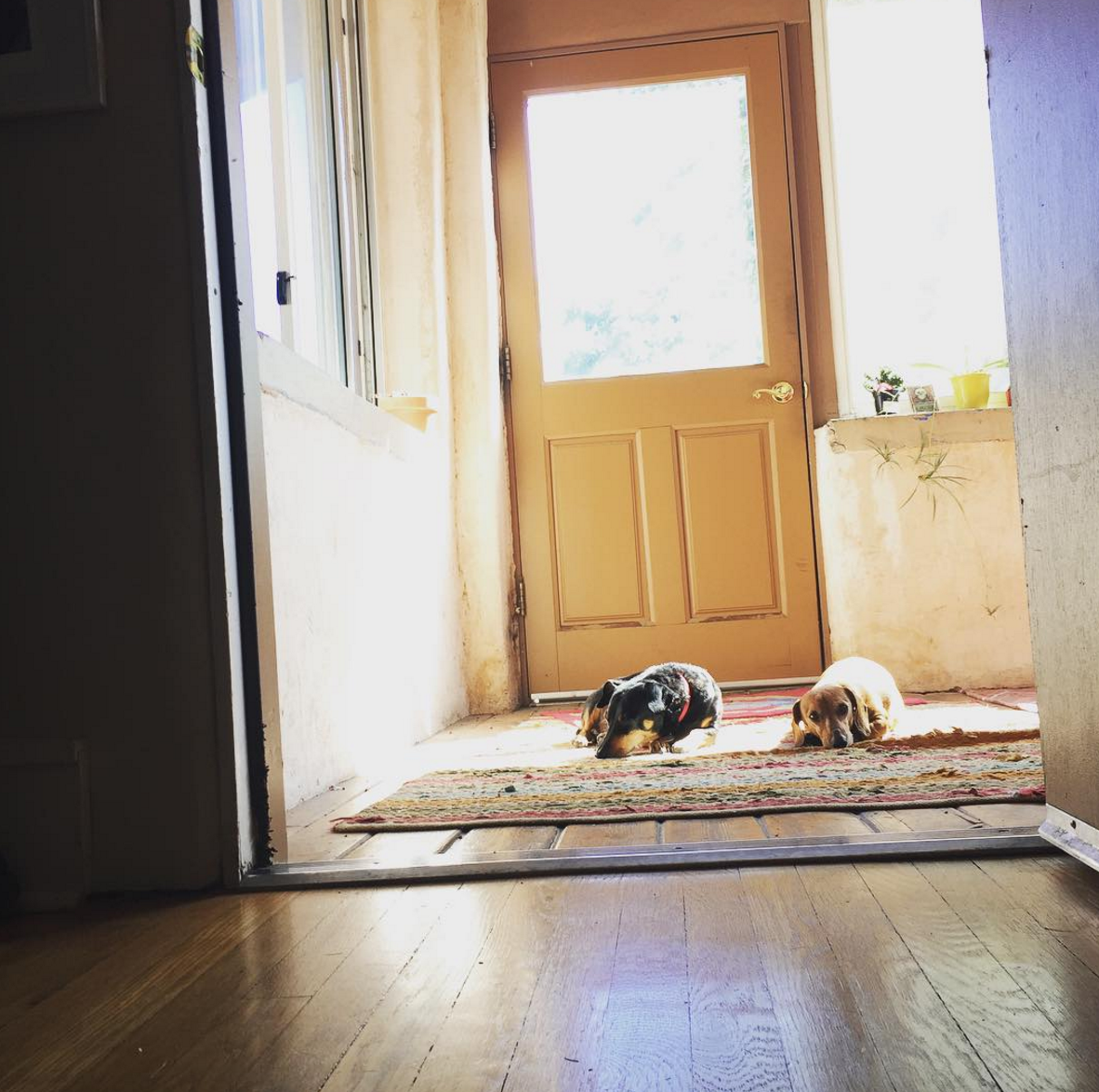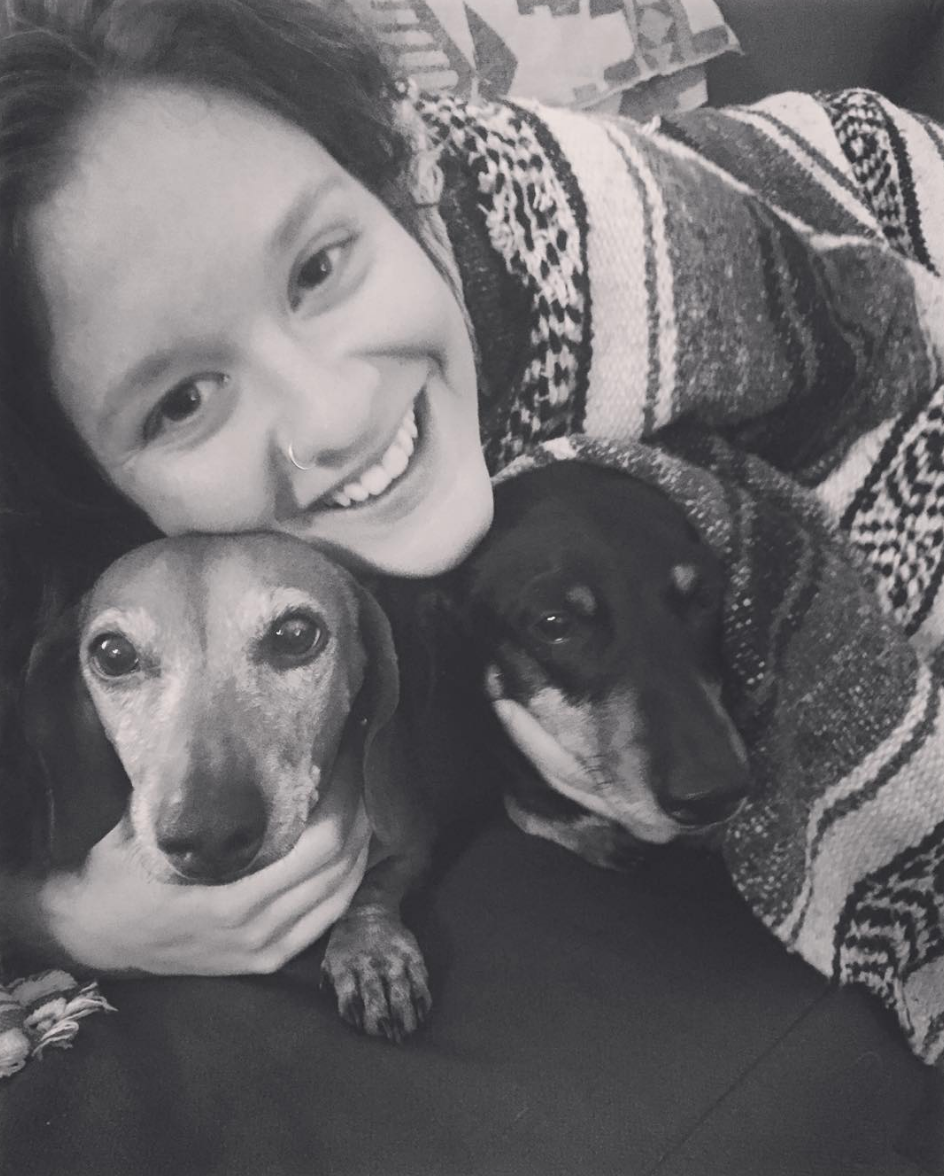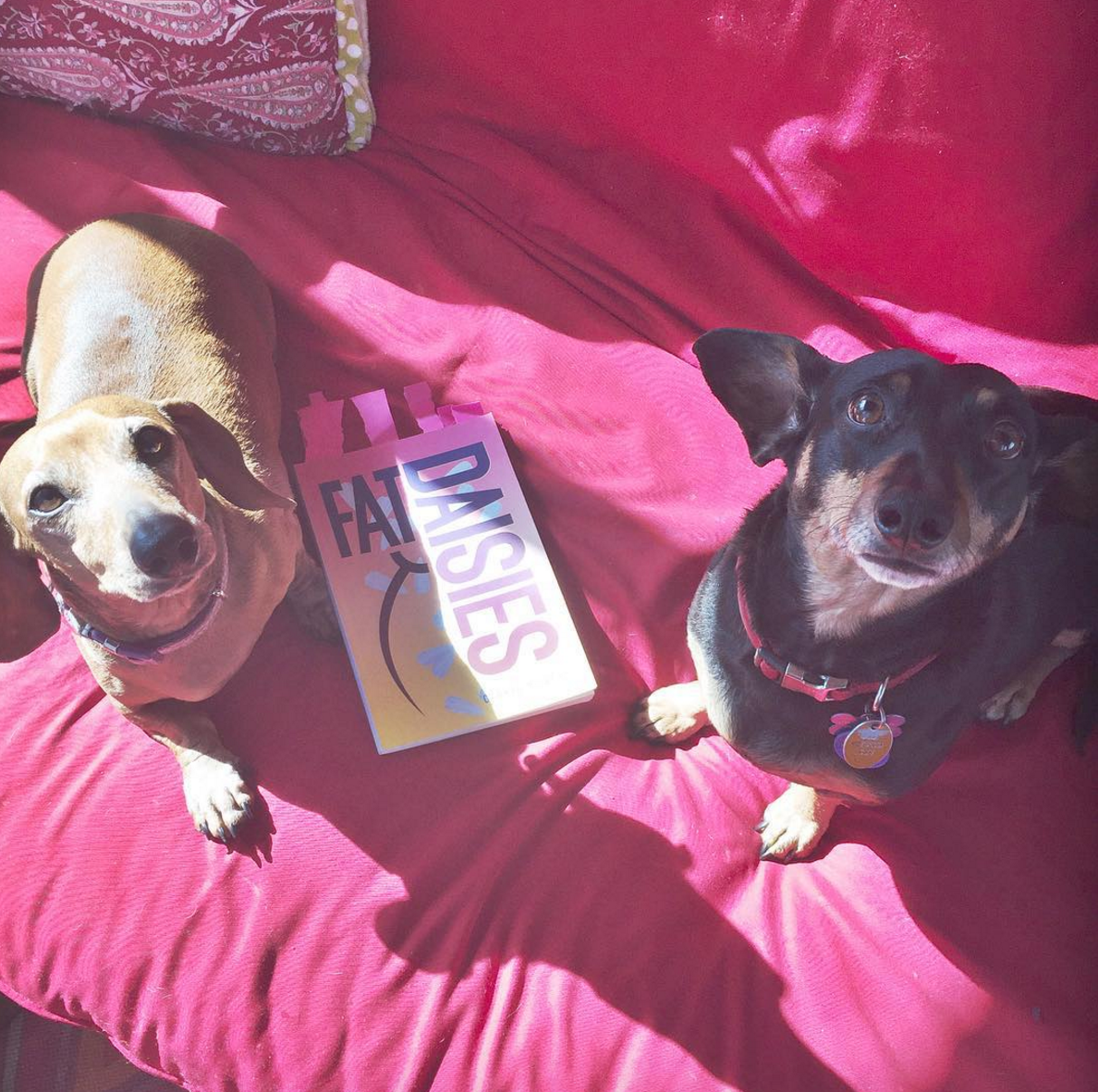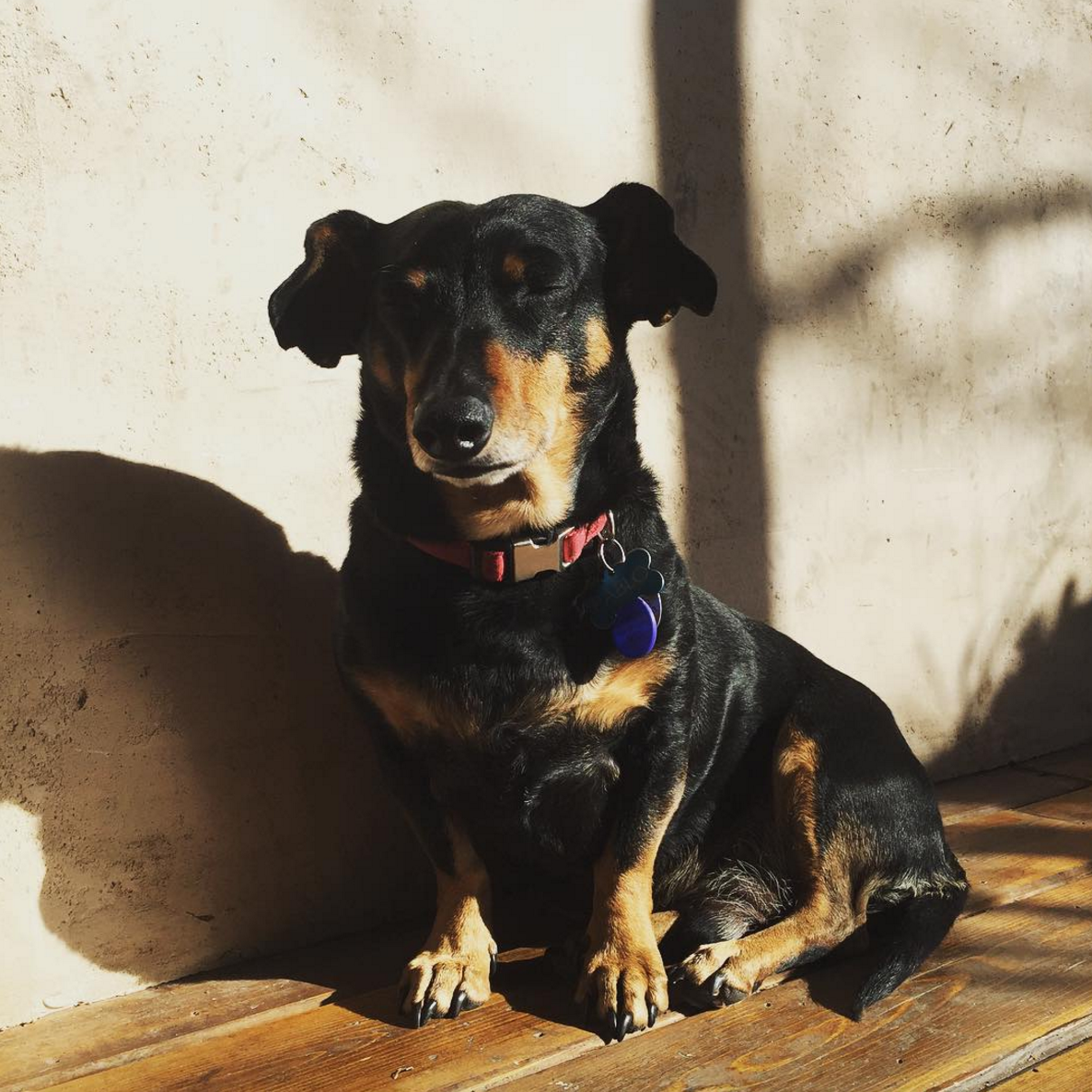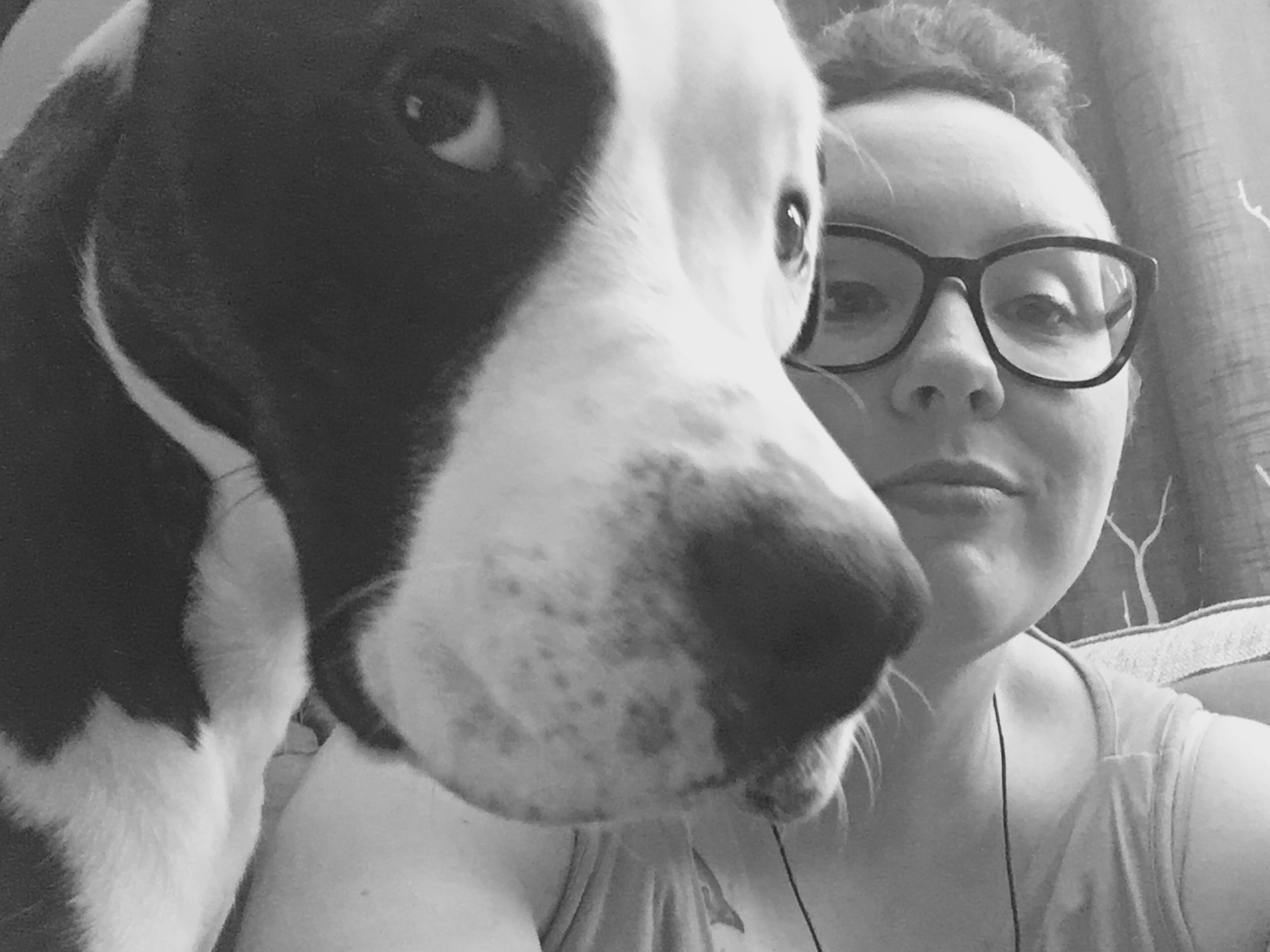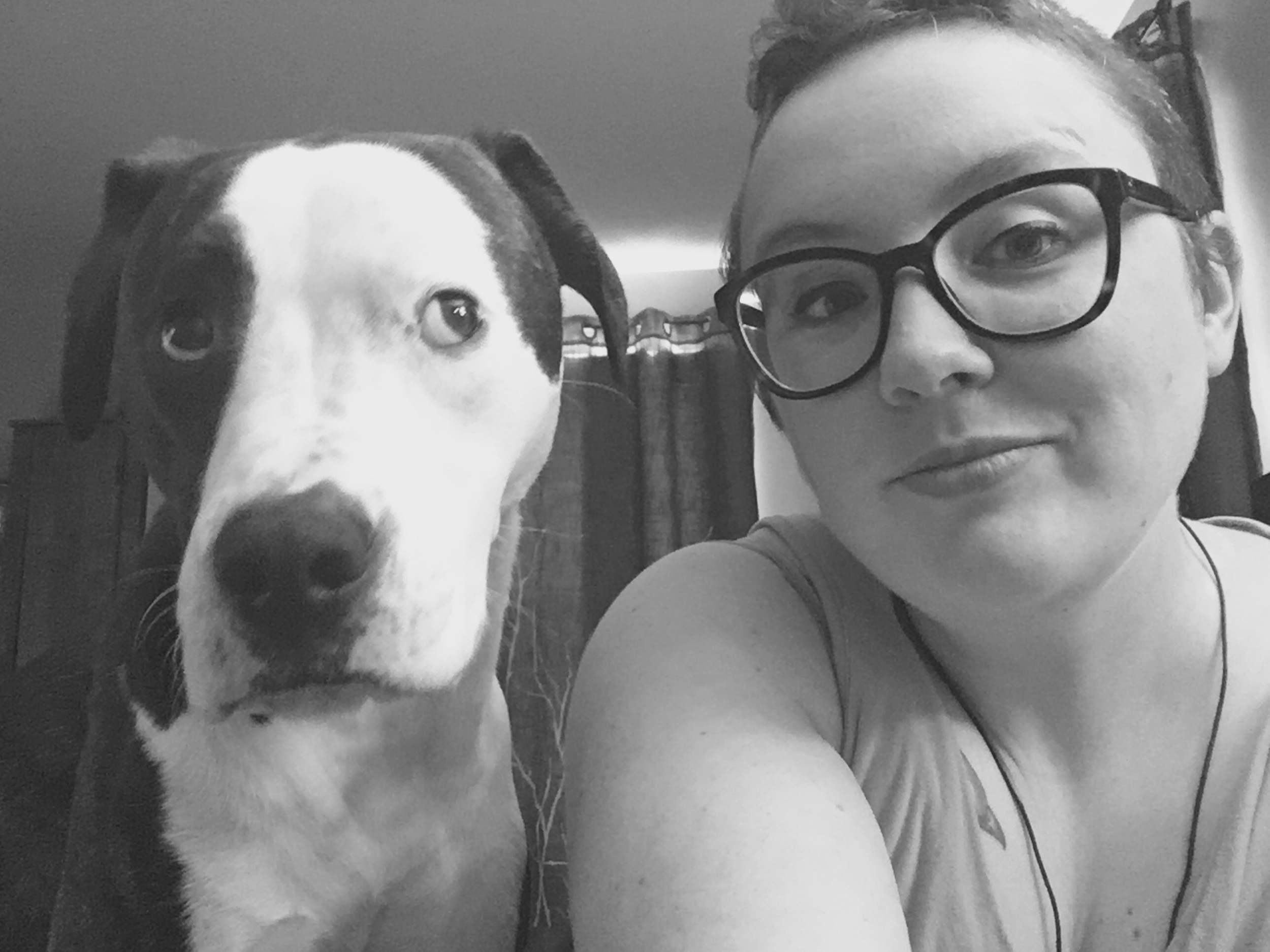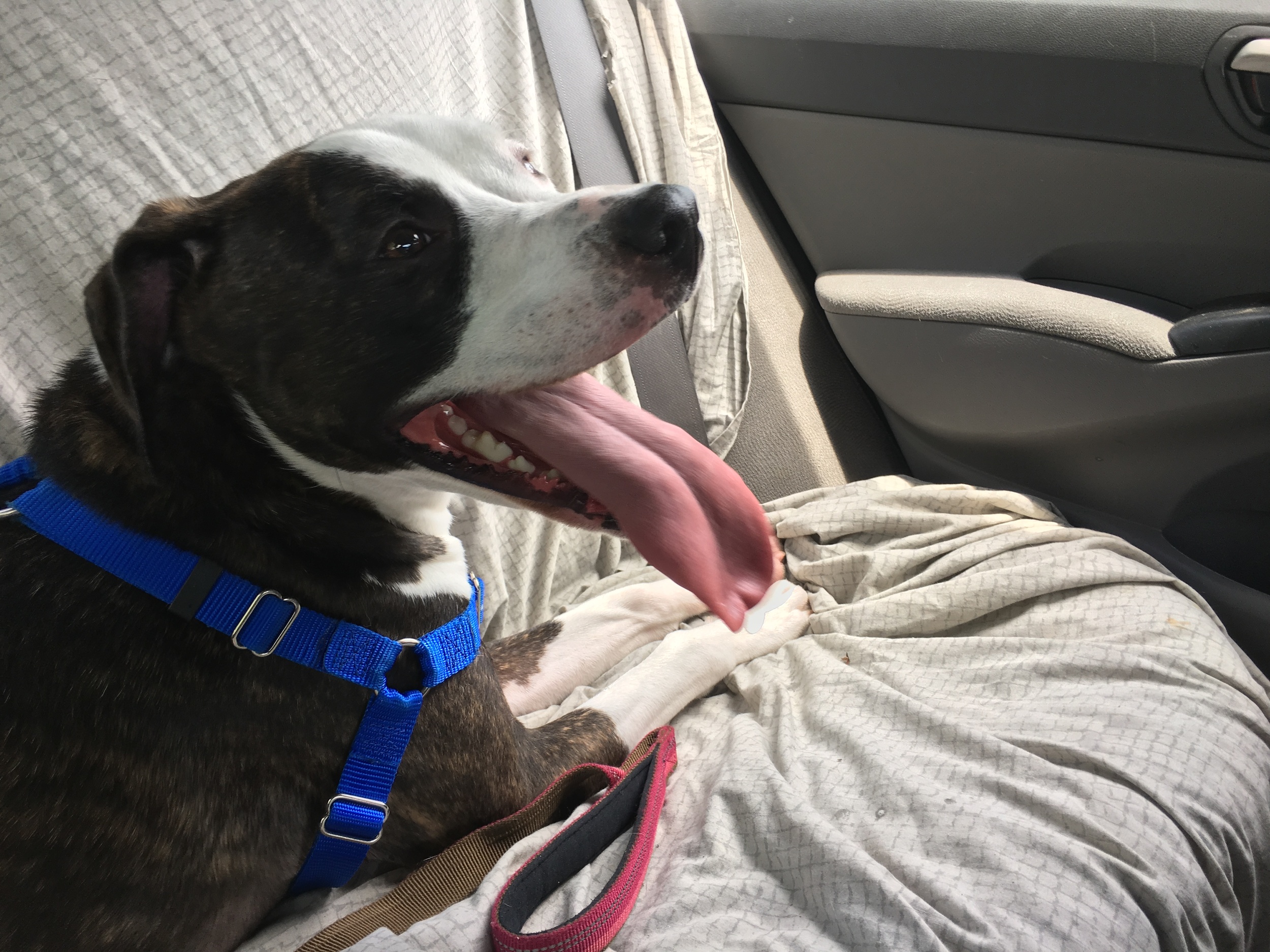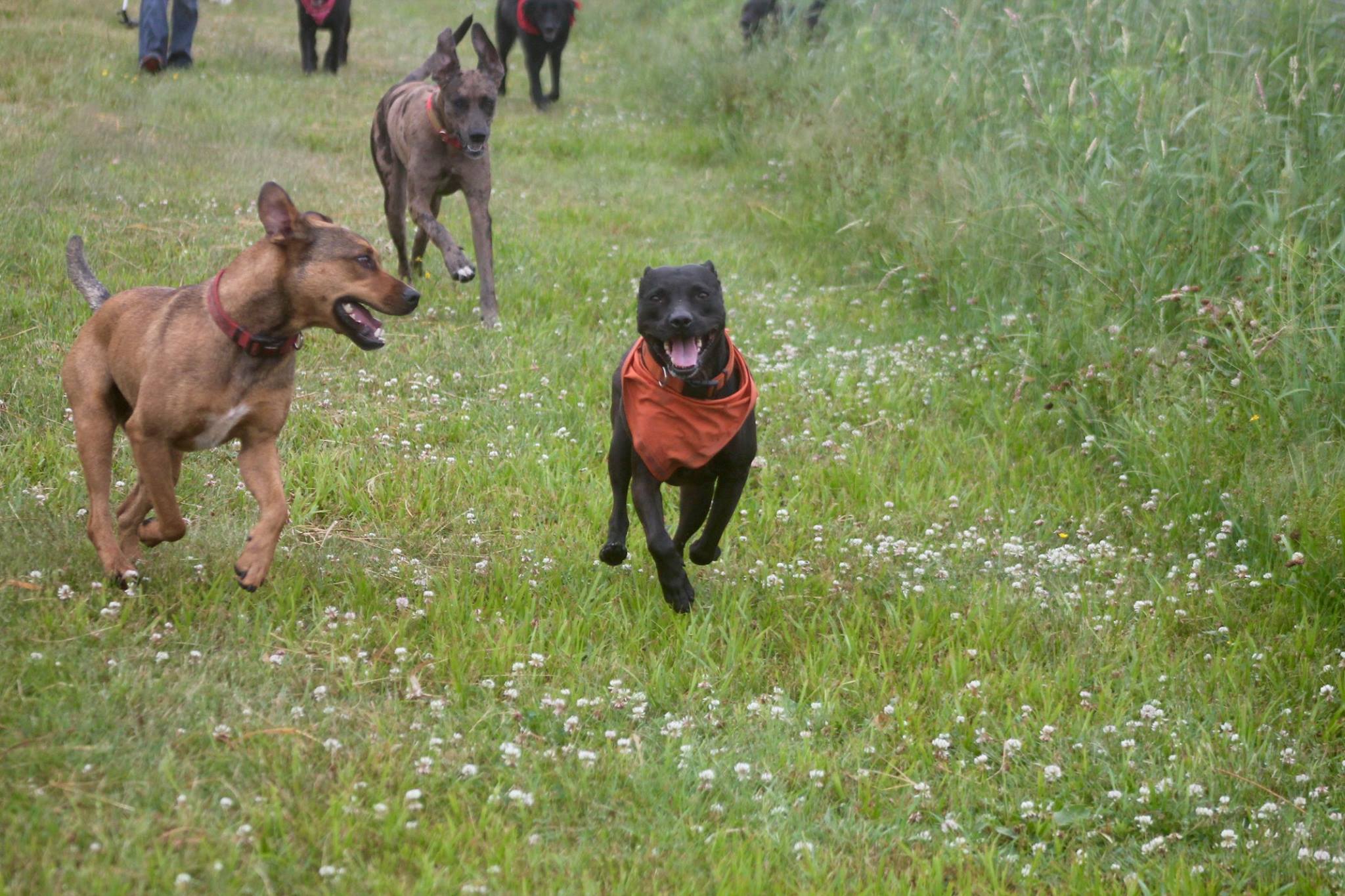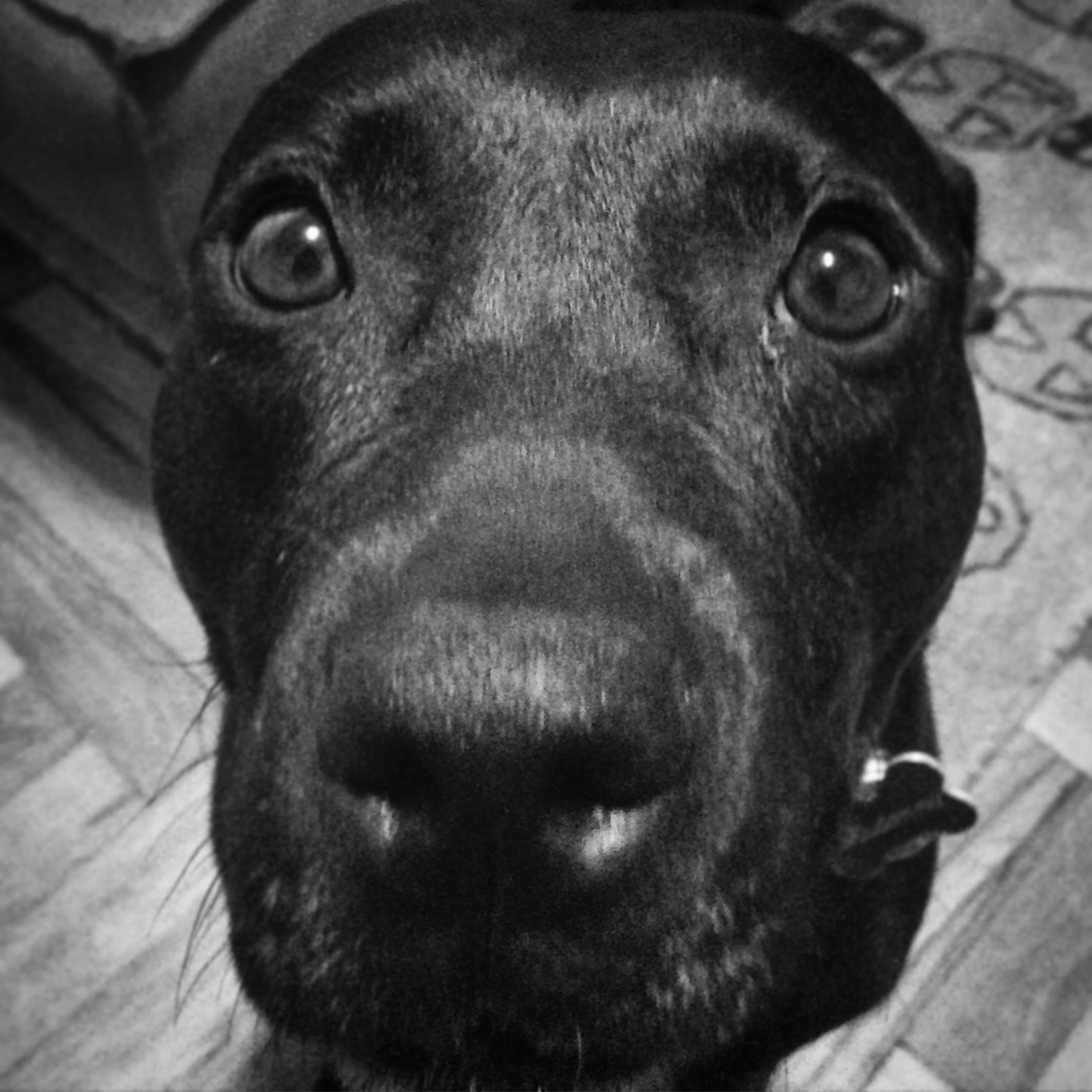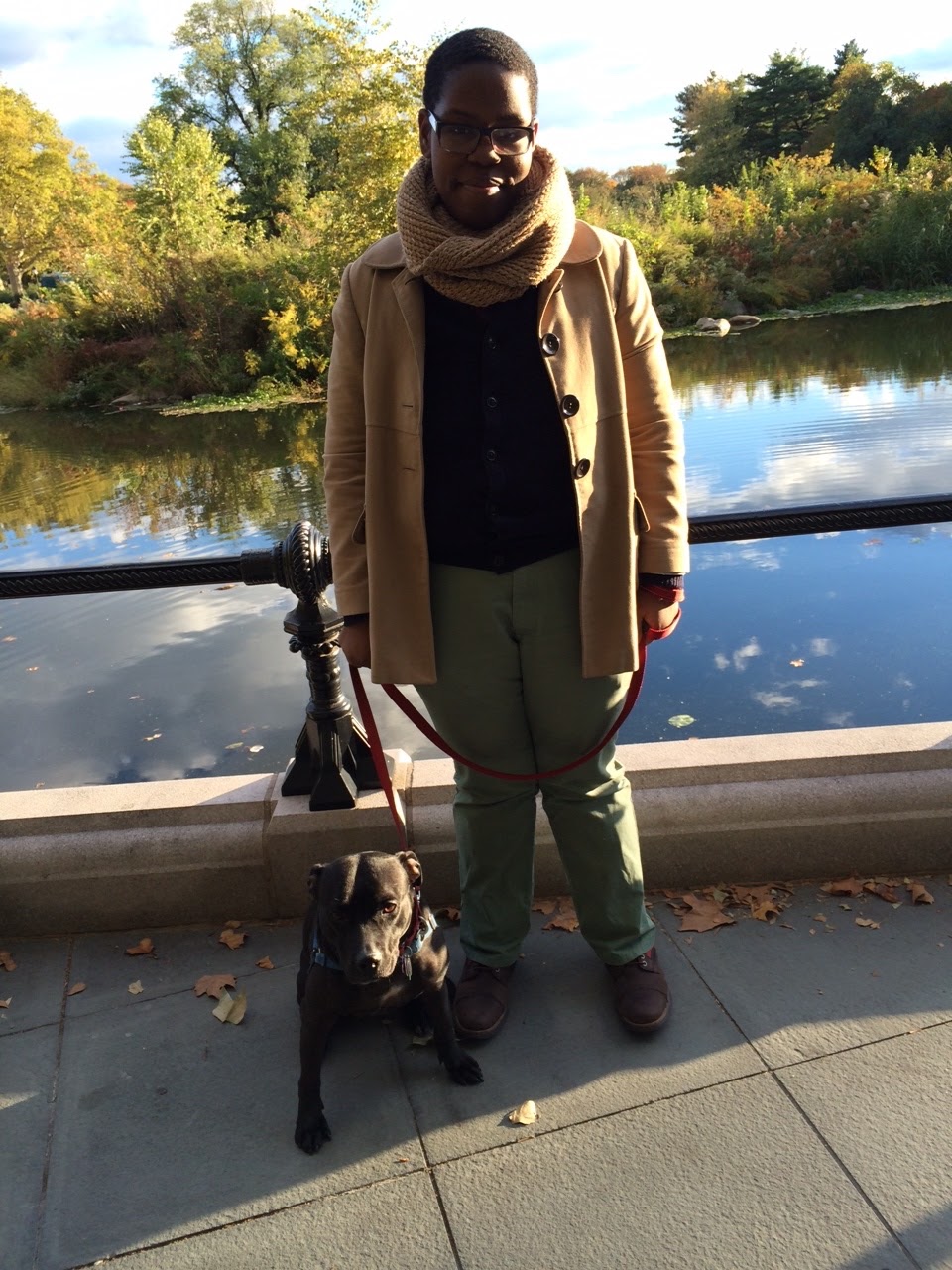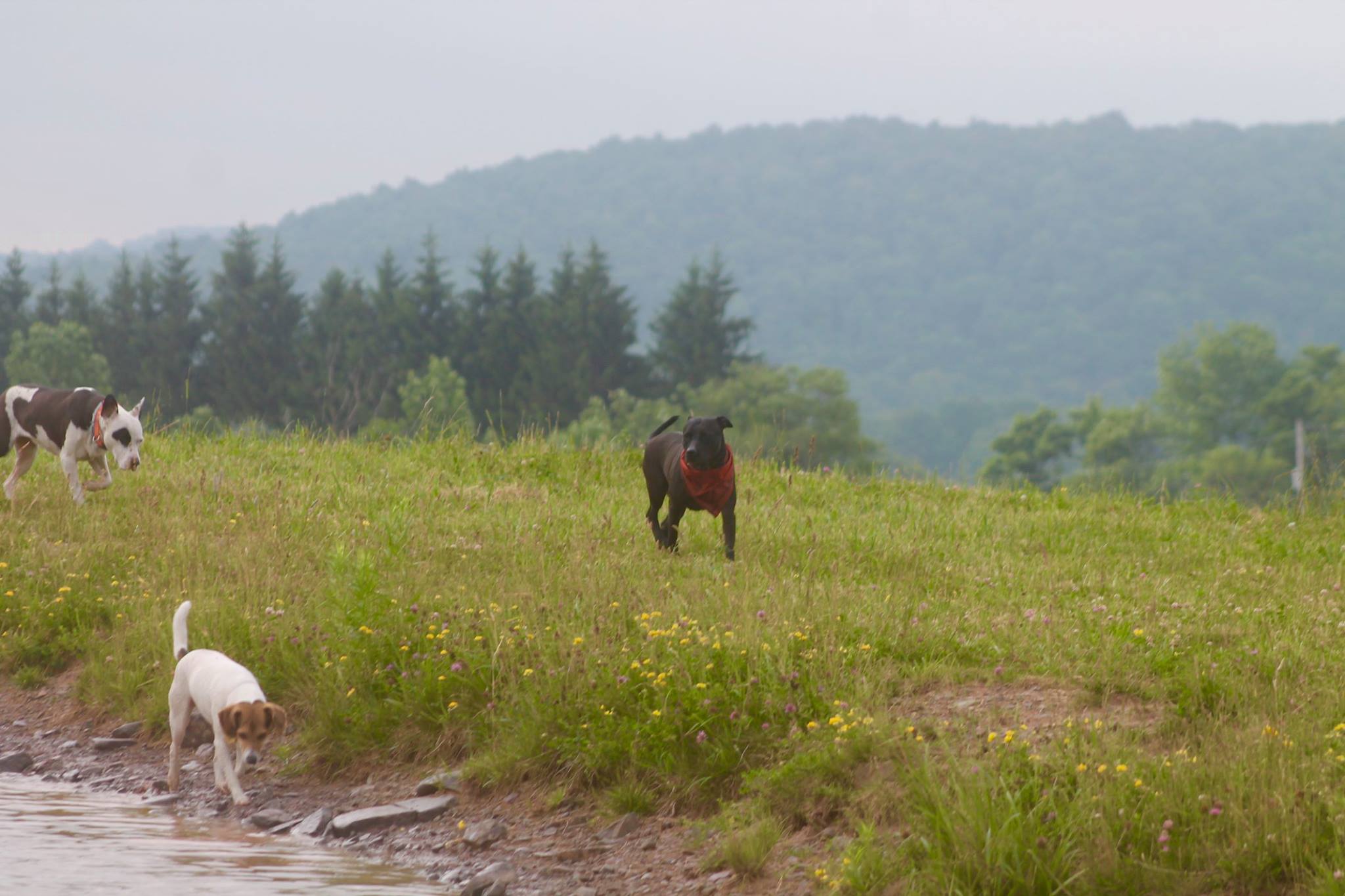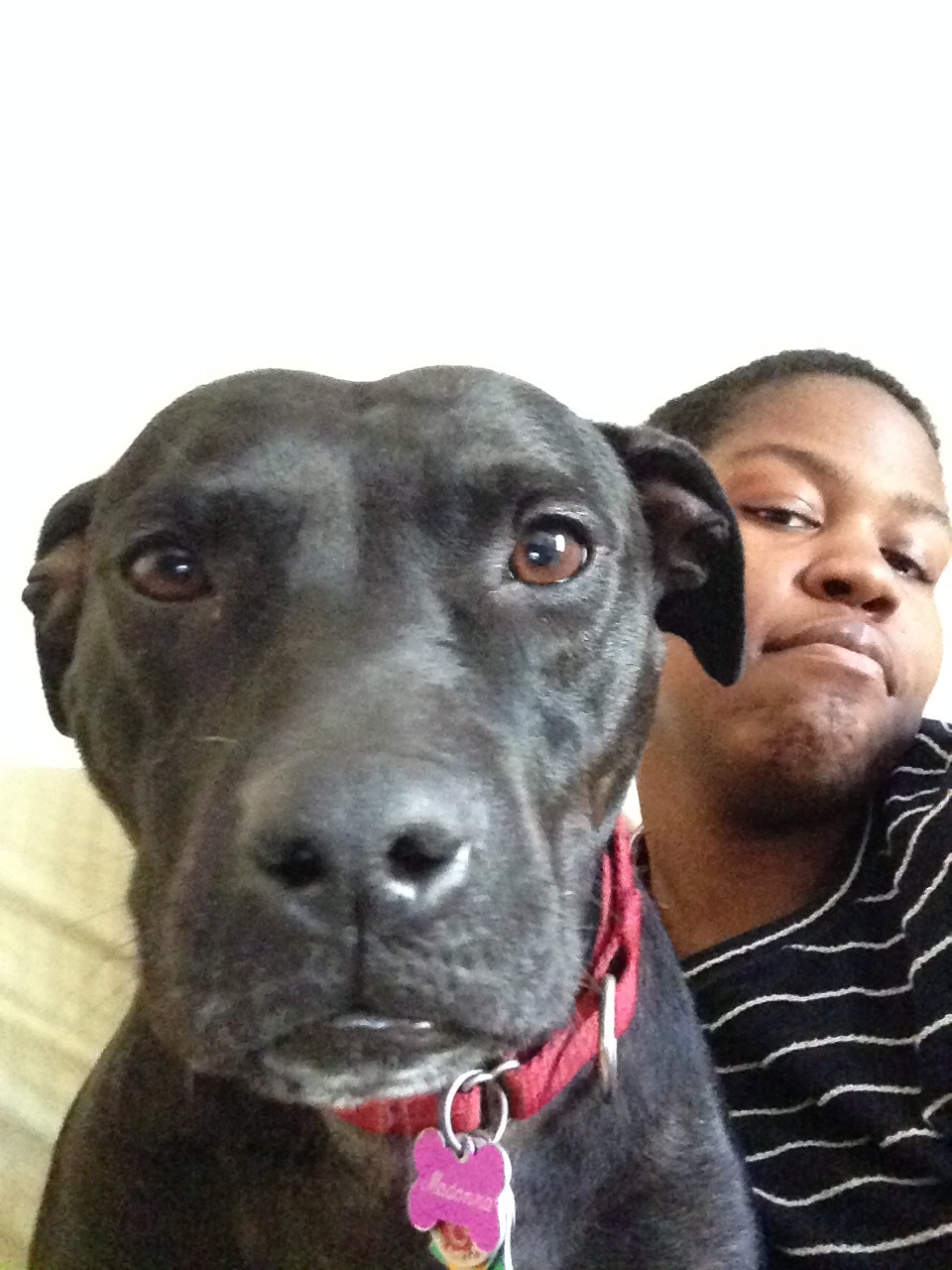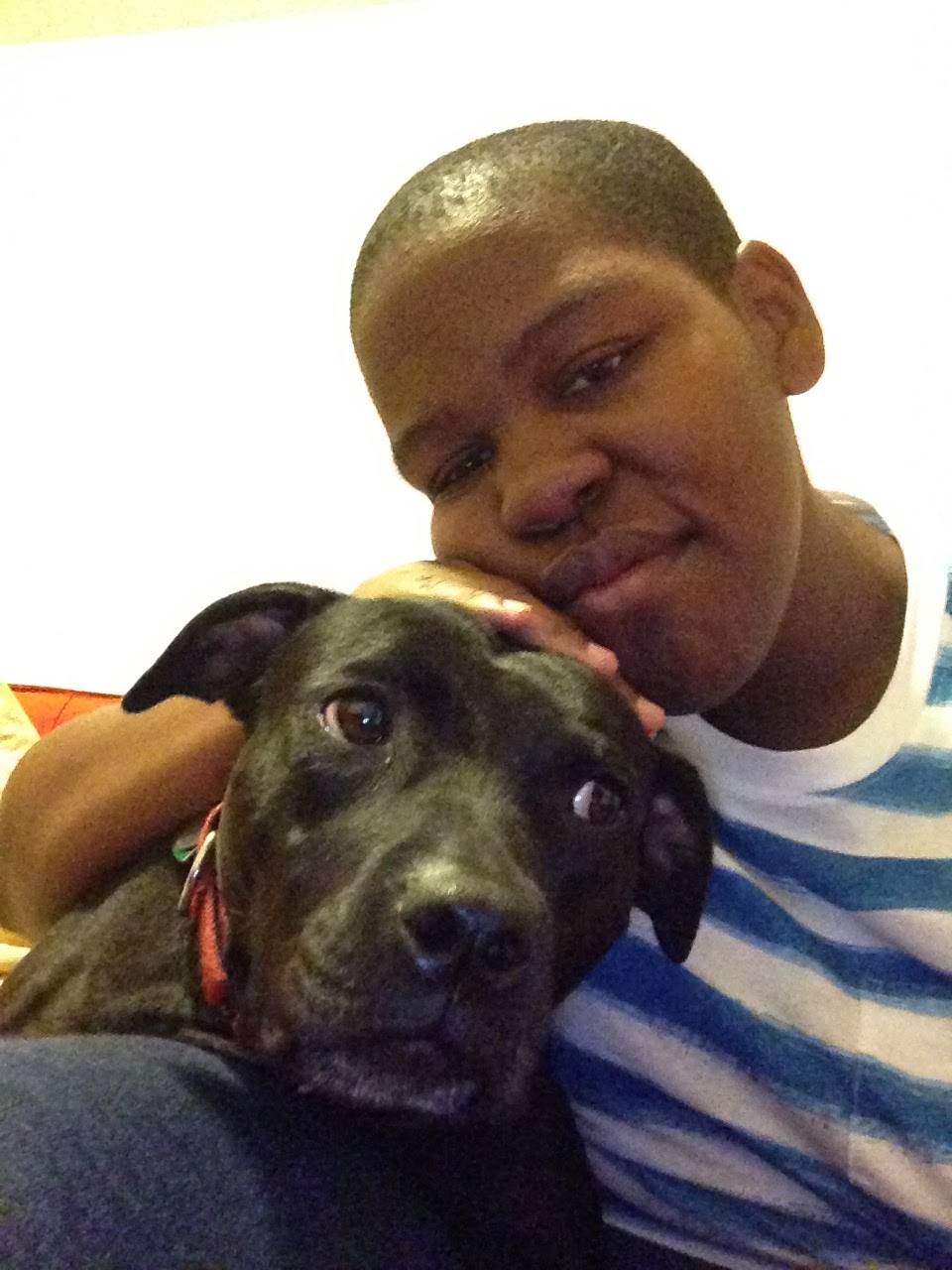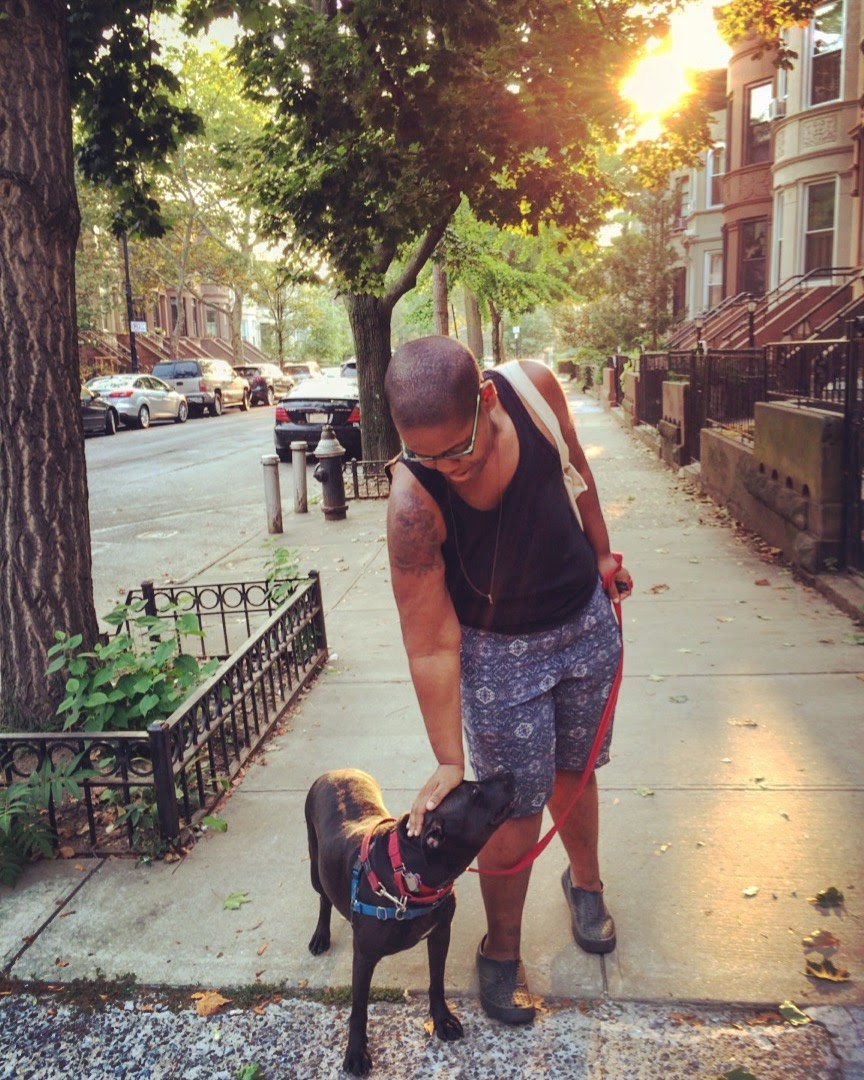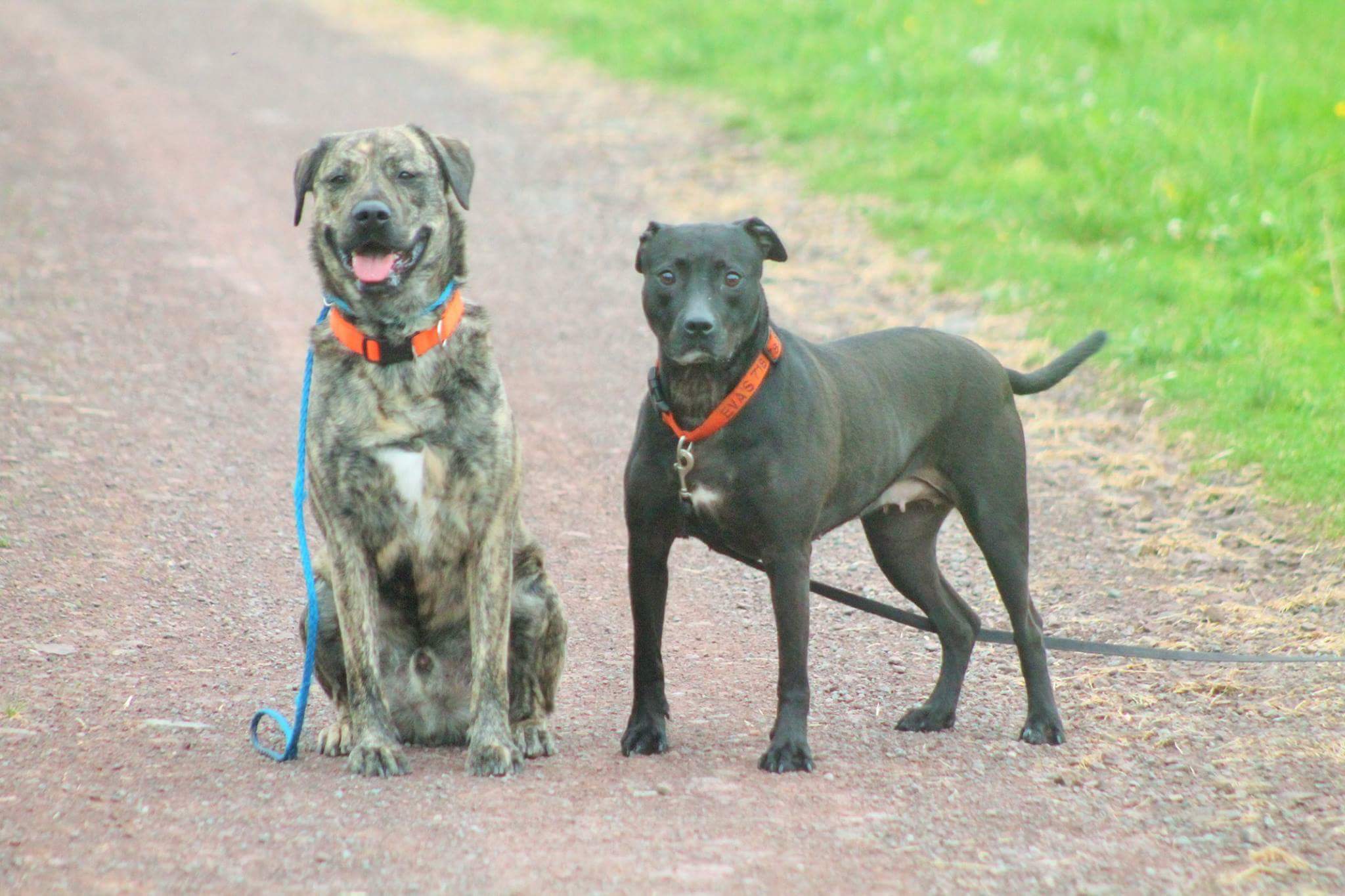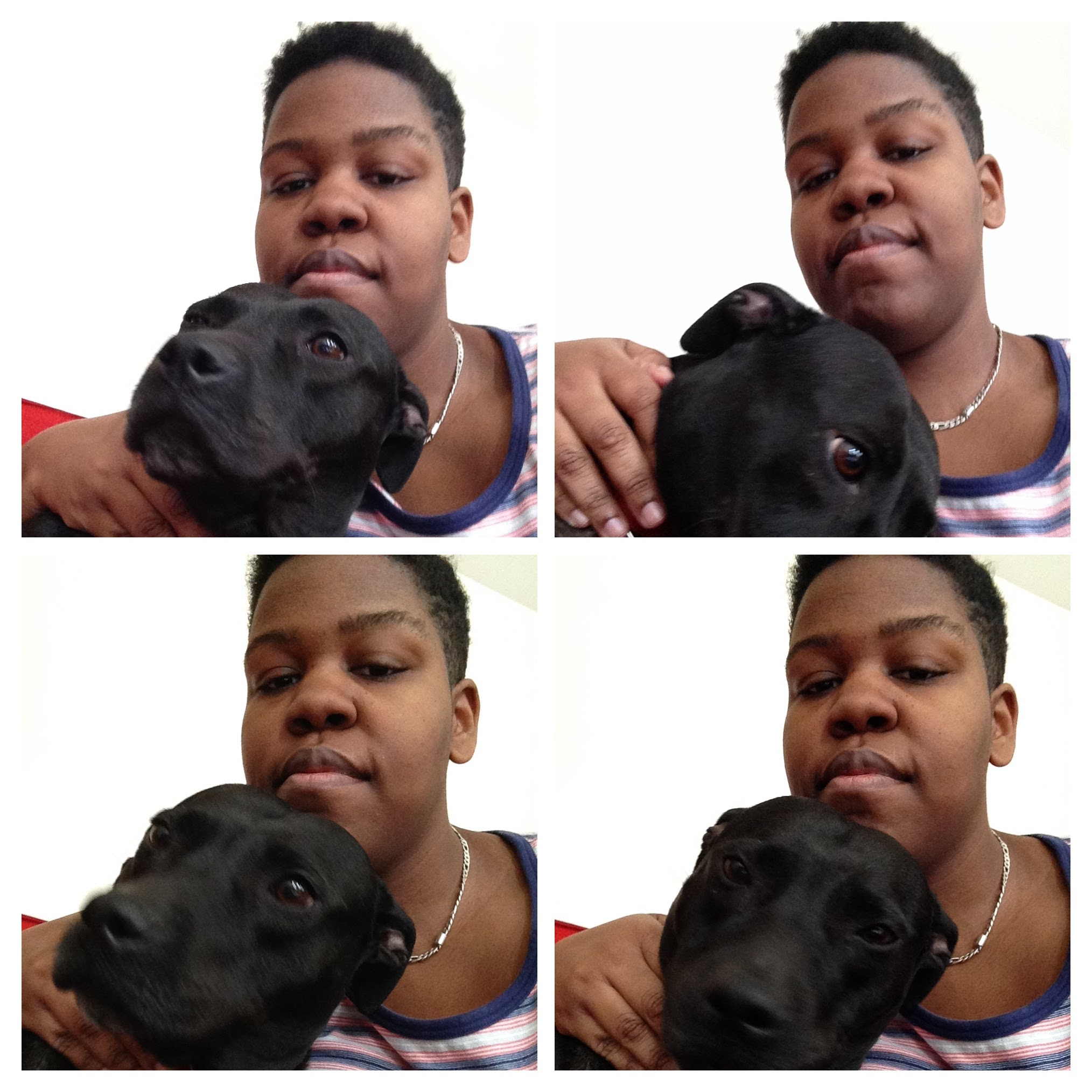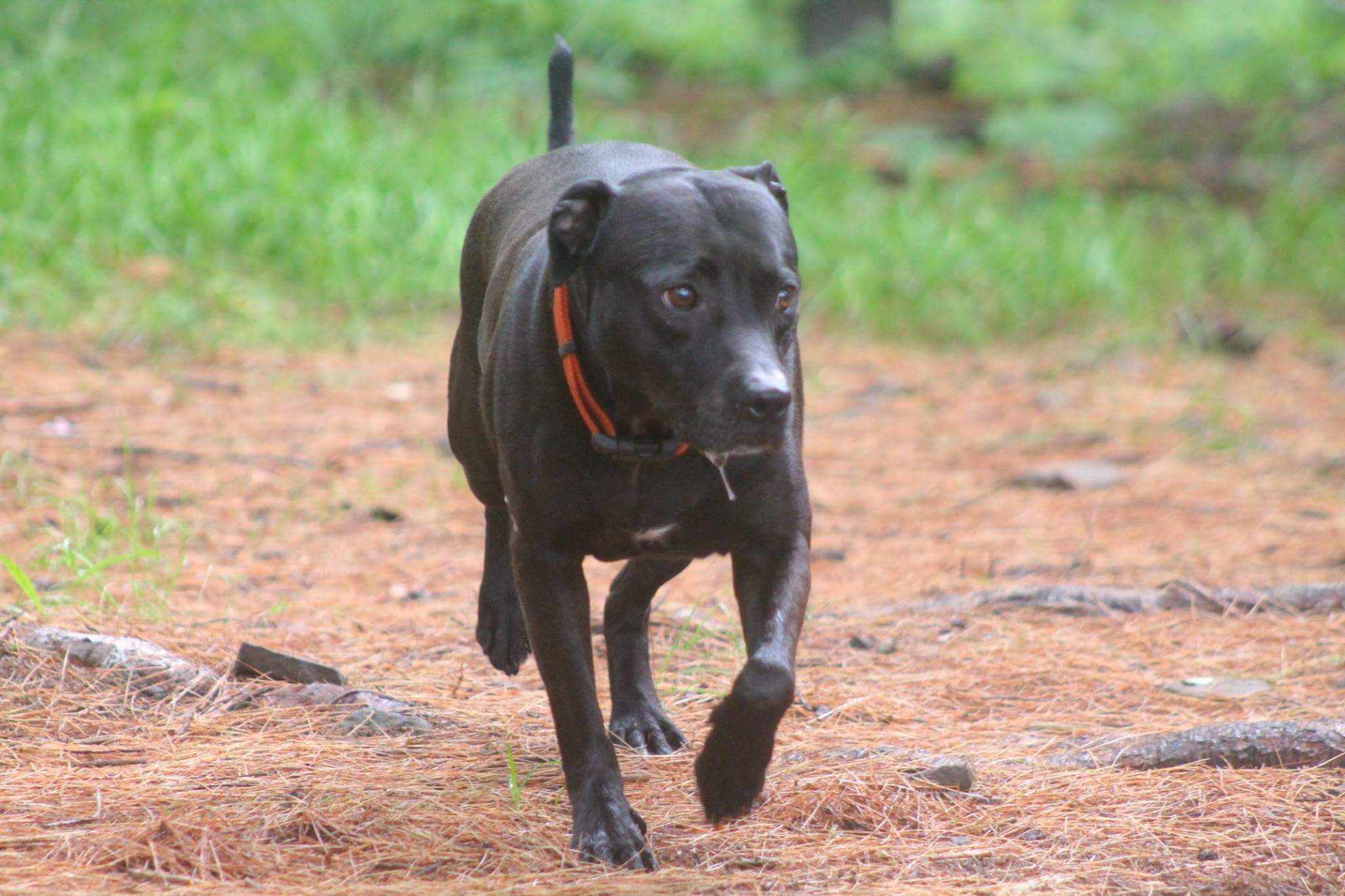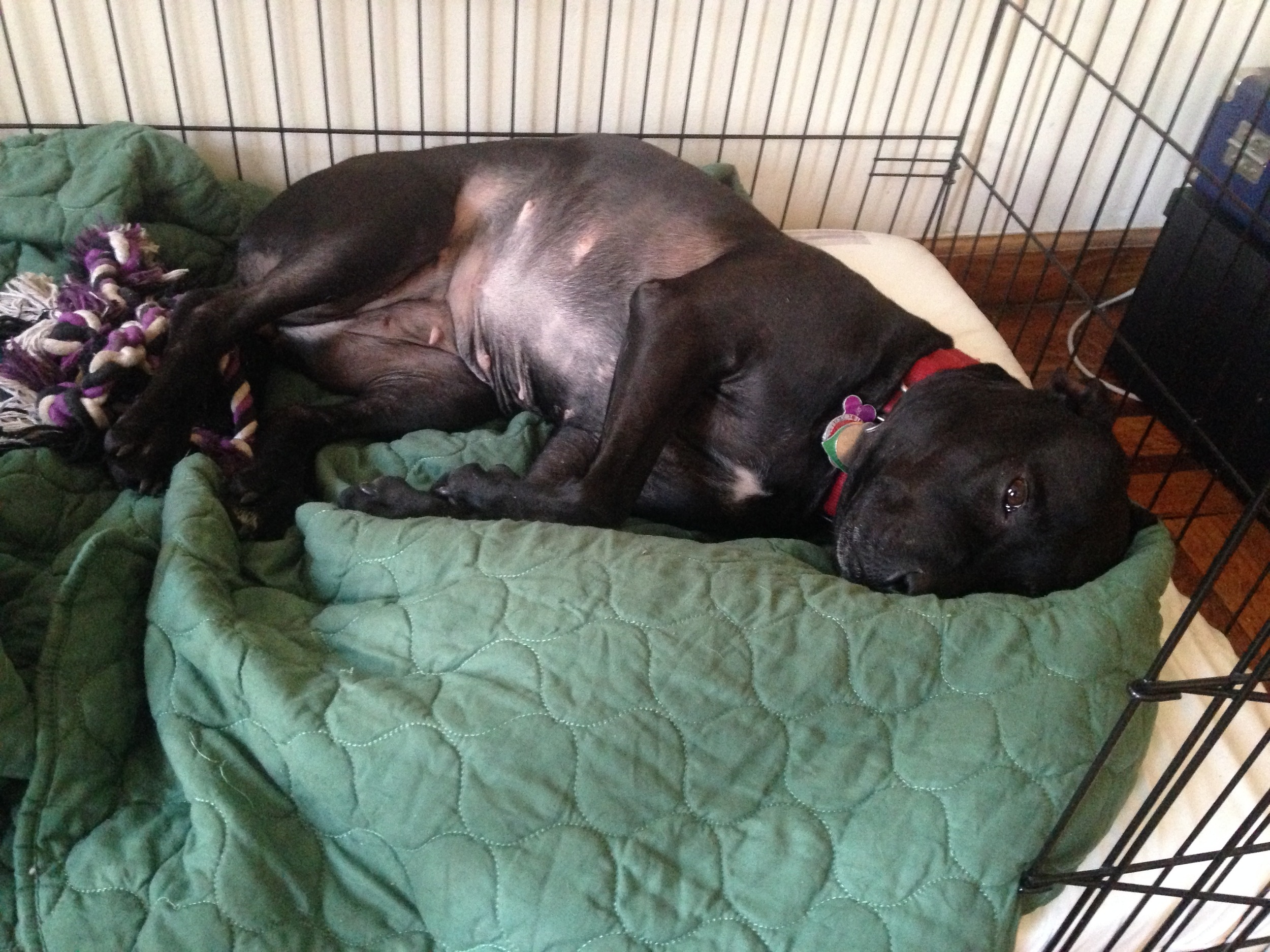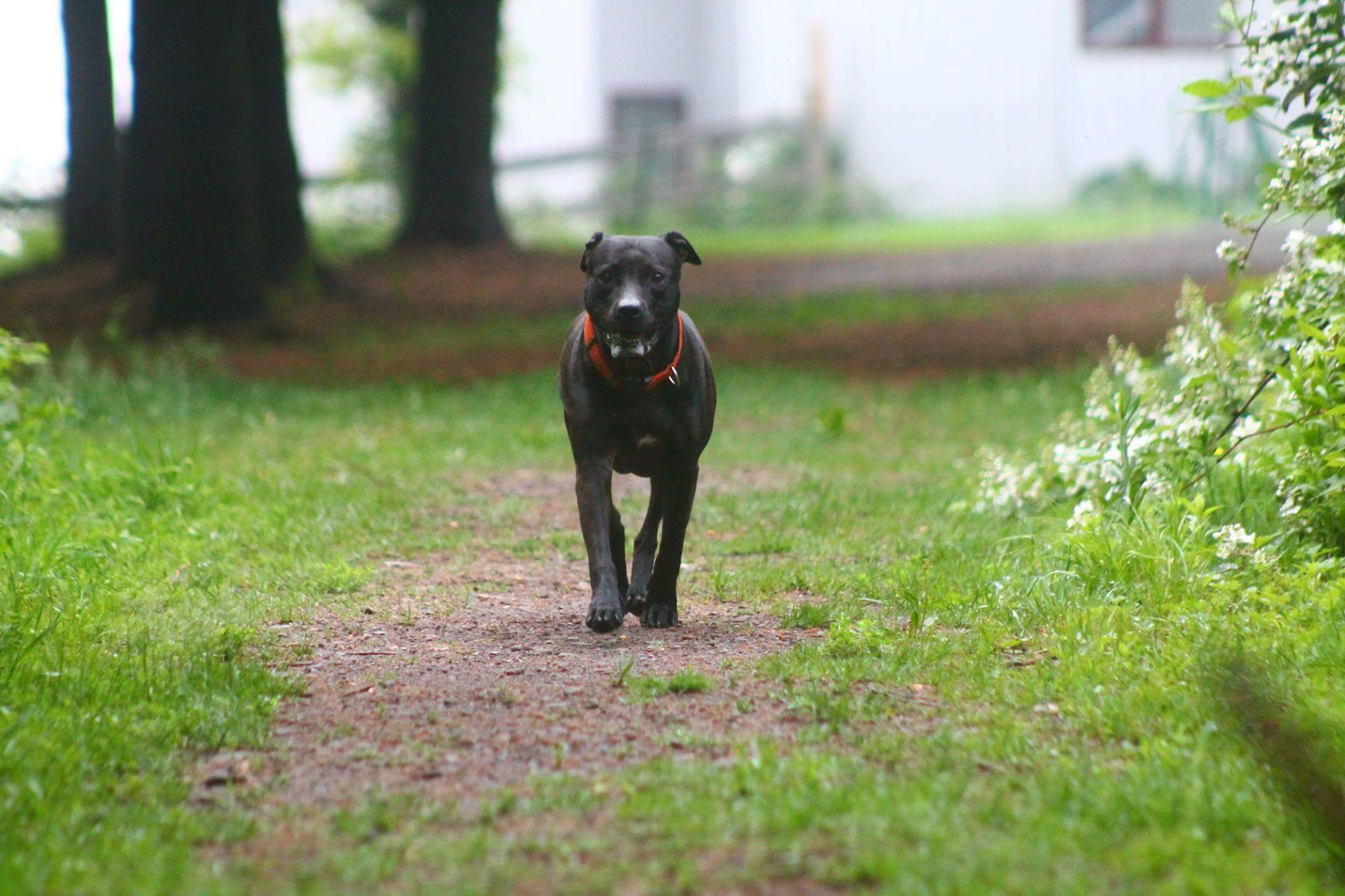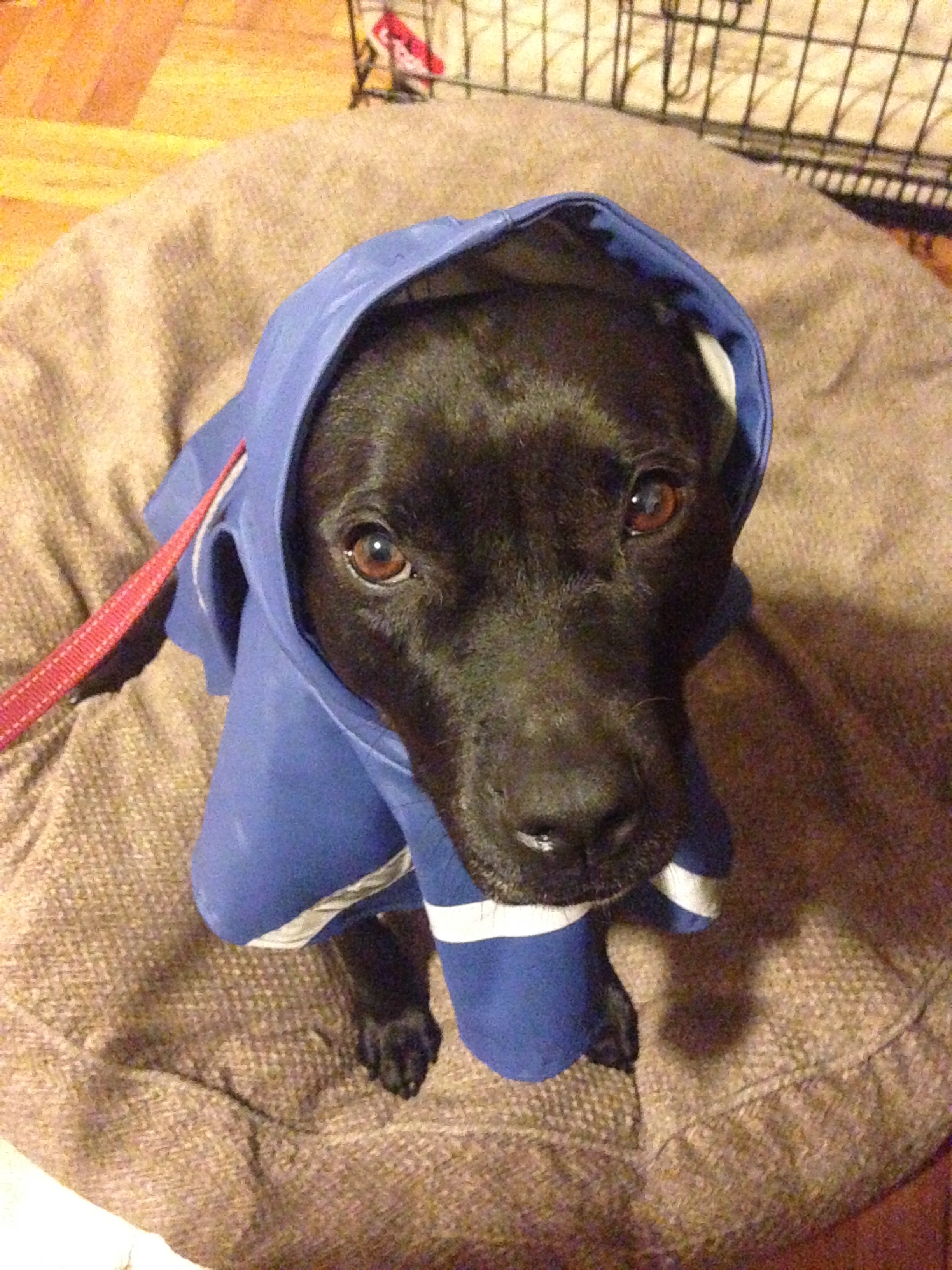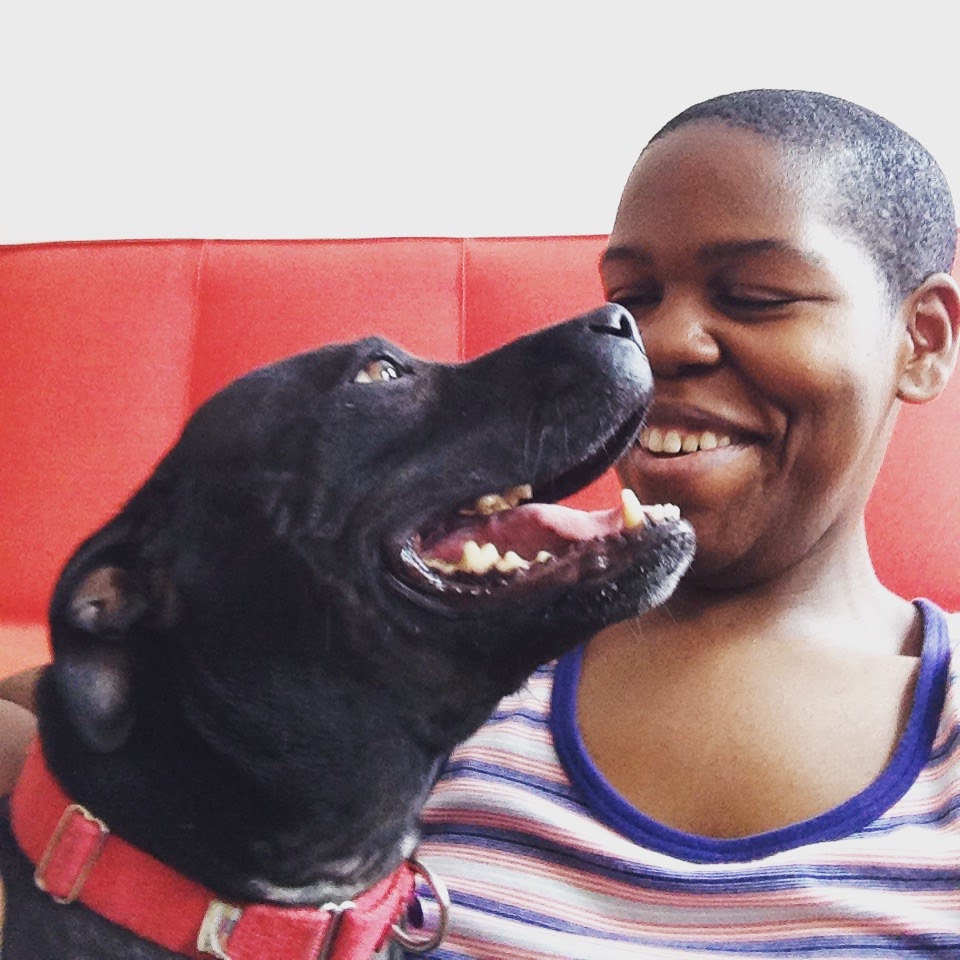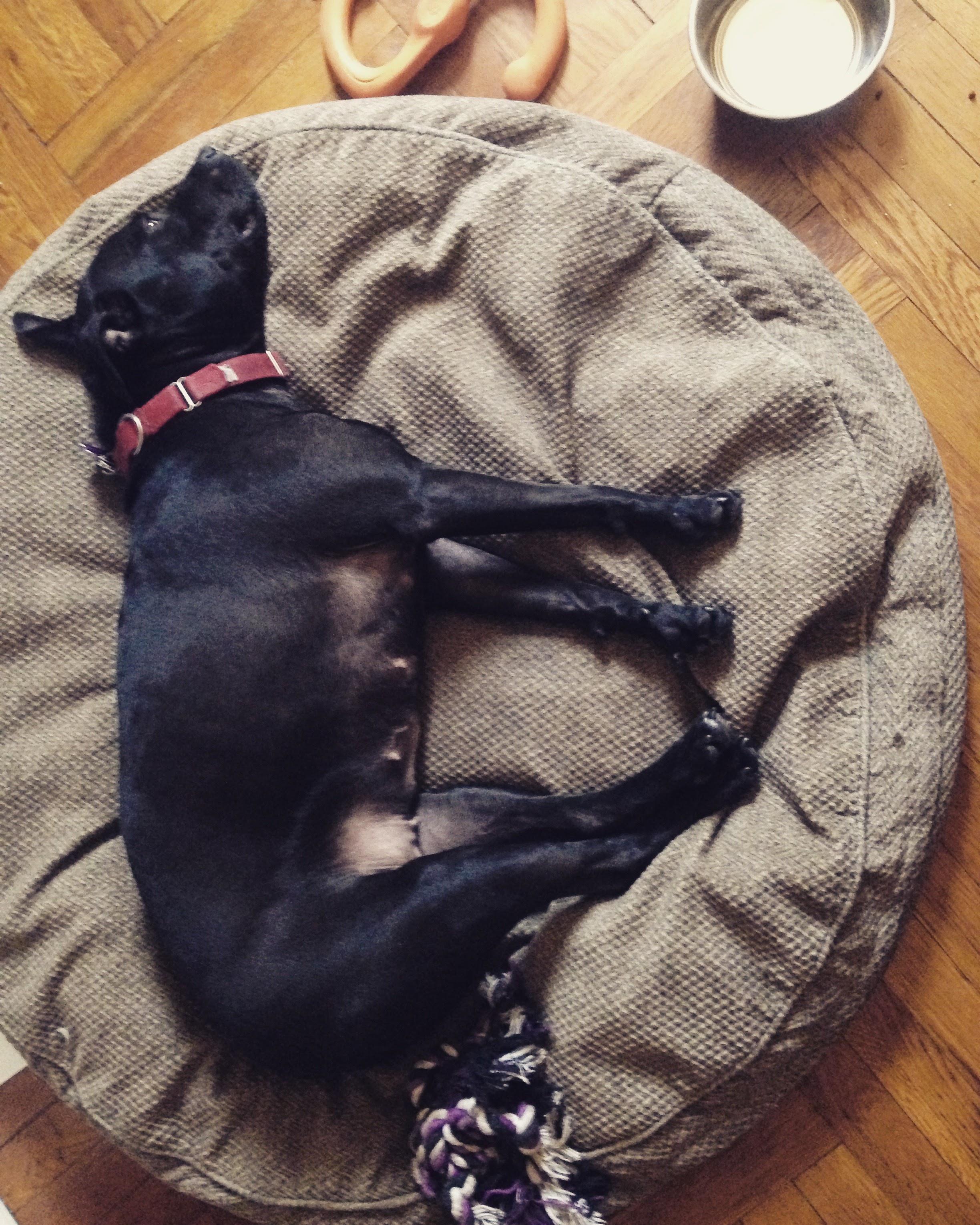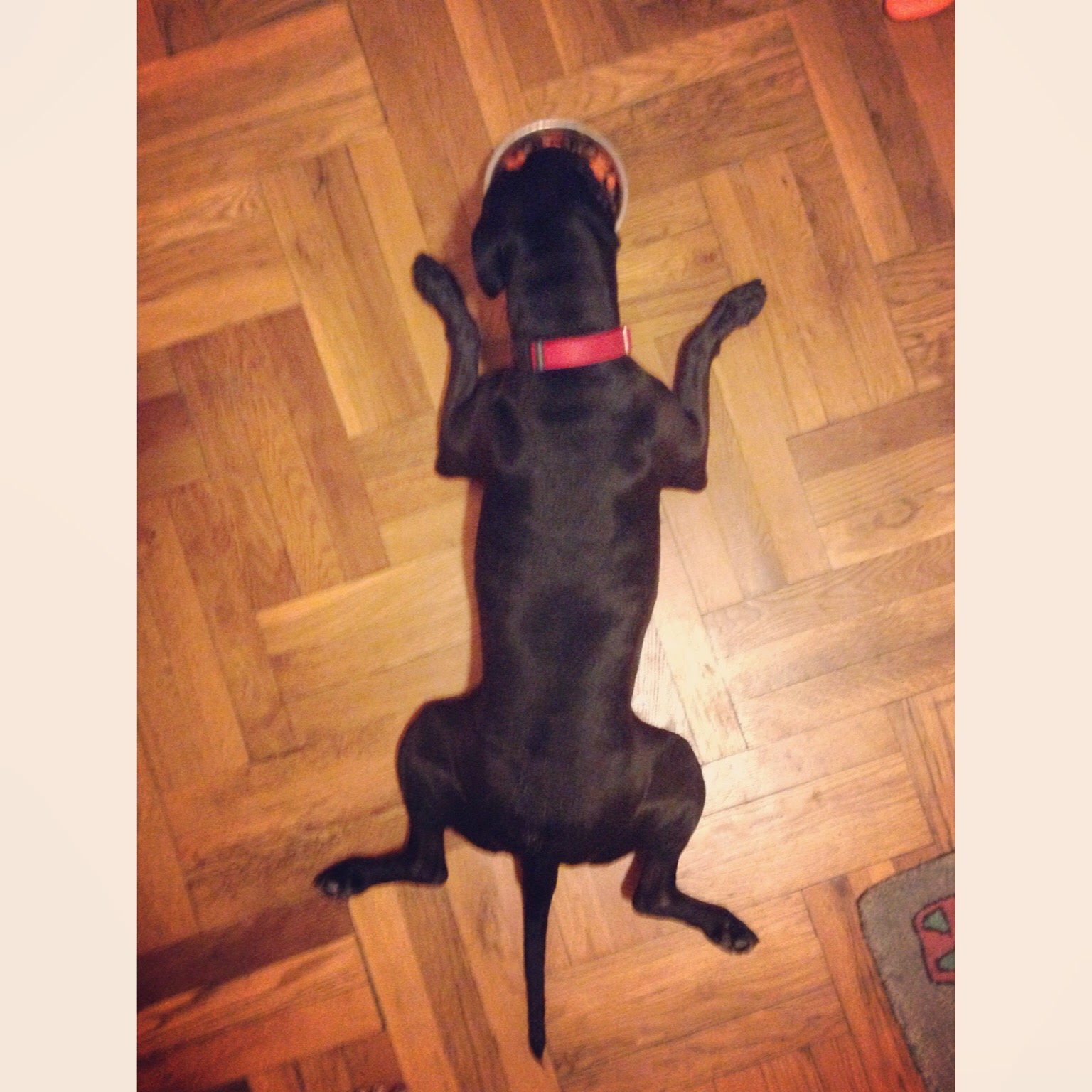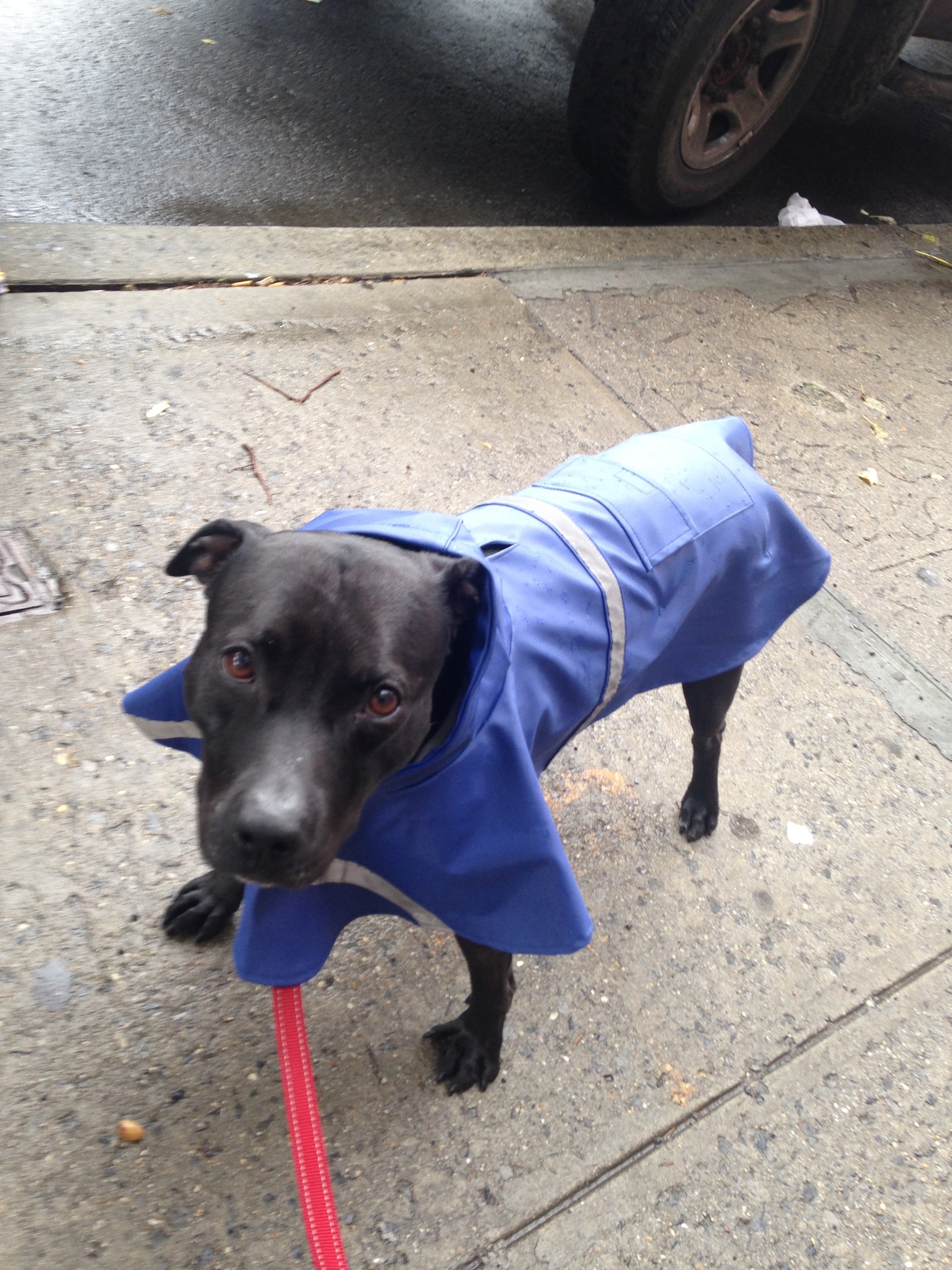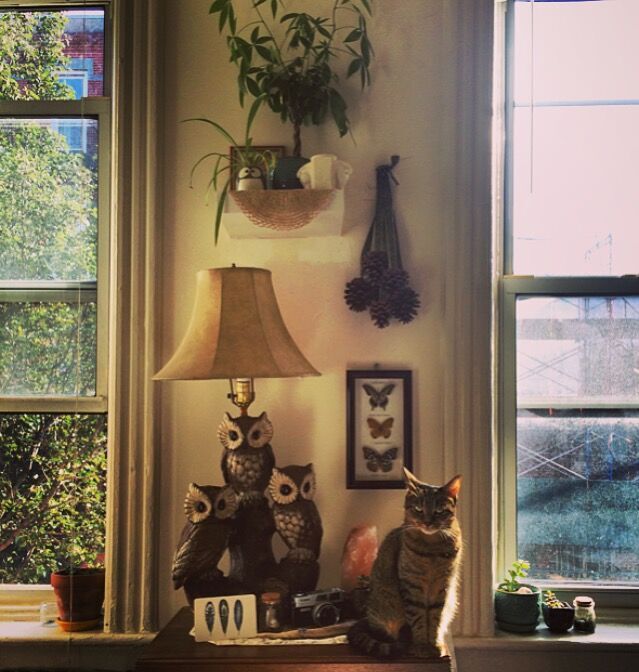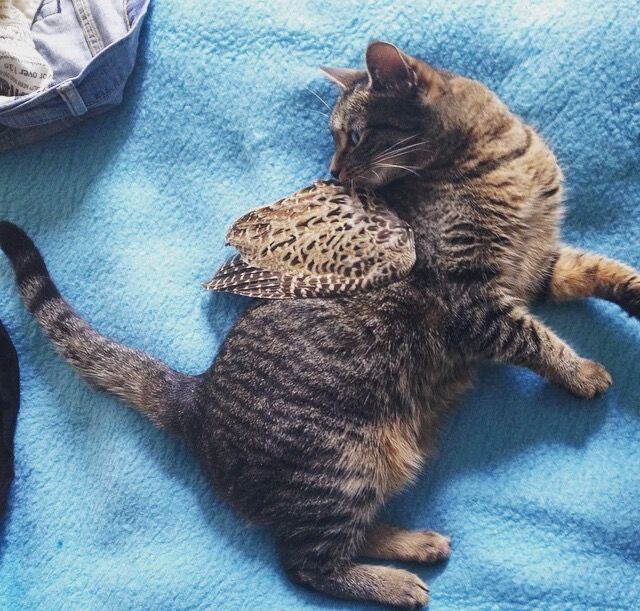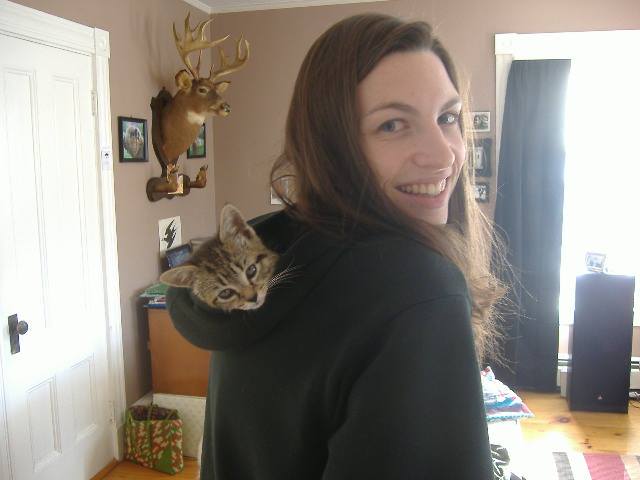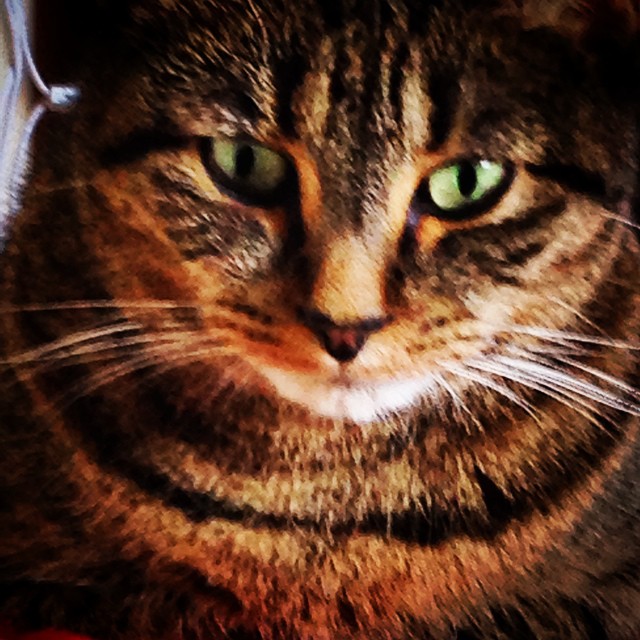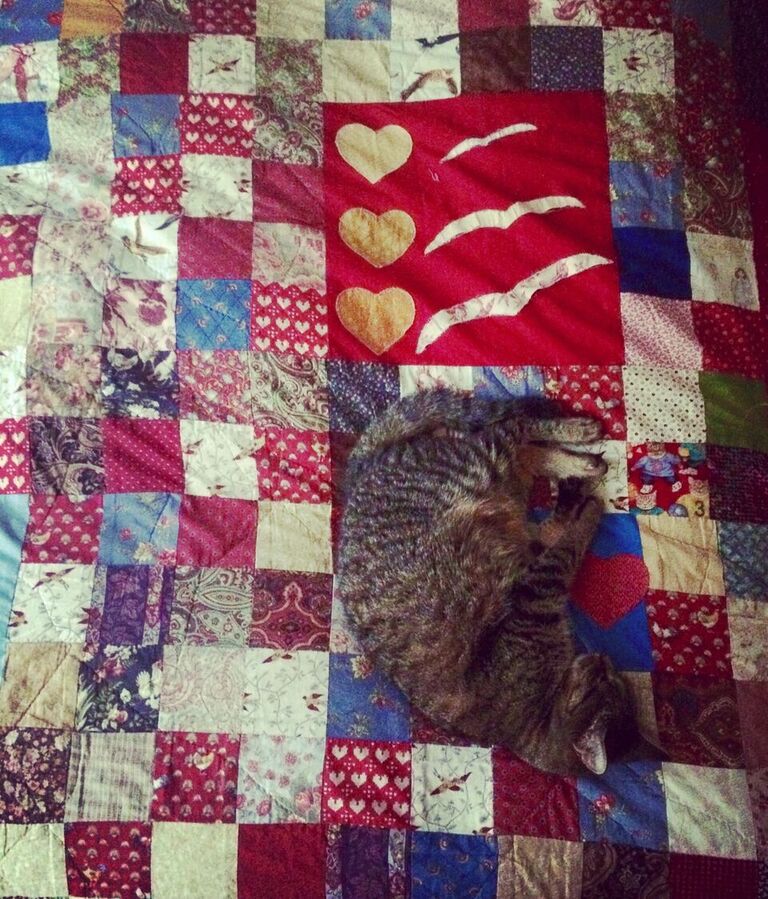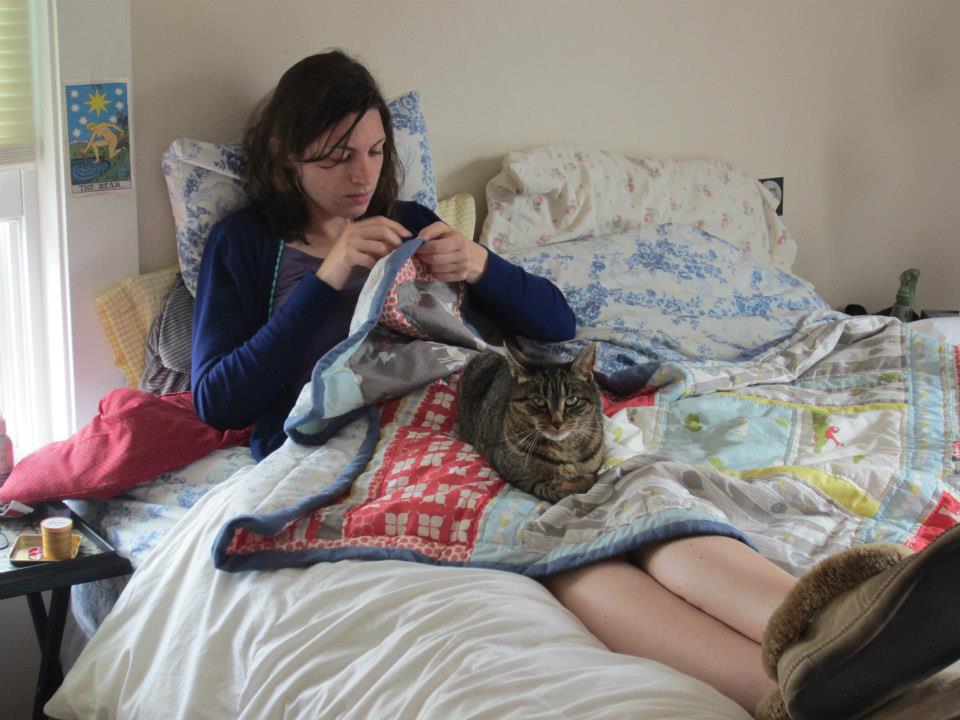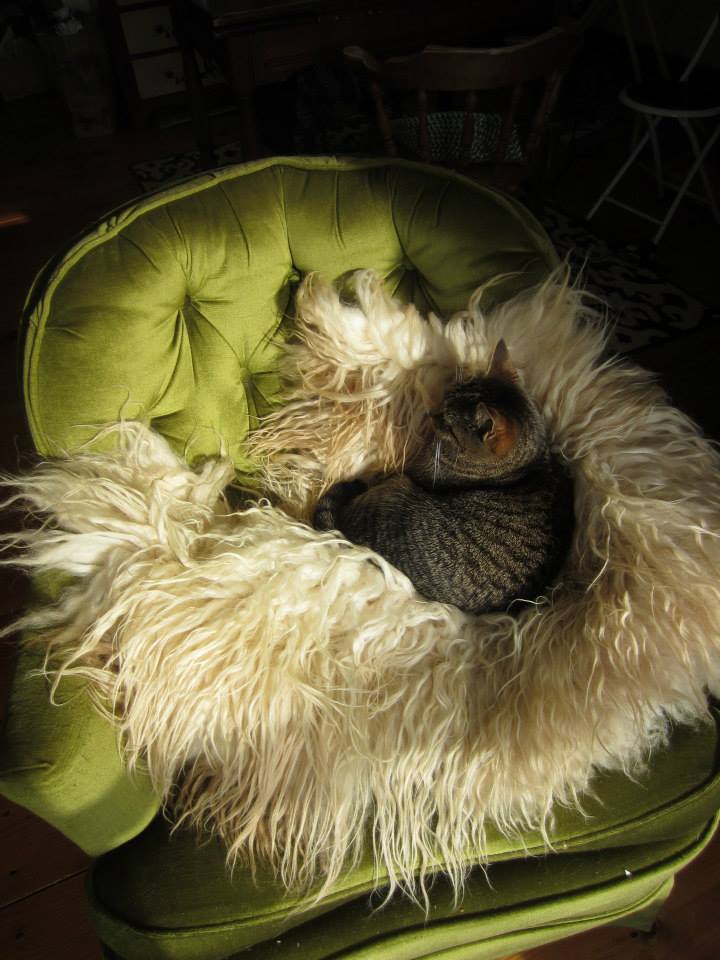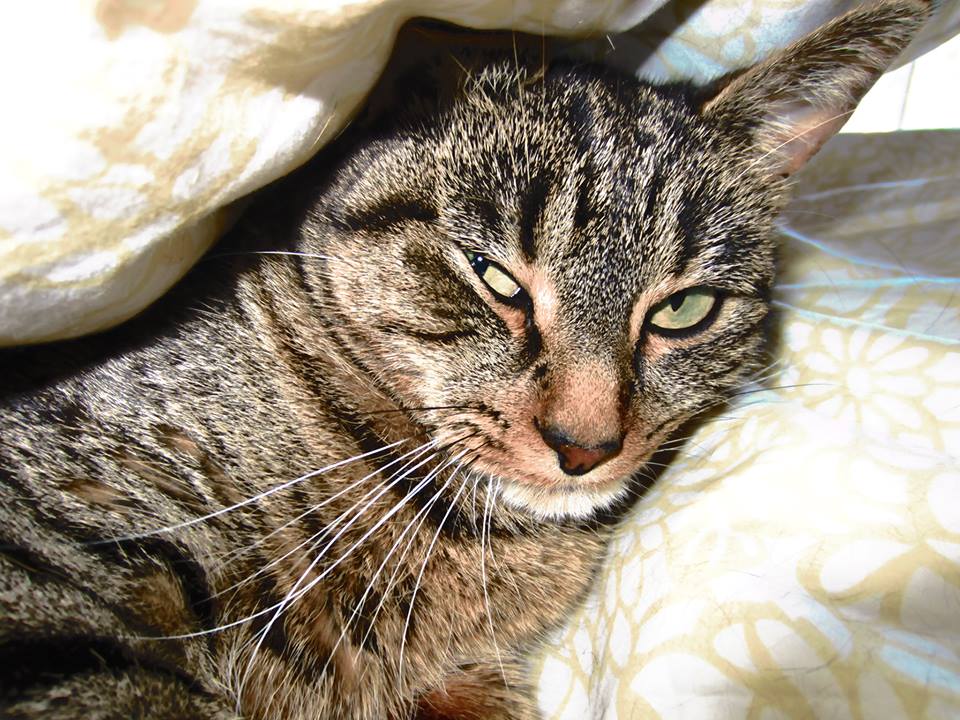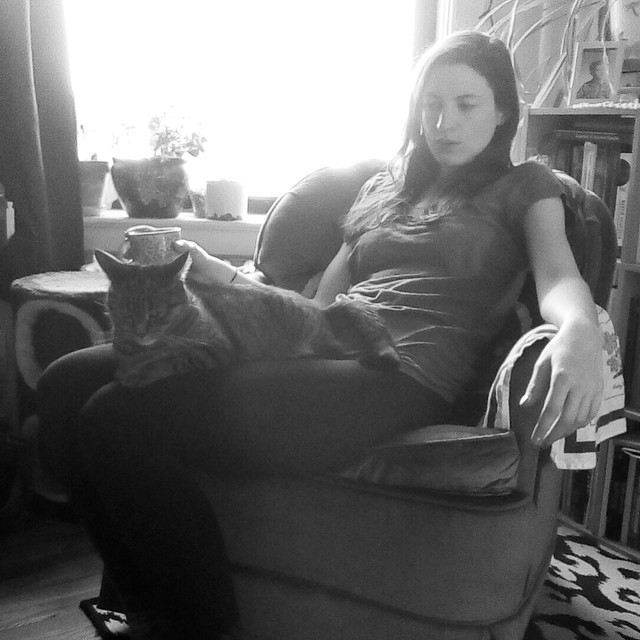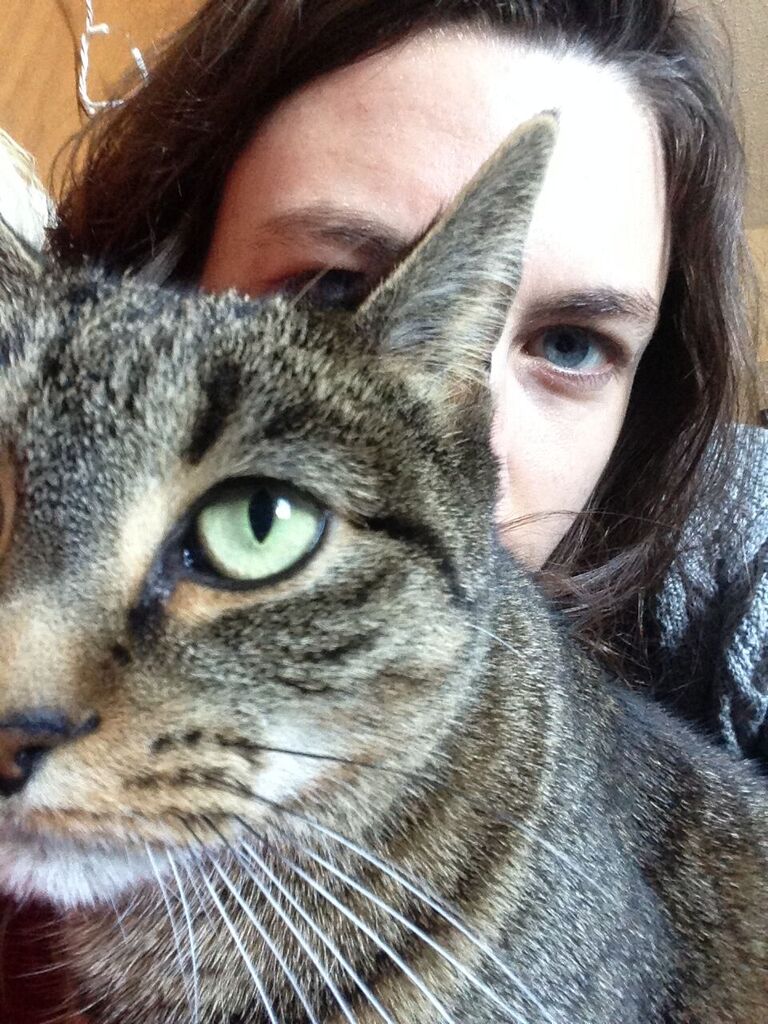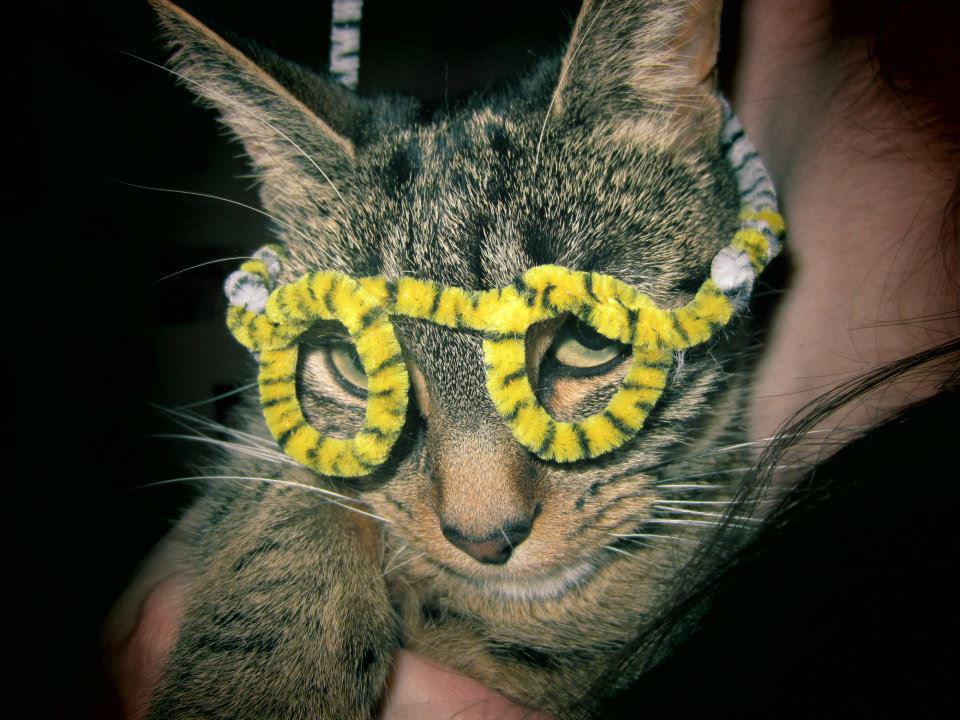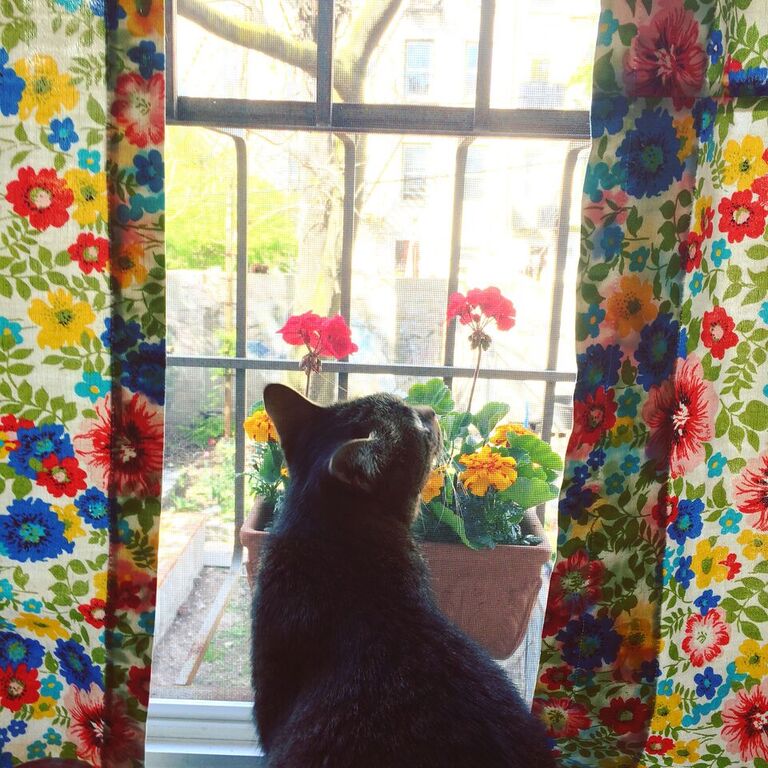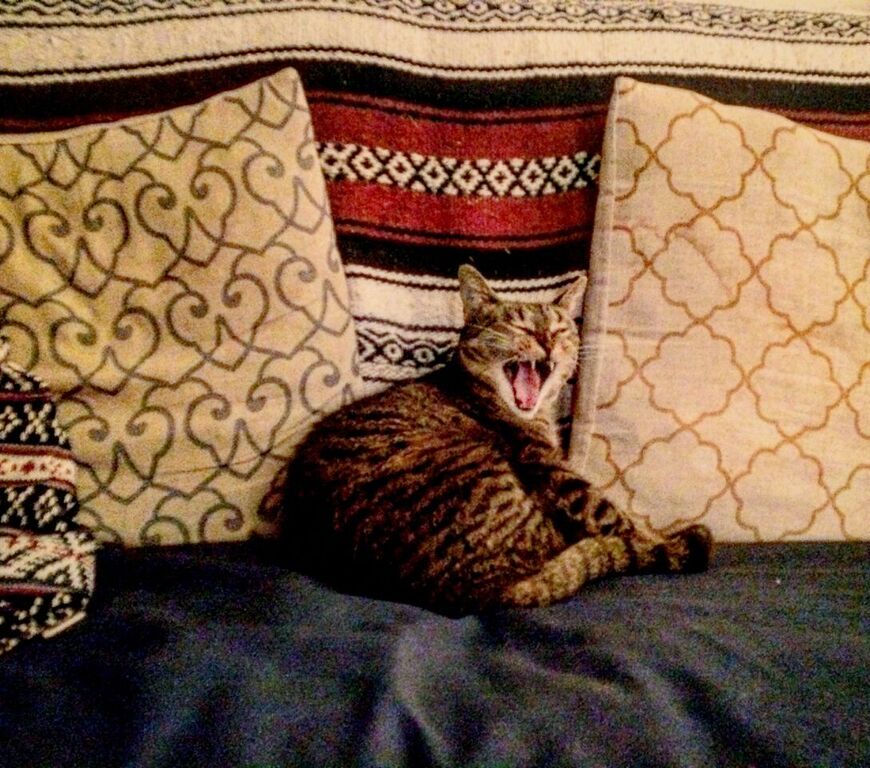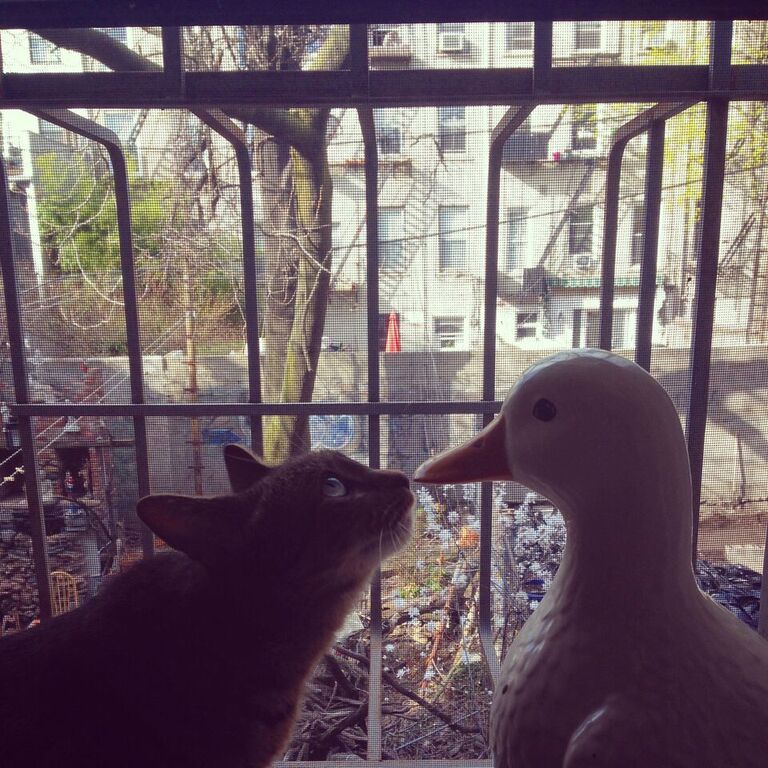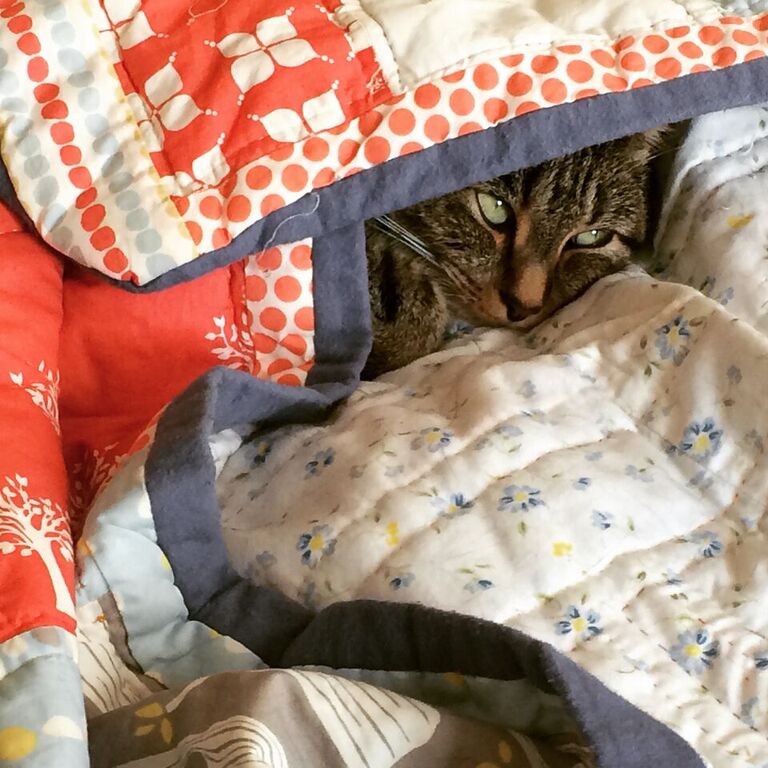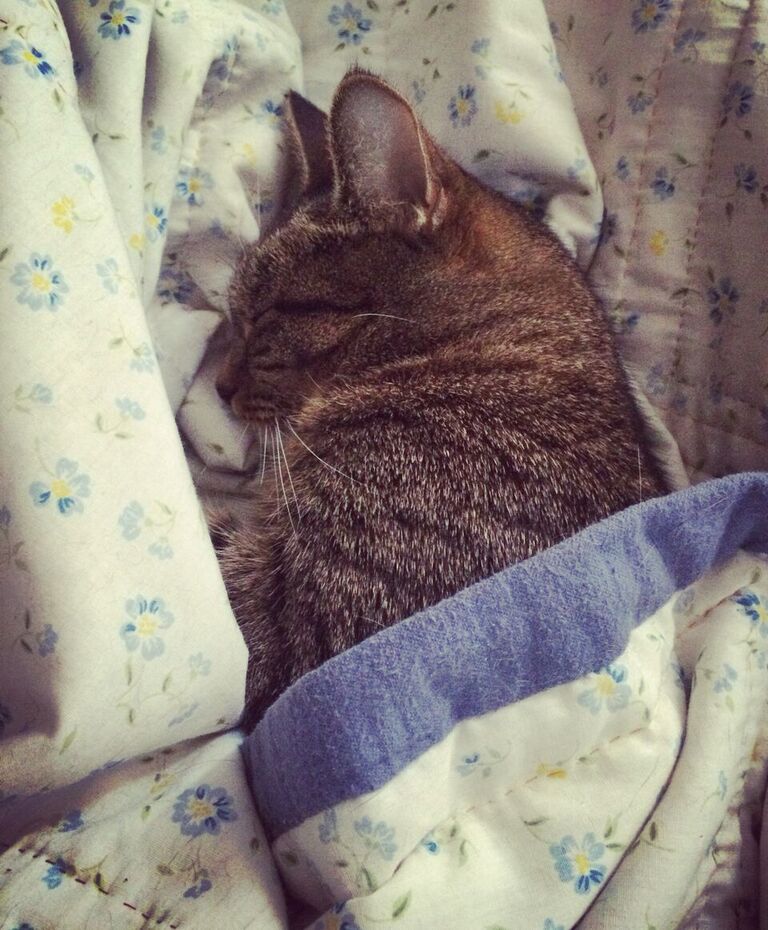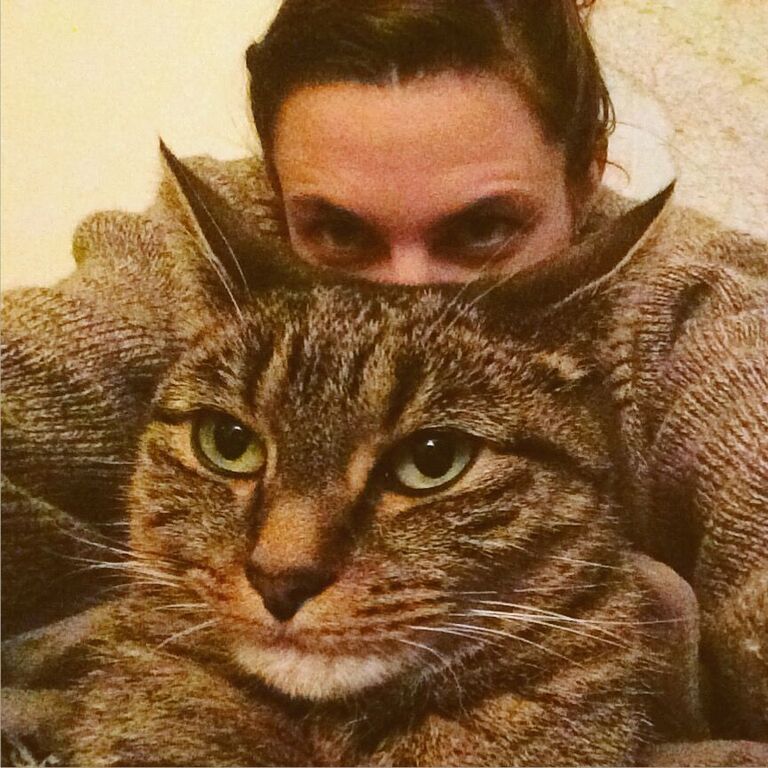
Gretchen Marquette: The Last Time We Were Strangers
Poet Gretchen Marquette on her life-making relationship with her dog Lucy, the creative process, Rumi's love dogs, and what animals have taught her about vulnerability.
I'll keep this short because I want you to experience Gretchen Marquette’s love stories about her dog Lucy and her insight on the creative process right now. But I will say, if you haven't checked out her first book May Day yet, do it. It sticks with you.
About Gretchen: Her work has been featured in Poetry Magazine, The Paris Review, Tin House, Harper’s, The Literary Review, PBS NewsHour, and other places. Her first book, May Day, was released in 2016 from Graywolf Press. She lives and works in Minneapolis.
Tell us about Lucy and your 14 years of companionship with her. Some favorite moments, memories?
I brought Lucy home on Mother’s Day in 2003. Lucy (then named Minnie) had been living at a shelter for six months, and was a little over a year old. I’d gone to the Humane Society with a friend to see if they had any rabbits, but while we were there, he convinced me to look at the dogs, and the second I saw her, I knew she was mine. I visited her several times, and went through the long application process they required, but eventually I was there handing a green leash over to the woman behind the counter. She said, “This morning I told Minnie that she’s finally going to her forever home.”
Now that I’ve written that, it sounds saccharine, but it wasn’t. Lucy had shown up there in pain and a little underweight, and watched her littermate be adopted and disappear three days into her own six month stay. She arrived knowing no commands, and with an infection in her leg so bad she couldn’t step on it. She wasn’t spayed, and didn’t know her own name. I didn’t know it yet, but here was a dog that wanted to be touched all the time, and she had gone so long without any consistent affection. And all of that was over for her. She did have a home.
There have been dark times in my life, but rescuing Lucy and giving her the love she wanted is one thing I know I’ve done right, and one reason I’ve been glad I was alive to help her. We’re getting into an It’s a Wonderful Life moment here, which is the opposite of trying to prove all this isn’t saccharine, so I’m going to stop there.
When I took Lucy outside of the shelter, she was too afraid to get in the car. It turned out she was afraid of everything. While we stood there, a strong wind blew, and she cowered in the grass and peed. It had been so long since she’d been outside, and her entire puppyhood had been spent in a small outdoor kennel. I knew I had to lift her in the car, but I was afraid, too. Would she bite me? It almost makes me cry, remembering this, because it was the last time she and I were strangers to one another. That night she slept in my bed after a lifetime on a concrete floor. She’s slept beside me every night since.
It’s hard to pick the stories I want to tell about my life with Lucy – I could write pages and pages, and this is especially true because until July of 2014, there was another dog with us – my husky, Sage. Sage and Lucy were not very close most of the time, but were partners in crime when it came to getting in trouble – running away in particular.
Once, I got a phone call from an unknown number. It turned out that someone had left the gate open at the house I was renting, and my dogs had gotten out. Lucy is a Treeing Walker Coonhound, but when the woman said, “I have your beagle I think?” I knew it was Lucy. “My husband is trying to catch your husky,” she said. I was two hours away, so I told the woman my address and asked if she would put the dogs inside (I left my doors unlocked in those days), and she said, “Honey, these dogs have been down to the river rolling in dead carp and they are covered in it.” When I showed up at home, I saw for myself. It was the foulest thing I could imagine, but they were both so happy. Still, it was a night of a thousand baths.
Lucy has always been a good friend to me; she’s very tuned in. One night, I woke in the worst pain I had ever felt. I would have a root canal later that day, but when I woke, I didn’t know what was going on, and it was 3 a.m., and I was afraid. My boyfriend told me to relax and not get upset because it would make it worse, and then went back to sleep, but Lucy sat up with me for hours while I cried on the living room floor. At one point she came and sat right in front of me, and I put my arms around her and cried into her neck, and she sat there and let me do that for as long as I needed. It was a profound experience of being loved and comforted – it’s for that reason that of all the thousands of days I’ve spent with my dog, this is one I choose to tell you about.
"It almost makes me cry, remembering this, because it was the last time she and I were strangers to one another. That night she slept in my bed after a lifetime on a concrete floor. She’s slept beside me every night since."
In your book May Day’s dedication and in your interview with Kaveh Akbar on Divedapper, we can see that you value your friendships: “I don’t think I’d be here if it wasn’t for those friendships. Which is strange because we give such a privileged place for romantic love and familial love, but in both of those forms of love you are under a contract in some way. But then you have friendships, which have actually been some of the most powerful experiences I’ve had in my life.” Do you count Lucy among these life-saving relationships? Or do you consider that relationship more familial? I’m always curious about how folks think about their relationship with their pets.
My relationship with Lucy is definitely a life-making/life-saving one. She has steadily accompanied me through my adult life in a way no other creature has, human or nonhuman. I realized recently that I’ve spent more time with her than I have with my siblings.
One thing I hate is getting in the car for a long drive home alone. Especially at night, but really any time. Having Lucy in the back seat makes it suck less. She’s lived in three states with me, and at nine different addresses. She was there when my brother deployed (twice) and when my partner left (also, unfortunately, twice) and she was there when my niece came home from the hospital and when I came home after signing the contract for my first book. I know she hasn’t “shared” in these moments in the way a human being could have, but she accompanied me through them in a deep way and I’m grateful.
"She has steadily accompanied me through my adult life in a way no other creature has, human or nonhuman."
I love that your dogs show up in your first poetry collection May Day (Graywolf Press, 2016), like in the poem “Powderhorn, after the Storm.” This part is one I think most people with dogs can relate to (maybe too well – I winced remembering times I had lost my temper with my now-dead dog Pete; I think that regret will follow me a lifetime):
I jerked her leash, nudged
her through the door
with my knee. These cruelties
aren’t held against me.
I regret them deeply.
What is it about documenting regret in a poem that appeals most to you?
Sage
I suppose I felt like it was important to be honest about that night, and losing my temper with Sage was part of it. I didn’t know it until I had time to process it later, but I was irrationally angry at her that she was sick, and I knew that she wouldn’t be with me much longer. I was terrified to think of losing her. I’d raised her from a six-week-old; she’d been in my life since I was nineteen.
I had also just had a terrible, frightening day, and I wanted so much to be asleep. She’d woken me up, and I knew I wouldn’t be able to fall back asleep. The power was out everywhere and it was hot, and there were constant sirens. I still regret it. Sage was such a good dog. She deserved so much better that night. Letting myself off the hook in that poem would have ruined it.
So much of May Day is in conversation with the interiors grief creates (to quote one of many examples, in “About Suffering”: “there are so many / places for grief to live that we can’t note each address”). These poems trace the ending of a romantic relationship, the worry over your brother who was deployed to Iraq. And it seems that animals are a language for grief in this collection – the deer wandering through these poems (which we’ll talk more about in a bit), the macaw and painted turtle, the cardinals in the poem “Red.” Can you talk a bit about how animals helped you excavate this rawness, this vulnerability in your work?
I lived outside of a small town in a wooded area, and there were animals everywhere. There would be hoofprints in the sandbox some mornings, and the railroad tie retaining wall behind our house was full of toads. There were skunks, and raccoons, chipmunks and squirrels – I saw them every day. Sometimes terrible things happened to these animals. They got sick and died. They killed each other. They were hit by cars. I don’t remember processing any of this, but my dad told me that when I was two, I would remind him, every time he drove away from the house, not to “bump the deers.” So their well-being was an early concern. They were vulnerability personified.
I also think (and this might have to do with my deer imagery issue as well) that watching a deer skinned and dressed in my neighbor’s yard when I was small was shocking and transformative in a huge way for me. For one thing, it changed how I thought about bodies, including my own.
I have used this quotation many times in connection with stories about what might have led me toward poetry, but it has never stopped feeling right to me. Alan Williamson says that, “for many of us, the moment when we experienced something we could not share with our outer world, because our outer world had given us no 'word' to acknowledge it, was the moment that impelled us toward poetry. And poetry was a struggle with the given language, to make it give us better words than 'unlikely' for what had fallen out of this world’s likelihood.” I think that’s the truest statement I’ve ever read, and my earliest transformative experiences that fell out of the world’s likelihood – stories that taught me about life and death – were told by animals.
"My earliest transformative experiences that fell out of the world’s likelihood – stories that taught me about life and death – were told by animals."
True or false: To love is to grieve in slow motion.
False. I feel they are separate. I’ve actually spent a lot of time thinking about this! I prefer to think of grief as being powerless to negate or eliminate beauty or joy, and I’ve also accepted (more or less) that beauty can’t eliminate grief. Grief is not going anywhere – there’s always more to come. But there’s a good insurance policy in that. If grief and joy can’t touch each other, joy is protected, and there will always be more of that, too.
Lucy is going to be sixteen years old in December. In August, they thought she had a mass in her bladder, and for a few weeks I was wiped out with sadness and worry. It turned out that wasn’t true, and now she’s healthy again. But I know she can’t stay forever. Every day, I cook ground beef and mix it with pureed pumpkin and mix it with her dog chow, to help keep her weight up. Every day it makes me happy to watch her eat. She wags her tail the entire time.
When I was reading May Day, I started noting in the margins “Gretchen’s deer” whenever one popped up. Let’s look at “Deer Suite” in particular, where the deer is directly tied to the theme of want that drives so much of this collection:
If I say my longing is a doe,
that it bounds,
that it chokes, has parts that splinter,
that it can be split
from breastbone to pelvis.
(I love how seamlessly this connects to the epigraph in “Doe,” a poem that appears earlier in the collection: “A Wounded Deer—leaps highest—” from Emily Dickinson.) Let’s talk about longing and want and when you first realized that theme would shape this book.
I think that theme has shaped everything I’ve ever written and will continue to do so. About a third of the poems in May Day were taken from my thesis. At the time I was really interested in those lines of Rumi’s – “There are love dogs / no one knows the name of. // Kill yourself / to be one of them.” I heard another poet use them once in the spirit of romantic adventure and they rang a little false to me. I don’t think we all get to be love dogs.
The poems I was writing during graduate school were about the partner I was in love with, and about Lorca, and about my little brother who is a soldier. They were about my own broken heart. I wondered if we were all love dogs, and if the condition of being one comes and goes, or if it really is a choice, as the poet I mentioned above seemed to think it was. I still don’t know. But this idea of longing plays into that directly.
During graduate school I wrote a poem called “Love Dog” (and, in fact, that was the title of the manuscript I first turned over to Jeff Shotts). The poem was about the first dog I ever met who was afraid of me and didn’t want to be touched. It was the dog that belonged with the family who bought our house in the woods. I had reached out to pet the dog and she growled at me. Her boy held her collar and apologized, and then said, “Some people hurt her for fun,” and then told me that she had been a stray, and that someone had shot her with BBs and they were still under her fur when they found her, running loose.
I realized there was nothing I could do to prove myself to this dog, and I saw myself for the first time as an unknown quantity to another creature. That I had the capacity to hurt someone else. She didn’t get to be a love dog. Things have happened in my life that have made it harder for me to be one, too. Is that a failure of courage or character? I don’t know.
Even though this seems to be getting off topic, I don’t really think it is. I want to be a love dog. I long to be one. And sometimes I feel like I am killing myself to be. But what I really wish is that I could be a love dog and also not kill myself.
"I don’t think we all get to be love dogs."
What are you absolutely obsessed with right now? It can be anything, not necessarily poetry or animal related.
I’m obsessed with cave paintings, with the spacetime continuum, with images of The Madonna, and with origins of human mythology and our earliest attempts at situating ourselves in the world. (I’ve been reading Joseph Campbell.)
What’s changed the most for you since your first book came out?
I suppose that it’s been an adjustment to realize, after so many years, that my poems have an audience. For so long it was just my classmates and my teachers. I’ve met new people because of my book; it’s brought friends and opportunities into my life. In some cases, it gave me a deeper home in poetry, and a chance to connect with other poets I deeply admire – some new to their audiences like I am, and others who have been heroes a long time.
Advice for poets staring wildly at the expectation of a second book and coming up short?
I’m working on my second book, too. Some days I feel like I have an answer for you, and some days I want you to tell me what others have to say on the subject!
I know that for me, the process is different than it was when I was writing May Day. I’m much farther removed from my academic community, and I’m working differently because my life as a poet has changed (see above). When I’m writing a poem I have to remind myself that each one deserves its own space. Every poem won’t make it into the book; I have to let the poems arrive, whatever they’re about and whatever form they want to take. That said, it is fun to watch a book arrive slowly – to see themes and motifs materialize. It helps me understand myself and the life I’m living.
I would say trust yourself the way you used to when you were writing a poem, back before book one. Your new poems can still come into the world the way those poems did, one at a time, and eventually you’ll have something.
It’s also a good time to rest, especially if your book just came out. I like intentionally taking time away from writing and using that time for reading. Collections of poetry are always inspiring, but nonfiction books also bring a lot to the surface for me. I just work hard in my writer’s notebook–taking notes, jotting down ideas or lines, etc. During my writing vacations, either what I read will inspire me, or the obstinate part of my brain that’s been told it can’t write for ten days will suddenly find itself very active. It works most of the time.
"Trust yourself the way you used to when you were writing a poem, back before book one. Your new poems can still come into the world the way those poems did, one at a time, and eventually you’ll have something."
A metaphor or simile for Lucy?
Lucy is my home.
Brandon Jordan Brown: Satan Must Love Animals
Poet Brandon Jordan Brown on his cats Wyatt and Little Bear, writing about spirituality, the absolutes that exist for him in poetry, and the one statement about poetry he can stand behind for five (or 50) years.
I'm going to keep this introduction short and sweet because I am so excited for you all to check out this interview with Brandon Jordan Brown, a poet whose craft is outshined only by his generosity – and maybe his cute kitties. Friends, I even stole the title for this interview from a line of one of his poems because I love it too much. I had the singular honor of chatting with Brandon for a few hours about everything – growing up in the South, how animals help define a place in his poems, religion, schools of poetic thought, and some advice any writer would be wise to remember.
DID I MENTION HE HAS A KITTEN RIGHT NOW? Let's do this.
Some background: Brandon was born in Birmingham, Alabama, and raised in the South. He is a PEN Center USA Emerging Voices Fellow, winner of the 2016 Orison Anthology Poetry Prize, a scholarship recipient from The Sun, and a former PEN in the Community poetry instructor. His work has appeared or is forthcoming in Grist; Scalawag; Borderlands: Texas Poetry Review; Forklift, Ohio; Day One; Winter Tangerine Review and elsewhere. He currently lives in Los Angeles and you can follow his work here.
Note: The following interview has been edited for both length and clarity. Enjoy!
Photo: Little Bear, a tortoise-shell baby cat, sitting on stack of books on a desk.
I guess this is a good time to ask about your cats. So tell me everything – how your cats came into your life, how they changed things for you – everything.
We have two cats. The older brother, his name is Wyatt. He's a tuxedo cat, and we adopted him from a shelter out here a little over a year ago when he was a few months old, and he is such a unique cat. He is a very needy cat. He is very high maintenance, but he's such a sweetheart. He wants engagement and play, but that can be tricky when you're not always able to offer it because you have to go to dinner after work or you make plans to go on a date or go hang out with friends.
And we made the decision to adopt another cat so he can have a friend. So we were at the vet getting Wyatt a checkup because of his behavioral issues and told the doctor we thought about getting another cat. And they said, “We have some kittens in the back that you should come check out.” And that's where we found Little Bear. She’s brand new to our family. We've had her for a little under a month now and she's tiny, tiny, tiny, a little tortoise-shell cat. And she's been so good for Wyatt. Wyatt has a friend, we have more love in the house. Last night, I was sitting in a chair in my living room with her asleep on my lap and him asleep on my chest. And I had achieved a rare moment of joy. Like I was I was fully in a moment.
And we only have plans to get more animals. We would really love at least one dog. Having a goat would be rad. I have big dreams. Give me a cow. Give me everything. I want it all.
My favorite piece of cow trivia is they have best friends.
That's amazing. And I think, too, the idea of having animals is almost synonymous with a certain pace of life. Like having pets and being able to tend to your pets is a sign that you have enough space in your life to care for something and to develop a relationship with something. I think that is one of the most powerful things about what it means to have animals – this ability to take time to be slow. Especially living in the city, that can be very hard. And coming from where I grew up [in Alabama and Tennessee], it's almost like it has a heavy symbolic weight, that idea.
"I think that is one of the most powerful things about what it means to have animals – this ability to take time to be slow."
That falls in line with something that I always tell people about what changed in me when I got animals, and it's that caring for animals takes you out of yourself, you know? It gets you off your bullshit.
There's something unique about that: pulling you out of yourself to care for something. I mean I even see it in [my] relationship [with my wife]. It's like only one of us bottoms out at a time because as soon as one of us does, the other person snaps to attention to care for that person. I think we do the same thing with pets, too.
Pets are magic. So let me ask you: have your pets ever influenced or inspired your poetry? Specifically, I want to ask you about your cats inspiring some of the lines in your poem "Satan," which is amazing:
The sun has a particular way of cutting
through the blinds and lighting up
the cat’s spine. That sunlight is all Satan.
And so I must make peace with two hells cooking me
at once: the hell below me and the one above
this ball of light and its army of swirling moons. Now I hate birds.
And this wonderful line: “Satan must love animals, too.”
For some reason, it's kind of rare that I write about things that are happening in the present for me. I almost have this feeling the things that need to be in my poems need to have some sort of sticking power so that I'll be proud of them sticking around later, I guess.
But animals from my childhood make an appearance in my poetry. I have poems with my Papaw's goats or the cow in the backyard that he got angry at and he punched. And because a cow is much stronger than my Papaw, it broke his hand. Just standing there, being a cow… So I have animals that pop in and out of my work all the time. But I'm in a season of writing right now where I'm focused a lot on recalling memories from the past and sorting through all that. So maybe I'll have some really good poems about Wyatt and Little Bear in like 2020, 2022. Look for them; they're coming.
Photo: Wyatt, a tuxedo cat, looking up at the camera with soulful eyes.
You know, some people sit down and write every single day. Maybe that lends itself more to poems born of the present. I write whenever I feel like it, and I usually reach far back into my most painful past.
So are we in the glutton for punishment school? When people talk about literary movements, is that where our names are going to pop up?
You know, I hope that my name pops up under that school because I would be very proud.
Because our last names are close, we may be near each other in the list. We may be just a few commas away.
That would be a really great anthology. So hold on that idea and then take my work.
It's really just you and me dialoguing back and forth about being super sad.
Being sad and loving animals.
That's it. A great working title.
My follow-up question: I was reading every poem of yours I can find online. And in your poems "Boyhood" and "Biology," I notice that you use animals to help tell a story about a place's values and also about masculinity and its expectations. For example, in the poem "Boyhood," you write:
This is how things are to be done. How a man is to be made: by pushing
logs that fall from the backs of trucks into the ditch across the road and
whipping the mutt that follows you to the mailbox each day
until it feels thankful and a little scared to even be alive.
So I was hoping you would talk about the relationship between animals and place – how you use animals in poems to help shape a place and its mood and its values.
Animals, they're so intimately connected to a place. How they share space with you. I grew up with animals everywhere. Like lightning bugs – those don't exist in other parts of the country, but I know what they are. And I remember having memories directly connected to an animal that doesn't exist other places. And my home in Tennessee – we always had dogs and right beside us was a field full of cows. And then you'd go visit your grandparents and there are more animals down there, animals to be afraid of and animals to get excited to see. For the sake of writing, they almost can become a literary device in a way to pull out the feeling.
I think there is something about our relationships to animals that closely mirrors our relationships to each other. So a defenseless, even confused or clueless dog getting beat – that's only a small subset of things that we do to each other. And that's both in the tenderness that we show and in the violence that we commit against each other. You look through history, and one way that we oppress whole groups of people is to liken them to creatures that are not human. On the other hand, we call people we love pet names, right?
"You look through history, and one way that we oppress whole groups of people is to liken them to creatures that are not human. On the other hand, we call people we love pet names."
Exactly! So I read that you are working on your first book of poetry. Do you want to talk a little bit about that project, the scope?
I have a chapbook manuscript that is done – several of the poems that you've mentioned are in there. And the big thrust of it is really some of the themes that you nailed down just by reading a couple of pieces that you found online. It deals a lot with growing up in the South. That is my whole lineage, I guess, that's the place that shaped me in a lot of ways. Maybe even in the most unconscious of ways, the most subtle and unexamined of ways.
And I didn't even realize until I was ordering the manuscript how big the theme of manhood or masculinity was until I started looking at it as a whole, cohesive unit and having other people give me feedback on it. I had this idea that it was about faith, a lot about the landscape, a lot about family, relationships.
One of the themes is based off of Saint Augustine's understanding of sin, this idea that your love is out of order, the things that you are pouring your love into are disordered. And so you need to reorder them to flourish or live the best life. You have to pour your love into the right places. So the book is a wrestling with what it means to love someone or something. How do I do that, and in what order? That's how we end up spending our life, I think – trying to figure out how to do that.
Photo: Brandon with Little Bear, faces together.
I never thought about that before and I really like that concept. I kind of hate to think about how much of my time and effort I pour into like my job, my work. So in your own life, where do you think you're placing your love and do where you want to place it?
Oh my gosh. That question is terrifying. I guess one of the questions that I have a lot is: how much love do I place on myself? Because that can be a very tricky question to answer. And I think maybe there's a thing in me, there's an impulse in me, that says leaning too far in either direction is wrong. Like overly loving yourself at other people's expense or self indulgence or super ego-driven narcissism – I never want to lean in that direction, but I also want to be kind to myself. I had a mentor one time tell me that I needed to talk to my own heart like I would a friend because we can be so hard on ourselves. And I want to be able to do that.
That is such a difficult balance to strike. Can I ask a prying question? Do you consider yourself a religious person?
I do. So I got into religious studies, thinking that I would maybe take a more traditional, vocationally religious life trajectory. And as I moved further and further in that direction, it started to feel less like a full expression of who I am. That is a part of me. And even if that's the central part of me where everything else flows from, in many scenarios, there's only one way that you can show that side of yourself. And I feel like through the arts, I'm able to do it as a much fuller expression of who I am.
Are there special considerations you make when writing about your faith? I'm angling at how you approach writing and engaging with your spirituality on the page.
I mean, to put it bluntly, all I think about is God. That's I think a really succinct statement that requires a ton of unpacking. That's my chief source of questions. If you're taking faith seriously, it necessitates so many questions – like how could we imagine that we can easily encapsulate the infinite?
"Poetry is a long game... I don't have to say it all at once."
You could write about that for a lifetime and never be done. Ok, here’s a hard one: make a statement about poetry you think you could stand by for the next five years.
What a rad question. I think for the next five years, you could confidently walk up to me at any moment and I would always say, I should be writing more. That is definitely a statement I will probably be able to say in the next 50 years.
You could put that on any poet’s gravestone.
"Should've wrote more. Could have been a contender." I guess some advice I give myself all the time – and this is maybe less about the effect of poetry and more about the practice of writing poetry – is that you don't have to say it all at once. That poetry is a long game. And I think that makes me feel better when I start getting anxious about my output or my momentum or my personal satisfaction with how often I'm writing or investing in the community. I think that's advice that is always good for me remember: I don't have to say it all at once. When you're a poet, you don't retire from being a poet. And that gives me a lot of comfort.
Is there any particular subject that you absolute won't write about? Do absolutes even exist for you in poetry?
I don't want to co-op someone's story or use someone else's pain for some strange artistic benefit because we see that a lot in the history of writing. We still see it happen today, and there are a lot of really good conversations happening around that idea. And I don't want to be a person who does that. When that happens, something about the work has gotten off track, whether the writer realizes it or not. I don't want to make that mistake, so I think about it a lot. Like, I've started this project where I'm working on a series of persona poems, so I've been asking myself, why do I want to do this project?
Photo: Wyatt on Brandon's shoulder.
I feel like poetry and memoir have always kind of dovetailed, but maybe even more so these days, you see a lot of memoir's influence in poetry. And I know for memoir, that's a huge question: what stories do I have a right to tell, what stories are mine?
I feel like throughout our whole conversation, everything feels like to me it's this question of interrelatedness and neighborliness. A lot of our conversation today has been defining our relationships to things or other people that orbit in our sphere. I guess to bring it full circle, in the New Testament, there's this question that gets posed: "Who is your neighbor?" It's kind of a rhetorical question. The whole point of the story is to basically point to the fact that everyone is your neighbor. And we're supposed to treat our neighbors with dignity and love and respect, and I feel like that's kind of one of the central themes that keeps popping into my mind in this conversation – this question of like neighborliness to animals or people. And it's really interesting.
You tend to look outward with your answers, which is really refreshing. I really appreciate when people have that worldview of looking beyond themselves consistently.
I hope so. Long may it continue! Thank you. I guess I should just say thanks.
"Everyone is your neighbor. And we're supposed to treat our neighbors with dignity and love and respect."
So I watched the videos for a couple of your poems on your website. I was wondering if you had a background in visual art? And what’s the process for pairing poetry with visual imagery?
So before I found my way into writing, I was a musician in high school, in college. I started learning the bass guitar in eighth grade, and in high school, I joined my first hardcore band and I was the screamer in this hardcore band. When you’re in a band, it matters that you have T-shirts. It matters that you put on a good performance as opposed to just writing good music. And I think because I have that background, I'm just very interested in how things look. And so I think a video can be a really cool way to bring some of those elements in and to connect with people who are maybe even too intimidated to read the poem on the page because they don't know how to approach it. And so video could be a really cool way to kind of bridge that gap and jump over that threshold.
The guy who I shot those videos with is a buddy of mine, Dru Korab – he's an amazing filmmaker – and we have plans to make more because if it's really about making an impact, getting your work into the world, and making some sort of contribution, then I think collaborating with other artists who have that same impulse in a different medium can be a really cool way to do that.
I’m going to talk about Beyoncé for a second. My favorite parts of Lemonade are when she reads Warsan Shire's poetry. The images paired with the spoken word is some of the most striking stuff I've seen in a long time. I really love how visual imagery can elevate the imagery in the words of the poem.
Yeah, totally. Maybe some people are nervous because they're afraid that it will supersede the poem. But that is the artistic process of figuring out how to say it best. We cut and add new words and phrases all the time to our poems. I think if you're even approaching the visual component like that, it can be similar. It doesn't have to overcome the poem. It can be a nice complement.
It also makes poetry accessible for people who depend on listening to experience poetry, too.
That's a super great point for sure.
Photo: Close-up of Little Bear, her paws stretched out in front of her, looking unbearably cute.
Are you ready for your final question?
Let's do it.
I need a metaphor or a simile for Wyatt and Little Bear.
I'm going to say that Wyatt by himself is a single tooth in a mouth because I think all of the proper elements are there. But our experience with him is he cannot do his best alone, he cannot be his best alone. So he needs another tooth. You're not chewing any food with one tooth.
Little Bear feels like a bubble that won’t burst. Where the whimsy and the exploration and magic is there, but I also don't have to fear that it will burst suddenly.
It's just so, so cheesy, right?
Susannah Nevison: Renaming the Body
Poet Susannah Nevison on her pup Ella May, how her poems aim to resist typical disability narratives, and how animals help her tell that story.
I was just reading in The New Yorker "Are Disability Rights and Animal Rights Connected?," a piece that profiles disability and animal rights advocate Sunaura Taylor and her work as a painter and an author – specifically, how her art explores the contentious "space where disability and animality meet."
It's worth a read, and afterwards, my thoughts immediately circled back to this very interview with Susannah Nevison. It's not that Susannah's ideology aligns with Taylor's – I can't speak to that. But like Taylor, Susannah says her work aims to resist typical disability narratives, the ableist inspiration stories and the ones where the body is "fixed" and assimilated. And animals help her tell that story, too.
Before you hear it and meet her beautiful dog Ella May, I want to thank Susannah for her latest book, which you should read immediately. It sticks with you, every poem.
A bit about Susannah Nevison before we dive in: she is the author of Teratology (Persea Books, 2015), winner of the Lexi Rudnitsky First Book Prize in Poetry. New work can be found in, or is forthcoming from, Crazyhorse, The National Poetry Review, 32 Poems, Pleiades, The Los Angeles Review of Books Quarterly, Guernica, and elsewhere. She is a Clarence Snow Fellow at the University of Utah, where she is a doctoral candidate. For more information and links to her work, you can visit her at www.susannahnevison.com.
Photo: Susannah's dog Ella May, a pit bull mix (possibly basset hound, dachshund, or beagle, says Susannah), wearing an orange bandana with a vest that says, "Adopt Me."
I know you mentioned you don’t know much about Ella May’s backstory other than she was found on a street. If you had to invent one for her, what would it be?
Ella May is named after a fictional character, Ellen May, on the show Justified, based on Elmore Leonard’s Fire in the Hole series. Ellen May is a sex worker. Her character begins as a stereotypical “stripper with a heart of gold,” but she’s quickly shown to be someone much more layered and nuanced. Our dog is similarly complicated, and there’s part of her that is just so unknowable—she is, after all, a dog—so I always wonder what’s really going on inside her head, where she’s been, and what she really thinks of the world.
I like to imagine Ella May as leading an itinerant lifestyle akin to her namesake’s—maybe she was a boxcar dog, riding the rails and taking in the views. I like to imagine she got off the train in downtown Salt Lake, trotted right to our front door, asked for a room, and hasn’t left since.
Do you ever write about Ella May, purposefully or otherwise?
I don’t ever write about her. I talk about her, and to her, all the time. And I write with her—she’s either at my feet, or seated next to me with her chin or a paw on my lap.
Let’s talk a little about your (stunning, otherworldly) collection Teratology (Persea Books, 2015), a book teeming with animals – there are bats and birds and wolves and foals and horses. We begin with “My Father Dreams of Horses,” the first in a series of poems by the same title. In a book that covers thematic ground like myth, surgical trauma, disability, identity, and family history, the horses here seem almost prophetic:
if you wade into the horses—
if flames—if you cannot keep
her from burning—if she will not
keep—if the horses burn—
if your daughter is born—
Can you talk about the horse as a symbol in this collection and perhaps their connection to the medical history referenced throughout?
Many of the poems in Teratology are reimagined encounters with my extensive medical history, and the ways in which that history intersects with my father’s extensive recovery from severe burns. The opening poem you mentioned hits on both these threads—congenital trauma and my father’s fire accident— and I hope the poem serves as legend for the book that follows.
One of the birth defects I was born with is very common: clubfoot. The medical term for it is talipes equinovarus, which roughly describes the foot’s abnormal shape. A clubfoot is turned in at the ankle, and elevated at the heel like a horse’s foot. I am fascinated that we call congenital birth defects teratogenic—from the Greek for monstrous—but we give these so-called monstrous defects names that describe them in desirable and beautiful forms, such as a horse’s foot. Of course, practically speaking, it’s undesirable for a human foot to be horse-like, but the idea that we name the defect after the place in nature where it is useful, where it makes absolute biological sense is so striking to me. I wanted to use the clinical language of my diagnoses to refigure the disabled body. What might it look like, for example, if the disabled body—at least symbolically— possesses all the strength and wildness of the language we attach to it? What happens if we resist the typical disability narrative— medical intervention, assimilation—and instead create a narrative where the language of diagnoses is breeding ground for the disabled body to reinvent and rename itself? What if the father figure, himself a trauma survivor, imagines his future child’s disabilities in that shared language?
"What happens if we resist the typical disability narrative—medical intervention, assimilation—and instead create a narrative where the language of diagnoses is breeding ground for the disabled body to reinvent and rename itself?"
Photo: Ariel view of Ella May lying down, looking up at the camera, one ear pinned back and one pointed skyward.
In “Bestiary,” you write, “You walked / into the wolf’s mouth and you were lost: / as in all good stories, they claimed / you for their own.” So much of this collection is about who lays claim to the speaker’s body. Can you talk more about this guiding question?
Bodies are complicated. Disabled bodies are especially so, since they are always in some way at war with themselves or their environment. As someone who started having surgery when I was five-months-old, I’m the product of extensive medical intervention—I am, quite literally, shaped by surgeons’ hands. In many ways, this is an enormous gift, because I’ve been able to engage with my environment in ways that seemed impossible at first (I wasn’t expected to ever walk, let alone lead the active childhood I eventually did), and I’m incredibly grateful for all the experiences that surgery has given me access to.
But that access—as granted by medical intervention—does have a cost. Even though I can do most able-bodied activities, I know the only reason I can is because someone else made it possible by literally laying claim to my body, intervening and remaking me. I’ve only known my body as it was made and refashioned by medicine, and as it resisted those procedures. It’s a strange kind of grief: knowing that your body isn’t made for the world you live in, or the life you want to have. But there’s also a strange kind of joy in knowing that you can, quite literally, be remade and reborn, although it doesn’t negate the shame or guilt that comes with living in a body that won’t “behave.” Writing Teratology became about reconciling my gratitude and awe for—and my dependence on—medical intervention with my accompanying grief, shame, and dissociation that comes with inhabiting a body that never feels like it’s mine alone, and one that others deem deviant or wrong.
"Even though I can do most able-bodied activities, I know the only reason I can is because someone else made it possible by literally laying claim to my body, intervening and remaking me."
Photo: Close up of Ella May sleeping on a purple blanket, one paw next to her face, books on bookshelf in the background.
Let’s take a look at “Lore,” a poem that draws an explicit connection between the speaker and an animal, in this case a stillborn foal:
…isn’t this the way
I was born, the wide dark trembling, a swell
of blood pounding across distance,
forcing inlets between bone?
They say I was tied like a calf,
legs knotted for stumble. They say
I was a strange, mute animal.
It seems to me that the animals in this poem and throughout the collection help illustrate ableist world views and their othering, destructive effect. How do you think these poems engage with that history and present?
I really wanted Teratology to resist typical disability narratives—ones wherein a body is diagnosed, fixed, and then happily at home in the world, or ones where the disabled body is tragic, a mirror for what scares or threatens the able-bodied world. To do that, I tried to give the disabled body the literal wildness of its clinical diagnoses, to let the disabled body kick and keen and rage against the constraints imposed upon it, medical or otherwise. So much of how our culture treats disability depends on ensuring that bodies adhere to certain kinds of protocols in terms of how they look and move, instead of simply expanding or refiguring both environmental and linguistic spaces to make room for these bodies. Many of the poems in the book became an exercise in reinventing and refiguring spaces through the disabled gaze, while the disabled body undergoes its own encounter with the medical gaze. I wanted the disabled body, while undergoing medical intervention, to unleash its wildness in these spaces, to reinvent the world around it, even as it undergoes its own kind of reinvention.
"So much of how our culture treats disability depends on ensuring that bodies adhere to certain kinds of protocols in terms of how they look and move, instead of simply expanding or refiguring both environmental and linguistic spaces to make room for these bodies."
Photo: Ella May sitting down and giving some serious side eye, wearing a green bowtie collar.
In poems like “Pre-Op Portrait with a Colony of Bats,” we see glimpses where the wild meets the man-made world:
They held the mask
over your mouth, pumped you
full of forgetting: the sky
fashioned a noose and hanged
herself, purpling and gasping—
Several poems in the collection deal with this fog of forgetting – through anesthesia, morphine – and the way this space blurs the boundaries of the lived-in world. Can you discuss this psychological space and why it’s rich landscape for exploring the body and self?
So many transformative moments happened while I was under anesthesia, and so it’s impossible for me to have any memory or recollection of these key moments in my personal history. The closest I can get is through my own medical records. That momentary space between consciousness and induced unconsciousness is, for me, one of my earliest memories. Most people, I imagine, have specific moments or events they recall as their earliest memory—instead, I have this weird non-event, this kind of fading away. I don’t have access to any moment of witness, but I do have access to the memory of losing that kind of control and autonomy. The act of witnessing, in this collection, had to take place then in the moments before and after surgical intervention—the interstitial spaces, as it were— and for me that became an essential part of disrupting the expected surgical narrative. I had to circle the large surgical events because I was, in terms of memory, absent from them.
You said in an interview with The Cloudy House, “I’ve always been trying to make sense of what it means to live in a body that is constantly undergoing revision—and how physical transformation changes not only one’s relationship to the world, but to family and identity.” Did writing these poems change your relationship with your body in some way? I read the final poem “If You Come to the Sea and You Must Cross” as ars poetica: “When the good work is done / you begin.”
Writing these poems gave me control over a narrative I can’t ever know completely, and in that sense, changed the way I think about my body. If I can’t know my history completely, I can at least invent and shape a narrative that feels the most true to my experience of the world and my body in the world. I do think of the disabled body as akin to poetry in many ways: both are made objects, and demand a near-surgical attention to movement, sound, appearance, nuance, detail. Both demand that you see and experience the world differently, with a special kind of attention. The last poem is very much an ars poetica, but it’s also an homage to the disabled body’s ability to reinvent and reshape itself.
"I do think of the disabled body as akin to poetry in many ways: both are made objects, and demand a near-surgical attention to movement, sound, appearance, nuance, detail. Both demand that you see and experience the world differently, with a special kind of attention."
Photo: Ella May lying on top of printed poems laid out on the carpet, possibly helping her human with the editing process.
Was this a difficult collection for you to write, and if so, did Ella May’s companionship help you forward?
Yes, the collection was pretty difficult to write because so much of the material is emotionally fraught for me. This book was mostly written between dogs—we had to euthanize our previous pup in February 2012, the winter before we moved to Utah. We adopted Ella May in late May 2013. She couldn’t have come into our lives at a better time. I had just finished my first year of a PhD program, and was finally beginning to figure out how to make Utah, and the manuscript in progress, work. She was great company for the final stages of writing and ordering the manuscript. She helpfully stretched out across the pages on the floor, got dog hair everywhere, and rolled around on the floor noisily while I attempted drafts of the final poems. She’s a wonderful lounger and napper—something I also pride myself on—so she also snored loudly while I wrote. (I’m sure that helped keep my expectations for the book in check.)
A metaphor or simile for Ella May?
The best potato west of the Mississippi. A mismatched slot machine. The sweetest warthog you’ll ever meet. Everyone’s favorite, klutzy waitress.
David Winter: A West-Facing Window in Coal Country
Poet David Winter on his lovely cat Emily Cream McWinterson III, his hopes for what exists in the space between his lines, the best line of poetry he's ever written, the art of listening, what makes or keeps people safe, and more.
Photo by the exuberant Raena Shirali
I know you're here for pets and poetics, but let me just say: no one rocks deep-plum lipstick like David Winter. And that's not even scratching the surface of this surprising, talented, considerate person and poet. You'll see.
Here we talk about his lovely cat Emily Cream McWinterson III, his hopes for what exists in the space between his lines, the best line of poetry he's ever written, the art of listening, what makes or keeps people safe, and more.
A bit about David: he is a 2016-18 Stadler Fellow at Bucknell University, the recipient of a 2016 Individual Excellence Award from the Ohio Arts Council, and author of the poetry chapbook Safe House (Thrush Press, 2013). His poems have appeared or are forthcoming in The Baffler, The Dead Animal Handbook, Forklift, Ohio, Meridian, Muzzle, New Poetry From the Midwest, Ninth Letter, Winter Tangerine, and other publications. His interviews and reviews have been published by The Journal and the Poetry Foundation. You can find more of his work here. And more pictures of Emily here.
Tell us a little about your cat Emily Cream McWinterson III. I’m guessing she’s as regal as her name suggests?
Like most cats, Emily Cream McWinterson III occasionally strikes a regal pose, but like most members of long and illustrious lines (including imaginary ones), she’s also rather fussy. I don’t mind her fussing most of the time, but her insistence on talking about every step she takes and every craving she experiences does undercut the more dignified visual impression you get in photos. But if you’re the kind of person who likes talking to cats, Emily’s actually a very personable animal, and I think she really tries to be a good friend. There’s this idea about cats being indifferent to humans, but when I’m home and she’s awake, Emily rarely leaves my side. She’s very affectionate and also conscientious of boundaries, at least to the extent that a cat can be. I pretty quickly trained her not to wake me up too early in the morning. And after watching me scoop her litter into plastic bags a few times, she started trying to help by pulling the plastic bags into the litter box after she used it and burying the bags along with her droppings. Of course that actually made more of a mess, but I appreciated the gesture.
How has having Emily’s companionship shaped your writing life? It seems like she may be more than just a bystander to your work.
Emily has been a really important source of emotional support in my writing life. I adopted her shortly after moving to a small town in central Pennsylvania for a fellowship at the Stadler Center for Poetry. The fellowship itself and becoming a part of the the creative community that the Stadler Center cultivates has been an enormous gift and privilege—one I wouldn’t trade for anything. But as a queer Jewish poet who had lived my whole life in or around cities, when I suddenly found myself in the middle of coal country during the 2016 election season, I felt pretty anxious and isolated. I’m a fairly anxious person to begin with—I was diagnosed with attention deficit disorder and social anxiety disorder as a kid, although I’m ambivalent about what those diagnoses mean—and I knew that I needed to take care of my day-to-day emotional health if I actually wanted to get any creative work done.
After I adopted Emily, I positioned my desk in front of a west-facing window, and the desk has a built-in shelf above the computer that gets some sunlight in the morning. I usually write for a couple of hours in the morning while Emily lies on that shelf, soaking up some sun and watching the birds, or just napping. It’s really an ideal arrangement because I can enjoy her company while I write, and she’s usually comfortable and occupied enough that she doesn’t walk all over the keyboard while I’m working. I’ve learned that when I feel too anxious to write, I’m better off taking a few minutes to play fetch with her and then returning to work more calmly, rather than opening up Twitter and panic-scrolling through the endless stream of news about the death-throes of American democracy.
"I knew that I needed to take care of my day-to-day emotional health if I actually wanted to get any creative work done."
I recently read your chapbook Safe House (Thrush Press, 2013), and I’m really compelled by its guiding question: “What makes a place safe?” Some poems seem to answer with the psychological (“Introductions” and “Lament With Cello Accompaniment”). Others explore or subvert safety as a physical space (“Parole”). And perhaps my favorite is how we find safety in others (“To Ask Our Bodies” and “Luciano Serafino’s Lover” – especially the line “Men like us / only ever find salvation in the dark.”). Can you talk about how you arrived at this theme?
Thank you for reading the work so closely. In some sense I’ve been thinking about this almost as long as I can remember, and I’m not certain why that is, exactly. I remember as early as second or third grade feeling very cynical about the social boundaries that were supposed to protect kids emotionally—the idea that if someone picked on you, you could tell them to stop or get an adult to protect you, for instance. That idea just seemed absurd to me, although I don’t think I was getting picked on or picking on anyone else all that much. But when I did get picked on, instead of confidently drawing a boundary, I often let things go until I got mad enough to hit back. Maybe this all has to do with being a queer kid before I knew I was queer, or maybe it has to do with my anxiety disorder, or maybe it’s something else altogether. I don’t know.
As I’ve gotten older, it has only become more clear that there’s no reliable adult stepping in to save us from ourselves or each other, and so we have to find our own safety, or some semblance of it, where we can. I grew up in what a lot of people would consider a safe and sheltered suburban town, and while I certainly benefited from the privilege that geography afforded me, there are also poems in this chapbook about watching one of my closest childhood friends smoke crack, and how my perception of the world changed the first time he came home from jail and told me what happened to him there. It was really during those years of late adolescence when I started to understand how the safety of the environment I grew up in was predicated upon barely concealed violence.
"We have to find our own safety, or some semblance of it, where we can."
In this chapbook, the poems are lithe and really put that whitespace to work. Henri Cole once told me (I’m paraphrasing here) that what goes unsaid in a poem can be as powerful as what we write. We were talking about Franz Wright, but I see this at work in your poems, too. Can you talk about the art of deciding what exists in the spaces between your lines?
That’s a great question. I think one of the hardest parts of learning to write poetry for me was (and is) accepting that I don’t entirely get to decide what happens in that space between the lines. Because it’s not just the space between the lines themselves, which would be a two dimensional space I could shape, and which might remain fixed and static once I’d shaped it. The space between lines is always also the space between the lines and a reader, which makes it a three-dimensional space somewhat beyond my control as a writer. And so I guess I’ve learned to make my peace with that reality by becoming almost obsessively controlling and deliberate with the language I do put on the page, in the hope that a reader will really engage with my work as they inhabit the imaginative space it creates. But I do think what happens there is ultimately up to the reader.
Here's a hard question: what’s the best line of poetry you’ve ever written and why?
I have no idea at all how to answer this question. Maybe because of what your last question was getting at—for me so much of what happens in poetry happens outside the lines, between the reader and the lines—or maybe just because I lack the distance from my own work to judge. But perhaps one answer is that the line I’m writing, or the last line I’ve written, or the line hovering at the edge of my daydream, is almost always the most exciting line. At any given moment the line-in-progress has the most potential energy; it has the potential to become something we’ve only begun to imagine.
"The line I’m writing, or the last line I’ve written, or the line hovering at the edge of my daydream, is almost always the most exciting line."
True or false: A poem can teach a reader how to listen.
True, so long as someone is speaking the poem. I think listening is a practice as much as it is a skill, and we can learn to listen more deeply by listening to almost anything—birdcalls or poems or conversations overheard on the subway or political doublespeak or pop music. But I do think the poem must be read aloud; otherwise what we’re talking about is looking, and that is a different (although equally worthwhile) conversation. From what I understand most people subvocalize as they read—meaning they make imperceptibly minute movements and sounds—particularly when they’re reading something emotionally engaging or intellectually challenging, which poems tend to be. So I guess what I’m really saying is, yes, a poem can teach a reader how to listen, but the onus is on the reader to engage actively in that project.
What’s your favorite poem ever written about a cat? And do you write about Emily, either directly or indirectly?
I am working on a poem about Emily. It’s about two-thirds of the way finished and I can’t seem to figure out the ending, although I visit the text every week or so and try to figure out where it’s heading, what it wants. At first I thought it was about how much I loved her and also how fascism is encroaching upon and threatening everything we love, but I showed it to a poet I really admire when she visited the Stadler Center and she disagreed. She said it really just seemed to be a poem about a cat, or perhaps about a cat and how we hurt the ones we love. So I’ve been going back and forth on that for a while, exploring these different trails, but not quite finding my way. Who knows where it will end up, or if it will really end up going anywhere at all.
As for the other part of your question, T. S. Eliot’s “The Naming of Cats,” the opening poem in Old Possum’s Book of Practical Cats, is by far my favorite cat poem. There are points in that book—as in pretty much all of Eliot that I’ve read—where his perpetual xenophobia and other prejudices not-so-subtly show, but the musicality of the language is top-notch, and it’s far more fun than most of his other books, and that poem in particular has a very strange wisdom to it. If he wasn’t so obviously a jerk, I’d give a copy of that book to every parent of young children I know, but alas, whiteness strikes again . . .
"I think listening is a practice as much as it is a skill, and we can learn to listen more deeply by listening to almost anything—birdcalls or poems or conversations overheard on the subway or political doublespeak or pop music."
A metaphor or simile for Emily?
Well, she didn’t turn out to be much like her namesake, Emily Dickinson. I suppose in some ways she’s more like Whitman. Her mouth never closes for long, but I’m thankful for that, because she contains multitudes.
J.P. Grasser: Wildness & The Indescribable Realm
Poet J.P. Grasser on his dog Gus: "When I’ve lost myself to the pure pleasure of writing, Gus happily reminds me of all the multitudinous joy & pain & love & suffering going on, at that very minute, in the space outside the margins."
I once told J.P. Grasser that I wanted to live in his brain for a day, and I stand by that. You're about to see why. We talk about his dog Gus, the connection between our desire to tame both poetry and animals, Keats, Herrick, Counting Crows, and Flannery O'Connor's peacocks.
Hold on to your hats!
First, a little about J.P.: he attended Sewanee: The University of the South and received his MFA in poetry from Johns Hopkins University. He is currently a doctoral student in Literature & Creative Writing at the University of Utah, where he teaches undergraduate writing, serves as managing editor of Quarterly West, and helps curate the Working Dog reading series. His work has appeared or is forthcoming in AGNI, Best New Poets 2015, Cincinnati Review, West Branch Wired, The Journal, and Ninth Letter Online, among others. He will begin a Wallace Stegner Fellowship at Stanford University in Fall 2017. Find more at www.jpgrasser.com.
Tell us a little about your dog Gus. Maybe a story that exemplifies his role in your life?
Gus: (named after Gustav Klimt, the Art Nouveau painter, and/or Gus-Gus, the rotund & ruddy rodent from Disney’s Cinderella).
Gus: sweet & caring, regal & dainty, wild & vicious.
To elaborate: one afternoon last March, while teaching, I received a flurry of phone calls from my partner. When I managed to get in touch, she was beside herself, nearly inconsolable. She & Gus had been hiking on the Bonneville Shoreline Trail—a tract along Salt Lake City’s east side, which had once been the shore of the Bonneville inland ocean, a tract which is now mostly domesticated. Mostly.
As she tells the story, Gus had been trotting at her heels with all of his characteristic amiability—just enjoying the early spring weather, taking in the new smells, soaking up the good light. In a flash, he dove into the scrub brush. Just as quick, he re-emerged with a Magpie firmly in his maw. She got to him just in time to see an iridescent, blue-tipped wing disappear down his throat (whole).
When the scene wrapped up, he returned to Maggie’s side, calm & sweet as ever.
Getting to know Gus, watching our lives interweave & imbricate, has been much like this. He possesses a ferocity of spirit, an untamable instinct, which I admire. Which I’d like to emulate. And yet, there’s a grace in him too. Which I’d also like to emulate.
"No good poem can be written in this way—we must, I think, have one foot in this world & one in that other, indescribable realm."
Where does Gus fit into your writing rituals?
At first, he didn’t. Gus is nothing if not a fetch-fiend, and I usually like to write outside. Which meant, of course, I couldn’t get a thing done. Outside time, for Gus, means playtime. He never gets tired of it.
So, like him, I’ve learned to adapt. I write at the kitchen table most days now and, at times, forget he’s here. That is, until he decides to curl up at my feet.
This has struck me, of late, as a metaphor for the process of composition in general. For us, as writers, when all cylinders are firing in tandem, there’s a breed (pun intended) of absolute absorption that occurs. We forget the world; our psyches recede from it. But no good poem can be written in this way—we must, I think, have one foot in this world & one in that other, indescribable realm.
When I’ve lost myself to the pure pleasure of writing, Gus happily reminds me of all the multitudinous joy & pain & love & suffering going on, at that very minute, in the space outside the margins.
In our pre-interview banter, you noted you saw some connection between how we engage with poems and how we engage with domesticated animals. In essence – please forgive the rough paraphrase here – our aim seems to be to contain both a poem’s and an animal’s wildness. But as you said, “Wildness can exist in even the well-mannered poem.” Can you elaborate on this connection?
Yes! Advance apologies for the grad-school density to follow:
In The Well Wrought Urn, Cleanth Brooks gives one definition for poetry as “the language of paradox.” Or, to go the Keats ‘Negative Capability’ route, one might say good poetry is (un)simply uncertainty unbridled. But isn’t that also the definition of all creatures? Of Gus? Of (your pup) Bowie? Of us?
I often find myself gravitating toward received form as a way to mete & measure this uncertainty—one can’t stare into the void too long without a tether (or leash!). But Gus has made me truly realize that even the most domesticated of forms—the perfectly constructed Elizabethan sonnet, say—must likewise incorporate surprise, variation, spontaneity. It’s not so much duality as multiplicity. (I’m thinking here of Herrick’s line from “Delight in Disorder”: “I see a wild civility.”)
When Gus first came home with us from the humane society (his third home in six months), I was hell-bent on training him. He was going to be the best-behaved dog in the Mountain West. But he isn’t, not even close—he is a dogged dog, to be sure. And now, I love him for his wild, independent spirit, not in spite of it. I love him for his multiplicity.
"We’re animals too, just as subject to the whims of the world as a puffin, a tulip, a dung beetle."
In your poem “Fetch” that appeared in Birmingham Poetry Review, you write: “Stay, I say, and Sit – / exhibits of my neuroses…”
Does this hint at what you think drives our fear of what’s wild? Or, more specific to this conversation, what drives our need to control both wildness on the page and in our animals?
Many of our neuroses & anxieties, I think, stem directly from this fundamental dissonance. We like to think of ourselves as higher order beings—fully rational, fully civilized, fully in control. But, we’re not. We’re animals too, just as subject to the whims of the world as a puffin, a tulip, a dung beetle.
We’re happy to acknowledge this in abstract discourse, but we’ve done everything possible to hide this fact from ourselves. We use forks & knives & spoons (god forbid we eat a salad with our hands). We’ve invented commodes & bidets (for sanitary and sanity reasons, I’d argue).
For the past year or so, I’ve started to work toward a regular practice of Mindfulness. Which is, of course, exactly what our dogs practice every day. They live in the present. They control what they can. They don’t worry about the rest. What great teachers they could be, if only we were more willing pupils.
Your poems are so drenched in rhyme, slant rhyme, assonance, and consonance. I could pick a number of examples, but let’s go with “Surrender the Animal” because those last few lines won’t come down from my mind:
Me: too rational,
too busy thinking what these people thought
of me, wearing a suit to a funeral
in Nebraska. Maybe regret’s futile.
Still though, I wish I’d screamed my animal
grief like the animal I think I am.
What is the ideal role for sound to play in a poem?
The role sound must play in a poem is exactly that: serious play, playful sincerity. (If you see Gus with his tennis ball, you’ll see—he gets it.)
"We must grieve the living if we’re to appreciate them, if we’re to accept their eventual going."
A follow-up about that poem: you draw on how animals grieve to illuminate human grief. How else have animals informed the way you explore human complexities on the page? Has Gus helped in this regard?
I’m not sure this answers the question, but, being a poet, how could I pass up the opportunity to share some thoughts on mortality.
By comparison, death makes the previously mentioned problems-of-being-human quite minor. (To quote Larkin: “The mind blanks at the glare.”) Think of the pomp & circumstance we ascribe to death—the ornamentation of funeral rites, 21-gun salutes, the Minwax-sheen of the casket itself. We ritualize & aestheticize death out of terror and uncertainty. We make sure the urn is well-wrought.
But this only takes us farther from the grief-work we must do, the excavation. On a farm, death is flat, plain, and part of life. You don’t get used to it, but you accept it. (This time, Harold Bloom, on Keats: the poet’s “gift is one of tragic acceptance.”)
Since Gus has joined our pack, we’ve already begun the process of grieving for him. He’s only two. He’s healthy. He’s impossibly energetic. But we must grieve the living if we’re to appreciate them, if we’re to accept their eventual going.
There’s that age-old adage, perhaps best summarized (for my generation, at least) by Counting Crows: “Don't it always seem to go / That you don't know what you've got ‘til its gone.”
Only in accepting the impending gone can we know what we’ve got.
Your poem “Dog,” which appeared in diode, opens with the epigraph “Let them have dominion” from Genesis 1:26 and uses an uncle’s treatment of a dog as a microcosm of that dominion. Can you talk more about the premise of this poem and what you hope readers take away from it?
The passage from Genesis reads, in full, “And God said, Let us make man in our image, after our likeness: and let them have dominion over the fish of the sea, and over the fowl of the air, and over the cattle, and over all the earth, and over every creeping thing that creepeth upon the earth.”
But why shouldn’t dogs have dominion too? Or any other animal, for that matter? If you ask me, there’s something creepy about this transitive god-complex.
But, again, we’re back to the idea of control and domestication. To me, the poem is about averting my own glance, about taking pleasure in suffering, when I was a child. My uncle, who was once a professor of biology (and who, therefore, unequivocally knew the scientifically-verifiable ‘interrelatedness of all things’), kept dogs chained down by the ponds on my grandparents’ farm. Why he did this, I don’t know.
But this is a phenomenon almost entirely distinct to humans (if we disregard, for the time being, cats and orcas)—the malevolent thrill we find in exerting power over other creatures.
We all know the one about the ants and the boy and the magnifying glass.
Or, to take the Aristotelian route, it’s a poem about the competing desires of egoism and the supererogatory, avarice vs. charity. Or, simply put, self-importance winning out over fundamental goodness. We must care for the world & all its beautiful, beautiful things.
"...there’s something creepy about this transitive god-complex."
A metaphor or simile for Gus?
Flannery O’Connor’s peacocks.
Raena Shirali: When the Looking Hurts
Raena Shirali on her beloved pit Harley, the impetus behind her (must-read) debut book, and why she believes poetry should do the hard work of looking, of validating those who feel unseen.
I'm going to keep this introduction short because goddamn. We are lucky to live in a world with Raena Shirali, and this interview is proof of that. We talk about her beloved pit Harley; how reckoning her identity and history informed themes of survival, race, assimilation, and trauma in her debut book (which you must read); and why she hopes this collection helps readers look "especially when the looking hurts."
A little about Raena: she's the author of GILT (YesYes Books, 2017). Her honors include a 2016 Pushcart Prize, the 2016 Cosmonauts Avenue Poetry Prize, the 2014 Gulf Coast Poetry Prize, & a “Discovery” / Boston Review Poetry Prize in 2013. Raised in Charleston, South Carolina, the Indian American poet currently lives in Lewisburg, Pennsylvania, where she is the Philip Roth Resident at Bucknell University’s Stadler Center for Poetry, & serves as a poetry reader for Muzzle Magazine. You can read her poems online at Gulf Coast, Ninth Letter, and Tupelo Quarterly.
TW: sexual assault
Tell us a little about your dog Harley. How did he come into your life?
Harley is an incredibly energetic pit mix puppy, though his crazy comes in bouts—right now, he’s curled up next to me on the couch, snoring and apparently dreaming about squirrels.
I imagine origin stories like Harley’s are common, especially because of the stigma that comes with rescuing a pit. About a year ago, I found myself saying to a prospective roommate—without having planned to at all—that I was looking for pet-friendly housing (which was maybe a bit preemptive on my part, considering I had no pets and no pet prospects). Before I even moved in, my soon-to-be-roomie sent me Harley’s info, and I really just could not handle how adorable he was. Fast forward through a winding a series of Facebook posts & meetings with Harley at his foster home, to the adoption event at our local Petco, where Harley was crated on the bottom row (because he is huge) of stacks and stacks of perturbed animals. He had apparently just shredded a comforter out of stress. Bits of stuffing were scattered around his cage, and an event employee—a self-proclaimed “pit expert”—told my partner and I what a huge mistake we might be making by rescuing him, regaling us with tales of pits gone wrong, none of which were about Harley. We very awkwardly paid for and took him home anyway, and I’m happy to report that he has not shredded a comforter to date (R.I.P to the two shoes he’s chewed up, though). Haters gonna hate.
What impact has Harley had on your writing? I know in the thank-you notes for your book Gilt (YesYes Books, 2017), you thank Harley for “making every day possible.” (Oh, my heart!) Other than the general force field of love and support dogs offer, does Harley help make the actual process of writing possible?
Perhaps this has more to do with the nature of my projects, but writing can be extremely traumatic for me. There are certain poems whose generation I find cathartic, but for the most part, my writing either seeks to reconcile aspects of my identity as a woman of color and survivor of sexual assault, or seeks to interrogate cultural and national systems related to the treatment of women. And I love doing that work, but that’s not to say it isn’t painful. Harley really helps me write by helping me not write—by making me look up & around & see something that’s alive & not human & that has, I think, a good soul.
It’s worth mentioning, too, that I have struggled with depression and anorexia in the past, and those struggles are ongoing simply by virtue of my having to be vigilant about, say, feeding myself enough, or making myself get out of bed. Having a 68-pound dog-son to take care of every day means I have to get up. I have to eat. I have to take care of myself in order to take care of him, in order to not be bothered constantly so that I can then have the space to write. As a Virgo, the joy of having a pet has come largely from daily regimen—regimen that necessitates that I be mindful about making space and time for writing, for cooking, for exercise. Especially now that I’m on a writing residency, where every day opens before me like a blank page, caring for Harley is indispensable to caring for my work and myself.
"Harley really helps me write by helping me not write—by making me look up & around & see something that’s alive & not human & that has, I think, a good soul."
Speaking of Gilt, I have to say this book took me by surprise in the best way. It turned out to be everything I wanted to read about grappling with first-gen identity and being a woman of color in America and the added complexities that brings to the romantic realm. How did the vision for this book come about? And what is your hope for this book?
Goodness, that’s a wonderful insight, and is a nuance of the book I’m always excited to discuss. GILT was born out of my MFA thesis, and so part the challenge came from having to find a way to explain these seemingly disparate tropes—interracial relationships, anxieties around marriage, sexual violence, heritage, the political body, the personal body—as part of a whole. I think I feel attached to the vision for this book because it developed alongside a true reckoning with myself; my first year of graduate school, I realized I had to stop trying to compartmentalize aspects of my identity for the benefit of the Other—whether that was my family, or the predominantly white spaces I’ve always had to navigate, or as you mention, a string of (also very white) boyfriends. And it’s no coincidence that I was single or heartbroken for much of the generation of this book. Being alone made me reconsider the self not as a limited entity, but as one that is shaped and informed by so many cultural forces. I pictured the self sitting alone in the room with all the book’s various tropes radiating out of her, out of the room, out of the country. That’s when I began to see the book’s arc and questions as inherently connected. My hope is related to your observation about being first-gen, “being a woman of color in America,” being told throughout my life that my experiences weren’t valid; I want GILT to validate the experiences of women of color, victims of violent crime, immigrants—anyone who has been told they won’t be seen. The book’s dedication (which will appear in the version that goes live March 15th) reads: for survival. for your multitudes. I hope this book makes readers look at those multitudes, especially when the looking hurts.
In “camouflage,” a poem that has stuck with me since I read it, you write: “i’m durga, i’m kali, i’m the strange ochre / notch on their bedposts.” Perhaps one of the things I admire most about Gilt is the candid way it addresses the fine line between what makes us feel powerful and what makes us feel othered or mistreated, especially in sexual relationships. This poem is a fine example of how a desire to assimilate further muddies that. Can you talk a little more about these themes in your work?
Thank you for these killer questions, Ruth. In “camouflage” as well as in “if i wrap myself in gold,” I’m thinking about how the desire to approximate a white romance narrative can be an assimilatory trauma in and of itself. While the speaker in “camouflage” struggles to embody white, teenage sexuality and eventually attempts to define her sexuality in the terms of her exoticization, “if i wrap myself in gold” deals with a different aspect of romantic assimilation—in the latter, the speaker considers the pressure to marry as a young Indian woman, alongside the standards of femininity she’s being held to by her lover, her family, and herself. You are, of course, right to say that these dynamics are muddy, and I think that’s because the line in these poems isn’t simply one of consent—that is, POCs are rarely (if ever) exoticized because we want to be, and so our consent is often not even part of the equation. In that sense, to be exoticized, especially by our lovers, is subversively damaging, in that it keeps us at a distance from true intimacy, and has a defamiliarizing effect on our selves.
In my work, I’m trying to resist the desire that we have (that even I have as I’m writing this) to push toward the ultimate empowerment, the ultimate acceptance of oneself and one’s sexuality; because “empowerment” is an easy word to throw around, but is a state of being I’ve found to be so evasive in my life—and that’s precisely because we spend so much of our existence as women of color living in the realm of invisibility, of vulnerability, of trauma. So the speaker in “camouflage” isn’t exactly empowered. She’s using others’ exoticization of her in order to begin to understand her sexuality. I think it’s much more interesting—and worthwhile—to write into those moments of defamiliarization, and I want my poems to provide space for those nuances—the steps between exoticization, objectification, and that lofty goal of “self-actualization.”
"...to be exoticized, especially by our lovers, is subversively damaging, in that it keeps us at a distance from true intimacy, and has a defamiliarizing effect on our selves."
What poem scared you the most to write in this collection? Why?
“CROWD/GIRL” was incredibly difficult to write, and to revise, and I have never once read it in front of an audience—it still scares me that much. It, like “Holi: Equinox Approaches,” was written for the twenty-year-old woman who was gang raped in front of her village, by her fellow villagers, as “punishment” for being perceived as being in a relationship with a Muslim man in India. We were just speaking about interracial relationships and the internal trauma they can instill—I knew I couldn’t write this book without addressing the very real cultural and physical trauma that fear of the Other can entail, too. “CROWD/GIRL” is written, as the title indicates, partially in the collective voice of the villagers (the audience of this unthinkable display), and partially in the voice of the anonymous victim. I was, and am, concerned in this collection about the political function of persona, and I really believe that to do persona well, and to write about violence you aren’t physically connected to, you have to be willing to involve yourself—whether that means recognizing the shortcoming of the project, or being willing to emotionally go there with your speaker(s). I’ve tried my best to do that in GILT, and my new project is one where I delve even further into persona work.
On a really basic level, this poem was the most difficult to write because I am so fucking angry and no words even BEGIN to form an adequate elegy for that woman. And it disgusted me that Western media reported on it like America doesn’t have its own legacy of rape with which to reckon. So I wanted the poem to make a Western audience look at this shit, and above all, I wanted them to recognize it. I wanted to take the reader right up to the moment of assault and force us all to look, and to recognize ourselves as part of the village that sits by, complacent, while women are mistreated this way. Lastly, writing this poem forced me to write my own assault onto the page and into the book. So the challenges “CROWD/GIRL” brought with it largely inform the project, precisely because they were debilitating to engage with in the moment.
"I wanted to take the reader right up to the moment of assault and force us all to look, and to recognize ourselves as part of the village that sits by, complacent, while women are mistreated this way."
In a recent and magnificent interview with Fox Frazier-Foley, you said, “…at some point growing up, I just stopped explaining what being ‘Indian’ meant. I was always going to be not-quite.” I feel that – I was always told I was either too “exotic” or just a white girl – I never felt like I was enough of either. Does navigating identity on the page help shape how you think about yourself out in the world?
I’ve touched on this in a previous question, but the short answer is: absolutely. GILT is unique in terms of the books I can or will write in my life, because I wrote it essentially as I was learning who I am as a woman of color—as I was starting to own my Otherness as part of my identity. Most writers say in some capacity that writing helps them make sense of the world; that’s no less true for me, though I think part of the process for me was owning experiences I’d spent a long time denying or flat out pretending didn’t exist—like being the subject of racial harassment growing up in the South. Navigating identity in those instances, I always think back to Bishop’s “Write it!” I can’t spend any more time not writing about being chased down in pickup trucks. I can’t spend any more time avoiding the subject of rape because it’s “too close to me.” If we all stayed silent, where would the poems come from? If I’m silent in instances of injustice in the world, who am I?
Back to Harley – have you ever read a poem that reminds you of him? Or that makes you think about or understand your love for him in a new way?
The speaker in Ada Limón’s “Service” connects on an animal level with a pit bull, a breed that is stereotyped as violent, aggressive, uncontrollable—but that is actually highly intelligent, loving, and fierce/ly loyal. Both the pit and the speaker in “Service” are female, so in that way it differs slightly from the way I think about and appreciate Harley, but I love how this poem asks us who can be tamed, and asks us to think about how we train women and animals to act. Harley is most himself when he’s least containable—my partner and I call it his “overdrive”—when we come home and he has to hold a toy in his mouth and wiggle around in circles for a full five minutes to calm down, or when he hurtles without abandon through the yard at a squirrel. I’m in awe of him in those moments (even if they’re accompanied by annoyance at his ignoring my commands), but I also recognize myself in them. I’m most myself when I’m screaming along to Hairspray in my car, which I’ve been told to stop doing by a couple shitty exes. And yeah, that’s a silly example, but I think, as women, we’ve been told that at our least containable, we’re the least desirable, and in that way our selves are shameful. Limón writes, “Girl, no one’s going to tell me / when to take a leak, when to bow down, / when not to bite.” I try to keep those lines with me when Harley acts out, because in some sense, he is acting in line with his internal self; I try to hold that up as a model for my own behavior, while simultaneously, you know, preventing him from actually ever catching a squirrel.
"I love how this poem asks us who can be tamed, and asks us to think about how we train women and animals to act. "
A metaphor or simile for Harley?
Trying to come up with one made me instead want to catalogue the nicknames we have for Har, which I think are their own little metaphors in a way (and also is maybe me copping out of the question, lol, sorry, Ruth). Here they are for your enjoyment / for you to be mildly disturbed by: Angel Butt, Dingle Berry, Dangus, (Sweet, Sweet) Dodo Bird, Honey Bun, Honey Bunches of Harley, Honey Bear, Sweet Prince, Principessa, Mashugana, Pringle Butt, and Shlarp (coined by my partner for the gross slurping sound he makes with his big old tongue).
Rochelle Hurt: Between Place and Identity
Poet Rochelle Hurt on her cat Frida, her newest poetry collection, and the relationship between place and identity.
I debated whether or not to pick up this series again. It seemed an insurmountable task after losing Pete, my beloved dog who inspired this project. But it feels like the right way to honor her. She was, after all, my favorite writing companion.
This is a long way of saying: welcome back, lovers.
Rochelle Hurt is up today, and we discuss her cat Frida and her latest book, which explores how place shapes people. It's a timely topic given what's going on right now (re: our country using nationalist appeals to keep folks out).
A little about Rochelle before we get to it: she's the author of two poetry collections: In Which I Play the Runaway (Barrow Street, 2016), which won the Barrow Street Book Prize, and The Rusted City (White Pine, 2014). She is the recipient of awards and fellowships from Crab Orchard Review, Arts & Letters, Hunger Mountain, Poetry International, the Dorothy Sargent Rosenberg Fund, Vermont Studio Center, and Yaddo. You can find recent poems online at The Awl, American Literary Review, and Phoebe.
Tell us a little about your cat Frida. How long have you had her? What’s her origin story?
Frida has a great origin story. Twelve years ago, a college boyfriend and I went looking for a mythical cat warehouse we’d heard was full of strays who needed homes. Alas, it did not seem to exist, but near its rumored location we found a veterinary clinic, so we stopped in to ask if they knew about this warehouse. The vet staff we encountered at the front desk had not heard of it, but as we were about to give up and go, another vet approached the desk and said: “Do you want a cat? I have a cat for you! She’s right here!” She led us into a closed exam room, and there was Frida wandering around on the floor. She greeted us immediately. The vet said that Frida (unnamed and six months old at the time) had arrived in her backyard with no collar or chip and starting meowing loudly until she was let in—but the vet couldn’t keep her, so she’d been bringing Frida to work during the day. I have no idea what the first six months of Frida’s life were like, but when we got her home, we discovered that she already knew how to play fetch.
What’s the most poignant way your pets have impacted your life?
I’ve been lucky in that I haven’t—in all my thirty-two years—lost a very close friend or family member yet. It’s sort of incredible, actually. I have lost a pet though—Trotsky, feline companion to Frida and me. He was only five, so his death was unexpected, and it was the first time I’d ever felt such grief. His absence was enormous. He’d been a big showoff, and was very friendly to strangers—jumping in their cars when he was outside, head-butting their palms for attention. He was the most enthusiastic cat I’d ever known. Most poignant I think was the way in which he remained so alive and real to me after that. I’d always thought of pets as family members, but until then I hadn’t considered how resonant their spirits could be—or how expansive their lives. The day after we buried Trotsky, I got cards and condolence notes from several neighbors in my building (a big house divided into apartments) whom I’d never met. They all wrote about how they knew Trotsky—he’d visit them and play while they were in the backyard, the driveway, etc. It turned out he had more friends in the neighborhood than I did.
After that it was just Frida and I living together, and I think we became much closer, more emotionally reliant on one another. She’s been with me now longer than any other companion I’ve had in my adult life. That’s a serious bond.
"I’d always thought of pets as family members, but until then I hadn’t considered how resonant their spirits could be—or how expansive their lives."
Have you written a poem about Frida yet, and if so, what spurred it? If not, do you think you will one day?
I tried to a few times in college—not by name, but using her image. I don’t think the poems were very good. They were all breakup poems, and she and Trotsky were always lazy symbols of something like loneliness. I never tried to actually write about them in any specific way. I’ve noticed that I rarely use animals in my writing, and I’m not sure why that is. Maybe one day I’ll commit to more animal writing and give Frida a narrating role. She’d be good at that; she’s very direct.
I read your newest book over the holidays – In Which I Play the Runaway (Barrow Street Press, 2016) – and loved, loved it. I especially admire how this collection recasts small towns in middle America as their own sort of Oz. It’s like these poems are a collective voice of these towns: Needmore, Indiana; Honesty, Ohio; Hurt, Virginia. I also love how the Self-Portrait poems use place as a mirror for the speaker. Can you talk a little more broadly about how place came to be a lynchpin for this book?
Place has always been fraught for me because I grew up in a place that gets a lot of flak: Ohio—more specifically, the Ohio Rust Belt. When you tell people you’re from Youngstown and they say, “That’s a rough area,” or (jokingly) “I’m sorry,” you can’t help but internalize the idea that you are also, as a product of that place, somehow inferior. We tend to conflate place and character—as a show of camaraderie and as a form of insult. From one angle, it’s comforting; from another it’s diminishing—especially since culture and class are so often woven into our perceptions of place.
When I moved from Ohio to North Carolina, I began thinking about this relationship between place and identity. I was homesick, but also dealing with a breakup, a new relationship, and a jumble of fears about domestic life that were rooted both in lived experience and in fictions I’d created about who I was. The personal traits attached to place are not inherent, though it can sometimes feel as if they are. For me, this paralleled the ways in which I’d let some of my family history and personal habits become an excuse for fatalism and self-destruction. With the self-portrait poems I replaced the usual “self-portrait as” conceit with a “self-portrait in” conceit to suggest how profoundly origin and setting can inform identity and warp self-image.
"We tend to conflate place and character—as a show of camaraderie and as a form of insult. From one angle, it’s comforting; from another it’s diminishing—especially since culture and class are so often woven into our perceptions of place."
From a craft perspective, what changed the most between your first and second books? Was either harder to write? If so, why?
Both books are, incidentally, about place—but formally they are fairly different from one another. My first book, The Rusted City, is a narrative collection comprised mostly of linked prose poems. That writing came easy. Once I was creatively invested in the world I’d begun to build, sitting down to write felt almost like lucid dreaming. All my characters would be there waiting for me when I re-entered the space of the book.
In Which I Play the Runaway is more of standard collection in that it’s largely made up of discrete poems. That said, there is an arc of sorts, and several recurring series braided into the book. Writing this one was harder because I didn’t know it was a book at first. I was writing all these different series with shared themes, but I didn’t try to put any of it together until I already had a quite a lot to work with. Then I had to continue writing new poems and shaping the collection as a whole. Because of the nature of my first book, I’d never organized a collection primarily by theme, motif, tone, or anything other than narrative. So this time around, I learned that there are countless ways to organize a collection. After rearranging and revising until I could barely stand the poems anymore, I realized that I just had to choose a structure and stand by it.
“Inheritance” might be my favorite poem of this collection – those closing lines:
Don’t even open the door to your old room—the world
in there won’t know you.
This is how a house ends: once emptied,
the walls erode as the wind picks up,
and you are left
coaxing your memory back like a dog.
For this reader, it names the specific loneliness of leaving and returning to one’s home. But it’s the image of the dog, I think, that breaks my heart. There’s something about calling for an animal that makes you know desperation, whether it’s for their trust or just to bring them safely to you. Do you find you often turn to animals when the human world needs edification in your poems?
You found an animal poem! There are only a few in there—notably, dogs (including Dorothy’s Toto). I think in this collection I turned specifically to dogs because people expect them, unlike cats, to come home when called. That’s a lot of pressure.
I think I sometimes turn to animals when considering vulnerability and loneliness. I remember reading a passage by Derrida in “The Animal That Therefore I Am” about language as a wall between humans and other animals. Our relationships with them are fraught because we want so badly to convey to them that we understand their experiences, but we can’t—not fully. They remind us of our own animality, but this is somewhat frustrating because we can’t fully connect with them on a linguistic level. As someone who is deeply invested in verbal and written language, this holds some truth for me. I think we do want animals to teach us things about ourselves—and sometimes they do, but sometimes they just don't. I can project this feeling of separation onto Frida the cat and assume that she wishes she could better communicate with me, too—but perhaps she doesn’t. We’re both animals existing in this house together, but our realities could be entirely different in ways that neither one of us will ever know. That doesn’t detract from my love for her—and it may not affect her love for me—but it’s still a lonely realization.
"We’re both animals existing in this house together, but our realities could be entirely different in ways that neither one of us will ever know."
What’s bringing you to the page these days and what’s next for you (readings, new projects)?
I’m working on a third collection of poems that is more of a world-building project akin to my first book. It’s about this group of adolescent girls and all the ways in which language and consumer culture shapes them into performers of femininity, for better and worse. For example, one series in the book riffs on pickup lines and aphorisms. Another draws narratives from the names of beauty products. I’ve got a lot of poems at this point, but I just started toying with the idea of adding an annotation element, so I’m excited about it. Also, I’m about to finish my PhD this year!
A metaphor or simile for Frida?
Since you got me thinking about that Derrida passage, now I’m also thinking about Lia Purpura’s essay “Sugar Eggs: A Reverie.” In it, she describes the sensation of peering into spaces that are physically inaccessible—or accessible only through imagination, which requires a splitting of self. She writes: “The space is a privacy into which, as a child, I imagined, not my body but myself, eye to the window at the egg’s pointed end, the dim, egg-shaped world before me.” A cat’s mind isn’t exactly the same thing, but I’d like to borrow Purpura’s sugar egg as a metaphor for my human-feline relationship with Frida. Her feline point-of-view is only accessible to me through an imaginative process that places me outside of my human body. We’re so close, but she remains in some ways a mystery. Given their nature, that’s probably just how cats want it.
Daniel M. Shapiro: Rules You Never Considered Breaking
Poet Daniel M. Shapiro on his pupper Pepper, how a poem has changed his mind before, how he makes editorial decisions, and why he avoids writing about certain topics.
I'm still grieving the election results hard, and I don't know what to say other than I don't want to think about silver linings or "bridging the divide." (You don't get to threaten the majority of Americans and advocate for our oppression and demand that we respect "different opinions." Nah. You get to have an opinion about a favorite ice cream flavor, not the persecution of entire communities.)
But I am grateful for people like Daniel M. Shapiro who remind me that the world isn't a complete garbage can. Thanks, Dan.
Daniel and I spoke before the election, so we don't get into that here. But I know my dogs have been a reliable source of comfort since Tuesday, so I'm glad we get the chance to honor our small companions and talk about poetry because, dammit, something has to get us through.
A little about Daniel M. Shapiro: he is the author of Heavy Metal Fairy Tales (Throwback Books, 2016), How the Potato Chip Was Invented (sunnyoutside, 2013), and The 44th-Worst Album Ever (NAP Books, 2012). Some of his recent work has appeared in Ink in Thirds, Bitterzoet, Uppagus, and Forklift, Ohio. He is a senior poetry editor and reviews editor for Pittsburgh Poetry Review, and he interviews poets at Little Myths.
Tell us a little about how your pupper Pepper came into your life.
Our 13-year-old golden retriever, Heidi, had died more than five years ago, and I was distraught to the point of telling my wife, Kris, that I didn’t think I would want a dog again. Previously, we had discussed getting a cairn terrier, but I had wanted a rescue dog and thought it would be unlikely to find a cairn that way. A couple of weeks after Heidi died, Kris sent me a link to a cairn rescue home page with a picture of an absurdly cute dog, and she wrote, “Maybe we could get one like this sometime.” Even though I had sworn off dogs, I wrote back: “I don’t want a dog LIKE that one. I want THAT one.” So we drove a couple of hours to Ohio and picked her up. She was wormy and weighed 2 pounds. She looked like a Beanie Baby.
What’s the biggest perk of having a dog? The biggest drawback?
The biggest perk is that you get to have a family member that provides unconditional love. She’s perceptive and knows when people need to be left alone or want cuddles or kisses. I don’t think there are any major drawbacks. I don’t like having to board her when we go out of town, but that’s probably it.
Has Pepper had any influence on your writing? If so, how?
I think she has influenced me by helping to provide a comfortable setting. I always write in the same chair, I always put my feet up on an ottoman, and she almost always lies there on top of my legs. She contributes to the right mindset to write.
"I don't want my poems to suggest I have lived or felt things that belong to other people."
If you had to describe your poetry wheelhouse – topics you’re most likely to write about – what would it be? Anything you try not to write about?
My wheelhouse is typically rock or pop music, but it has included other elements of pop culture. I have some new poems based on board games, for example. I try not to write about topics or themes I’ve seen repeatedly, such as nature. I feel like I would be competing against everyone else who has done that, and I wouldn’t have anything to add. I also avoid topics I’m interested in but don’t believe I’m the appropriate speaker for; I don’t want my poems to suggest I have lived or felt things that belong to other people.
True or false: a poem has changed your mind before.
Probably 10 years ago or more, I started to read books by Russell Edson, James Tate, and others who blurred the boundaries between poetry and prose. They broke what I had considered to be rules I never would’ve considered breaking, and their poems encouraged me to be more open to whatever structure or odd subject matter suited my needs as a writer. Now I write more prose poems than anything else.
As an editor for Pittsburgh Poetry Review, you’re no stranger to slush. What are the hallmarks of a poem you’d want to publish?
I am drawn to poems that express the individuality and/or specific obsessions of a poet but that covertly reveal an element of universality. I find that a lot of writing uses the opposite approach; it’s more dedicated to universality, and the unique ideas or experiences of the poet are secondary. The latter scenario can create a sameness in the submissions we see.
One of the best poems we’ve published in PPR was about baseball, but of course it wasn’t about that only, and you could argue it wasn’t about it at all. The poet blended her love of baseball with the culture of where she grew up, her adolescence, her relationship with her father, etc. So I got a sense of why only that poet could write that poem, but the drive of the language, combined with “America’s pastime,” provided a broader appeal, as well.
"The best poets can rearrange topics I tend to avoid—e.g., religion, which usually inspires a kind of emotional shorthand—and find something in the topics I never would’ve seen without their help."
And a follow up: any pro tips on checking an aesthetic bias while reading submissions?
If a poem covers a topic I think has been done to death, I focus on the poet’s approach. Are the trees really trees? Maybe a poem starts as a conventional tree poem, but the trees become vengeful and start to kill people who are ruining the environment. Turn the tree poem upside down, and I’m there. If it’s a dead cat poem, will it become a zombie cat poem (please?)? The best poets can rearrange topics I tend to avoid—e.g., religion, which usually inspires a kind of emotional shorthand—and find something in the topics I never would’ve seen without their help.
What do you think is the best poem you’ve ever written and why?
I don’t know if it’s my best poem, but my favorite poem I’ve written is called “Don Knotts Returns to His Hometown of Morgantown, W.Va., 1982.” I like it because people always laugh when they hear the title, but eventually they realize the poem is quiet and sad. I like how the poem can be many things: silly, poignant, surreal, journalistic, etc.
A metaphor or simile for Pepper?
Pepper is like a neighborhood bar: occasionally deafening, filled with love, on the verge of a pratfall, and all-out fun until she winds up in a deep sleep.
Megan Peak: Something Other than Myself
Poet Megan Peak on self care, bridging the gap between thesis and manuscript, and poetry's role in effecting social change.
I don't know about you, but I've been keeping my eye on Megan Peak, a hella smart writer who is already penning some of the most memorable poems I've had the good fortune to read. She's bound to do amazing things over her career.
And so as a Halloween treat (no tricks), you get to spend some time with Megan and her dog Radish. We chat about how Rad helps her put self care first (and how writing is part of that process). We also discuss bridging the gap from poetry thesis to book manuscript and poetry's role in effecting social change, including dismantling rape culture.
I told you – all treats.
A little about Megan: she received her MFA in poetry from The Ohio State University, where she was former poetry editor at The Journal. Her poems have appeared or are forthcoming from Blackbird, DIAGRAM, Four Way Review, Indiana Review, Muzzle, Ninth Letter, North American Review, PANK, The Pinch, Ploughshares, Sou'wester, Tupelo Quarterly, and Valparaiso Poetry Review, among others. She lives in Fort Worth, TX with her partner and her dog Radish. You can find her at www.meganpeak.com.
Tell us a little about Radish and how she came into your life.
My family has always had pets. There hasn’t been a time in my life when I didn’t have an animal of some kind as a part of my daily experiences. So, when I moved to Ohio from Texas for my MFA, I felt that void intensely. And, if I remember correctly, the five of us poets in the incoming MFA program were some of the most heartsick people—all coming from some personal grief: break-ups, homesickness, sheer loneliness. But, as the year went on, I was comforted and enlivened by my cohort, my professors, the act of coming to the page day after day, the poems. So, when I rescued Radish in my second year at OSU and she was the one mistreated, malnourished, fearful, I was ready to tend to something other than myself. She taught me a great deal about relearning how to trust and practicing patience.
From what I can tell, Rad is part Chihuahua, part Miniature Pinscher. The people at the shelter named her Radish, and I couldn’t agree more with the name. She has a little kick to her—bold but sweet. She’s fiercely loyal, smart, and resilient. I think she misses the snow and the longevity of the Ohio winter, but in the end, it doesn’t really matter because she is such a mama’s girl. She is happy wherever I am. She is sitting on my lap right now, belly thick and rhythmic with whatever little dream she is having.
"I was ready to tend to something other than myself."
Throughout these interviews, I’ve talked on and off about my experiences with Dog Magic. It’s difficult for me to picture how much different a person I would be now if it weren’t for my dogs. (For example, my dog Pete is the reason I became a vegan. She’s also the reason I’m a very reluctant traveler. She hates traveling.) Have you noticed any significant way your life has changed because of Radish’s companionship? Has she impacted your writing?
I think, with Rad’s help and the outright passage of time, I have become more aware of my need to balance self-care with that of comforting others. What I love about Radish is that if she doesn’t want to be crammed on the couch with my partner and me while we watch a movie, she will jump down and curl up in her bed. I love that independent impulse in her, knowing when she needs us and when she would like to have some space. There have been times in my life when that boundary has been slippery at best, and when I notice these small moments with Radish, I find some affirmation in my impulses to be alone, to reach out, and/or to serve others.
Going off of that, one of my needs is to write. So, Radish does influence my writing, I suppose, indirectly. Writing exists, for me, as a form of self-care because without it I become anxious, overwhelmed, unable to process my surroundings and the events in my life. She aids in that ritual of returning to the page each day.
What’s one poem you couldn’t have written without a spark of inspiration from the animal world? What unexpected place did it take the poem?
Actually, my whole second manuscript that I am currently working on draws directly from the animal world. Egrets, horses, does—the project emerges from the strange connection between sisters and place and what drives one away from and back toward family. The manuscript explores the wild and the domestic, the exterior worlds of New Orleans, of swamps, of the Texas plains and the interior spaces of the home. It focuses on the female experience of marriage, of sacrifice, of daughterhood and sisterhood. The project attempts to examine that very tender, wild thread that links sisters as they bear witness to each other's trajectories. Animals emerge as a way to understand not just place but also the speaker’s relationship to and with her sister—one that is animalistic, violent, protective, and spiritual.
One poem, “The Egret Bride,” which was recently published in Iron Horse Literary Review, is one such piece. It was one of those pieces that had no title, that began after reading someone else’s work (Kiki Petrosino, I think!). Ultimately, I found a way to speak about marriage, what one might lose in that union, and the ways in which family influences our choices. The poem documents the speaker watching as the sister transforms from girl to egret, from daughter to wife, from connected to estranged.
"Animals emerge as a way to understand not just place but also the speaker’s relationship to and with her sister—one that is animalistic, violent, protective, and spiritual."
You graduated from OSU with an MFA in poetry last year (belated congratulations!). I don’t know if this is true for you, but I graduated expecting to just shop around my thesis as my book and that would be it. But after sitting with it for a couple months and even after getting a few finalist bites, I realized I still had more work to do before the thing was a legit manuscript for me. What has your experience been like? How much distance is there between your thesis and your current manuscript?
Oh, I definitely feel that. I knew the thesis wasn’t where I truly wanted it to be after my defense. My professor and mentor even said, “You have a thesis, but now we need it to be a manuscript.” I’m a perfectionist, so I don’t know if it will ever really be “done,” in my opinion, but the fact that I am comfortable moving on to this second project is a good sign that the manuscript is in the right place. And yes, the manuscript is pretty different than the original thesis—different title, different order, new poems, all of which has created a more compelling arc than what I originally had. Here’s to hoping that it won’t be a bridesmaid for much longer!
Your biggest, most ostentatious poetry goal that you may not even want to publicly admit? Here, I’ll share mine: I want to win a freaking Pulitzer one day.
Oh, goodness. I suppose I would love to be financially stable from my poems and books one day, to be able to rely solely on my writing as a source of income. I don’t know if that will ever happen with poetry, but one can dream. On a broader note, my partner and I are working on a graphic novel together, and I would absolutely LOVE 1) to finish it and 2) to have some network like HBO pick it up. That would be the life.
Several of your poems are about sexual assault: “Elegy with a River Inside It,” “What I Don’t Tell My Mother About Ohio,” and “When Asked If I Said ‘No’.” How do you balance the beauty of language when writing about something so violent and traumatic?
I’ve always remembered this quote by Plath from her journals:
“Some things are hard to write about. After something happens to you, you go to write it down, and either you over dramatize it, or underplay it, exaggerate the wrong parts or ignore the important ones. At any rate, you never write it quite the way you want to.”
The poems that you mention and others that address assault and sexual violence came from this very raw and unhinged place at first. Just me trying to get it down on paper. And yet, they never felt “right” or “done” or whatever you say in terms of finishing a poem. People in my workshop never really knew what to say about them, except that it was brave or important or necessary work. While it was nice to hear, it wasn’t helpful. So, I had to find my own way to frame these poems, and that usually emerged by juxtaposing the “drama” or trauma of the event with the violent beauty of place, environment, weather. I think it helped me, and I suppose the speaker of the poem, to fluctuate the lenses on these traumatic moments, which felt truthful to the experience and gave the poem / reader perspective.
"Historically, I think we’ve always looked to writers, poets especially, in times of chaos, suffering, conflict."
And a headier follow-up: what role do you think poetry has in changing rape culture?
Historically, I think we’ve always looked to writers, poets especially, in times of chaos, suffering, conflict. Even now, we have poets writing necessary pieces ranging from race and gun violence to the injustices of the current academic job market in regards to contingent faculty. So, I think poetry has and always will have a vital role in bringing awareness to cultural and social trends and issues.
Will my poems change rape culture? I don’t know. But magazines publishing these pieces like Vinyl, Winter Tangerine Review, Tinderbox Poetry, The Adroit Journal, etc. are dismantling that taboo cloud that hangs over the subject of sexual assault and rape—something that happens to too many women, girls, and members of the LGBTQ community. I don’t know what my poems will do in regards to changing rape culture, but I know that writing / talking about it is the only way to show the world that it is an unacceptable violence that occurs all too often in our society.
A metaphor or simile for Rad?
An America’s Next Top Model contestant. She can smile with her eyes, and she’s got a snout for days. She’s got a sturdy following on Instagram of 2,200 admirers and counting. You can follow her at @radthedog to see all of her shenanigans and beauty shots.
Fox Frazier-Foley: What You're Given, What You Use
Fox Frazier-Foley on rescuing her dogs, building a community as a writer, what a successful political poem doesn't do, and how editors can be more inclusive.
I was mindlessly scrolling Facebook the other day when I came across a video my friend posted about a man in Aleppo, Syria, who takes care of abandoned cats. Destruction and loss all around him, and here's this man, doing what he can to make the world a little kinder.
And that's one of the things Fox Frazier-Foley and I talk about today: the concrete ways she works to "make a dent in the terrible terrible awful," whether that's by rescuing her dogs or carving out space for writers to share their work. Bonus: she has some really good pointers for writers who are shopping manuscripts and for editors on inclusive publishing.
Before we get going, meet Fox: she's author of two prize-winning poetry collections, Exodus in X Minor (Sundress Publications, 2014) and The Hydromantic Histories (Bright Hill Press, 2015), and editor of anthologies Political Punch (Sundress Publications, 2016) and Among Margins (Ricochet Editions, 2016). Fox created TheThe Poetry Blog’s Infoxicated Corner, which she edits and curates. She is founding EIC of the small literary press Agape Editions.
Tell me a little about your dogs Dalí Nimbus and Oskar Wild.
Dalí was the first of the two to join our family; she's a Maltese & West Highland Terrier mix. It was love at first sight when I went to meet her. A larger, male dog came up and tried to menace her and assert his dominance over her, and she threw him on his back, then stood over him barking into his face. I thought it was so funny that she had such a tough-as-nails attitude (which would come to be less entertaining later—when she attempts to shout down the sky during midnight thunderstorms, for example, which is a self-assigned responsibility that she takes very seriously). Anyway, she literally jumped into my arms when I met her, and I knew that she was meant to be with me.
Oskar Wild is also a rescue dog—a Chihuahua mix, we think maybe a little corgi because he really likes to herd people. He'll nip at our ankles if one of us leaves the room when the family is chilling together at home to try to herd us back to the “pack.” We went through so much to get him! It actually took the help of several people, partly because he was bounced around a little bit before he made it to the shelter, and partly because the shelter lost him for a couple days after we had paid all the fees and finished all the paperwork! Their computer records showed that he had been taken to the vet, and the vet kept insisting that Oskar had never been brought to him.
So when we came to the shelter to find him, the staff told us we should just take another dog instead. I had spent several days bonding with him, and so I told them pretty emphatically that I didn’t think that that was a very good idea. We ended up searching the shelter, even though they were closed that day, and finally found him locked away in an empty part of the shelter that is only used for quarantine. No one could explain who locked him away or why. He had never even been taken to the shelter vet at all—which is something they won’t budge on: every dog has to be neutered or spayed by their vet specifically, so we had to wait a couple extra days, during which time I was a complete basket case and probably not the most pleasant person to be around. But at least the story has a happy ending! He’s curled up on my hip right now, making a complete baby face at me so I’ll stroke his (comically enormous and absolutely adorable) ears.
"It’s kind of like the Red Queen model of evolution..."
You know, I understand why shelters make folks jump through hoops to adopt animals—obviously, no one wants the animals to end up somewhere that’s not a good fit, but sometimes those hoops seem to box out really worthy owners. I’m glad that didn’t end up being the case with you and Oskar Wild!
So let’s segue to this question: why is it important to you to rescue dogs?
I know this is going to sound pretty dark, but I’m constantly aware, or almost constantly aware, of the fact that this world is a pretty terrible place. We talk about “progress,” and I guess that’s true—progress does happen—but in my mind, it’s kind of like the Red Queen model of evolution—many humans work so hard to be better and do better and make things better for as many people as they can—but the end result is that the human race is (at best) just barely able to keep some semblance of balance between what we might simplistically refer to as forces of good and evil. I suspect that the world has always been this way, and it will probably always be this way, until it ceases to exist.
And so, given that that is my worldview, I have a tendency to concentrate my efforts and energies in tangible or concrete ways that seem like they actually make a dent in the terrible terrible awful. So, obviously, rescue animals have usually had it pretty bad. I love animals and want to have them in my family, so to me, it makes sense to try to have that happen in a way that also helps reduce suffering. I know it’s a drop in the bucket, really, but that’s my general motivation.
Do your dogs affect how you think about or write about animals in your poetry?
They probably do, but probably not in a very overt way. I do think my dogs keep me very aware of the fact that we are all animals. I don’t think that’s necessarily a bad thing, either—I know we usually use it in a pejorative way, right, like a really heinous crime happens and we’ll say, “Only an animal could do that,” or “Even animals don’t do things like that,” but I think neither of those statements are really true. Again, I know this will probably sound dark, but from a practical standpoint that history has borne out pretty convincingly that humans do way worse things than animals—and that’s really saying something, because nature is pretty brutal.
But, overall, my dogs remind me that some animals—and this includes human animals—are extremely kind and gentle and wise, and some are very aggressive and predatory and cruel, and most are probably some combination of those two extremes. I know that we like to think we are not really animals, but we are. We are. And those ideas influence pretty much everything I write.
"I know that we like to think we are not really animals, but we are. We are. And those ideas influence pretty much everything I write."
I’d love to talk a little about your poem “St. Gemini Collages Photographs of Distorted Dolls in Vulnerable Poses Together With an Ancient List of Indigo-Colored Objects, and Glues Her Revelations Inside the Book of Truth and Water,” a poem you said “not only expresses how animals function in my work, but I think the poem itself is kind of animalistic.”
A lot of what it was trying to interrogate was the relationship within one human (animal) of predatory tendencies and fear or vulnerability (I guess qualities I would associate with feeling like “prey”). The reference to sirens / mermaids was intended to capture that as well. It's funny, because—this kind of goes along with what I was just saying about how I think people are animals—I also think that my dogs are very much like people. They have personalities. They can’t tell us everything that they understand, but they understand so much. (Look! Science agrees with me! Good job, science.)
To elaborate a little on one of my earlier answers, this poem is animalistic (and references those predator / prey qualities that I consider animalistic) because it reflects what I was saying about how my dogs can be wonderfully kind and sweet and loving, and yet they can also be terribly aggressive—sometimes in funny ways, like toward stuffed animals or Cheez-It crackers, and sometimes in less-funny ways, like toward each other (they’ve gotten into a couple knock-down, drag-out brawls over stuffed-animal toys, which I guess sounds a little funny after the fact, but when it’s happening it’s definitely NOT funny)! And so this poem was kind of a nexus for my considerations about ways in which we humans can love deeply and be enlightened and wonderfully kind, but at the end of the day, we also have incredibly violent tendencies coded into our DNA. (I don’t mean to say that I think everyone is physically violent, but I think we’ve all fallen into the trap of saying, “Oh, so-and-so couldn’t have done that awful thing—he’s such a nice guy!” But the truth, of course, is that sometimes even nice people do things that are aggressive or hurtful, things that they shouldn’t do.)
Maybe this stuff explains why my deep love for my dogs is often characterized by extreme silliness—because everything, all those really deep and terrible, visceral truths are always right there at the surface when I see them. It's a weird, refreshing kind of honesty—and the expressions of joy and tenderness they offer are really honest, too. You know, they literally celebrate when they wake up in the morning. They realize they're awake, and look at me and the tail waggles start, and then they start sneezing uncontrollably (this is how they express serious excitement—they sneeze uncontrollably, and it's the funniest thing ever), and then Dalí prances around digging excitedly on the bed and Oskar chases his tail in circles (he does this when I'm sad, too, because it cracks me up—I find it so endearing that he literally tries to make me laugh when I'm crying or sad). And then, like, they see a housefly moving through the air and their predator faces come out. Their lizard brains take over and they don’t want anything other than to catch and kill and eat that fly. I guess I’m glad I’m the mama and not the fly!
I was immersed in these kinds of thoughts when I was writing that poem. Those themes and concepts, and how they manifest in human tendencies, especially where power is concerned—physical power, access to resources, social hierarchies that govern our bodies—the poem, and the way it fits into the book it's from, was geared toward interrogating that human, animal balance.
"A good political poem would try not to reinforce (or innovate, for that matter) any traditions of systemic (or individualized) oppression."
I’m so grateful that in a poem about human power dynamics, you see the animal world there. I’m not going to get all vegan on you, but I think that intersection is such an important and often missing part of discourse surrounding existing power structures. But I digress. You recently edited an anthology of political poems called Political Punch, so let’s talk a little about the anatomy of a political poem. It’s been argued that everything is political, but I don’t really want to rehash that debate. Rather, I’m curious what you think a political poem should accomplish. And is anything off limits?
I think that probably a good political poem would try not to reinforce (or innovate, for that matter) any traditions of systemic (or individualized) oppression. I tend less toward saying any given subject matter should be off-limits, but more come down on the side of asking, “If you think you are the person to tell X story, why is that the case?” and then, “If you are the person to express X narrative or reveal X injustice or make X political statement, how can you do it successfully, and how will it evolve or otherwise depart from ways in which that’s already been done? What are you adding to the conversation? Why is your perspective on this important?”
So my tendency to ask those questions of myself and of other authors probably reveals at least what I react to when I read a political poem.
I think part of what makes me a good reader and a good editor is that I tend to approach a work on its own terms. And that might be why I really struggled to try to answer this question in a satisfactory way—I don’t know that I necessarily feel comfortable trying to prescribe what a political poem should accomplish. I tend to look for—and this is probably my best answer—essentially the same thing in a political poem that I tend to look for in any poem or piece of art, which is an experience that has been rendered for me by an artist.
For example, if you look at the Spotlight Series I’ve curated at THEThe Poetry Blog this year, you’ll see many poems that are political in nature (I admit, I am someone who finds nearly everything political in some way), but the aesthetics and approaches are strikingly different. Actually, for kind a very contained example of what I’m talking about, you could look at Cortney Lamar Charleston’s feature here: all three poems are political (at least, I think they are), but the approach(es) each poem takes are, to my mind, strikingly different. And that’s just from one author! Honestly, when we get too prescriptive or proscriptive, we lose—there are probably lots of ways to write a deeply compelling political poem. In a way, Political Punch is proof that I believe that because the work in it is so varied! It contains multitudes (ha).
"I think as an artist there really is nothing more valuable than finding your people."
I’d be remiss, given your editorial experience, not to ask you for some advice for poets when it comes to finding the right press for their books. And you have insight from both sides of that—you send out your own books and publish the work of others. So, let’s hear it: your best tips for getting a manuscript in front of the right audience.
For me, nurturing friendships with other artists who are truly good people has probably been the most important thing. I’ve definitely been burned a few times (of course, not everyone who seems like a wonderful person is actually going to be a wonderful person or a supportive friend—sometimes you learn the hard way), but I’ve also managed to find people who really are community to me— they understand and value my work, they support me, they want to see me succeed. I think as an artist there really is nothing more valuable than finding your people. There’s a sort of weird psychic alchemy that happens as those friendships begin to flourish: you share your art, you have conversations, you help each other grow as artists, as people.
Those influences help you dust yourself off after something demoralizing happens, help you own and celebrate your successes. In that way, they build your confidence and your resilience. And those types of friends are the people who can give valuable, trustworthy opinions on where you might send your work, when you’ve got a manuscript seeking a home. For me, this is what has meant the most.
I suppose I’ll spare a word here, too, toward not getting too discouraged when you see people with tons of privilege take advantage of nepotism and seem to sail carelessly—really, without care, much less actual effort—into easy successes while you have nothing and are still working as hard as you can. That can be really rough on a person. It can make you feel like you have nothing going for you. I want everyone who has been made to feel this way to guard themselves, to the best of their abilities (please!), against falling into that slimy psychic spiral. I want to say to them: do your best to utterly ignore those people and their entitlement. They aren’t your concern. They really aren’t. You and your work are your concern.
“These are the tools you were given, not the only tools you can use.”
From your experience as a poet, writer, editor, and publisher, what is one piece of advice you’d offer other gatekeepers when considering work for publication?
As an editor, I have this weird little made-up phrase that I repeat to myself sometimes, which is, “These are the tools you were given, not the only tools you can use.”
What I mean is that a few different influences train us in how we read and what we look for. Right? Little subconscious qualifiers about what’s “good” and what isn’t (well, maybe some conscious ones, too, but those are easier to apprehend because we’re aware of them). I’m not saying that there shouldn’t be standards—I don’t think all writing is equally artful or that everyone’s writing or art is always just as good as everyone else’s—but we need to be really mindful of what shapes and informs those standard for each of us. Racial privilege, gender privilege, body privilege—and, to be honest, I think one that’s very overlooked in the indie-lit industry: class privilege—shapes us as readers.
I once worked at a literary publication where a few staff had sort of peripherally considered the idea of publishing something by someone whose literary career had not included a course of graduate study. I thought it was a worthy objective, for sure. But then we got several submissions from authors who didn’t have academic backgrounds, and most of these authors, from their bios, clearly had very different socioeconomic and social-class backgrounds from the people who were reading and evaluating their work.
A lot of what I heard in staff conversations about those submissions revealed to me that, while everyone liked the idea of non-academic writing, a lot of people struggled with the reality of non-academic writing. They wanted writing and aesthetics that were familiar to them, that reflected the qualities they had been taught to value. They essentially wanted an MFA story or poem written by someone who didn’t have an MFA degree. But someone who doesn’t have that type of educational background isn’t necessarily going to have all those same values or the same approach! I remember feeling sort of defeated by those conversations, despite the fact that we didn’t really have many exchanges on the subject. I did point out that if we were looking for writing from a different perspective than what we were used to, then we should probably be open to writing that was different from what we were used to. I was met with radio silence.
But one positive thing about that experience was that it really did crystallize for me how editors—and also people who aren’t editors—can have good intentions and want to be inclusive, but can maybe fall into the trap of thinking that the tools they’ve been trained to use in evaluating writing—or evaluating other things out in the world—are the only tools they can use to that end. They might be useful tools, but they aren’t the only tools.
What are you working on right now? And what are you reading?
Two of the projects I’m working on right now are a novel about the social gentrification of tattoo art and a few other types of labor, and a book of poetry that’s kind of a supernatural take on the American cultural mythologies of hitch-hiking.
What I’m reading right now: The Art of Work by Jen Fitzgerald; Prophet Fever by Wren Hanks; Violet Energy Ingots by Hoa Nguyen; and all the books and e-books that Agape will be putting out in 2017 (they’re really good!).
"The poet Mark Irwin once said to me that the reason we keep pets is because they're the last vestige of the Garden of Eden."
I’m circling back to something you said a few questions ago—you mentioned silliness is a prominent part of your relationship with your pups, and I think that’s a cornerstone of Dog Magic. One of my favorite things to do is (very) dramatically read poem drafts out loud to my dogs. That playfulness makes it easier for me to write the really difficult stuff so I don’t get too lost in it. Has that playfulness crossed over into your work, process or otherwise?
I love that! My dogs really hate it when I work on anything. To illustrate how ornery it makes them, I’m including a photograph of Dalí Nimbus from a few years ago, when she had climbed onto my desk and laid herself down on top of the final draft of my about-to-be-published book to protest the fact that I was not giving her enough attention (read: I was petting her with one hand and making notes with the other. Impermeable puffball of self-interest says, Not good enough, Mom!). Oskar, on the other hand, climbs up onto my lap or my shoulder and hits me in the face repeatedly until he gets my attention.
Anyway, all of this is by way of saying the way they help me through the more difficult moments of my work is that they pull me out of the muck afterwards, very quickly, and they take up as much psychic space as they possibly can, so they divert my attention from things that might otherwise send me into a psychic spiral. They remind me of good things in the world. They remind me of love.
A simile for your dogs?
The poet Mark Irwin once said to me that the reason we keep pets is because they're the last vestige of the Garden of Eden—I love that. So, for my simile about my dogs, I decided to riff off that a little bit:
As Charon & Mercury ensconced
in downy hide, they guide me
to the Garden where man spurned
his holiest self: huddled & howling what
gleaming marrow down in our exile.
Sandy Longhorn: Stranger Muses
Poet Sandy Longhorn on how her cats inadvertently helped her write her latest book, why caring for animals is soul-growing work, and how to be a good literary citizen.
I'm grateful for this chat with Sandy Longhorn for so many reasons. She's incredibly insightful and generous with said insight (if you get the chance, interview her at once). But so much of what she said about caring for her ill cats really resonated with me. Caring for sick animals is almost always sure to invite unwanted opinions about "quality of life," so it's a relief to hear from someone else who finds it a worthy endeavor, despite the high emotional cost.
This week, we talk about how Sandy's cats inadvertently helped her write her latest book, why caring for animals is soul-growing work, and how to be a good literary citizen.
But first, meet Sandy: she's the 2016 Porter Fund Literary Prize winner and the author of The Alchemy of My Mortal Form, winner of the 2014 Louise Bogan Award from Trio House Press, The Girlhood Book of Prairie Myths, winner of the 2013 Jacar Press Full-Length Poetry Book Contest and Blood Almanac, winner of the 2005 Anhinga Prize for Poetry. New poems have appeared or are forthcoming in Cincinnati Review, diode, Hayden's Ferry Review, Hotel Amerika, The Southeast Review, Tupelo Quarterly, and elsewhere.
Sandy holds a Master of Fine Arts degree in poetry from the University of Arkansas and a Bachelor of Arts degree in English from the College of St. Benedict. She teaches for the Arkansas Writers MFA Program at the University of Central Arkansas, Conway, AR, where she directs the C.D. Wright Women Writers Conference. In addition, she blogs at Myself the only Kangaroo among the Beauty, accompanied by her cat George.
When we first started chatting about this interview, you wrote, “My spouse and I have loved and lost three cats in our 10 years of marriage, with George still with us, who we adopted with Gracie, after the loss of Libby and Lou-Lou, each to unpreventable (and in one case bizarrely rare) diseases.”
Has losing so many companions in such a short amount of time affected how you think about or interact with your last living cat George?
With Libby and Lou-Lou, their deaths happened within months of each other, and we spent those months after Libby’s death in and out of the vet’s office trying to keep Lou-Lou alive. We were in crisis mode the entire time. Things are different now.
George is an older cat who suffers from hypothyroidism and kidney disease, but in the wake of Gracie’s death, we are only in maintenance mode and living a fairly normal life. Still, that fear hovers over us all the time. From George’s point of view, now that he is an “only” cat, he is loving all of the attention.
A few months ago, you lost your cat Gracie, and I know that was exceptionally hard for you. Has writing played a role in coping with the loss?
Writing does play a role in my coping with loss; however, not in the most direct way. Aside from a blog post, a few emails, or a Facebook update, I haven’t written directly about any of the cats or their deaths. However, that mourning pops up in my poems in other ways and adds a layer of gravitas to the work.
True or false: poetry is a form of coping.
Truth. Poetry helps me cope when writing it, sure, because I’m working through issues and emotions even when I’m not writing directly about a loss. However, for me, the real coping happens by reading the poetry of others. I was drawn to poetry first as a reader because a poem has the power to make such a quick connection with the audience and to leave memorable lines as touchstones.
"The real coping happens by reading the poetry of others."
Lou-Lou
You mentioned your third book The Alchemy of My Mortal Form (what a great title, by the way) was in part inspired by your cat Lou-Lou's rare blood marrow disease. Can you elaborate?
Thanks for the compliment on the title. This book is a collection of poems all in the voice of a single persona, a woman suffering from a difficult to diagnose illness. Her situation is complicated by the fact that she is hospitalized and completely alone. She has no visitors and only communicates with one other person through letters that may or may not ever get mailed.
I wrote the first poems right after Lou-Lou’s diagnosis and wrote much of the collection just after her death. Lou-Lou was diagnosed with “a fever of unknown origin.” When antibiotics didn’t clear it up, blood tests revealed shredded red blood cells. Working with a specialist, we eventually received a diagnosis of myelofibrosis: an immune-mediated disease causing her immune system to attack her bone marrow and make it fibrous as layers of scar tissue built up. She put up a good fight with steroids and immune system-suppressant drugs, but she died about four months after we learned the source of the fevers.
What’s odd is that the book revolves around a human being, and there isn’t a single cat in it. The drafts occurred organically, and it never crossed my mind to write about my own feelings of caring for and then losing Lou-Lou. As the poems in the book unfolded, two things were happening. One was Lou-Lou’s medical treatment by our awesome team of vets; the other was my father’s medical treatment by a host of doctors and nurses for both Parkinson’s disease and Alzheimer’s. Fortunately, my father is still with us.
"Writing the book gave me some sense of control over a situation that is always out of our control in real life."
As we worked with our vets, Chuck and I were constantly awed by their willingness to go above and beyond for our cats. Often, one of the vets would call us at 7:30 p.m. (closing time is 6:00 p.m.), still at the office, still researching treatments or just providing some feedback and comfort. These people were proactive in giving our cats the best quality of life while also fighting for that life, and when the time came to make hard decisions, our vets were compassionate and honest.
On the other hand, even today, while a few stand out as exceptional, most of my father’s doctors might not remember his name, often have schedules so full that he gets only a few minutes with them at each visit, and my mother has to raise hell to be an advocate on his behalf. It was an amazing juxtaposition, and the book turned into an indictment of what I call the “medical-industrial complex,” as the sickly speaker has to navigate her treatment, in this case, all alone without any advocacy.
The last thing I’ll say is that while Lou-Lou’s death was a fact by the time I wrote the second half of the book, I myself didn’t know if the speaker was going to live or die until I wrote the last poems. Looking back, I can see that writing the book gave me some sense of control over a situation that is always out of our control in real life.
I love that you said part of being a caregiver is “embracing empathy and sadness at the same time.” If you don’t embrace the empathy and sadness, you’re swimming upstream, right? You’d have to deal with these overwhelming feelings all while trying to take care of someone you love.
While I admit that sinking too far into the sadness of a loved one (animal or human) with a terminal diagnosis can be harmful, I believe we lean too far in the opposite direction. We are conditioned, especially in the US, to deny sadness and whitewash our mourning. For me, allowing myself to be sad throughout all three cats’ last days helped me survive their deaths.
I do believe that Libby, Lou-Lou, and Gracie have all taught me important empathetic lessons about being a caregiver and mourning a loved one. I don’t think this means I’ll weather another loss any easier, but I’ll be less confused, more caring, and more willing to give myself a break when I need one.
"We are conditioned, especially in the US, to deny sadness and whitewash our mourning."
Libby
Are there specific poems you turn to when you seek out comfort?
Mary Oliver’s “In Blackwater Woods”
Lucille Clifton’s “won’t you celebrate with me”
Stephen Dobyn’s “How to Like It”
Emily Dickinson’s “After great pain, a formal feeling comes”
Elizabeth Bishop’s “One Art”
Let’s switch gears a little. In your blog post “The Work Behind the Reward,” you write, “I've made a conscious effort to champion writers I admire, whether I know them or not. I've made a conscious effort to read widely and diversely to combat the gatekeepers. When I read a poem that blows me away, I Tweet/Facebook post about it. Often, I send private messages to a poet when I've read something that strikes me as extraordinary. Most importantly, I buy books of poetry, so many books of poetry that I don't have time to read them all.”
To me, these are the hallmarks of good literary citizenship, something I’ve been thinking a lot about lately. What other advice do you have for poets who want to support the community and make it more inclusive?
Seek out writers of work different from your own and interact with them and their work. We are living in a time of amazing access to all manner of voices. Take advantage of all that the online world has to offer (but don’t get sucked down the time-waste drain – some self-control is required).
Writing is hard, and many writers are more inclined to introversion, so going out and seeking literary events and other writers can be tough from the beginning. Once we find our crowd, I think we are in danger of inertia. This is not to discount the support of a solid literary community, but one runs the risk of stagnating and writing the same poem over and over again. Along with this, I think the poetry world, in particular, is prone to cliques and those cliques can lead to a kind of us-versus-them mentality. Before we can change this tendency, we have to be aware of it in ourselves.
All art is subjective, and I’m not saying we have to force ourselves to enjoy art that isn’t to our taste; however, if we don’t read widely, how will we know what our tastes are?
"If we don’t read widely, how will we know what our tastes are?"
Gracie
On your blog, you often write about the process of drafting your poems. Does blogging about the process help you revise the poems or write poems in general? Also, please tell us the secret to diligent blogging.
Hah! Your last statement makes me laugh. Once upon a time, I was quite diligent. In fact, you can find draft notes on the blog for all of the poems in The Alchemy of My Mortal Form and many of the poems in my second book. However, I’ve fallen out of that practice. In part, this is because I recently started a tenure-track job with more responsibilities than I had in my previous position at a community college. Like all things, blogging well takes time and concentration, two things I’ve been short on lately.
That being said, posting draft notes was once a great motivator to keep my BIC (Butt in Chair) and to keep me writing new poems. I confess that just a few comments on a blog post is enough gratification to make me want to post the next set of notes, propelling me to write the next new draft.
What projects are you working on now? I noticed a few blog posts about a “self ekphrasis” project based on your collages… tell me more!
When I’m not working on poems, I often work in collage. Last year, I starting thinking about a project where I would make a certain number of collages and then write poems in conversation with them. Once the project became a reality, I called this “self ekphrasis” since I was working with my own art, and the collages always came first.
One of my goals with this project was to try and explore my subconscious in a new way to find out if I had other obsessions lurking there. I tried my best to let the images of the collages guide the process. With the collages in hand, I sat down to draft the poems. After several false starts and a few weeks of frustration, everything clicked and I was able to draft a matching poem for each collage.
The result is “20 x 20: a Self-Ekphrastic Poetry Project,” which includes 20 collages and the 20 self-ekphrastic poems. I’ll spend the next few month revising the poems and sending out poem/collage pairs for publication. The ultimate goal is to publish a collection of the complete project.
Working my way back to George – do you think he’ll show up in a poem one of these days? And a follow-up: when are animals mostly likely to appear in your poems?
This is a great question. None of the cats have ever been mentioned in a poem, I don’t think. So, there’s a good chance this will remain true for George as well. Although, maybe this will be a new draft challenge. I admit that I might have steered away from poems about Chuck and the cats, or from even including them tangentially, because of the way these subjects often result in women’s poetry being labeled “domestic” as a way of lessening its importance.
I’m also fascinated with the next question. The animals most likely to show up in my poems are non-pets: coyotes, fox, bobcat, birds of all kinds, wolves, bears – they’ve all been there. I’ll be thinking about why this might be the case and what I’m trying to say by featuring the wild over the tamed.
"These subjects often result in women’s poetry being labeled 'domestic' as a way of lessening its importance."
Lou-Lou & Libby
A simile or metaphor for your cats?
George has a voice like a firehouse alarm when he is hungry or lonely, but he is my mindfulness guide, reminding me to stay in the moment.
Gracie was a green-eyed bowling ball of a diva; she was the only cat that never lost weight on chemotherapy.
Lou-Lou was Tony Hawk’s shadow; she could leap and zoom with the best of them.
Libby was my blood pressure medicine, hot water bottle, and bed burrower.
Carrie Murphy: Big Dirty Hearts
Carrie Murphy on how to write with humor and purposeful abandon, why pop culture is a necessary touchstone in poetry, and how feminism guides her life and work.
Carrie Murphy's book FAT DAISIES made me rethink what I thought I knew about poetry. I mean, this book. It's confident and celebratory in its vision of the world, and it makes you wonder why you haven't been reading poetry like this your whole life.
Not to mention, Carrie is a fellow dog enthusiast, so, you know. I'm sold.
I'm glad I got the chance to talk to Carrie about this wonderful book and her unfathomably cute dachshunds. Stay tuned for her tips on how to write with humor and purposeful abandon, why pop culture is a necessary touchstone in poetry, and how feminism guides her life and work.
But first, some background: Carrie Murphy is the author of the poetry collections FAT DAISIES (Big Lucks, 2015) and Pretty Tilt (Keyhole Press, 2012) as well as the chapbook, Meet the Lavenders (Birds of Lace, 2011). She received an MFA from New Mexico State University. Originally from Baltimore, Maryland, Carrie works as a teacher, freelance writer, and doula in Albuquerque, New Mexico, where she is a member of the Dirt City Writers collective and lives with her husband and two dachshunds Pablo and Dolly.
As a Pomeranian person who has a hard time picturing her life without their fuzzy little fox faces, I have to ask: is there a specific reason you’re drawn to dachshunds?
Dachshunds are the best! I love their loving and fiery personalities. Plus, they are just SO DAMN cute. I melt whenever I look at doxie pics. My husband and I will sometimes Google "dachshund videos" and just laugh and laugh. They're amazing to look at.
You mentioned that Pablo is named after Neruda and Dolly after Dolly Parton. Do your pups take on any traits of their namesakes?
Ha, I wish! I don't know that they could really take on traits of those specific people. Like, would Dolly be musical? Would Pablo write love poems? But Pablo definitely has a big nose, like Neruda!
Pablo
I can’t remember the last time I read a poetry collection that made me laugh as genuinely as FAT DAISIES does – the kind of laughing you do when the joke reveals something unshakably true about yourself. When your dogs slink into your poems, is this the influence of environment or helping your readers see some of themselves in your work? Both?
I would say it's definitely more about my environment. I work from home, so I spend a lottttttt of time with my dogs (seriously, my Snapchat is like 3/4 videos of them), and they're a huge part of my emotional life. So if they make their way into my writing, it's from a genuine place, something that comes out of my own daily experience.
“When I'd let a little humor sneak into my poems and didn't immediately kill it out of fear, writing became a lot more fun.”
Dolly and Pablo repping FAT DAISIES
Your best advice for an overly serious poet who wants to take a stab at writing something humorous? Totally not asking for me.
Relax!! When I realized poetry didn't have to be this whole big serious DEAL, when I'd let a little humor sneak into my poems and didn't immediately kill it out of fear, writing became a lot more fun. Just don't overthink it and it'll probably work. You might have to unlock some parts of yourself to let it in, but it'll be worth it.
In “I Am the King of My Own Life,” a poem that follows the speaker’s rapid-fire association game, you write:
The dried-up Ss of worm bodies on the sidewalk freak me out
My dog licks them
My dog is the best thing in my life
Better than food or sex or money
I accidentally eat my dog’s tiny hairs every day but I never feel sad
(Side note: the ability to endure eating dog hair is, in my humble opinion, a good litmus test for love.) How did you land on making the dog the first associative leap the poem makes?
This is probably not the answer you're wanting, but I don't really know! That poem was in many ways a stream-of-consciousness type poem, where I just let my gut lead me into the next thought / image. I sat down and kind of yielded to the spark, if you know what I mean, and followed it wherever it wanted to go. And it went a lot of places (that poem mentions my dog, Pablo, but also Heath Ledger, and gentrification, and grief, and a whole mess of other topics). That was one of the first poems I wrote for FAT DAISIES that I felt was happening in a new voice, a new register—something less tight and controlled than the poems I was writing before. I remember after I wrote it I was like "....what just happened?" It's still, to this day, the longest poem I've ever written.
“No matter what's going on in culture, we're still here, humans with our big dirty hearts, trying to live and love and process and exist.”
Whether you’re writing about the comments section or running marathons, pop culture (from Katy Perry and “Remix to Ignition” to Peggy Olsen) plays a key role in fleshing out Fat Daisies’ voice. I know some poets tend to shy away from these kinds of allusions for fear of “dating” their work, but it can be such a useful point of reference. This is a long way of asking: let’s hear an argument for pop culture’s place in poetry.
I'd like to know why people think that pop culture doesn't have a place in poetry! I'm completely uninterested in reading or writing poetry that is divorced from the actual things that are actually happening, the sights and sounds and feelings and fuckings and everything else of the life we're living HERE, NOW, TODAY. That's not to say that the canon isn't the canon for a reason, or that poetry that's timeless doesn't have a place, but I think you can write about Katy Perry and Kim Kardashian or whoever / whatever, and link those cultural references to ideas and thoughts that are still deeply and uniquely human, something that someone in 2050 would still read and say, "I get this, this speaks to me." No matter what's going on in culture, we're still here, humans with our big dirty hearts, trying to live and love and process and exist, you know?
Who knows, maybe the person in 2050 will have to look up who Kim Kardashian is / was, but having specific cultural references adds another layer of meaning that's worth it, to me. The timeless "white snow on a brown bough" type of poetry might be able to speak to us down the ages without much translation, but I live in 2016 and want my white snow to be trodden on by LL Bean boots and I want my brown bough to be like, cut up and used in an artisanal table that sells for $3,000 in some haute hippie store.
“I am always, on some level, in the bigger picture, writing about being a woman and what it means to have a female body and how to manage / negotiate that.”
How has being a feminist and a doula informed what you write about / how you write it? I’m thinking specifically about the poems in FAT DAISIES where you reference white people / girls (e.g., “Universal”: “When you say everyone, meaning everyone, do you really mean / white people?), body acceptance (in “Moon Chart”: “I refuse / to hate / my body”), and the anxiety around the decision to have children (“The End of Antennas”: “Why should I want to bring a baby into this world / where we’re running out of water / & we’re running out of time?”).
It's impossible for me to separate my feminism from my writing, and my feminism from my work as a doula, and indeed, to separate my feminism from any of the work I want to do in the world. I am always, on some level, in the bigger picture, writing about being a woman and what it means to have a female body and how to manage / negotiate that—because we still live in a culture that is profoundly misogynistic (and racist, and sexist, and paternalistic, and on and on...). Being involved in birth has given me a different perspective on a litany of things in my life, including feminism itself, but that's honestly a topic for an entirely other interview... I have way more to say than you probably have space for on your website!
What are your best tips for writing a political poem that you would ostensibly read at a bar?
Whatever you write, mean it. Mean it really fucking hard.
One reason dogs are good poetry fodder? And a follow-up: how have your dogs helped you write?
Dogs are good poetry fodder because everything is good poetry fodder! They're also very grounding, right? And poetry can so often be like UP THERE IN THE WORLD OF IDEAS and dogs are always DOWN HERE IN THE WORLD OF FOOD AND SLEEP AND BUTT SNIFFING. I think the way my dogs help me write is that they help me access a really simple, micro level of being—like looking at way the fur grows on one of my dogs, touching it, really noticing it, going down into that part of my brain where I'm just being more mindful and sort of letting things wash over me, if that makes sense. Plus, they just give me endless amounts of joy!!
“Whatever you write, mean it. Mean it really fucking hard.”
A simile for your pups?
Dolly is like the most loving and tender piece of Velcro you could ever attach to your body—she wants nothing more than to be near you, loving you as hard as she can, at all times. Pablo is like the teenager who is a little standoffish (he barks A LOT at visitors), but deep down he just wants to cuddle.
Emilia Phillips: A Lesson in Joy
Emilia Phillips discusses the wordless bond between her and her dog Grady, the humanness of dogs, and how to find an occasion of joy.
I've had dog joy on the brain lately, and I can't properly introduce this interview with poetry hero Emilia Phillips without noting her thoughts on it came at the right time. As I try to figure out what to do for my terminally ill dog Pete, Emilia's words are both a salve and a reminder: yes, our dogs pass through our lives too quickly, but they can teach you joy. And it can alter your life.
For me, joy is such an elusive thing. I joke sometimes that my neutral is melancholy. But the magic of dogs is that they pull you out of your head and on to their level. If you pay enough attention, you'll find what Emilia calls "ideas for occasions of joy." (Spoiler: everything she says is thoughtful. That's just how Emilia operates.)
So let's bask in Emilia's insight on the wordless bond between her and her dog Grady, how his companionship prompts her to practice empathy, the humanness of dogs, and how to find an occasion of joy.
If you haven't been fervently following Emilia's work (um, get on that), here's a little background: she is the author of two poetry collections from the University of Akron Press, Signaletics (2013) and Groundspeed (2016), and three chapbooks, most recently Beneath the Ice Fish Like Souls Look Alike (Bull City Press, 2015). Her poems and lyric essays appear in Agni, Boston Review, Gulf Coast, The Kenyon Review, New England Review, Ninth Letter, Ploughshares, Poem-a-Day, Poetry, Verse Daily, and elsewhere. She received StoryQuarterly’s 2015 Nonfiction Prize, The Journal’s 2012 Poetry Prize, as well as the 2013–2014 Emerging Writer Lectureship from Gettysburg College and fellowships from the Bread Loaf Writers’ Conference, The Kenyon Review Writers’ Workshop, U.S. Poets in Mexico, and Vermont Studio Center. She is the Assistant Professor of Creative Writing at Centenary University. She’s now at work on new poems, a collection of lyric essays titled Wound Revisions, and Offset: A Poetry Broadside Digitization Project.
You noted you adopted Grady in 2015, and “he was born the same week in early January of that year that we had to put down my husband’s 15-year dog companion Phaeton.” I love that you noted that connection – did it affirm you and your husband made the right choice?
Phaeton died the week of her birthday. We didn’t intend on getting another dog right away, but our other dog at the time, Percy, was beside himself with grief, and so our vet suggested that we get a puppy to accompany him. By the time we started looking for another dog, Grady was put up for adoption through a rescue group. We were already in love with Grady; he was goofy and shy and sweet. Then they said when he was born, and we knew he was right.
You mentioned in our pre-interview chat that you don’t write much about Grady because “animals in past poems haven’t had the best fates.” Is this a similar notion to getting a tattoo of a lover’s name? That permanence – in poem or ink – invites doom?
This may be a chicken and egg sort of thing. I’m not sure if poems themselves invite doom so much as doom invites poems. Because of my happiness in having a pet, I haven’t felt the need to write about having a pet. I admit: I don’t know how to make it interesting without loss. Maybe that’s something I need to continue working on.
"I’m not sure if poems themselves invite doom so much as doom invites poems."
I lean hard on my dogs for comfort. Has that been true for you? Can you talk a little about how profound that comfort can be when words fail?
I certainly do. This summer, I have spent a great deal of time at home, and in a small town where I know no one else. Without Grady, I feel I would have gone crazy in my head. Additionally, he may not be able to speak words, but he’s the most talkative dog I know—he seems to want to speak. He vocalizes his wants. In some strange way, he makes an argument for the strength of a voice, even when words themselves fail.
I recently read and loved your chapbook Bestiary of Gall (Sundress Publications, 2013), a collection of fables (many about animals) reimagined and recast in the contemporary, human mode. This is a world where the real – foxes and drones and carrier pigeons with incendiaries and war – feels surreal in its retelling. What was the impetus for this collection, and why are animals a natural vehicle for the violence, chaos, and majesty of this subject matter and experimental form?
Sometimes I think the one-to-one equation between the realm of beasts and violence simplifies animals to their instincts. In this chapbook, I wanted to reckon with the notion that human violence demonstrates our species’ “animal” side; ultimately, I felt that wasn’t the case. I think animals of all kinds have lives and personalities beyond their instincts, and their instincts—even for violence—are natural. Human violence, I believe, is much more sinister than animal violence, but who’s to really say? We can never truly know what it’s like to be an animal, what an animal sees.
"We can never truly know what it’s like to be an animal, what an animal sees."
You described “Pastoral (With One’s Head Out the Car Window)” as a poem that exhibits “the same kind of dog-joy of putting one's head out the window of a moving car.” A sample:
Although drizzle nettles the cheeks red
& one’s ears fill with wind’s grey-green noise—
there’s clover & honeysuckle, the cheeks held
intimately by almost nothing.
Let’s talk a little about the importance of acknowledging joy with poems (it’s harder than it seems, right?). Does Grady help you in this regard?
It’s so hard to acknowledge joy in poems, and I’m so glad you saw this moment as joy. Grady—well, really, all the dogs I’ve ever had—give me ideas for occasions of joy. They lead by example. When I was a kid, I started riding with my head out the window because I saw my dogs do it, and I still do it occasionally because it feels so amazing. It allows for a moment in which all my human responsibilities blow away in the window, and my ears are filled with white noise, and I can just be in my body. Sometimes Grady just reminds me the joy of being in a body, to being a thing: to do, to run.
This summer I have been taking Grady on long walks to an abandoned suburban tract. The lots without houses have grown up with shrubbery, and deer live there. I have spent some of the best moments of my entire summer standing with my dog at the edge of a tall thicket listening for something inside. Often we see deer, and there are orioles and blue birds that swoop over our heads. Sometimes we even venture back into the thickets, in a kind of young flowering grove. There, I am beyond myself, entirely focused on having a similar experience as he does. In some ways, I would say, having a dog makes me more adept at understanding the experience of another because Grady’s experience of the world is often so different than mine that when I try to imagine what his experience is, it closes the gap between my experience and those experiences of other people that are more like mine than his.
"All the dogs I’ve ever had give me ideas for occasions of joy."
You mentioned that Groundspeed’s poem “YouTube: Dog Eating a Human Leg on the Ganges” demonstrates “the way in which I embrace the animalness of a pet even as I talk and sing to my dog, personify him by lending him human emotion, and so on.” I think dogs are such an interesting case study for this – they are perhaps the most humanlike animal we interact with on a regular basis, and maybe that humanness is directly derived from the fact that they could turn on us, and we simply have to trust that they won’t.
Do you think it’s this dynamic that makes dogs a ripe subject matter for poetry?
Our last dog, Percy, had been severely abused and abandoned when he was an adolescent. The humane society found him chained up behind an abandoned house in Newport News with a chain growing into his neck. He was always a nervous dog, a little unpredictable, but when Phaeton died, he became so struck with grief that he was self-harming when he was left alone during the day. He began to chew his legs and paws until they were bleeding; he threw himself against the crate and walls. After Phaeton’s death, he suddenly became dog aggressive. One day, while a dog sitter was walking him, he got away from her and attacked a neighbor’s foster dog, and we had to pay for the surgery. Fortunately, Percy had broken a couple of his teeth earlier in his life and didn’t do that much damage.
I took Percy into the vet, and they did behavioral assessments and put him on Prozac. As I mentioned before, the vet suggested that we get a puppy (Grady) to give him companionship. They felt that he would have the drive to take care of and bond with a puppy, and he did—until Grady became a full-grown dog. One Sunday, I was working in the kitchen and, without prompting, Percy ran in from the other room and attacked Grady. I couldn’t get him off of Grady, even though he didn’t even break the skin. I don’t know how long it was, but I finally got them away from one another and I dragged Percy to his crate. His eyes were like nothing I’d ever seen. He didn’t even look like himself; it was like he was possessed. After about fifteen minutes, his eyes softened and he began to whine. It was the saddest thing I’d ever seen. He was a liability, I knew, and I didn’t want Grady in danger. He never once acted aggressive toward a person, and even in that fight, he was gentle toward me. Still, I was suddenly afraid of him. That’s when I knew we had to put him down, and the vet agreed. I sobbed the whole time. He licked the tears from my chin as they injected him. He was eleven.
For me, seeing that side of a dog come out was terrifying. It was like I’d been on the main line into Percy’s wildness. Of course, that line was opened by human abuse and trauma, something that never left him. The vet described it as PTSD, which had once again been triggered by the death of his companion. Once I heard that, it made me feel that, no, it wasn’t the animal I was seeing in him. I was seeing something essentially human, or what we know to be a human experience. That violence wasn’t animal; it was human.
The humanness I see in Grady is altogether different. It’s non-violent. It’s talk, albeit wordless. It’s also his personality, his attention to emotion. So, I would say that the humanness of dogs is what attracts us to them, whether or not that humanness is good or bad.
"The humanness of dogs is what attracts us to them, whether or not that humanness is good or bad."
Shifting gears a little: for three years, you interviewed poets for the 32 Poems blog. What did being on the other side of the interviewing process teach you about engaging with other artists? Asking for a friend.
One of the best takeaways I had from interviews is that the conversation often gives both the interviewer and the interviewee insights into the work at hand. When I’ve been interviewed, I often feel like I find out something about my work I didn’t know, and I had more than one interviewee express the same. The conversation and its capacity for mutual discovery helps fortify the notion that the poems have their own lives.
You recently completed your third manuscript Empty Clip (congratulations!!). What’s next for you? Can I expect more animal poems?
Thank you so much! I am working on some new poems for a possible new project, some of them really come out of the time I’ve spent without words in my summer with Grady. He’s already in some of the poems.
A simile for Grady?
Like a younger prince who never has to be king, he doesn’t care who’s watching.
Candace Williams: The Art of Looking
Poet Candace Williams talks about how her dog Madonna has influenced her writing, what a poet's job is, and how observation and documentation can be a radical act.
There are 3 million reasons to admire Candace Williams (though this is a rough estimate – let's allow for a deviation of plus or minus two percent), but I want to focus on one today: her watchful eye. It's evident in her poetry and in her care for her rescue pit bull Madonna. It's all over this interview, and I want to celebrate it.
On her walks with Madonna around Crown Heights, Candace's eye is tuned to her surroundings. She notices "the routines and residue," the history of trauma and oppression that hide behind the shiny veneer of recent development. In her poetry and life, Candace does the necessary work of observing – and hopefully, we are smart enough to take notice, too.
Before we hear Candace talk about Madonna, class, routine, and self-care, here's a little background: Candace Williams is a black, queer nerd leading a double life. By day, she’s head of community operations of a podcasting startup. By subway ride and lunch break, she’s a poet. She's a Brooklyn Poets Fellow and her work has appeared or is forthcoming in Sixth Finch, Lambda Literary Review, Bennington Review, Copper Nickel, No, Dear, and elsewhere.
In a two-night run of Ghetto Hors D’oeuvres: COLORS, she collaborated with music, theater, and film artists to perform “Crown Heights” and “Commute” on stage. She’s been a featured reader at the New York City Poetry Festival Couplet reading, Union Square Slam, and other events.
In a past life, Candace was a K-5 science, robotics and comic book writing teacher in the South Bronx. She earned her MA in Elementary Education from Stanford University and graduated cum laude with a BA in Philosophy, Politics and Economics (PPE) from Claremont McKenna College. She's participated in Cave Canem and Brooklyn Poets workshops. On an average day, you’ll find her cuddling her pit bull Madonna and tweeting a little too often.
Tell me about how Madonna came into your life.
Madonna was rescued from a church basement by the ASPCA. She spent the first three years of her life there and then had to stay with the ASPCA for close to a year so they could treat her heartworm and start to alleviate some of her anxiety. She was incredibly fearful of humans (she would cower under furniture and couldn't go outside).
At first, they didn't think I should take her because she would be my first dog. After about seven hours of looking at other dogs and talking to their behaviorists, they let me take her.
It was pretty rocky at first. She wouldn't go outside at all and was very afraid of me. I learned how to do clicker training and got her to touch my hand and go to her crate. Once she had that safe space and a way to choose to explore new places with me, the training was a bit easier. She went outside with me for the first time four weeks after I adopted her. Now, she's a much happier dog. She even spends time swimming, hiking, and playing with other dogs at a dog camp when I travel.
Confession: I’ve never been more grateful for an Instagram hashtag than I am for this one: #madonnatherescuepitbull. Your love for Madonna is evident even in the way you photograph her – you can tell she’s never far from your side. What moves you to chronicle this relationship?
Looking is an important and radical act. I peer at and write about personal and social trauma. I’ve realized it’s just as important to document comfort and joy. Also, SHE’S SO CUTE!
“Looking is an important and radical act.”
Candace and Madonna
Let’s talk about your poem “Crown Heights” where Madonna makes a cameo:
…She puts
her pit bull into coat and boots. They do
their morning routine—heading west on Crown
to Rogers; turning right and buying sweets
near President; going east to Nostrand
and walking back to Crown. She walks the heart
of Crown Heights. She walks the ghost perimeter
of Crow Hill Castle—named after murders
of crows that flocked to trees atop the hill;
or darkies lined up on the hill like crows;
or the louring inmates dressed in crow black.
You mentioned in our pre-interview banter that Madonna’s presence here has “links to class, comfort, and routine.” Would you elaborate on these ideas?
I made the decision to adopt Madonna when I achieved stability in Brooklyn. She adds a lot of structure to my life and anchors my decision-making (I spend less nights out and about and more nights reading in bed). I wanted my first poem about Crow Hill Castle to compare my privilege and comfort to the horrors that happened where I now live, sleep, and walk Madonna.
That walk you take with Madonna in “Crown Heights” gives you the opportunity to, as you said, “transport my audience to Crow Hill Castle,” the site of a former penitentiary in Brooklyn. It’s a craft choice that feels so necessary when talking about the history of a place and how gentrification tries to pave over that history. So my question is this:
True or false: it’s a poem’s job to gets its readers’ hands dirty.
False. The only person that can get readers’ hands dirty are readers themselves. One of my jobs as a poet is to spark curiosity in my readers so they attend to what’s on the page and integrate that experience into their conscious life.
“One of my jobs as a poet is to spark curiosity in my readers so they attend to what’s on the page and integrate that experience into their conscious life.”
Photo courtesy of Eva's Play Pups Countryside Dog Camp
In addition to “Crown Heights,” your poem “John Henry Suffering and Dying in the Arms of His Polly Ann After a Ventricular Rupture Resulting from Overwork” is also written in blank verse. A taste for our readers:
I drove through slag and ore so men could move
the Coosa Mountain, God not seen. I fought and won
and found no prize because this work is not the will of God.
The will of God is not the greed of gluttons—masters who
are now the captains….
What draws you to this form, and when do you decide whether or not to tackle a poem in blank verse?
I wrote “Black Sonnet,” “Crown Heights,” and “John Henry Suffering…” in March while I participating in two concurrent workshops with Jason Koo— Blank Verse at Brooklyn Poets and Fast Break: Capturing the Motion of the Mind at Cave Canem. I think blank verse is good for hitching the reader on your back as you push through a thought, memory, or scene.
I’ve always loved the narrative momentum of Shakespeare’s dramatic monologues and the gravity of Robert Hayden’s “Middle Passage.” I had been researching John Henry and Crow Hill Castle for months and couldn’t find the right form for my first works about these somber, sprawling subjects. I’m still experimenting with blank verse and figuring out when it does and doesn’t work.
“Blank verse is good for hitching the reader on your back as you push through a thought, memory, or scene.”
Photo courtesy of Eva's Play Pups Countryside Dog Camp
I want to talk about “Black Sonnet” because I deeply love this poem. A couple lines:
I make the right slight right and I’m still black.
I ring the bell twice and I’m still black.
My love smiles with her eyes and I’m still black.
We kick it for a bit and I’m still black.
I turn off all the lights and I’m still black.
Can you talk a little about the choice to set up moving through daily life and being black as a dichotomy?
I used anaphora and meter to create a sense of inevitability and exasperation. I wanted to show that folks under siege accumulate privileges and accomplishments but still pay a tax for our identities. Little Aiyana Stanley-Jones, Rekia Boyd, and Islan Nettles paid the ultimate price. I’ve been stopped and frisked in Chelsea while wearing a bow tie and suit. I’ve been followed on the streets of New York, New Delhi, and Xi’an. I’ve looked a little too queer on Nostrand. Too black to be that “kind, well-spoken person on the phone.” Too black to spend a day at my coworking space without people asking, “Can you clean the bathroom/office/kitchen when you get a chance?”
“Folks under siege accumulate privileges and accomplishments but still pay a tax for our identities.”
Candace and Madonna
What poetry projects are you working on now?
I’m collaborating with printmaker Laimah Osman on a “Black Sonnet” broadside. I just finished a chapbook manuscript and am developing a full-length work. I’ve started the process of documenting official and community monuments in Crown Heights—everything from street signs to statues and dangling sneakers. I’d like to explore the monuments that have been built and the ones we haven’t built yet. I’m collaborating with a film and performance artist to imagine more monuments. I’d like to invite my neighbors to participate as well.
Back to Madonna – has your writing process changed since taking her in?
I didn’t start writing poetry until after I took in Madonna (fall 2015). Adopting Madonna helped me have a sense of emotional comfort that allows me to see, process, and write. She snoozes next to me while I write poems and is very attentive audience when I read them aloud. Taking care of Madonna is part of my self-care regimen. Without her, it would be hard to create the intellectual and emotional space to write.
“Taking care of Madonna is part of my self-care regimen. Without her, it would be hard to create the intellectual and emotional space to write.”
Has caring for Madonna changed the way you see or interact with the world? If so, how does that translate into your poetry?
Before I adopted Madonna, I spent more time out and about in the city. She anchors me at home. It’s why I’ve started to explore Crown Heights in my research and work. I spend more time walking the streets of Crown Heights, Prospect Lefferts Gardens, and Flatbush. I notice the routines and residue.
Fill in the blank: Madonna is most likely to appear in a poem about…
Peanut butter. Or cream cheese.
A simile for Madonna?
Madonna is chicken like chicken.
Jess Feldman: Carry the Wild
Jess Feldman talks about how her cat Willicus helped buoy her through a difficult year and offers writers who work that 9-to-5 hustle some pointers on finding and maintaining creative space for poetry.
Fact: today you'll learn why Jess Feldman doesn't care much for llamas (spoiler alert: they have a v. annoying superpower), the connective thread between Frank O'Hara and her cat Willicus, and her sage advice for melding the 9-to-5 world with the creative life.
Teasers aside, what a joy it is to talk to a poet who is so mindful in the way she moves through her environment. Perhaps that's why she is both a poet and a quilter – both arts require the endurance to advance stitch by stitch.
Before we get to it, a little background: Jess Feldman is a writer, editor, and third-generation quilter originally from New England and now based in New York City. Her manuscript Call It a Premonition was chosen by poet Zachary Schomburg as winner of BOAAT’s 2015 Winter Chapbook Prize, and her poetry has appeared in numerous publications, such as Sixth Finch, Transom, The Portland Review, Vinyl and Tuesday; An Art Project. She holds an MFA in writing and a BA in English from the University of New Hampshire, and currently works as the office manager at a boutique entertainment law firm in Brooklyn.
Let’s hear a little background on your cat Willicus. What a name!
First off, the name breakdown: Matilda > Tilly > Tilly-Will > the Willicus. Purrfect sense, right?
I've had my cat for nearly seven years now (she'll be seven in September – a Virgo / Libra cusp). My partner Mike Luz & I have been together for nearly nine years, and I can't believe that for those first years we didn't have our cat Tilly "the Willicus." How did we survive?!
Willicus is a mere eight pounds, loves salmon & destroying things slightly, and despises cylinders (specifically my round hair-dryer brush). I always saw myself as a dog- & horse-person, but isn't it wonderful to continue to live & find out how truly big and ever-expanding the heart can be? There are so many cool, amazing creatures out there to inspire love & compassion in humankind.
But to be honest, there is one furry creature I don't particularly like and that's llamas. The llamas I've met don't really acknowledge your presence. Instead they emit a high-pitched noise while slowly backing away – I believe that if you were to sustain that llama noise in a direct hit, your entire being would be eliminated off the face of the planet. However, I did see something about a therapy llama named Rojo who may be able to change my mind. Like I said, my heart could hold love for a llama someday.
Back to my cat…
I picked up the Willicus on a chilly, dark night in November 2009. She was one of two kittens left and was raised by a woman who lived in the New Hampshire woods. Willicus's dad was a feral cat of the woods, which is why she's still kind of half-feral (or as Mike & I say: half-domesticated). I told myself the first kitten to walk over to me would be my cat, and that's the Willicus for you – she's bold even when she's scared or uncertain. When I was driving her back to my apartment, she somehow wriggled her way free of the soft cat-carrier I had in my car and made her way onto the seat next to me. #copilot4life
2009 was a difficult year for me. This scrap of a tabby cat sauntering into my life with her sassy strength & take-no-holds approach to enjoying life buoyed me. She continues to be a source of inspiration to me when I feel besieged by the world and its demands. Her talents for napping and playing with junk (elastic bands, tissue paper, plastic bags) help me find balance in the here & now when so often I get tied up in my mental & emotional maelstrom. Willicus is the antidote to world-weariness.
"Willicus is the antidote to world-weariness."
That’s been true for me, too – animals seem to sustain my emotional endurance. Sometimes I’ll look up from my work in full existential-crisis mode and think, I can’t do this for another minute, and then Pete or Bear will look at me with their funny little faces and their sweet eyes, and I’m like, okay, do it so you can buy dog food. That pragmatic motivation that comes with caretaking can be so essential for the minute-to-minute existence, right?
Definitely. It’s a relief to get out of my head in those moments, and it’s a gift to be beholden to something that’s perpetually adorable.
You write for a living now, correct? My experience says that word work (at times) can be mentally exhausting in uncharted ways! What’s your experience been like? And how do you compartmentalize / reserve creative energy for your poetry work?
I do more editing and curating of material now, but no matter what, I use my work experiences as opportunities to gain new language (structure, concepts, diction) that I can fold into my own work. In essence, poet-brain is on all the time for me. Poet David Rivard got me into the habit of tagging good words, ideas, etc. into a small Moleskine. It helps me keep the chaos anchored somewhere and feel productive even if I haven’t had a moment to pull together a complete poem.
Living the 9 - 5 office life at times can feel like I’ll never get any good writing done. Instead of seated somewhere picturesque and quiet with pen & paper, I’m answering phones and emails. In those moments, I remind myself that poems don’t just live in vacationland. Poems live in that mundane free-for-all of our inner & outer lives. They may not look like much at first, but brush them off and they shine.
"I remind myself that poems don’t just live in vacationland. Poems live in that mundane free-for-all of our inner & outer lives."
On to poems! My nerd heart is so happy that you write a lot about animals. Let’s talk about one poem in particular – “Hinterland” – a poem you described as your “calling-all-animals / New-Hampshire-girl manifesto.” For our readers, a few lines:
Crowded with light, am I so grave that what were once maned wolves are now purple
asters?
Are ladles as stiff, as accurate as a flock of hooded merganser?
I have never been a person in the world with hands held out, anticipating Communion.
I have not been that honest.
You, bright helix: Touch; tell this touch I am far from things I knew.
How important are animals in telling the story of a place? In telling the story of what matters to you?
Growing up, the woods were my haven. It was a place I could go to and feel wild & lonely in the most productive way. I’d follow tracks, catch tadpoles, collect empty buckshot canisters, climb trees, sing songs mournfully, set snares that never worked – the whole kid-in-the-woods gamut. Animals both seen & unseen were points of inspiration, things to dream upon, and sometimes, beings to become.
As Sarah Orne Jewett so rightly states in her novella The Country of the Pointed Firs, “In the life of each of us… there is a place remote and islanded; we are each the unaccompanied hermit and recluse of an hour or a day; we understand our fellows of the cell to whatever age of history they may belong.” I carry that wild space inside me still. It feels especially important now since I’m surrounded by more buildings than trees these days.
However, a few words about the city wilderness I’m experiencing now: I never thought I’d like living in New York City, but after three years, it’s become it’s own wild place I inhabit with love. There’s a different sort of wildlife here (rats, cockroaches, pigeons & feisty sparrows, tiny dogs, alley cats) that I’m interacting with and integrating into my new work.
"Animals both seen & unseen were points of inspiration, things to dream upon, and sometimes, beings to become."
Your chapbook Call It a Premonition is based on the Voynich Manuscript, a Renaissance-era text that to this day hasn’t been deciphered, much to the chagrin of linguists, cryptographers, and codebreakers. How did you settle on the interpretation of the manuscript as a collection of mini, experimental dispatches?
I had this teenage girl voice entering my poems for a while. Stumbling upon the Voynich Manuscript (which you can page through via Yale) seemed like a great opportunity to explore that teenage girl voice, reimagining the Voynich Manuscript as her diary. I had just gotten my first smartphone and was managing social media for a hunting & fishing app at the time, so my new awareness of digital presence enters the chapbook alongside this beloved yet nameless girl’s coming-of-age.
In your poem “The Way Back,” a horse “steady in the depths of his soft manured stall” finds a place in a poem steeped in loss. Why did you choose the horse to mirror the speaker’s pain?
I love horses. They are my favorite animal and have been my favorite animal since I can remember. As a kid, I wanted to grow up to be a horse instead of an adult. Instead I grew up to be an adult that stables a horse in any poem she can. I have immense respect for a horse’s perceptive powers. I’ve always seen them as healers; in poems and in real life, their beings are strong enough to act as a conduit for a person’s true feelings.
"I carry that wild space inside me still."
Back to dear Willicus. I know you said you are too close to her to write about her yet, but has she helped you write about the animals that do appear in your poems?
I so want to write a poem about Willicus, but it’s tricky for me to focus a poem on her. It’s like I’ve gotta build up my heart-vulnerability chops in order to capture her on the page. With the other animals that appear in my poems, there’s a distance there which allows me to manipulate them. They are what I imagine them to be. Willicus defies imagination.
Have you read a poem written by someone else that reminded you of Willicus?
Such a great but tough question! I think Frank O’Hara’s poem for V.R. Lang captures something of my love for Willicus and her formidable spirit.
"It’s like I’ve gotta build up my heart-vulnerability chops in order to capture her on the page."
What’s next for you on the poetry front? (More menageries, I hope!)
I’ve been working on a chapbook-length manuscript called “Body Mind” that investigates my relationship to the body. These poems are doing work to ground me (at least momentarily) back into the toes and fingers and guts and sex of a woman-person interacting with other persons. It’s been a challenge but a necessary one. One of the poems from this manuscript just found a home at Sixth Finch, and a few more will soon be out in Paperbag. And don’t worry – there are plenty of animals in these new poems!
A simile for Willicus?
She’s a light for all times.
Ruth Baumann: Feral Like Me
Ruth Baumann talks about the heart-opening work of caring for animals, how her two adopted cats helped her get some stability in her life, and her best advice on getting your poetry to stand out in the slush pile.
Ruth and I are working on a little theory: maybe all Ruths are ardent animal lovers. (Are you a Ruth and a detractor? Let us know so we can account for outliers.) Maybe one day we'll meet in person and it will be an instant Disney movie – animals EVERYWHERE. #TeamRuth
Here's the next best thing: talking to Ruth about the heart-opening work of caring for animals, how her two adopted cats helped her get some stability in her life, the feral nature of love and heartbreak, and her best advice on getting your poetry to stand out in the slush pile.
So now that you're biting at the bit to hear her do the talking, some background: Ruth Baumann is the author of three chapbooks: I’ll Love You Forever & Other Temporary Valentines (Salt Hill, 2015), wildcold (Slash Pines Press, 2016), and Retribution Binary (Black Lawrence Press, forthcoming 2017). Her poems have been published in Colorado Review, Sonora Review, Sycamore Review, The Journal, Third Coast, and others. She received an AWP Intro Journals Project Award in 2014. She holds an MFA from the University of Memphis and is pursuing her PhD at Florida State University.
Additionally, she is former managing editor of The Pinch literary journal, and she currently edits Nightjar Review with Tara Mae Mulroy. She lives in Tallahassee, Florida, with her two cats Julia and Autumn (and the occasional foster feline).
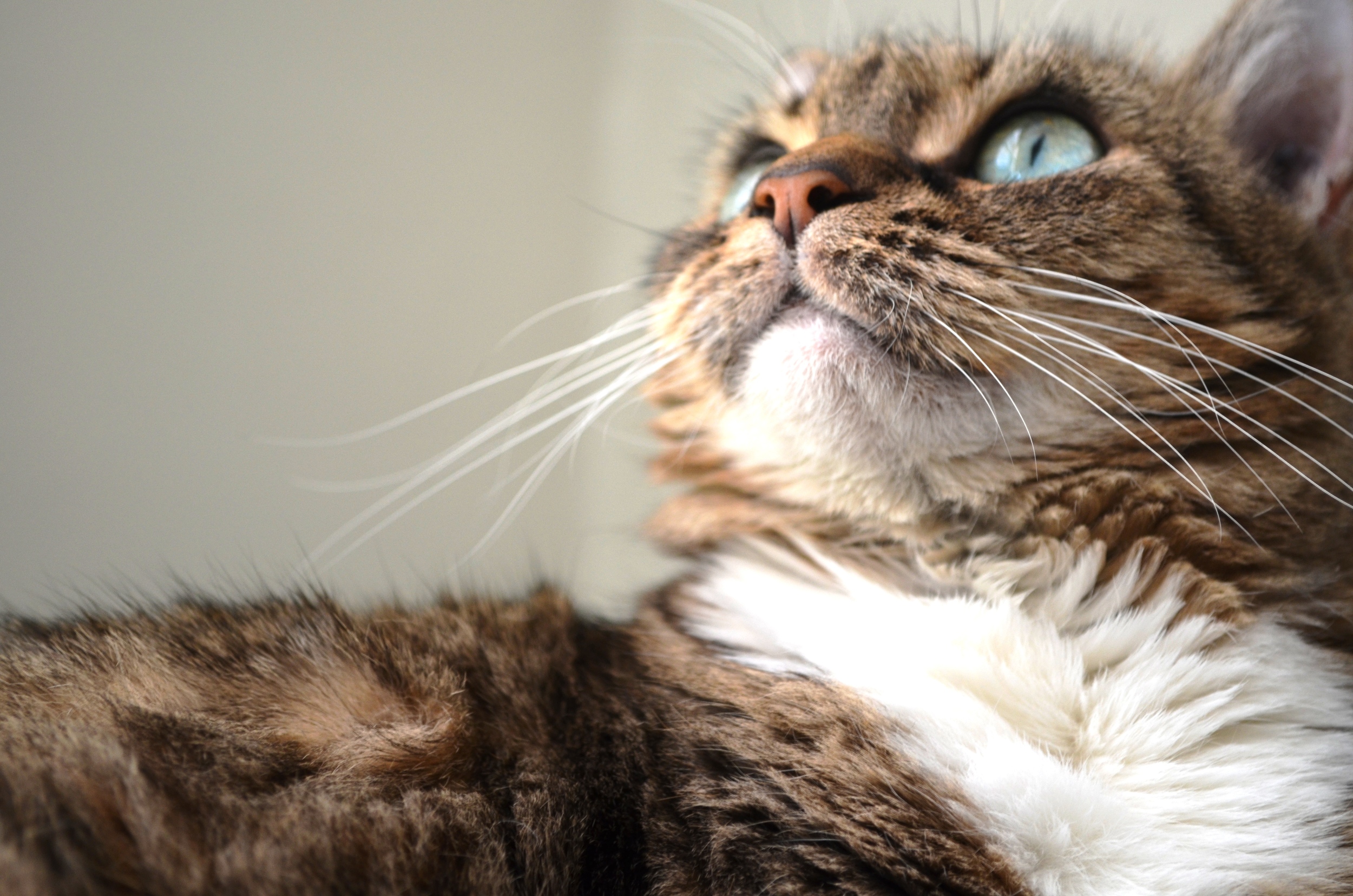
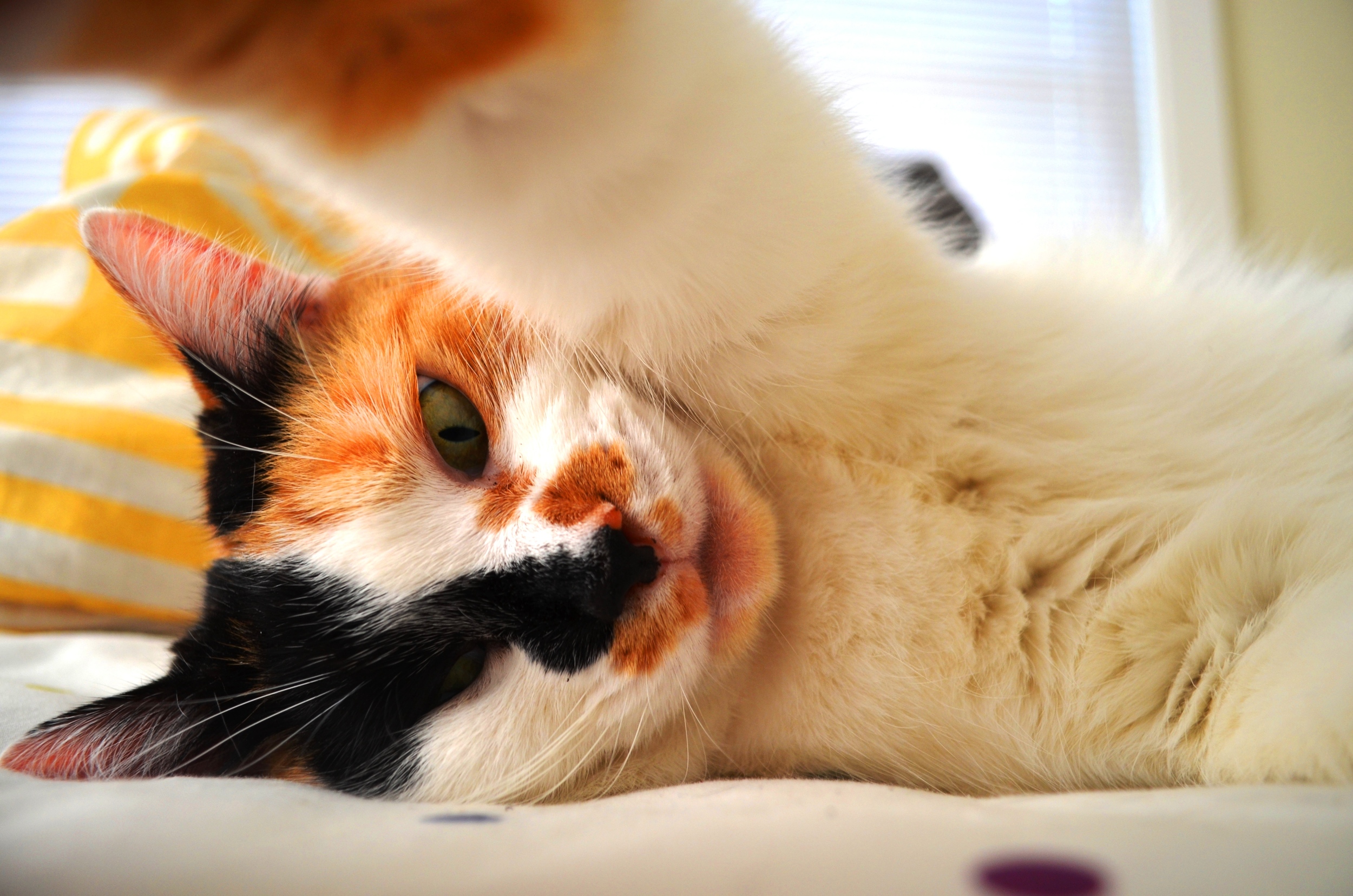
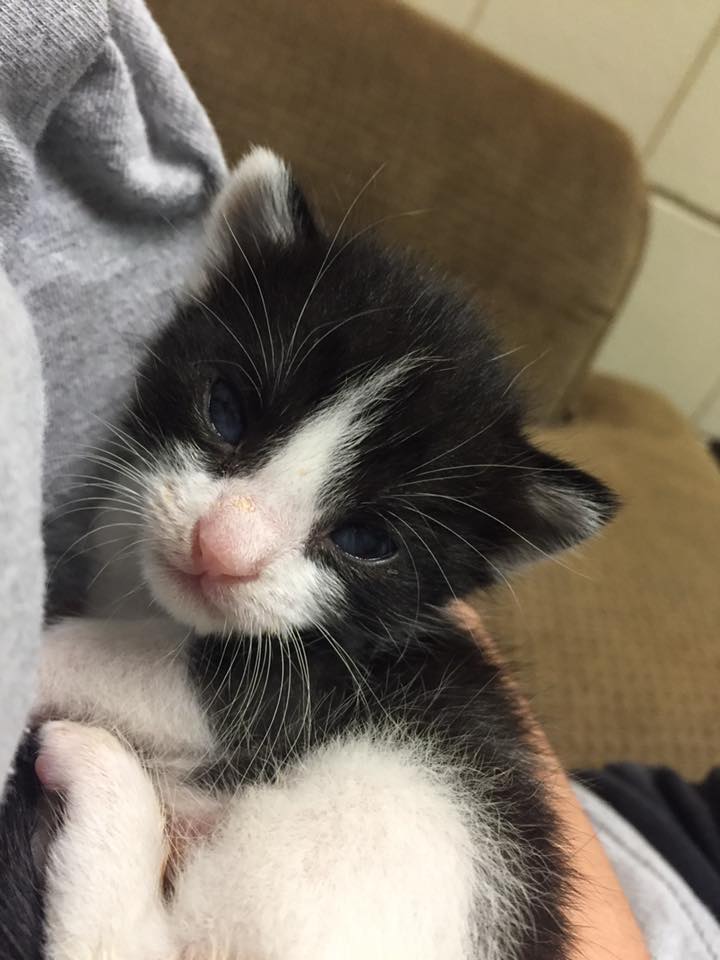
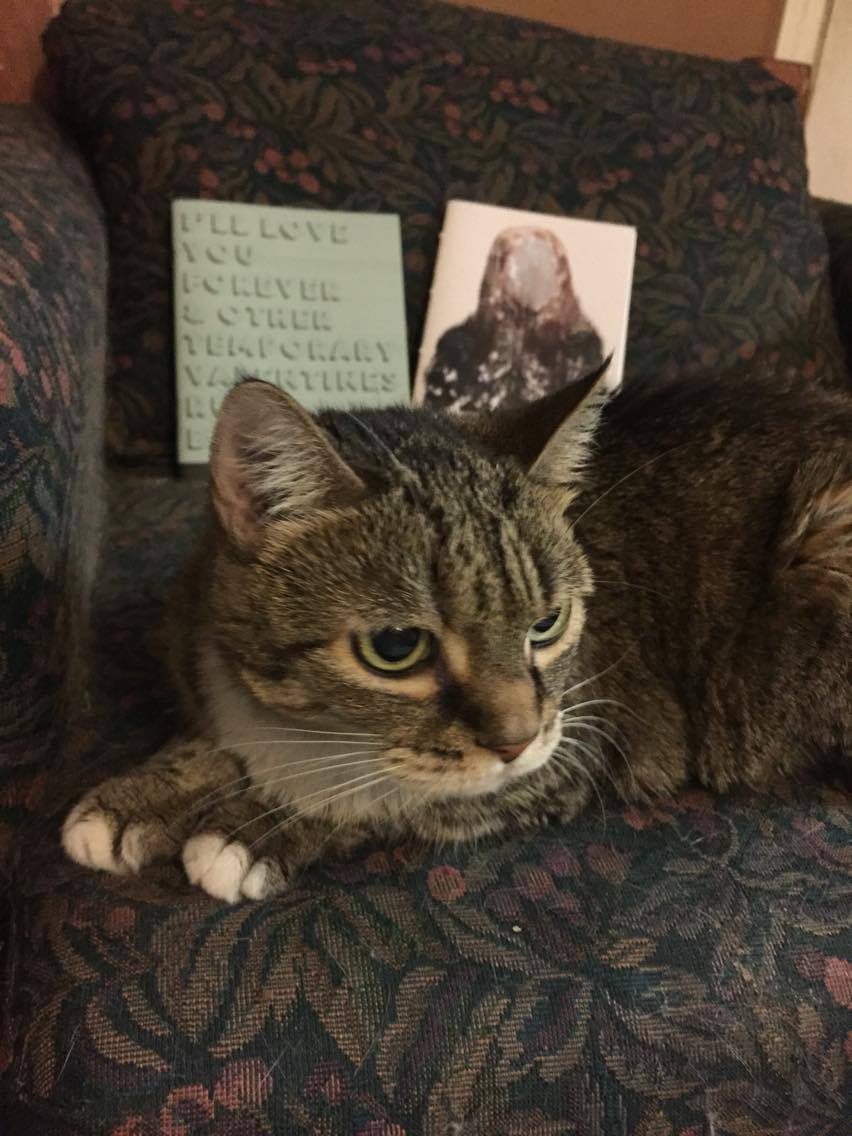
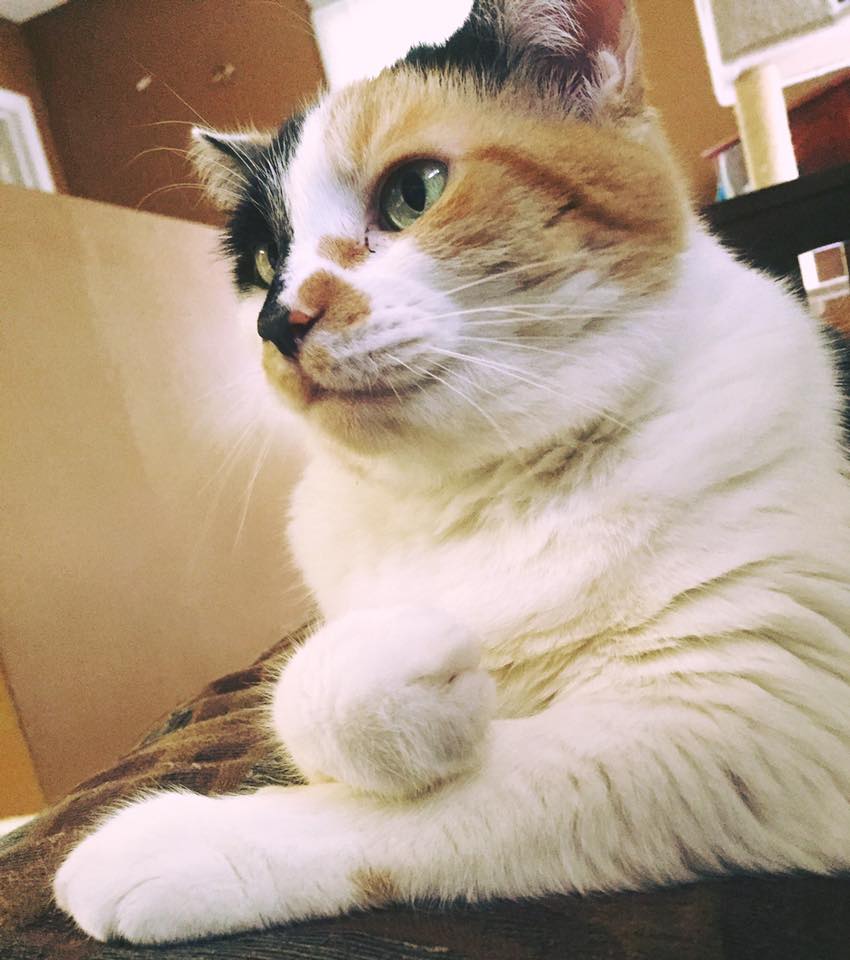
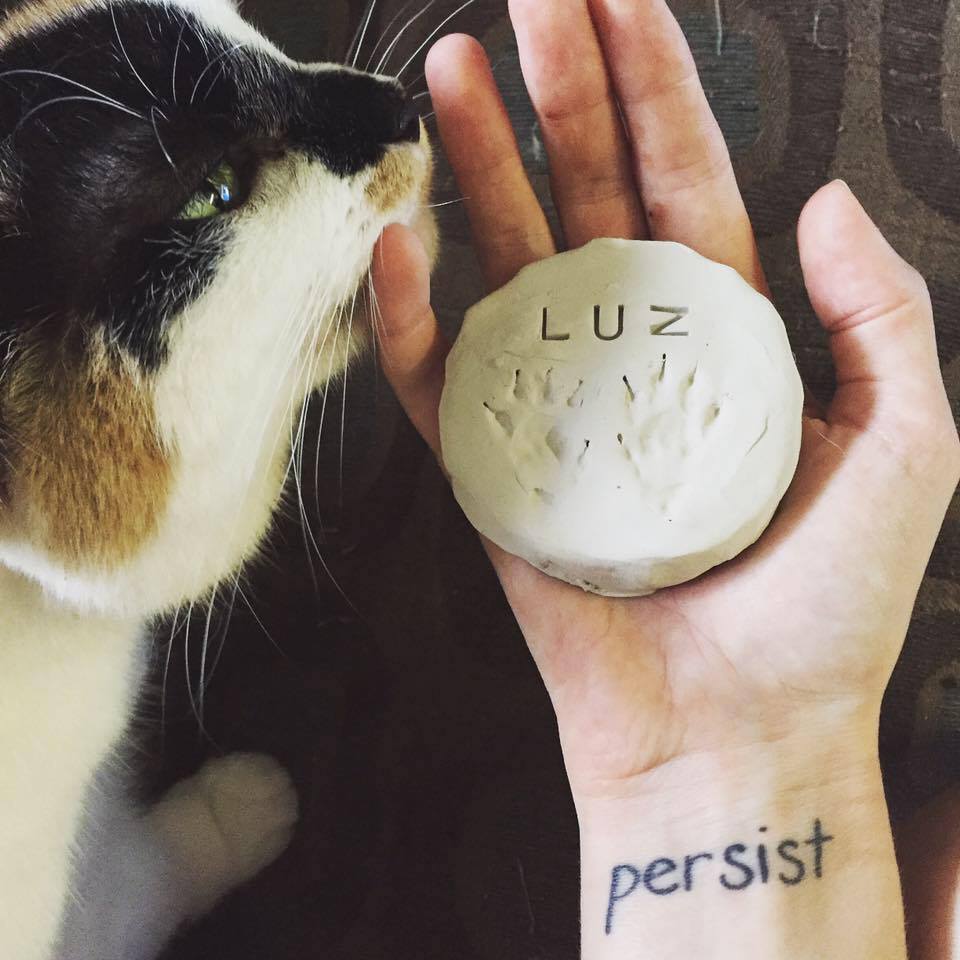
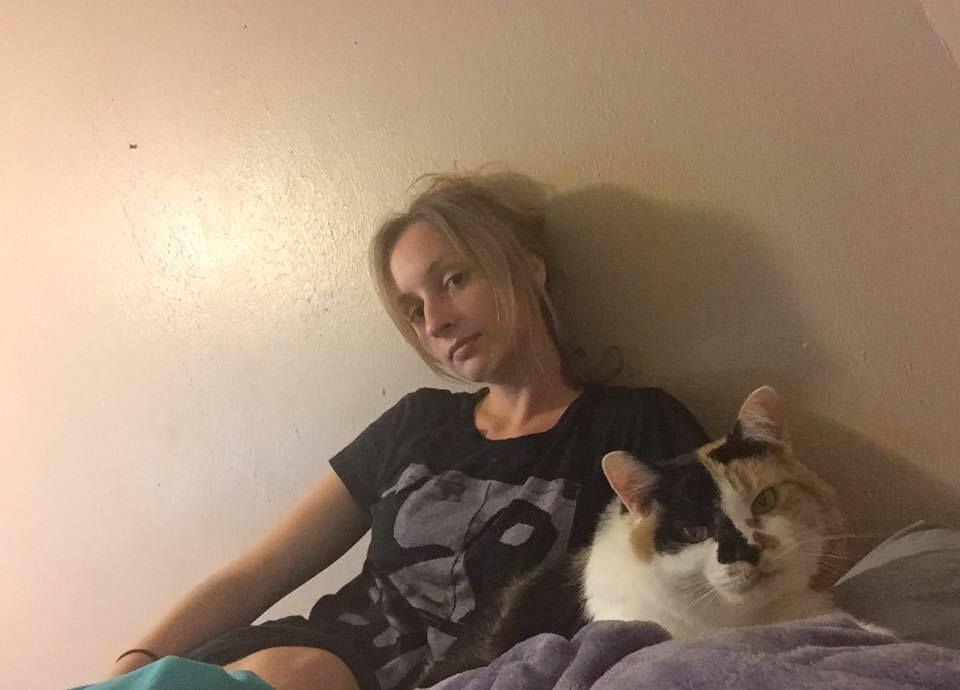
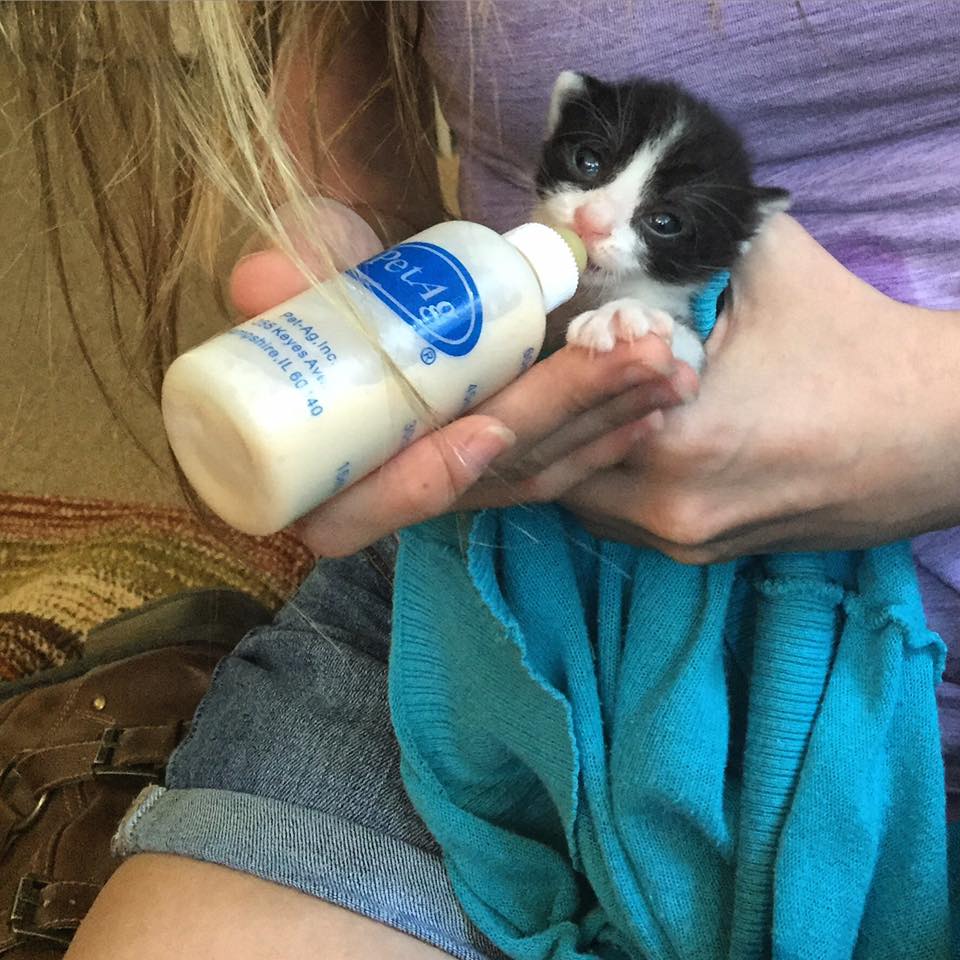
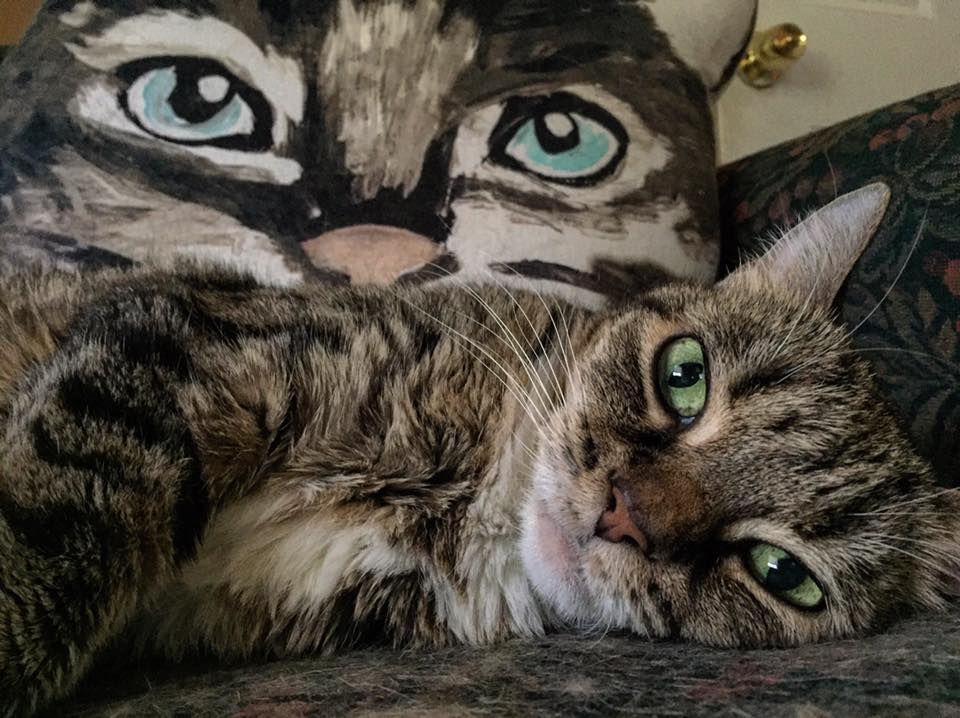
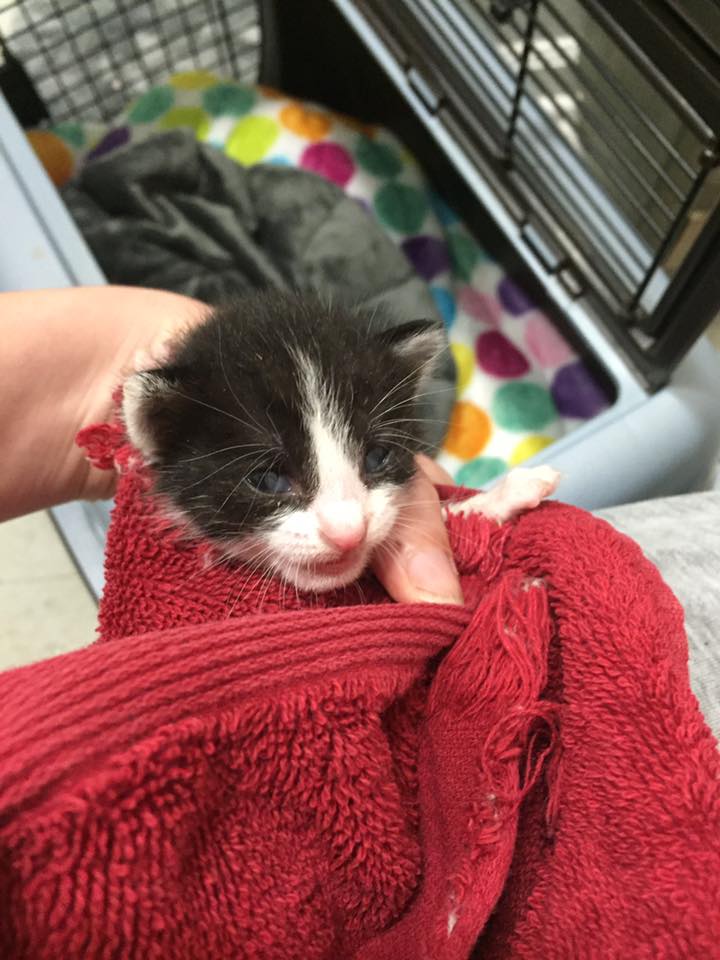
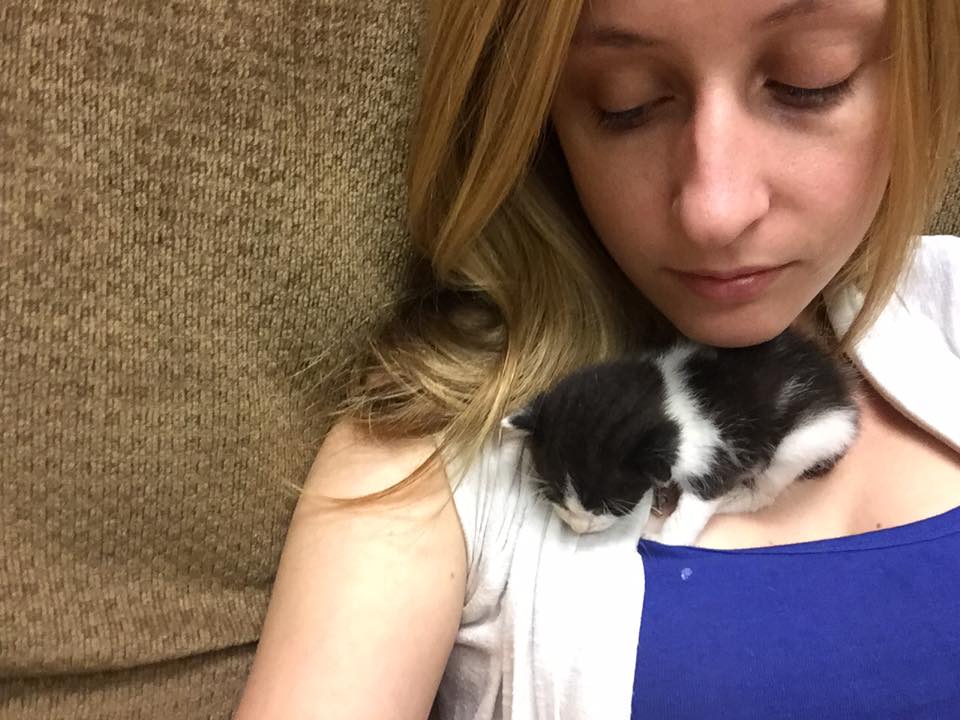
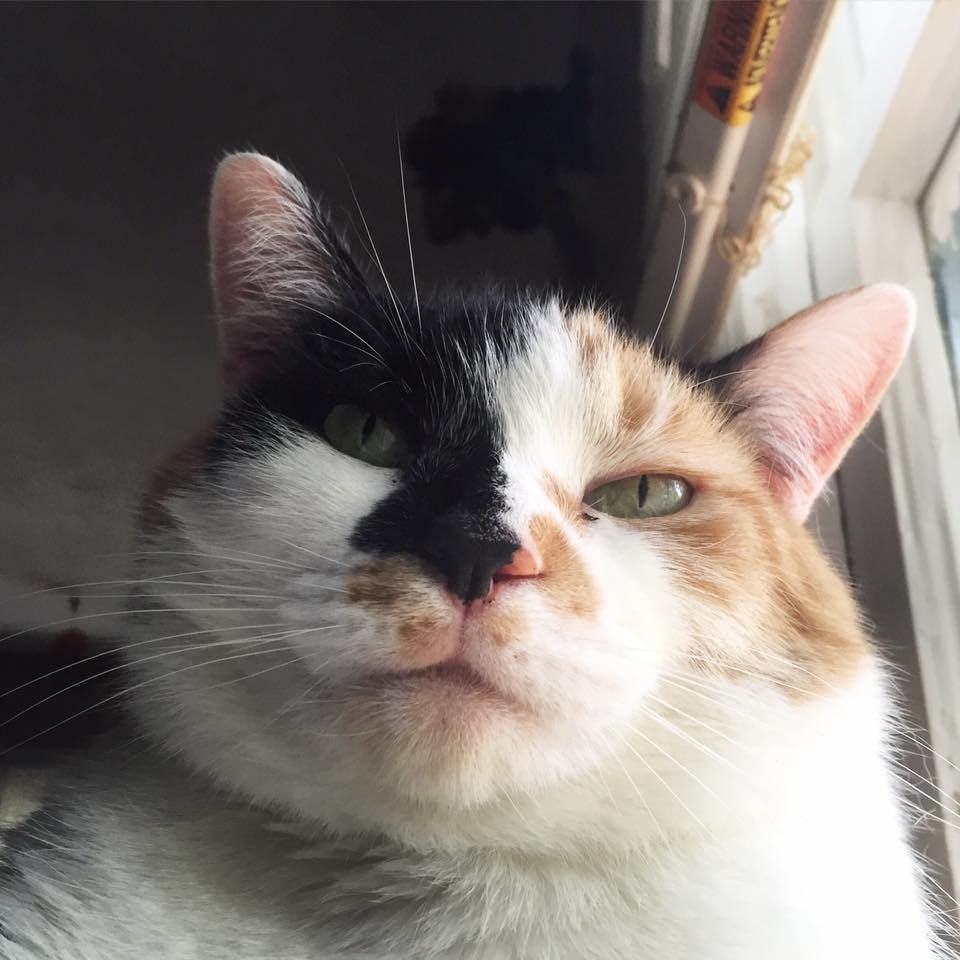
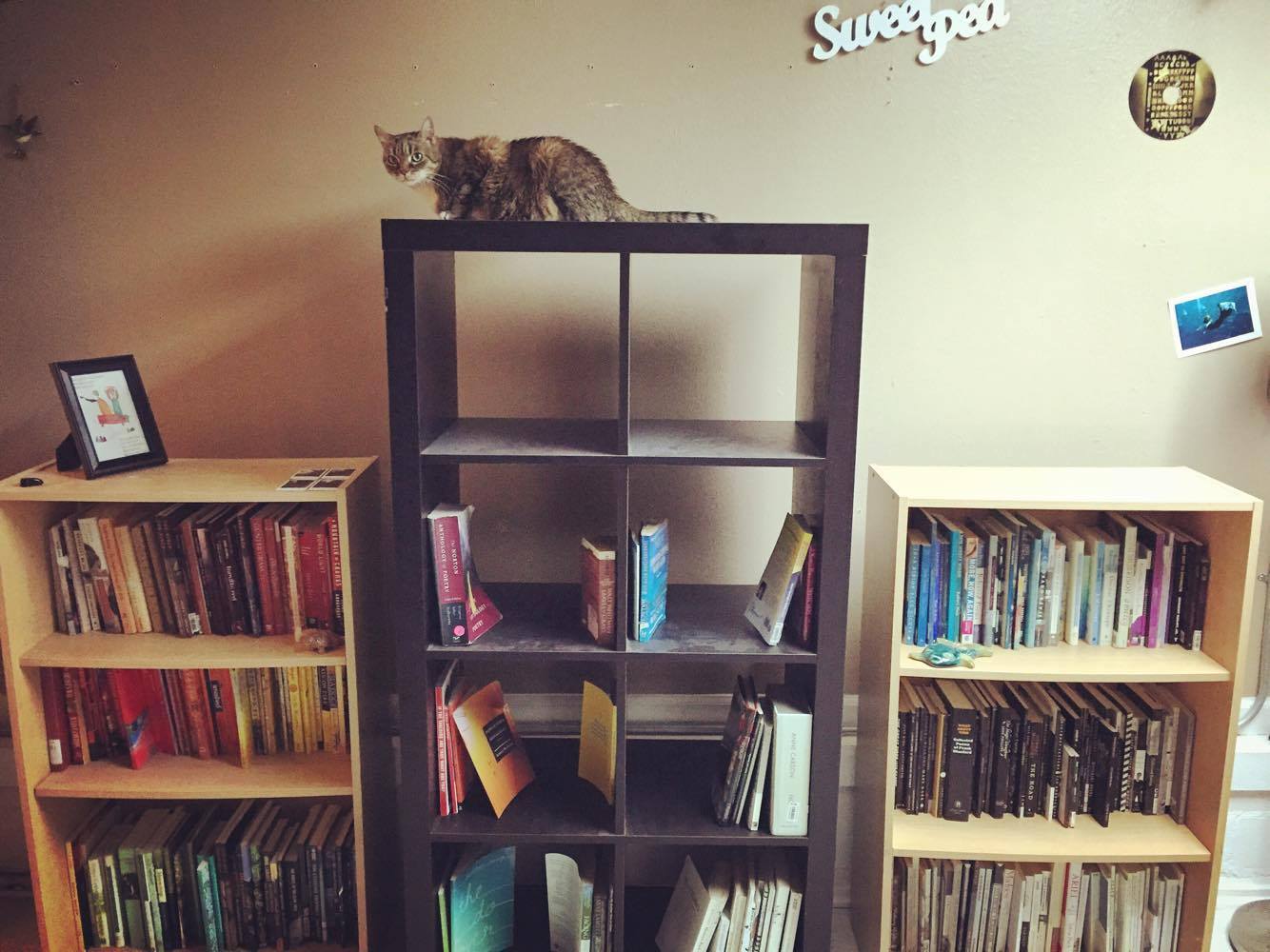
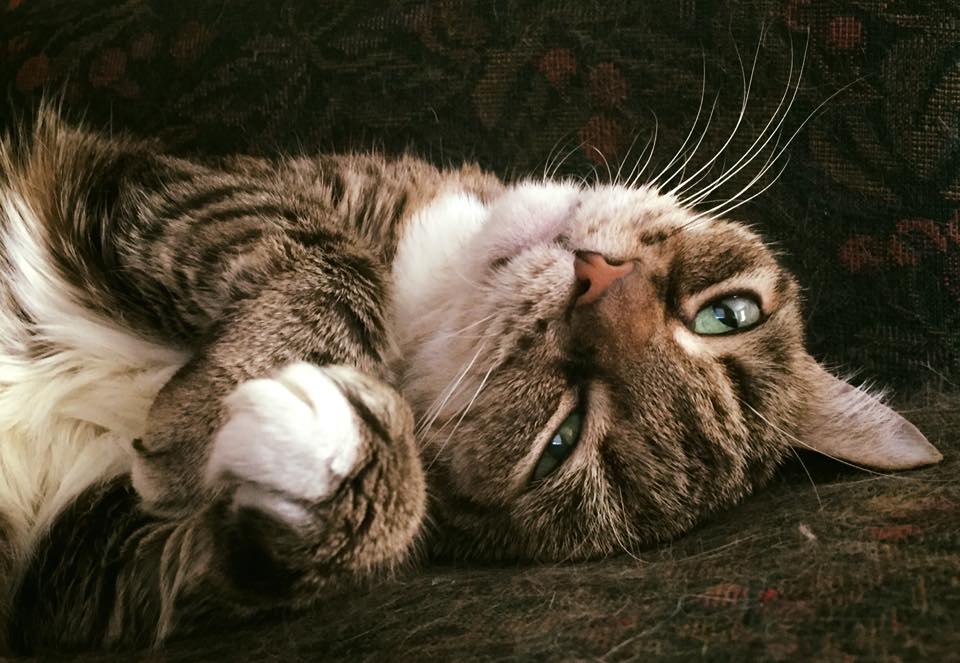
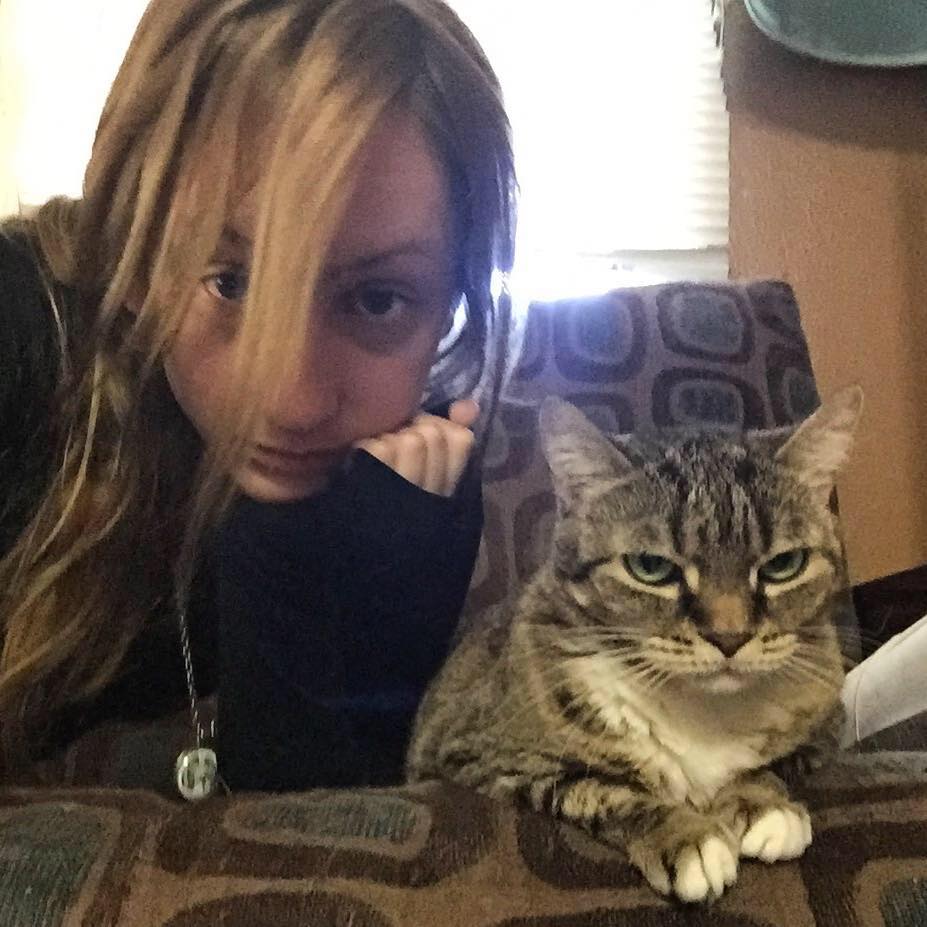
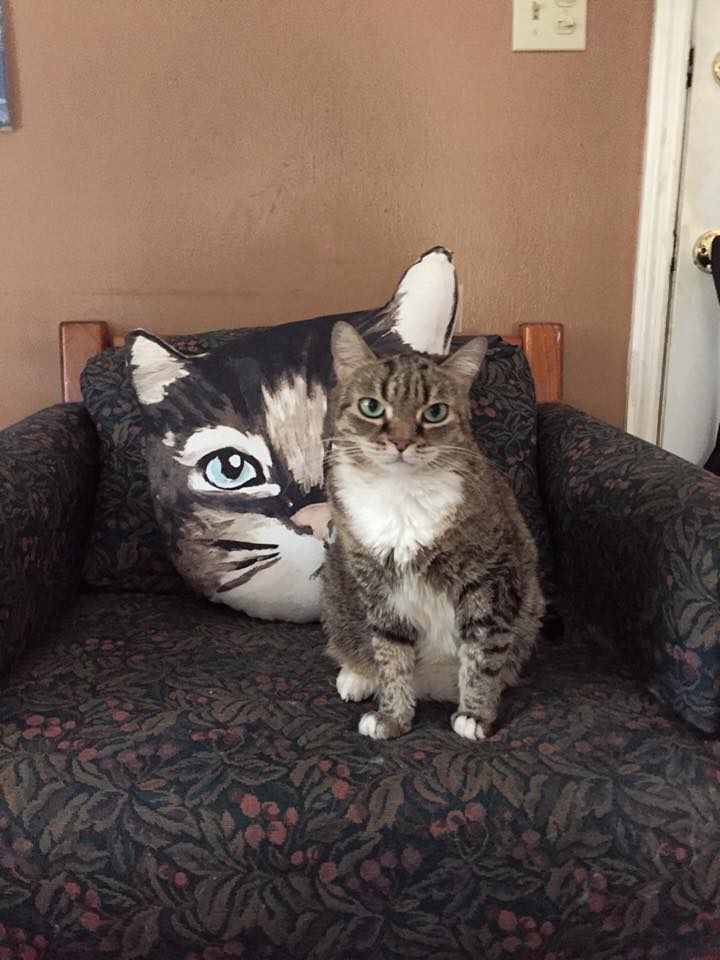
You mentioned that you adopted your cats Julia and Autumn from the Richmond SPCA when you were in a transitional period in your life. Was it the uncertainty of this time that made you seek out your cat companions?
I wonder about this—or, the bigger picture version: what draws me to animals, particularly cats? I’ve always loved animals, always gravitated towards that which watches, communicates differently, needs protection or translation. There’s something really comforting to me about the animal mind, about how wild & honest it is. I think it’s a sort of perpetual underdog empathy that comes from a billion sources & can be analyzed to death but never eradicated.
On a smaller scale: I was something of a delinquent youth (as I imagine many artists were), & I adopted the cats a little over 8 years ago, when I began to transition my life into stability. I think the turn into acceptance of a normal, non-chaotic life allowed me to open my heart back up, & to be able to care responsibly for animals. Anytime I’m not in fight-or-flight mode, I feel like the person I want to be, which is one that is useful & has a lot of love to give. The cats probably grounded me in this new life as much as I helped ground them in a home where they’d be loved (the little one, Julia, was an owner surrender multiple times before we fell in love, & I believe she’d been abused).
Also, I grew up with cats, & have consistently loved them—I’m the weirdo at the party who will go hang out in the corner with the resident cats rather than talk to y’all.
"There’s something really comforting to me about the animal mind, about how wild & honest it is."
Autumn
I love the biographical note left in Julia’s file when you first got her: “EVIL.” They didn’t even try to mince words, huh? Can you talk a little about how affirming the affection of a picky animal is? And what caring for animals teaches you about unconditional love?
Oh, so affirming! I’ve given it a lot of thought & Julia is pretty solidly my soulmate. (Or, one of—I guess we get a few.) Like I mentioned, I got them when I was in the process of shifting lifestyles, & any transition that requires letting down defenses & feeling what’s been numbed causes a lot of fragility. Fragility that’s been there all along, I believe, but has been masked. Julia in so many ways represents this me, the me that I still contain: she’s been endlessly loving to me from the first moment (she will sit by me sometimes & purr for hours on end, she is waiting at the front door whenever I come home—even if it’s just from a walk to the mailbox, etc.), but gets so instinctual sometimes. If someone pets her too soon, or if I pet her too much, or don’t pay attention to her body language, blood is shed (very literally). I had an ex she used to spit on—I’d never seen a cat spit before!
I believe that most creatures are like that, honestly: it’s just our hurts that block our unconditional love capacity. By whatever stroke of luck/fate, Julia recognized a kindred in me, & we bring out the best in each other. She’s mellowed a little bit over the years, too, believe it or not. (Autumn, too, is a fragile spirit—she was found on the streets at about a year old, & is incredibly skittish. Once she’s comfortable around you, she’s completely demanding of love & won’t stop purring & cuddling, but until then, she will—despite being a 17 pound calico—be impossible to find.)
I think unconditional love is easily taught by animals. I think perhaps more correctly, unconditional love is already inherent but animals remind us of it. There’s no fear of the hurt or trickery that can come from human relationships, really—a kitten won’t have control issues or manipulate you or drink too much or fall in love with a different person, etc. (I hope.) Taking care of animals also grants me a specific purpose in the relationship—especially in the case of the baby kitten I fostered recently & had to bottle-feed every few hours—which I think is a lot of what we want as humans, to feel love (not just towards us, but to feel love outwards) & to feel useful. I’ve heard a lot over the years about love being not a feeling but an action, & taking care of animals is a great way for me to practice this.
"Unconditional love is already inherent but animals remind us of it."
Ruth and Julia
To thread the needle of the last question, let’s talk about your poetry through the lens of unconditional love. Does it play a role in your work or how you engage with your subject matter?
That’s an interesting question. I wish I could say yes, but so many of my poems have come from my wounded places, from my difficulties with trauma & human relationships & reconciliation with my past that I’m not sure they deal in unconditional love as much. They try to. They try to wade through the conditions they were taught, & they try to learn to love themselves & others as best they can. I guess my poems are as fallible as their writer. While there are moments of light in the poems, they’re often more concerned with seeking & broadcasting the truth than a particular kindness or love.
Poetry is often a safe space for me, as all written language is, to work out the pains that can’t be expressed healthily or comprehended in a particular relationship (often the relationship between self & universe). Maybe I can reframe this as unconditional love for self being an unspoken tenet of writing at all—that there’s some hope, some flicker of survival that wants to be love underneath every attempt at communication, growth. Otherwise, why bother?
Even in your poems, the speaker can’t stop thinking about the wellbeing of the animals that populate the lines. Examples: in “Loving You Terrifies Me,” you write: “Your fear is waking up with a raccoon in your face. My fear is / the poor animal will realize there’s another side” and in “In Media Res,” you write: “Scientists are killing one species of owl to allow another to survive. / I’ve forgotten to read the news for a decade. Promise love isn’t a series of / selfish confessions? Did anybody ask the owls?” Would you say that’s a confessional impulse at work?
Oh, of course! Probably all writing (& all actions) are confessional, really. Also, I literally was dating someone once that had a wild animal in his attic. Every night we’d go to bed this one winter & hear scratching above our heads. This was years before I fell in love with raccoons, of course, so I didn’t befriend him/her. That anecdote isn’t really that useful, but it’s confessional, too.
I don’t know anything beyond my own experience, I think. I mean: I can understand many other things, I am guilty of having way too many opinions sometimes, I can sympathize & empathize with others, etc.—but all that I can truly speak to is that which I have been through. I try to be mindful of never speaking for that which I’m not qualified, & I’m sure this reflects in my poems.
"I identify with the sense of watchfulness, the wariness of animals."
Ruth bottle-feeding Luz
I was so heartbroken to hear your little foster kitten Luz didn’t survive, but I’m moved by how deeply you cared for her in your short time together. Can we expect to see a poem about Luz in the future?
Yes. I’ve already written her into some. I also dedicated my full-length manuscript to her. Luz meant a lot to me because she was ridiculously perfect, & I’ve never been in that much of a mothering position before: it’s impossible (at least for someone like me) to not attach deeply to an animal you wrap up in a washcloth & bottle feed & tuck in with a heated blanket every few hours. (I mean—did you see the pictures?) I also was going through a period of some loss in my personal relationships, & having an animal to love deeply & claim as family was really crucial to my healing at the time, to my remembering & walking back into the depths of my capacity to love.
Animals show up quite a bit in your work, especially when you write about love and heartbreak. How are these ideas linked for you?
We are animals! I think humans forget that far too often. We are animals, pack animals at that. As much as it may seem that our consciousness separates us, & our laws & rules & ideologies do, I don’t think we’re that far off from the other species. We are just one animal on the planet, & it gives me peace to remember this. Also, as a writer, as a Pisces, as an introvert, etc., I identify with the sense of watchfulness, the wariness of animals.
In terms of love & heartbreak, I believe these are some of the most deep, visceral emotions we can experience, & I’ve often felt intensity that seems wild. If you’re a poet & you don’t claim you’ve felt feral before, I’m not sure I believe you.
"If you’re a poet & you don’t claim you’ve felt feral before, I’m not sure I believe you."
Autumn
You’re the author of three chapbooks: I’ll Love You Forever & Other Temporary Valentines, wildcold, and Retribution Binary. What about the shorter form of the chapbook appeals to you? And your best tip for putting together a chapbook?
I think maybe my attention span? It’s easier for me to write a cohesive body of work when it’s shorter. I’ve actually written some longer manuscripts, but they usually eventually end up feeling too disparate—it’s really difficult to pull together a full-length book’s worth of poetry that connects from the first to last page.
The best tip I have for putting together a chapbook is to print out everything you’ve written lately (lately being a relative term) & spread it across your floor. Then I pile together the poems that make sense with each other, the poems that speak to each other, & see if the pile(s) are big enough to attempt a larger endeavor like a chapbook or book. Usually, poets have obsessions or work through something for long enough that there’s a thread through a season’s worth of work, I think.
Fill in the blank: when you’re reading through piles of slush, the work that most catches your attention…
Has a moment of truth. Has a break into clarity. Says beautiful things that have meaning, gives as much credence to the message as to the delivery. Reminds me of an old self or a new way to look at my current self or a self I want to be.
"My cats are like an affirmation from the universe."
Meta Julia
If cats were a poetic form (e.g., sestina, sonnet, ode), they’d be…?
Free verse! Would you try to contain them?!
A simile for your cats?
This stumps me. I want them to be metaphors. My cats are like an affirmation from the universe.
Sonya Vatomsky: Hierarchify Your Love
Poet Sonya Vatomky talks about how their companion Magpie Underfoot helps them write and survive.
It's hard not to fangirl over Sonya Vatomsky, gothy, cat-loving, say-anything poet with a must-follow Instagram feed and a penchant for concision. So I will cosign myself to saying this: I could've probably asked Sonya any boring question and their response would've been interesting. That's just who they are.
But fear not, dear reader – I didn't put that theory to the test. I talked to Sonya about their painfully cute companion Magpie Underfoot and how this cat helps Sonya write and survive.
A little about Sonya before we hop to it: they are a Russian American non-binary artist with too many feelings on the inside and too much cat hair on the outside. They are the author of Salt Is For Curing (Sator Press, 2015), a debut poetry collection about bones, dill, and survival, as well as one chapbook. Poems, essays, and interviews have appeared in Dirge Magazine, Entropy Magazine, The Hairpin, Lodown Magazine, VIDA, The Poetry Foundation, and other publications. They live in Seattle with their cat, Magpie Underfoot, and a growing collection of taxidermy, wet specimens, and other oddities.
[CW: sexual assault]
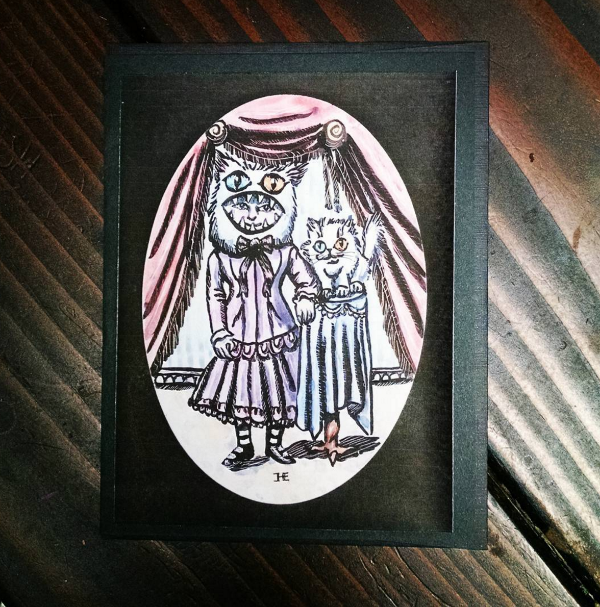
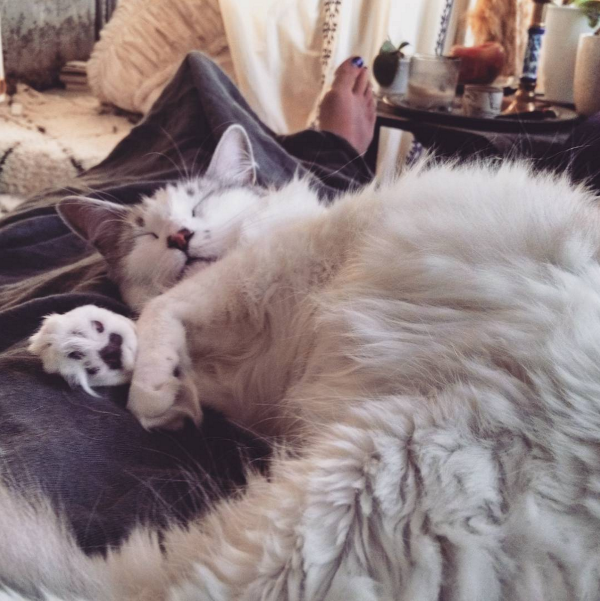
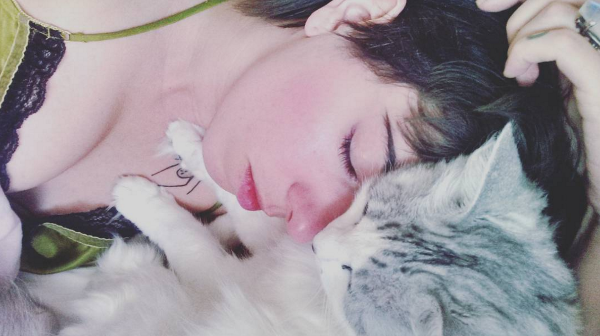
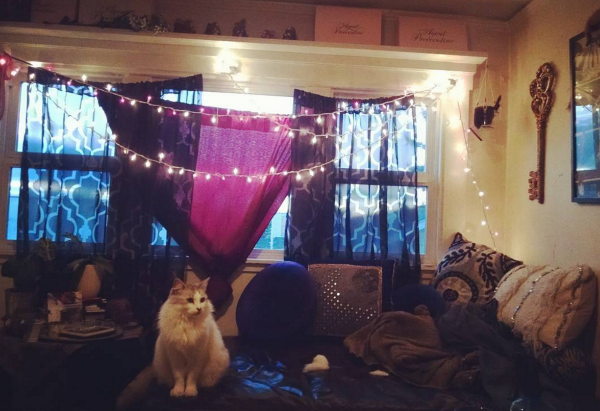
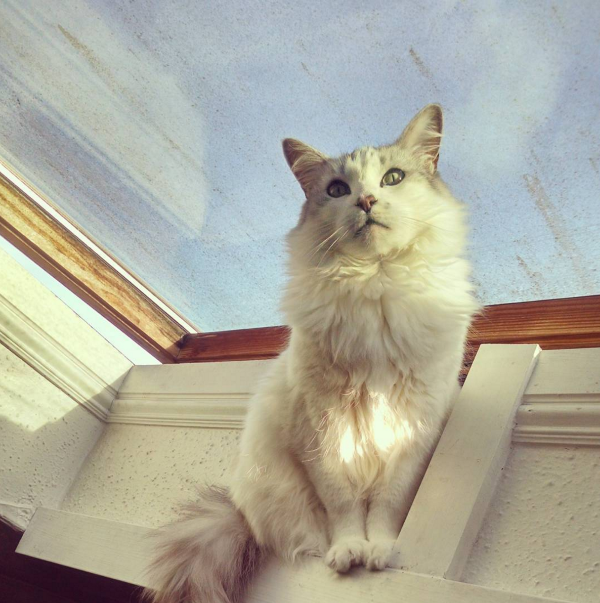
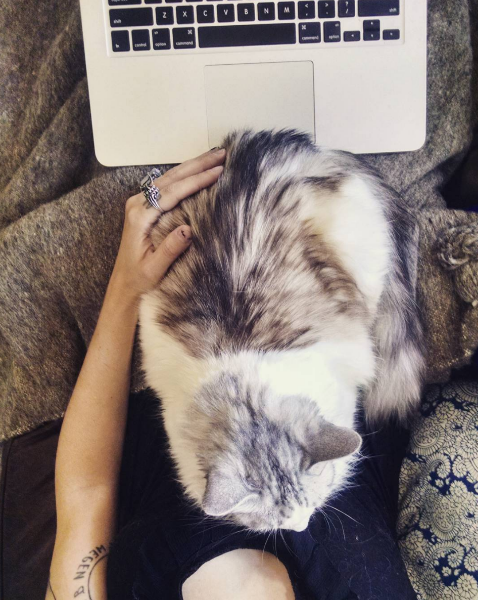
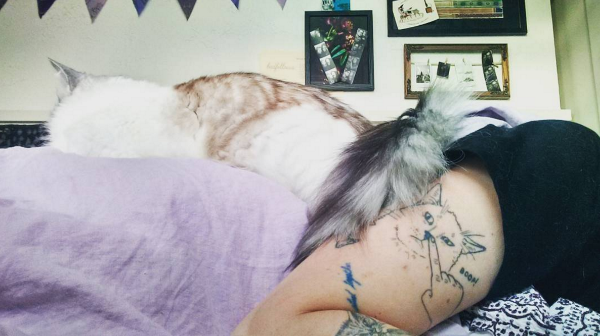
Your cat has the coolest name. What inspired it?
Thank you! She’s named after the recurring symbolism of the magpie in 80s progressive rock band Marillion’s lyrics. “Underfoot” was added later after our vet called her “Magpie Vatomsky” — she doesn’t strike me as the kind of cat who would take someone else’s last name.
You mention that you adopted Magpie Underfoot from the shelter and she was "horrifically underweight." Can you talk about the process of caring for her in those early months and what impact it had on your relationship with her?
She fattened back up to normal quickly so that wasn’t really an issue, but whatever her life was like before the shelter left its mark. The first six months I had her, she’d meow me awake at 4 a.m. and meow the entire time I was at work. I almost had to move! She still gets really pissy when she can see the bottom of her food bowl; she has a little plastic bow she carries around and places in her food dish when she’s dissatisfied with it. It’s from a Christmas like 3 years ago but is so funny I don’t throw it out.
“She doesn’t strike me as the kind of cat who would take someone else’s last name.”
In our pre-interview chat, you said Magpie Underfoot is "more like an emotional support source without which most of my writing wouldn't happen." That made me remember your interview with Maudlin House when you said Salt Is for Curing is about "exorcising my demons – literal demons, literal exorcisms." I'm thinking there's a connective thread here – did Magpie Underfoot's emotional support help make those exorcisms possible?
Yes, absolutely. Around when the catalyst for my book happened — actually, I’m just going to be blunt here. I got assaulted by a friend of a friend after a party, and in the month or so around that, I also started taking antidepressants, had a horrific breakup, and needed a medical procedure that really stressed me out so I was basically a shitshow. Magpie, who normally slept by my feet, started sleeping on the pillow next to me. She still does that. I put both arms around her and my nose in her fur.
You described what I'm going to call "love transference" in your poetry, where you're writing about one subject, but channeling feelings you have for another. And I love how you put this to use in "Valerian Tea," a poem you said is "some kind of weirdo hybrid love poem about her [Magpie Underfoot] and my partner." (For our readers, a taste: "this interconnected belonging where our / eyelashes braid together and I fossilize with you and die / tomorrow and live forever and my face feels like my face…") How has Magpie complicated your understanding of what love is?
I don’t think she’s complicated it. Every once in a while my brain does the thing where I NEED TO HIERARCHIFY ALL MY LOVES and I’m like, is it reasonable for a cat to be this important? But she is, so whatever.
“Every once in a while my brain does the thing where I NEED TO HIERARCHIFY ALL MY LOVES and I’m like, is it reasonable for a cat to be this important? But she is, so whatever.”
Not a question about animals, but a question about being a human animal. How has identifying as non-binary influenced your work? I'm thinking specifically about Salt's meditations on what it means to occupy space in a patriarchal world.
At the time that I was writing Salt, I felt very female. It’s actually the only time in my life I’ve felt that way and it was in the aftermath of a sexual assault — like a man stamped WOMAN on my brow. To be so viscerally read as a woman after a lifetime of feeling inadequate was a bit of a journey, for sure. I started coming out as non-binary around when Salt got the publication offer and was worried that would be weird somehow, but it hasn’t been.
Tell me about your writing process. Do you have a ritual or schedule you follow? Does the poem start with an idea or a line? Is Magpie nearby?
No ritual or schedule, but I do prefer to write at home and my apartment is tiny so she’s definitely nearby and trying to sit on my laptop.
“To be so viscerally read as a woman after a lifetime of feeling inadequate was a bit of a journey, for sure.”
Salt is full of references to the body – specifically, the human and animal body as meat, fitting for a collection that uses food as a device to explore power dynamics and to dissect the self. But I want to focus on a specific animal – the fish in "Spidersilk" ("You looked so far away, I felt crazed; gutted myself like / a fish and dug in") and in "Herring under a fur coat" ("I put my coat on. Under, I / am cold wet fish, scales and weights, / I am wide maw and narrow fin"). Why did you choose the fish to name the vulnerability in these poems?
This isn’t that philosophical, but a fish is basically the only animal your average home cook is going to gut, yeah? I wanted the gutting to feel messy and vulnerable but not add any extra context, like using a deer or a rabbit might have. “Herring under a fur coat” is actually just the translated name of a Russian salad, which is why that poem also has all those beet and potato and mayonnaise bits.
True or false: poetry is a kind of spell work.
Definitely.
A poem with an animal in it (metaphorical or otherwise) that you wish you'd written?
I’ve been writing a lot about whales recently, even though I kind of dodged that fish question up above. I guess it would be another sea creature. I’m really fascinated by how little we know of the deep sea, the animals that live there.
“A fish is basically the only animal your average home cook is going to gut, yeah?”
A simile for Magpie Underfoot?
A little lemon. She is so sour. I love it.
Rachel Mennies: Interrogating Our Animalness
Rachel Mennies talks about the subtle and dynamic ways her dog Otto has shifted her worldview, his wagging presence in and around her poems, and how animals help us understand ourselves.
If you know Rachel Mennies, you don't need me to tell you she's a triple threat of smarts, talent, and generosity. If you don't know her, have a seat, dear reader, and prepare to hand over your heart, silver platter and all. There's perhaps nothing more rewarding than listening to a poet discuss something they deeply love, and for Rachel, that's her dog Otto. She talks about how he came into her life, both the subtle and dynamic ways he's shifted her worldview, his steady presence in and around her poems, and how animals help us understand ourselves.
Before we get to it, a little about Rachel: She's the author of The Glad Hand of God Points Backwards (Texas Tech University Press, 2014), winner of the Walt McDonald First-Book Prize in Poetry, and the chapbook No Silence in the Fields (Blue Hour Press, 2012). Her poems have appeared in Hayden’s Ferry Review, Poet Lore, Indiana Review, Black Warrior Review, and other literary journals. She is the series editor (2015-) for the Walt McDonald First-Book Prize at Texas Tech University Press, she teaches in the First-Year Writing Program at Carnegie Mellon University, and she is a member of the editorial staff at AGNI. She lives in Pittsburgh with her dear pup Otto.
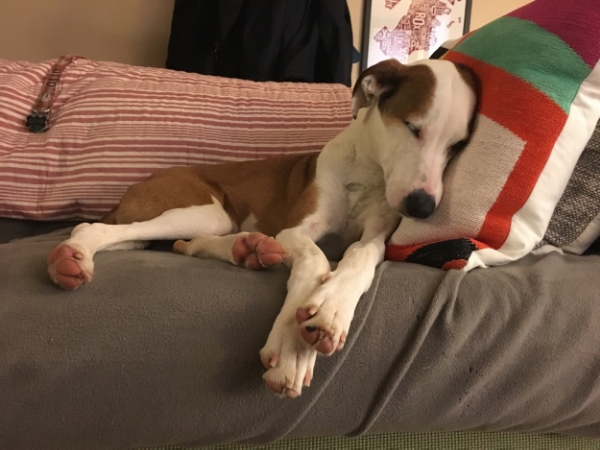
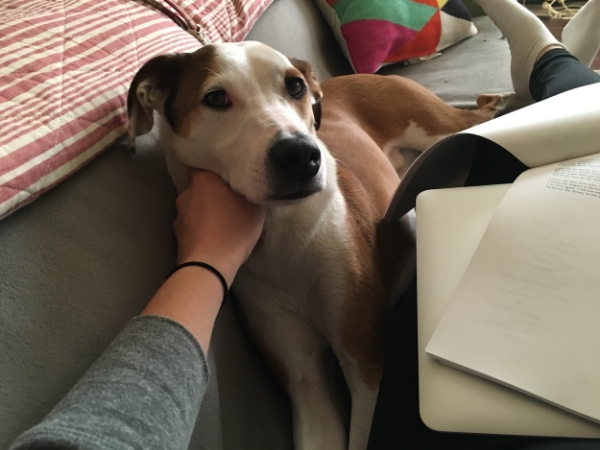
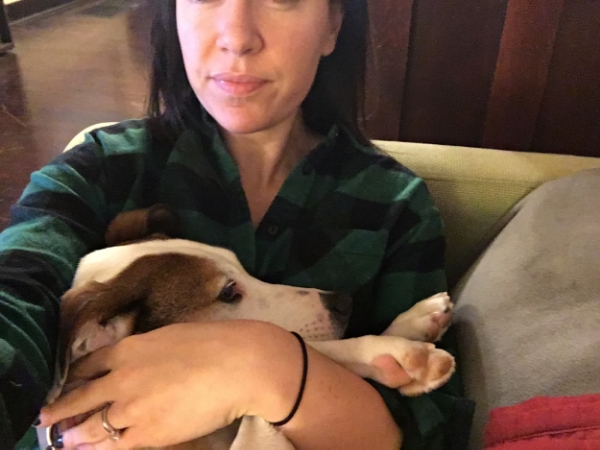
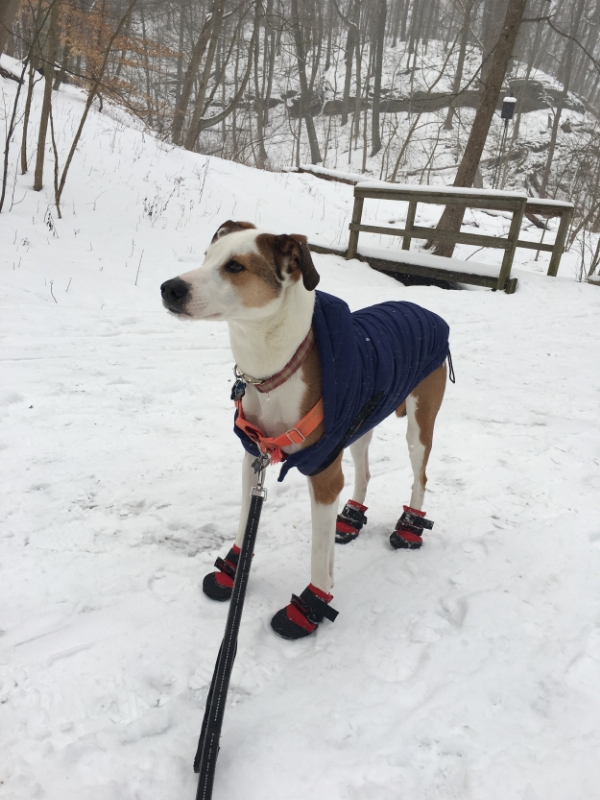
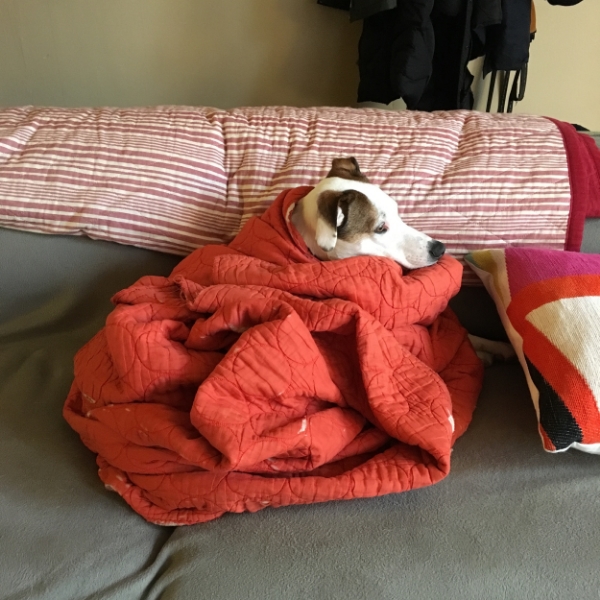
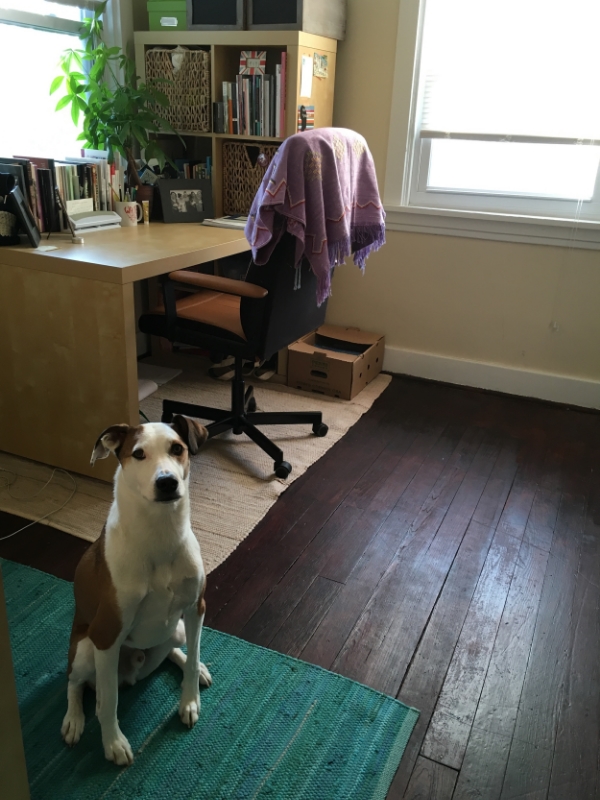

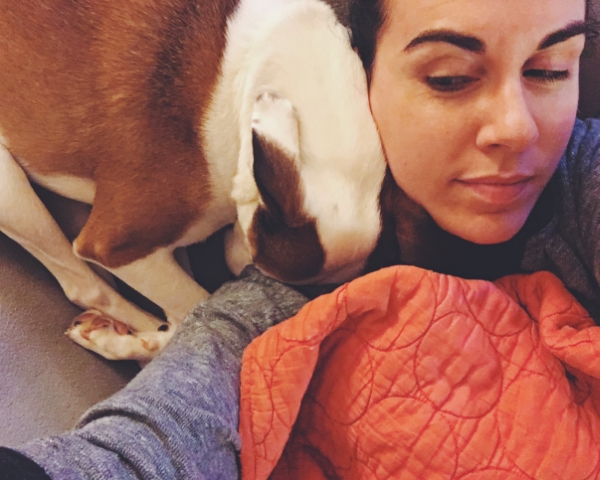
How did Otto come into your life?
About three years ago, my husband and I decided to tackle the responsibility of dog ownership, after wanting a dog for many years prior. Moving from that general decision to the specific decision of which dog to adopt—we went the rescue route—was the hardest part of the process. The days spent on Petfinder meant reading one heart-tugging story after another, especially knowing we could only take on one dog and, since we have an apartment with no yard, had to choose a dog carefully that could handle our city-living situation. After all the reading, we went to exactly one shelter and Otto, an Italian greyhound-beagle-other mix who was about four months old at the time, was the second dog we walked. We brought him home the next day.
Did you grow up with pets or was getting a dog a brave new world for you?
My parents got our first dachshund, Maddie, when I was a senior in high school, so I spent most of my time at home without a dog in the house. They now have two sibling dachshunds—Sammie is from the same parents, but a different litter than Maddie—and Otto plays with them as much as Maddie and Sam will allow it when I come home to visit. Because Maddie arrived right as I was preparing to leave home, I participated very little in her dog-care routine—Otto’s mostly “brave new world” territory for me.
“We’re both habit-seekers, and we’ve learned each other’s routines quite well at this point.”
Tell me a story that gives a good snapshot of your relationship with Otto.
As Otto’s gotten older—he’s three now, so no longer a puppy—he sleeps for longer and longer into the day, while I’m a true morning person. He usually pads into my “office,” the room in our apartment that holds my desk and yoga mat and the best natural light (and a plant, if I’ve managed not to kill it), an hour or so past once I’ve made coffee and begun to work, and he sets his head on my knee to let me know he’d like to go outside. We’re both habit-seekers, and we’ve learned each other’s routines quite well at this point.
You mention how Otto's schedule helps keep your writing life structured in your blog post "Poetry on The Animal Calendar" for the Tahoma Literary Review. (Oh, how we live and die by the dog schedule in my house.) I'm fascinated by this very practical and direct way he's influenced your writing process. Other than the built-in time blocking (bonafide productivity hack: get a dog!), are there other ways Otto's presence has helped you write poems?
I think often about the depth of affection a human earns from a dog once the relationship’s had some time to grow: Otto seeks my presence and time and touch so much in exchange for what to me seems like very little (food, water, shelter, predictable and consistent kindness). The bond helps me write because it exists dependably and without question—often the opposite of how I feel in terms of the writing process.
Otto and I had to earn this slowly in each other, which may also be familiar to other rescue-dog owners. The first month we adopted Otto, which also happened to be the first month of my fall semester, he growled at us from under our couch (thankfully, he’s outgrown being able to fit under there…), destroyed a few of our belongings, pulled hard away from me on his leash, and fought to get out of his crate daily. He almost escaped from our car at the animal shelter. He had no idea who we were, where he’d gone, or why we’d brought him to us. I thought for the first month that I couldn’t handle dog ownership.
But the semester continued, and he calmed down, and I found that he became the calmest when I sat beside him on the couch, each of us on a separate cushion, and I took out my computer and wrote (or graded papers). With time, he eased closer; now, if I write on the couch, he stretches out long between my legs and the couch’s back, burrowed in as close as possible. If I snap the laptop closed, he thinks it’s time for a walk. His calmness and affection feel sanctioning, especially in the many moments that I find the writing process difficult or anxiety producing. Sometimes I read drafts aloud to him, which is a comfort, too.
“The bond helps me write because it exists dependably and without question—often the opposite of how I feel in terms of the writing process.”
We've got to talk about "Elegy with Attack Dog," a poem I will remember as long as I'm on this green earth, especially the closing lines: "And you lie awake / and stare at the loss, rubbing / the soft spot at your throat / that misses the shape / of its mouth." I love the metaphor of the dog to illustrate the mechanics of grief. Can you talk a little about the inspiration behind that?
A couple of summers ago, two friends of ours had taken their own two dogs out for a run when a neighborhood dog broke from his yard and attacked all four of them. It’s a long and sad story, but at the end of it, only one of their dogs survived, and Animal Control eventually euthanized the “attack dog.”
As a dog lover, stories like these—in which the creature we love, that we let sleep in our beds and eat from our tables, bares its teeth and reminds us of its power to destroy—are especially difficult to process. In the specific grief I felt for my friends, I began thinking about the fear the incident left behind in me (that whole summer, each dog that ran up to Otto at the park or on the street made my pulse elevate) as a metaphor for a broader sense of loss—how long it takes, if ever, to pass through the process of grief into permanent safety or calm.
I moved practically from these thoughts into a draft of “Elegy…” in a writing workshop I was spying on that was led by the poet Jill Khoury—we were teaching in a Young Writers program together at the time—who had tasked the high-schoolers with writing a poem that utilized anaphora. I started with the specifics I remembered of my friends’ attack—the dog going for their dog’s neck, and holding on—and the poem unfolded slowly from there.
Let's talk about the non-metaphorical dogs and animals that show up in your poems. Why do you think animals have such a prominent place in poetry at large and in yours in particular?
I write often about the human body and its animal-feeling; I wonder if some of our writing about animals comes partially from our desire to interrogate our own animal-ness. To that end, I’m often struck by the strangeness of living with a domesticated animal, but an animal nonetheless—how at times I can see Otto give into what we might call his “animal nature,” despite his training and domestication. A couple of months ago, Otto (somehow) grabbed a live bird out of the air in his teeth and only let go once I pried open his jaw. He’d just spent the morning sleeping beside my desk, docile, but right in front of me—and in a split second—he’d killed a bird. In moments like this one I’m reminded of my own human-animal modulations between desire, restraint, action.
Otto also makes his way into my poems because of our proximity—I see his face and body in each of the rooms of our apartment, in the park across the street, in the backseat of my car. I probably spend more time with him than any other living creature, so it makes sense that he appears in my poems, too.
“I wonder if some of our writing about animals comes partially from our desire to interrogate our own animal-ness.”
Your favorite poem about an animal or with an animal in it?
Paisley Rekdal’s “Why Some Girls Love Horses” and much of Robin Becker’s poetry, as animals (especially dogs) figure prominently throughout her work. She’s written two of my all-time favorite poems specifically about rescue dogs: “Rescue Parable” and “Rescue Riddle.” The lines “When she takes her morning tea, he settles / beside her – body of law and praise, / procuress, his winter and summer hearth” make me think of the routine I have earned with Otto.
Has caring for an animal helped shape how you see the world around you? If so, how?
Entirely, and that surprised me. My husband and I don’t have children, so we often hear from others that Otto is our child—a joke I’ve made a few times myself, too. Before we adopted Otto, I always rolled my eyes at people who referred to their dogs as their children, and I still find the comparison tenuous as I watch some of my friends become parents, but where I do see similarity (I imagine) is the way that keeping any sort of creature alive puts you on a spectrum of tested patience and earned love. I have agreed to care for Otto as long as he is mine; there is no opting-out or break-taking, because forgetting him would harm him. Even if he destroys something (his most recent chew-obsession, horribly, has been books!) or disobeys me, there is still no opting-out. There is more work to do to keep him behaved, perhaps, or longer walks that must be taken, but there is no backing away from the caretaking altogether.
I look at other dog owners in the park with an understanding that I didn’t possess before Otto’s adoption: what I’m understanding is what it feels like to have offered yourself up to an animal, knowing both the vastness of the work and the even more vastness of the reward, the love.
“What I’m understanding is what it feels like to have offered yourself up to an animal, knowing both the vastness of the work and the even more vastness of the reward, the love.”
Writing can put me in a weird headspace, but I've found that my dogs help pull me back to the surface afterward. Can you relate?
Absolutely, yes. Otto has become a reminder to me of how to access simple joys when my writing has cost me them, and a signal back to participation in the daily life I’ve “left” while writing—I have to walk the dog, have to feed the dog, have to hug the dog.
A simile for Otto?
Otto is like a tiny missile (but one that gives you kisses instead of blowing you up at the end?). He’s focused and incredibly fast and target-obsessed (very greyhound), and once he’s spent all his energy and reaches his destination, usually the couch, he’s warm and immediately inert.
Amie Whittemore: The End of an Era
Amie Whittemore talks about her cats, the specific way grief works when a pet dies, and her advice for writing about that loss in a meaningful way.
Lovers, I hope you're as excited about the first-ever interview in the Pet Poetics series as I am, and what a way to kick it off. I got the chance to chat with Amie Whittemore about her cats, the specific way grief works when a pet dies, and her advice for writing about that loss in a meaningful way.
Before we dive in, a little about Amie: she is a poet, educator, and the author of Glass Harvest, forthcoming from Autumn House Press in July 2016. She is also co-founder of the Charlottesville Reading Series. She holds degrees from the University of Illinois Urbana-Champaign (B.A.), Lewis and Clark College (M.A.T.), and Southern Illinois University Carbondale (M.F.A.). Her poems have appeared in The Gettysburg Review, Sycamore Review, Rattle, Cimarron Review, and elsewhere. She spent a year photographing her former cat Stevens every day as an experiment in affection and Instagram filters. She lives in Charlottesville with her cats Chicory and Sage.
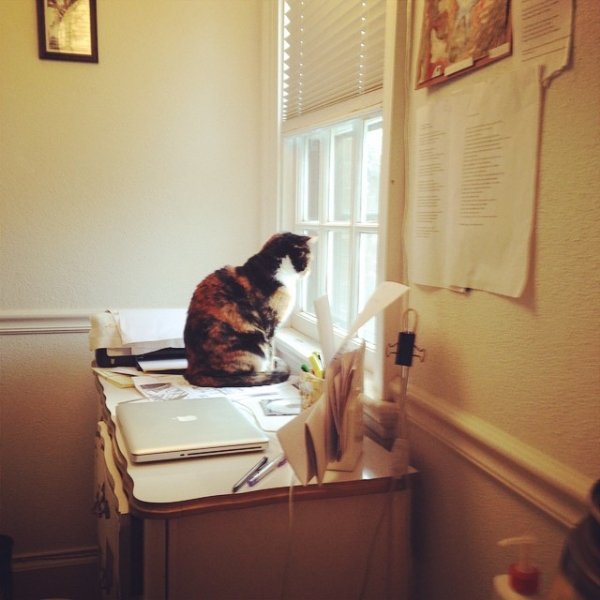
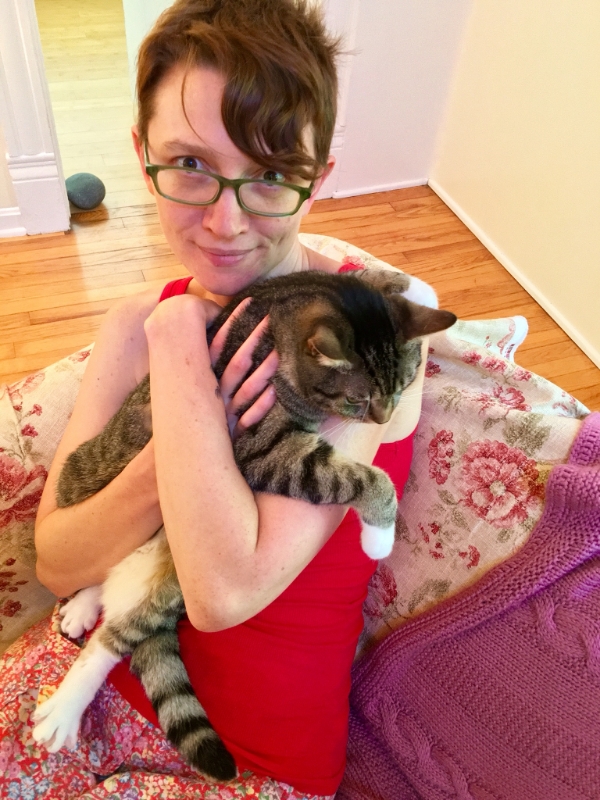

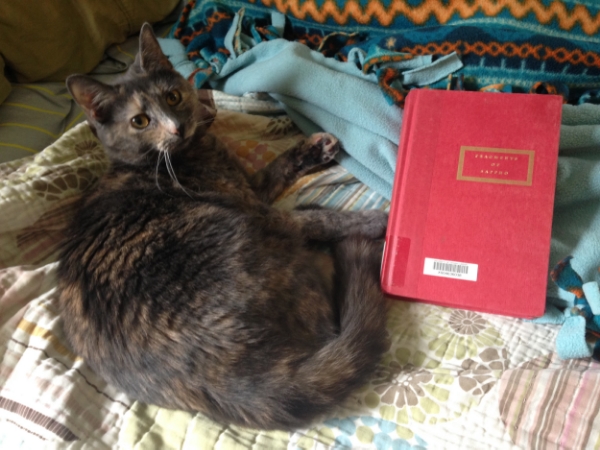
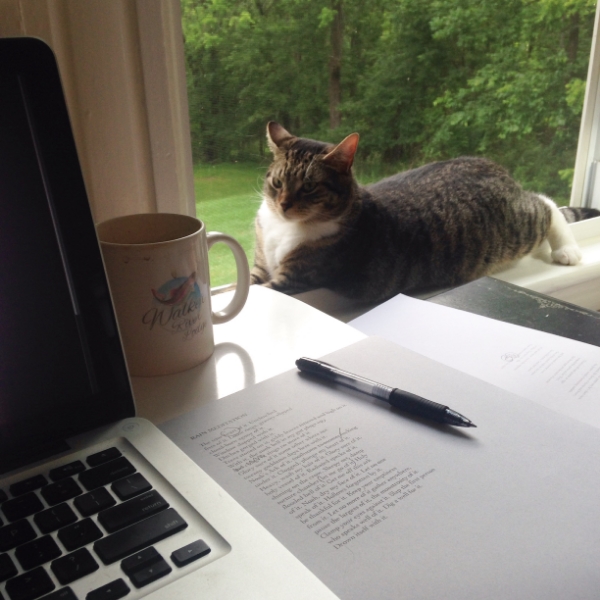
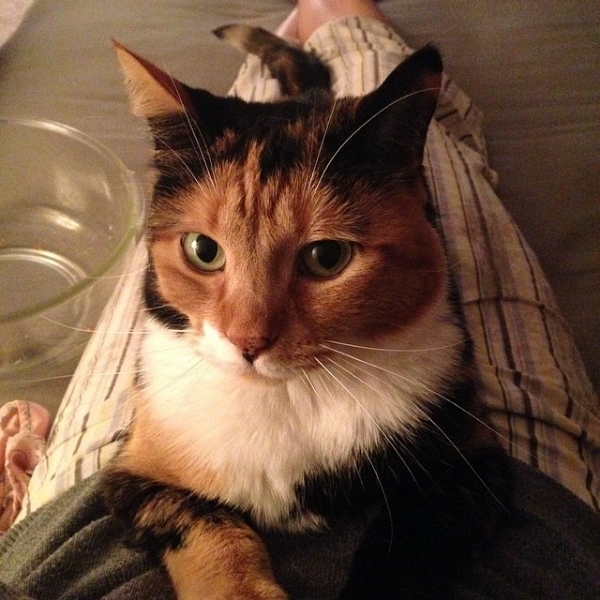
First of all, Amie, I'm happy to hear your cats Chicory and Sage are finally letting you get some sleep. Tell me about your decision to bring them into your life.
About a year ago, my beloved cat of ten years Stevens (yep, she was cat Stevens) died. As the first pet of my adulthood, adopted the year two grandparents died and lost the year after I divorced, her death marked not only a grievous loss, but also an end to an era of my life. She felt like the last anchor holding me steady; once she was gone, I felt entirely unmoored.
As anyone who has felt unmoored knows, it is largely impossible to imagine feeling moored again. Yet, with time, fantasies of kittens began to frolic in my mind. Having spent a decade fretting that Stevens was excruciatingly lonely as a single cat, I decided to adopt two kittens this time around. I began haunting the SPCA, waiting for love at first sight.
I met Chicory on one of these visits. She mewed at me as I passed her cage. I picked her up; she purred immediately, completely at ease curling up in my lap. A four-year-old boy sat on the floor next to me and informed me this kitten’s name was George and he was going to take her home when his dog died.
However, Chicory (whose middle name is George, in honor of her almost-owner) was there two days later when I decided I needed her in my life. That’s when I found a calico companion for her in Sage. Where Chicory is confident, charming, sociable, and playful, Sage is timid, frenetic, and (strangely enough) aggressively affectionate. They are loving and standoffish with each other in turns. I find their personalities, and their relationship, intensely interesting.
“As anyone who has felt unmoored knows, it is largely impossible to imagine feeling moored again.”
I know you lost your cat Stevens not long ago, and you reference her death in your poem “Year In Review." The line "Grew weepy in conversation about said dead cat / more often than is culturally appropriate" struck a chord with me. Did you feel pressure to meter how you wrote about her death because of the "culturally appropriate" expectation?
The poem picks up on the pressure I felt to withhold the intensity of my grief when friends politely shared their sympathies with me. Even recalling that grief brings tears to my eyes. There is not a day I do not miss Stevens.
I also think my poems about Stevens address a larger issue regarding grief in American society. I do not think we know how to honor it well in each other. We rely on tropes like “time heals” and “you’ll get over it,” though I think, in all our hearts, we know there is no “getting over.” And time may heal, but scars remain.
I think we could learn something from our pets about handling grief. They are such good caretakers of us in times of sorrow. They do not judge our weeping. They cuddle with us. They do not put time limits on feelings.
How did writing about Stevens help you process the loss? I'm thinking specifically about your poem “Song for Stevens” where there's heartbreak in every line. I can hardly read this without tearing up: “If given seven slides of calico hides, / I’d know which side was hers. If blindfolded / and handed seven cats, I’d know her by shape.”
I can’t read those lines without tearing up either. I wrote “Song for Stevens” while she was still alive. Writing that poem, and the poems that confront her death, helped me to honor the unique experience of adoring a pet. These poems give voice to the unbearable—and breathtaking—need to love something else unconditionally, passionately, and thoughtlessly. We have such a hard time doing this well with each other. With pets, we can learn to do this better—for their sakes and for the sakes of our relationships with our partners, families, friends, and all the creatures we with whom we share this earth.
“I think we could learn something from our pets about handling grief. They are such good caretakers of us in times of sorrow...They do not put time limits on feelings.”
What's your writing process like, and do your pets ever figure into it?
My cats are active writing partners! I usually write in the morning, which is one of their favorite times to play. My writing time is interspersed with crumbling up paper balls to toss at them while I work. Usually one decides to stroll across the keyboard to make some edits. One is usually perched in the window beside me or on a printed poem—drafts make great beds, apparently!
Your debut poetry collection Glass Harvest will be out soon (and I can't wait to read it). Do you have some advice for poets who are trying to complete or publish their first book?
Some of the most bolstering advice I received was from the poet Jane Hirshfield when I took a workshop with her at the Key West Literary Seminar. She said to treat every rejection as a gift of time—time to help the manuscript become its best self. I worked on this manuscript for eight years. It was not always easy to see rejection as a gift; however, when I recall its past selves, I’m incredibly glad they did not get published.
Poetry publishing is all long game. And it can feel even longer when you begin to compare your journey to Poet X or Poet Y. Try not to—or, indulge your envy, let it know you hear it, you understand its fiery pain, then move on. Try to remember comparison is the thief of joy. It is the thief of your very life.
“Try to remember comparison is the thief of joy.”
Fill in the blank: you're stuck on a poem, so you…?
Ignore it. I’m always working on multiple poems at a time, so when one is being disagreeable, I focus on others and let my subconscious chew on the stuck poem awhile. Or, I “break” it, tackling the subject from a different angle, trading narrative for lyric, long for short. I try to notice where my attention drifts and cut those parts. If I’m bored or restless, no doubt a reader is, too.
What is it about the animal world that most captures your attention as a poet?
I love learning about animal societies. I’m working on a poem about albatrosses and discovered that they spend years crafting complex courtship dances. Once they mate, the mates abandon the dance and form a private language, discernible only to each other. This is amazing to me and seems profoundly similar to human partnership: every long-term couple I know also has its own private shorthand.
Advice for poets who want to write meaningfully about the death of their pets but don't want to be dismissed as sentimental?
The advice is the same as what I would give for writing about the grief of losing a beloved human: be concrete. Focus on the specific interactions you have with the pet, the specific expressions of its personality. Don’t be afraid to be humorous. My favorite memory of Stevens is of her lying on my face and neck at 3 a.m., a ball of purring sweetness, while also drooling all over me. Include the drool with the purrs and you’ll be in good shape.
A simile for your cats?
Oh lord, I’m such a poet; my cats’ names are metaphors for themselves.
Chicory is an invasive weed in Illinois where I grew up—incredibly hardy, able to grow along roadsides and in pavement cracks. Chicory the cat is the same—hard to imagine her not thriving wherever she goes.
Sage is much like the spice—unique. Flavorful. And, as with the spice, which I rarely use but love the scent of, I don’t quite know what to do with her most of the time.



